
| Homepage > The Work of the Assembly > Committees > Office of the First Minister and deputy First Minister > Reports | |||||||||||||||||||||||||||||||||||||||||||||||||||||||||||||||||||||||||||||||||||||||||||||||||||||||||||||||||||||||||||||||||||||||||||||||||||||||||||||||||||||||||||||||||||||||||||||||||||||||||||||||||||||||||||||||||||||||||||||||||||||||||||||||||||||||||||||||||||||||||||||||||||||||||||||||||||||||||||||||||||||||||||||||||||||||||||||||||||||||||||||||||||||||||||||||||||||||||||||||||||||||||||||||||||||||||||||||||||||||||||||||||||||||||||||||||||||||||||||||||||||||||||||||||||||||||||||||||||||||||||||||||||||||||||||||||||||||||||||||||||||||||||||||||||||||||||||||||||||||||||||||||||||||||||||||||||||||||||||||||||||||||||||||||||||||||||||||||||||||||||||||||||||||||||||||||||||||||||||||||||||||||||||||||||||||||||||||||||||||||||||||||||||||||||||||||||||||||||||||||||||||||||||||||||||||||||||||||||||||||||||||||||||||||||||||||||||||||||||||||||||||||||||||||||||||||||||||||||||||||||||||||||||||||||||||||||||||||||||||||||||||||||||||||||||||||||||||||||||||
|
|||||||||||||||||||||||||||||||||||||||||||||||||||||||||||||||||||||||||||||||||||||||||||||||||||||||||||||||||||||||||||||||||||||||||||||||||||||||||||||||||||||||||||||||||||||||||||||||||||||||||||||||||||||||||||||||||||||||||||||||||||||||||||||||||||||||||||||||||||||||||||||||||||||||||||||||||||||||||||||||||||||||||||||||||||||||||||||||||||||||||||||||||||||||||||||||||||||||||||||||||||||||||||||||||||||||||||||||||||||||||||||||||||||||||||||||||||||||||||||||||||||||||||||||||||||||||||||||||||||||||||||||||||||||||||||||||||||||||||||||||||||||||||||||||||||||||||||||||||||||||||||||||||||||||||||||||||||||||||||||||||||||||||||||||||||||||||||||||||||||||||||||||||||||||||||||||||||||||||||||||||||||||||||||||||||||||||||||||||||||||||||||||||||||||||||||||||||||||||||||||||||||||||||||||||||||||||||||||||||||||||||||||||||||||||||||||||||||||||||||||||||||||||||||||||||||||||||||||||||||||||||||||||||||||||||||||||||||||||||||||||||||||||||||||||||||||||||||||||||||
Dame Joan Harbison |
Older People's Advocate |
1. The Chairperson (Mr Kennedy): We move now to the Commissioner for Older People Bill. We will receive a briefing from Dame Joan Harbison, the Older People's Advocate, and Kate McCullough, also from that office. You are very welcome. I invite you to provide us with an overview, after which members will be invited to ask questions. The session is being recorded by Hansard.
2. Dame Joan Harbison (Older People's Advocate): Thank you very much, Mr Chairman. I am delighted to be here. I thank the Committee for inviting me to give evidence. I will not go into great detail as you will now have received two submissions from me. You have seen our response to the consultation and the submission that we made prior to the Committee's consideration of the Commissioner for Older People Bill. However, I will make a number of points.
3. First, after 19 months as the Older People's Advocate, I believe that a Commissioner for Older People is needed — or, preferably, an older people's commissioner, because ownership of the role should lie with older people. I want to acknowledge the tremendous work that has been done by the sector in preparing for the establishment of the commissioner's office, responding to the draft legislation and engaging with the consultation. A huge amount of work has been done and what has been produced is thoughtful, clear, helpful and supportive of the idea of an older people's commissioner. Those in the sector have been very generous in sharing their thoughts with me, as the Older People's Advocate. Ours is a small office, so that has been extremely useful. In particular, Age NI, as you are well aware, has produced an enormous amount of material, which has been helpful all the way through the process and to the Bill team.
4. During the 19 months that I have been in post, I have been to many parts of Northern Ireland and have spoken at meetings to a total of over 4,000 people, most of whom were older people. Therefore, I have spoken to many older people during that time. Without exception, they are totally supportive of the idea of an older people's commissioner. They believe that the commissioner will raise the interests and rights of older people. I know that that is one issue that the sector has raised with you. It would prefer both interests and rights to be raised. I understand that there is some debate about that, but it is worth considering seriously.
5. I want to mention two other matters before I take questions. In the legislation, the term "a question of principle" is used on a number of occasions. It lies with the commissioner to take action with regard to investigations, inspections or, indeed, support in taking cases where there is a question of principle. I cannot think of any matter that has come to me during the last 19 months that was not underpinned by a question of principle, whether it was a question of the quality of services provided; common sense in delivery, if you like; or flexibility in the system. There has been a question of principle in even the smallest matter that has been brought to my office. I want to put that on record because it is important.
6. In respect of that, the advocacy role is extremely important. Although there is emphasis on advocacy arrangements for the commissioner in the legislation, where it outlines the commissioner's duties or functions, the word "advocacy" is not used. Apart from consultation and work that I have done on aging and an inclusive society, as well as in other big areas where I hope that I have made a difference, most of my work has been to advocate on behalf of individuals and groups, dealing either with a trust, an education authority or another body. The advocacy role is extremely important.
7. The other role in the legislation that I see as significant is what the Bill calls conciliation services. However, that is a rather limiting definition and we should consider calling it dispute settlement services. There are three aspects to the business of conciliation: conciliation — which would be at a very low level — mediation and arbitration. It is quite important that conciliation is in the legislation, because that may be a very important power for the commissioner. It allows for something to happen that keeps people out of the courts, which is the most important thing. Therefore, we need more clarity around the conciliation services part of the Bill.
8. Lastly, as I said when I was previously before the Committee, I believe it to be very important that if we have powers of investigation and inspection, the Bill should also include powers of sanction. It is regrettable that those powers have not been included. By sanctions, I do not necessarily mean taking a case to the courts or financial sanctions, because, if a public sector body were involved, financial sanctions would simply involve transferring money from one part of the public sector to another. However, there are a number of very important sanctions that could be provided for. For example, there could be timescales, notices of compliance, schemes for monitoring compliance, written apologies exchanged between individuals and organisations, or lessons learnt statements could be drawn up. All sorts of things could be done that would force bodies to comply with the recommendations. At the moment, if we go down the route of investigation or inspection, there are, as far as I can see, no powers to ensure that recommendations are carried through.
9. The Chairperson: Thank you very much. That was very interesting. On the issue of sanctions, the Northern Ireland Assembly Ombudsman does not have the power of sanction. Presently, he can find maladministration and he can criticise. Therefore, it is interesting that you highlight a need for sanctions within your role. Might that create a difficulty in the role of other commissioners?
10. Dame Joan Harbison: I do not necessarily see that it would. It could be a way of raising the profile of what I consider to be good practice. Simply telling bodies what they ought to do is not necessarily a way of getting something done. Even if one goes to court, it does not always happen that way. As many of you know, I was involved in the Equality Commission for many years, and one thing that made me very cross was that even when we issued letters about compliance with article 55 — that is, workforce monitoring — some companies would prefer to pay a £50, £100 or £150 fine than be bothered to complete their article 55 forms. Even if there is a power to tell bodies to do things, and to take them to court if they do not, it does not always work. I would much prefer to see something in place that requires bodies to draw up an action plan and to put a timeline on how they might respond. There has to be some way of ensuring that actions follow investigations and inspection; otherwise, what is the point?
11. Ms Anderson: Thank you for your presentation. I am looking for some clarity to assist us with the Bill. Clause 4 relates to the general powers of the commissioner. To pick up on what you said about the powers of investigation and inspection, are you looking for an inspection power to be added or for the powers of investigation be widened? Clause 4(3) states that the commissioner can conduct investigations in relation to any matter. Therefore, are you satisfied with the investigative end of it but want that widened to include inspections? Have you made any recommendations for amending that clause?
12. Dame Joan Harbison: No. Clause 6 mentions inspection and is perfectly adequate for any needs that the commissioner would have. Inspection is already there in a form that is, for me, acceptable.
13. Ms Anderson: Therefore, you are not advocating any amendment to strengthen the Bill and are satisfied that it is adequate.
14. Dame Joan Harbison: For those powers, yes.
15. Mr Elliott: Thank you for the presentation. The Northern Ireland Ombudsman's response states that he is:
"concerned that the proposal is premature and that progress on the Wales model and a fundamental review of the existing oversight and complaints handling landscape in Northern Ireland is needed."
16. Do you believe that to be wrong?
17. Dame Joan Harbison: It is not for me to say. However, I do not think that what the ombudsman is suggesting in any way takes away from my experience of the past 19 months, which tells me that the current situation is that neither the ombudsman nor the Equality Commission is adequately meeting the needs of older people, supporting them, advocating on their behalf or promoting their interests and needs. It is for you or other Assembly Members to decide whether there needs to be a review beyond that. However, his response does not take away, in any way, from my belief in the need for an older people's commissioner.
18. Mr Elliott: The ombudsman seems pretty keen that there would be an overall review. He also said that he:
"strongly believes that a model that combines advocacy, championing and education with investigatory powers is inherently flawed. It is not equitable to combine the role of an advocate with a parallel and conflicting role to independently investigate specific cases."
19. Dame Joan Harbison: He and I would not agree on that. There are many models in which that works satisfactorily. As I said, I was chief commissioner of the Equality Commission for six years, a position in which those two responsibilities sit very comfortably with each other. In fact, to a large extent, the two inform each other and are complementary rather than conflicting.
20. Mr Spratt: Thank you, Dame Joan, for your presentation. I have some concerns around sanctions. If a report is made on an establishment, that report will be open, transparent and in the public domain. That is a sanction in itself, given the recommendations that will be in such a report.
21. However, I can see a case for paying individuals. I know of a recent case in which the ombudsman found that a well-known housing association had 11 or 12 instances of maladministration in the case of two individuals. The ombudsman awarded an amount of money to those individuals; I believe that it was £5,000 each, which was right and proper. Therefore, the ombudsman can decide in certain cases not to impose fines, but that money should be paid back to individuals. That would be a sanction, and I would support that. You talk about timescales, monitoring and compliance, but you have to be careful that you are not creating another department within a department.
22. It will be difficult to do that in the current economic climate, but the important thing is to get the whole thing up and running. Your report going into the public domain would be a sanction against whomever you were investigating or reporting on, and that should be a way of ensuring that those things were carried out. The responsibility would then fall on Assembly Members and Departments to ensure that your recommendations are complied with.
23. What is your view on individual cases of maladministration in which you could award against an organisation, such as a private nursing home where people are paying money?
24. Dame Joan Harbison: Presumably, I would not be finding maladministration. For many people, certainly those who have come to me with issues, I am not saying that I have felt that at any point an investigation was necessarily the right way forward. However, money was not the issue for those people. The issue was about ensuring that the delivery of the service was appropriate to the needs for which it was designed. Quite frankly, in many instances, people's concern was that their experiences should not be repeated elsewhere.
25. I take your point that there may be other bodies that could ensure that change was taking place, but I have had experience of recommendations being made to organisations but an inordinately long time being taken to change the system in such a way that makes a difference for individuals on the ground. Older people do not have time; if you are going to change something for older people, you need to change it today or tomorrow because next month or next year may be too late. There are issues about ensuring that the recommendations that are made on foot of inspections and investigations are carried through.
26. As to creating a so-called compliance department within the office of the older people's commissioner, I do not see that happening because I do not see the powers of investigation or inspection relating to that. Investigation may be on wider themes, such as is happening in the office of the Older People's Commissioner for Wales, which is examining the quality of services provided for older people. However, such investigations will result in broad-brush recommendations to improve the quality of services; it is not an investigation into a particular event. Therefore, those two elements are quite different, and they would be quite different in the office of the older people's commissioner here.
27. I do not see the need to create a department in order to do that, because I do not see an individual investigation following up on a complaint that is brought to the commissioner happening regularly. For instance, the Children's Commission has those powers and, so far, she has never carried out an investigation. Nevertheless, when an investigation is carried out, it must be followed through on. In my experience, I have found that people are ready to offer support and to help change things before we ever reach the point at which an investigation is needed.
28. Mr Molloy: Thank you for your presentation. Do you have any recommendations on sanctions that the Committee might consider? As Mr Spratt said, a report is one mechanism through which issues can be highlighted. The role of commissioner has to have teeth, and people want to know what the next stage will be. Therefore, it is important that there are proposals about structures. For instance, a mechanism could be put in place to categorise complaints and decide whether action should be taken by a Minister or by the commissioner.
29. Dame Joan Harbison: In the correct circumstances, I would be happy with either or both of those recommendations. An action plan with a corresponding timescale would be one way to know when things are supposed to happen, and the commissioner could then go back to the relevant body and ask for an update based on that action plan. If the worst came to the worst, rather than going down a legal route, the commissioner could request that someone be put into an organisation to ensure that recommendations are carried through. If a power exists, there needs to be some way to ensure that any actions that are taken under that power are delivered on. As I said, however, it is not something that will happen every month or every six months.
30. The Chairperson: Thank you, Dame Joan and Kate, for attending this afternoon and for your briefing and answers. Undoubtedly, we will continue to stay in contact.
31. Dame Joan Harbison: No doubt we will be in contact with the Committee because ours is a small office and the timescale for producing this response was very tight, so we are still considering it. If we come up with any more ideas, we will pass them on.
32. The Chairperson: We will be happy to receive them.
Members present for all or part of the proceedings:
Mr Danny Kennedy (Chairperson)
Dr Stephen Farry (Deputy Chairperson)
Ms Martina Anderson
Mr Tom Elliott
Mrs Dolores Kelly
Mr Barry McElduff
Mr Francie Molloy
Mr George Robinson
Mr Jimmy Spratt
Witnesses:
Ms Roisin Devlin |
Northern Ireland Human Rights Commission |
Mr Duane Farrell |
Age NI |
Mr Francis Hughes |
Age Sector Platform |
Dr Tom Frawley |
Northern Ireland Ombudsman |
Ms Michaela McAleer |
Office of the Northern Ireland Ombudsman |
33. The Chairperson (Mr Kennedy): I welcome Professor Monica McWilliams, who is here with her colleagues to give her views on the Commissioner for Older People Bill. This session is being recorded by Hansard for the Committee's consideration. Professor McWilliams, we ask you to make an opening statement, and then make yourself available for questions.
34. Professor Monica McWilliams (Northern Ireland Human Rights Commission): Thank you very much. I am the Chief Commissioner of the Northern Ireland Human Rights Commission (NIHRC). My opening statement will be short, because members all have a copy of our submission. To my left is Dr Nazia Latif and to my right is Roisin Devlin, both of whom are from the investigations policy unit in the commission. Having prepared the response to the legislation, they will answer any questions on the more detailed matters that members may have.
35. The Committee knows of the work of the commission. However, in brief, it was given very strong powers under the original Northern Ireland Act 1998, which were then extended under the Justice and Security (Northern Ireland) Act 2007. The commission's functions are to review the adequacy and effectiveness of Northern Ireland law and practice relating to the protection of human rights. We advise, as we are doing today, on legislative and other measures that have to be taken to protect human rights, and on whether a Bill is compatible with human rights. The commission also has a promotion and awareness function in relation to the importance of human rights in Northern Ireland. In all that work, we base our practice on international human rights standards and, in particular, on the European Convention on Human Rights.
36. We welcome the opportunity to respond during the Committee Stage of the Commissioner for Older People Bill, and to draw your attention to a number of issues that we raised in our submission.
37. One of our concerns is the lack of legal certainty attached to the concept of interests. We believe that if that is to be included in the legislation, there may be some concerns, on behalf of those being investigated, if investigations are to be based on the concept of interests rather than rights. We say that based on our practice and based on the investigations that we have undertaken to date. The commission uses its very extensive powers to compel evidence and documents, and to take testimony. Having such strong powers, one would want, before investigating an institution or body, legal certainty over what it is that is being investigated. Therefore, the term "interests" should have more certainty attached to it than it currently does. We suggest that the term be displaced and replaced with the term "rights".
38. In clauses 3 and 4, on duties and general powers, we suggest that the focus should be more on duties. Again, the word "interests" is used. We are more than happy to discuss that issue further when answering your questions.
39. We have some concerns with clause 8 and the issue of complaints. We understand that some consultees believe there to be a gap in the complaint-receiving function, and we wonder where that gap lies. The Committee will later be taking evidence from the Northern Ireland Ombudsman. However, that gap needs to be identified if the Commissioner for Older People is to have a complaints-receiving function. We are a complaints-receiving body and, therefore, understand that, to avoid duplication, the office will need to be very clear about what complaints it receives. That way, anyone coming to the commissioner with a complaint, and who perhaps does not understand the office's functions, can be told what the commissioner is, and is not, set up to do under statute. Therefore, everyone would understand the role of the ombudsmen that are currently in existence and, indeed, what other ombudsmen would be expected to do.
40. We want to know why clause 12, on conciliation of disputes, proposes to involve the services of a third party to ensure that there is no compromising of the office's role if it were not to reach a resolution itself. That is not a conciliation function that we have. Our commission has very strong litigation functions in that it can take cases to court, and act as a third party in court. We do make referrals, but that is a very different role. Although we do not have that conciliation role, we ask that that be clarified so that there is no issue around compromising the office's role if a third party is then brought in.
41. Clause 13 deals with formal investigations. Again, there must be clarification around the term "interests". Also, if an investigation is declared, there is an issue around making publications public. If an ombudsman is given strong powers, it is only right that they publish their findings and that those findings are shared. Learning must spread across other organisations, and will sometimes go beyond the institution under investigation, perhaps to Departments or to other agencies. Therefore, it is extremely important that any investigation would not be left private or at the discretion of the ombudsman. It may be that material has to be redacted for the purposes of confidentiality or legal privilege. However, the findings of reports should be published.
42. Victim standing is the issue on which we have most to say, particularly given that the legislation makes reference to our commission. We are not devolved. The Northern Ireland Human Rights Commission remains with Westminster, is accountable to Parliament and is funded, through the Secretary of State, by Parliament. Therefore, all funding has to be accounted for to Parliament. If we take cases to court, on behalf of a victim or with a victim standing in their own name, accountability is a core function of our role under the power that was given to us by the Justice and Security (Northern Ireland) Act 2007. Therefore, we would have some concerns if this legislation were to look to our commission to take a case. To be mandated in any way by another piece of legislation would sit uneasily with us, because we have to account for our funding in every case. Therefore, it would be very difficult for us to account for a case that came from outside the commission.
43. The commission was set up under United Nations principles — known as the Paris Principles — and, therefore, cannot be seen, at any stage, to be inappropriately engaged with any other body, agency or non-governmental organisation. That goes for campaigning, lobbying or having an interest that could be seen to fetter in any way our independence or discretion. I have already explained how the issue of our funding relates to that. That remains a concern for us.
44. We have memorandums of understanding with many of the bodies that currently exist and meet regularly to avoid duplication, to ensure that when we publish our strategic plans each of us knows what we are going to investigate next year, and to ensure that there is never a question of two bodies undertaking an investigation in the same institution at one time. For all those reasons, we have memorandums of understanding. However, this is different and goes beyond memorandums of understanding. This Bill speaks to the commission taking up a case and using its power of victim standing on behalf of another body.
45. We very much welcome the inclusion of individuals who are private fee-paying residents in residential or nursing homes. That is a really important inclusion, because no one should fall outside the human rights radar. The Committee is probably aware that it is only recently that the Human Rights Commission has been able to go into private nursing homes and that it took a change in UK primary legislation to allow us that power. Until then, we could investigate only those homes that were deemed to be public bodies. Private homes with public contracts were deemed not to fall under the designation of a public body. They are now, and, in fact, a current investigation is into the rights of older people in nursing homes, particularly focusing on dementia. We have been in private homes, but the element of private fee-paying residents is an important inclusion.
46. Finally, given the concerns that we have raised, the Executive might be minded to maintain the focus on interests. If they are to maintain that focus and not to move away from it to give more legal certainty in respect of rights, they should focus on a general review of advocacy, complaint inspection, whistle-blowing arrangements, assistance with complaints and promotional or educational activities. Those are our key concerns, which are based on our 10-year experience of undertaking investigations, receiving complaints, giving assistance and having victim standing.
47. The Chairperson: Thank you for that overview. I will invite questions from members, and I will start. You appear to be concerned about possible duplication of the role that a Commissioner for Older People might have with some of your organisation's responsibilities. Is it the case that you consider your body to be superior and that you are almost adopting an attitude of, "Get your tanks off our lawn"?
48. Professor McWilliams: Far from it. We welcome the legislation and the introduction of an older persons' ombudsman. Indeed, we noted the Deloitte consultation, which suggested that an ombudsman was needed to focus on the needs of older people. When something new is being established, everyone will ask what it will do differently from what is in place already. Our commission is focused on ensuring that no overlap or duplication takes place in our current functions. That is part of our work every day.
49. The Prisoner Ombudsman, Criminal Justice Inspection and our organisation have separate powers, and, recently, all three of us had to come together in light of an emergency and a crisis in Northern Ireland prisons to work out who should do what and whose responsibility it was to act on the issue. That is how we do our work. We do not suggest for one minute that, as a consequence, any of those other bodies are not needed. Duplication is not always a bad thing. If I were to come out with a set of findings on juvenile justice based on my powers, it might help the Children's Commissioner, who has a responsibility for juveniles, because she could back up those findings or validate them and take on the work that is relevant to her responsibilities.
50. It would not be anything new for us to work regularly with other ombudsmen, and we can see our organisation working easily with the Commissioner for Older People. All that we are saying is that, if the Commissioner for Older People is given powers, legal certainty must exist in respect of those powers so that, if someone were to come to us and ask what the individual does that is different from us, or anyone else, we could be clear about what that commissioner does.
51. The Chairperson: Is there any type of danger that the number of commissioners and commissions that have been appointed is offsetting the work and, if not quite undermining, taking away from the work of the elected representatives at Stormont?
52. Professor McWilliams: That is a judgment for you; not for us. I reiterate that we do not fall under the remit of the Northern Ireland Assembly. We are under the authority of Parliament at Westminster, so it may be that you will wish to look at the bodies that fall under the authority of the Northern Ireland Assembly.
53. However, given the consultation that has taken place to date, and on reading the transcripts and Hansard reports to date, I assumed that that was one of the issues that individuals had been consulted on, and that political representatives had also stated their minds. It is not for us to comment on whether there are too many commissions or ombudsmen. That is entirely your call by way of the introduction of new legislation.
54. Ms Anderson: Go raibh míle maith agat. Thank you; it is nice to have you back again. I would like you to expand on some of the comments that you made. I have read the explanatory notes with the consultation and your response. A pre-consultation took place with stakeholders' organisations — were you involved in that? Had you, at that point, raised your concern with regard to the clauses that you identified as making particular reference to interests, as opposed to rights? It seems the issue is that the term "interests" in the Bill is defined in a way that is not as broad as "rights". I wonder whether, had that been brought up earlier, the officials who carried out the consultation could have explained what consideration they had given to that, because it did not find expression then when the actual Bill was produced.
55. Professor McWilliams: We did raise those issues, because they are the key issues that we focused on. My recollection of meeting the officials was that we were asked to tell them about our experience: what works, where the gaps were, and what more we sought to do. Those questions were asked so that they could build on the role of commissioner, and indeed other ombudsmen. We laid all that out, but also highlighted the very issues that you referred to at that stage.
56. Both Nazia and Roisin were included in those discussions, so perhaps Roisin might take up the detail on those discussions with the OFMDFM officials.
57. Ms Roisin Devlin (Northern Ireland Human Rights Commission): The OFMDFM consultation document was issued towards the end of last year. We responded to the consultation and we welcomed the commitment to establish a commissioner for older people, but we outlined some concerns, including the exclusive focus on interests. We recommended that, as well as interests, the principal aim of the commissioner should be to promote and safeguard the rights of older people. The reason that we say that is because rights are codified and set out in domestic, regional and international instruments, whereas interests are not so clearly defined. We felt that it would be appropriate to set out the human rights that older people have.
58. Dr Nazia Latif (Northern Ireland Human Rights Commission): Just to reiterate: that was not the first time that the commission has had to raise those points, and, unfortunately, they have not been positively addressed in the Bill.
59. Mr Elliott: Thank you for your presentation. I will make two brief points. Monica, you mentioned the issue about the term "interests" a number of times. Are you clearly saying that that is not specific enough, and that the specific roles in relation to that need to be more clearly identified? The second point that I hope that you can clarify for me is that you mentioned your concerns that there could be direction from the Commissioner for Older People to you in relation to pursuance of cases — legal cases, I presume. Can you expand on that a bit more?
60. Professor McWilliams: Sure. I will ask Roisin to comment on the first point on rights versus interests, and Nazia can give you the actual detail in relation to victim standing.
61. Ms Devlin: Our concern about the focus on interests is that the concept itself is not clearly defined, whereas rights are more clearly defined because they are already set out in international, regional and domestic instruments. The Bill states that, when interpreting the interests of older people:
"the Commissioner will be required to have regard to the UN Principles for Older Persons".
62. We welcome that, but the UN principles are not binding, and they do not clearly set out what interests mean. We go back to our original recommendation, which is that the focus should also be on the rights of older people. Our concern with "interests" is that, because it is not clearly defined, there are two possibilities: first, people might not know what to expect from the commissioner in what he or she can and cannot do. On the other hand, when relevant authorities are being investigated, they will want to know against what standards they are being investigated. Our concern is that, if that is against the concept of interests, there is no clear definition of what that might mean.
63. Mr Elliott: Obviously, it would take a test case to determine that — would it? How is it ever going to be determined if it is not set out somewhere?
64. Ms Devlin: That is our concern. How will it be determined? In fact, it might take up some of the commission's own time; if it is to initiate an investigation, it may first have to determine what standards it is going to use and what the interests of the older person are. That level of inquiry would not be required if international human rights standards were used.
65. Professor McWilliams: Perhaps I can give you an example. When we undertake an investigation, we inform the body that we are going to investigate. We draft and share the terms of reference, in which we highlight the issues in relation to the rights that we are going to be investigating, so the individuals know what we are going to examine or investigate. Obviously, under the legislation, they also have an opportunity to contest any of that. That has never been done to date, but the opportunity exists.
66. If an organisation has such strong powers and there is equality in respect of those powers, it should be able to show to someone who runs a nursing home exactly what it will be coming to investigate so that that person is left in no doubt about the materials that they need to provide or the witness statements and documents that they need to make available. In our case, that even includes medical records. If an organisation has those kinds of powers, they should be very specific. We are just suggesting at this stage, rather than having to come back to it at a later stage, that you should give as much legal certainty to that as possible when drafting the legislation. The standards are set: you would not have to think of them yourselves; they are already there. Is there anything that you want to add to that, Nazia, in relation to victim standing?
67. Dr Latif: Ideally, the commission would have welcomed the post of Commissioner for Older People having victim standing in its own right, but we understand that that may require primary Westminster legislation. In the event that the post does not have that victim standing, the commission would be concerned if there were any policy or legislative direction that would place an onus or duty on our commission to consider cases that come its way from the Commissioner for Older People.
68. There are two reasons for that. First, the commission routinely welcomes referrals in any case from any organisation as a matter of course when making decisions about whether to take a case in our own name. It is not a power that we have exercised yet, but, when we do, it will be through extensive consultation with stakeholders. Secondly, we would see such a directive as compromising our independence as an accredited Paris Principles compliant national human rights institution. There would also be practical difficulties with such an arrangement, but primarily we would be opposed to any sort of directive in principle as a potential fettering of our independence.
69. Dr Farry: I welcome the representatives of the Human Rights Commission. I want to return to the issue of interests versus rights. I understand the point that you are making on the limitation of the concept of interests, and that they are almost a social construction. What is meant is shaped by those who define what interests are, as opposed to a different type of standard. Is there not a sense that the concept of interests, flawed as it may well be, would be broader than dealing with matters through the issue of rights? If that is the case, to what extent are your comments about adopting a rights-based approach shaped by wider considerations on the need for some sort of bill of rights, either specifically for Northern Ireland or UK-wide? Surely, a lot of the conventions that relate to what we are talking about are currently not domesticated into UK law. At this stage, we are solely relying on the Human Rights Act and its elastic interpretation of needs.
70. Professor McWilliams: I take your point. However, judicial decision-making often takes account of both hard and soft law. The UN Convention on the Rights of the Child is a perfect example. The Human Rights Act is obviously the one that most people are familiar with as it has been incorporated into our domestic legislation. We argue that the rights are set down, whether in international or domestic law. Therefore, people understand exactly what they are being referred to, what the standards are, and whether they meet them or are in breach of them.
71. Your point about interest is much wider. I assure you that discussion on a bill of rights was not part of any discussion that we have had in the commission or with the stakeholders, consultees or officials who came to see us. That did not form any part of our discussion. All that we are trying to do in respect of the drafting of the legislation is to be helpful both to the future commissioner, who will know that we have been down this road ourselves, and the legislators. We want to give legal certainty, where possible, if strong powers are to be given to a commissioner. It should not be left as a wider term, with other elements attached to it.
72. Dr Farry: I want to be clear that, in essence, you are arguing that we should adopt a rights-based approach and rights-based language in the legislation in the context of the current UK-wide legal situation in respect of rights.
73. Professor McWilliams: Yes. That still gives enormous scope, and legal certainty is attached. Every party, from the judiciary to the Executive to the stakeholders, including the Commissioner for Older People, would then be certain about what powers they are using.
74. The Chairperson: That completes the questions. Thank you very much for your answers and for your earlier presentation. We will be happy to receive any additional information that you wish to pass on to us, and no doubt we will be in contact with you if any clarification is needed. Good afternoon, and thank you for your attendance.
75. Professor McWilliams: You are more than welcome. Thank you.
76. The Chairperson: We will now receive a briefing from Age NI on the Commissioner for Older People Bill. I am pleased to welcome Francis Hughes, Duane Farrell and Michele Smyth. Thank you very much for your attendance this afternoon. The session is being recorded by Hansard for future reference and inclusion in our considerations. You may wish to make an opening statement and then leave yourselves available for questions. We anticipate that the session will last approximately half an hour.
77. Mr Francis Hughes (Age Sector Platform): Thank you very much, Mr Chairman. I am an executive member of the Age Sector Platform. I apologise that our office manager, Eddie Lynch, who was due to be here today, is unwell. Age Sector Platform has a membership base of 30 older people's organisations and networks, which represent approximately 200,000 older people across Northern Ireland. With me today are representatives of Age NI: Duane Farrell, director of policy; and Michele Smyth, project leader.
78. Since 2008, Age NI and Age Sector Platform have worked in partnership with a view to ensuring that the voice of older people is at the centre of the decision-making process that will ultimately inform the powers and duties that the Commissioner for Older People for Northern Ireland will have. We thank the Committee for inviting us to attend today to give oral evidence at this very important stage of the process. I will begin by offering a short overview of the activities that have informed our position to date. I will then hand over to Duane Farrell, who will outline briefly some areas about which we have concerns. We will then be happy to respond to the Committee's questions.
Throughout the process, we have liaised closely with the OFMDFM Bill team and the interim Older People's Advocate. We value greatly those opportunities for the co-operative exchange of information and ideas. We would like to add that we are in agreement with the points that were raised by the advocate at last week's Committee meeting. However, we would go further with respect to those points.
79. To give an insight into the process, in 2008, in the interests of establishing a strong policy position, we commissioned research to identify potential models for a Commissioner for Older People. That research identified five criteria for success of a Commissioner for Older People. Those criteria are that the Commissioner for Older People should have a strategic and holistic role in securing, promoting and safeguarding older people's rights and interests; should be independent; should be complementary to existing bodies such as the Northern Ireland Human Rights Commission and the Equality Commission for Northern Ireland; should offer value for money; and must engage older people appropriately in all aspects of his or her work.
80. In early 2009, that research was followed by a series of round-table discussions that continued throughout that year. Those discussions engaged stakeholders from throughout the voluntary sector and enabled us to reach an informed position and strong consensus on which our policy is based. Widespread support for our position has been demonstrated by the We Agree campaign. As of today, 1,347 individuals and 120 organisations and older people's groups have signed up to support our position. That support is growing daily.
81. More recently, we have drawn together a team of legal experts who have considered the amended Bill in great detail. Their deliberations have contributed to inform our written evidence. We have recently visited the office of Ruth Marks, the Older People's Commissioner for Wales, to look at the operation of that commission and to hear views on successes and shortcomings of the Welsh legislation. We believe that the Commissioner for Older People for Northern Ireland should have strong powers that can be used selectively and strategically to ensure timeliness, effectiveness and best value for money.
82. The Committee will be well aware that we are witnessing the onset of a massive shift in population demographics with the number of people who are aged over 60 years projected to constitute one quarter of the population by 2026. A powerful Commissioner for Older People would help to ensure that there is adequate planning for the future. We need to put in place measures to ensure that those who are able to continue to be able to contribute to society in later life are supported to do so, while older people who are vulnerable in society are granted the security of the support and protection that they need and deserve.
83. Mr Duane Farrell (Age NI): I thank the Committee for this opportunity and to acknowledge MLAs' commitment to ensure the passage of the legislation during the lifetime of the Assembly. As the Committee moves towards clause-by-clause scrutiny of the Bill, there are a number of areas to which we want to draw your attention.
84. As Francis mentioned, we agree with the points that were raised by the advocate. We want to draw attention to three aspects of the Bill because the effectiveness of the legislation and, thus, of the commissioner's capacity to be effective and to provide value for money hangs on them. They are: including rights as well as interests, removing or reducing unnecessary restrictions to powers, and agreeing an inclusive definition of "relevant authority".
85. Our legal advisers have indicated the importance of including rights and interests in the Bill. Although the Minister has indicated that interests, as they are referred to in the Bill, include rights, we have been advised that a court may interpret the legislation differently, drawing on the precedent of other legislation, and that that could lead to problems. Therefore, we have suggested a small, but effective, amendment.
86. As noted in the Assembly debate on 7 June, the Bill gives the commissioner powers in some areas only to reduce the effectiveness of those powers by surrounding them with restrictions. There are instances of that across complaints, investigation and legal functions. Often, the Bill relies on the existence of a remedy rather than the exercise of it. For example, as it stands, clause 8(2)(b) limits the older people's commissioner to act only if:
"the complaint does not fall within an existing statutory complaints system."
87. It would be preferable for the commissioner to be able to act if it is unlikely that there will be an investigation under the statutory complaints system. We believe that the intention to avoid duplication would still be addressed by rewording the clause to that effect. It makes sense that the commissioner's ability to act should not be limited merely by the existence of a statutory complaints system because its existence does not necessarily mean that the body in question would, in fact, take up the issue. Furthermore, the restrictions in clause 8(3) will limit the commissioner's capacity to take up a complaint, and clause 14 will hamper the commissioner in conducting formal investigations. Those restrictions could potentially leave older people unprotected, and Age Concern has suggested a number of amendments to those clauses in its submission to the Committee.
88. The Older People's Commissioner for Wales told Age Concern about the difficulties she has encountered with restricted powers, waiting for other bodies to act and waiting for information on action. Older people have the least time of us all to wait. Age Concern understands the need to avoid duplication and has suggested ways of overcoming that in the way in which its amendments are worded and through formal memorandums of understanding. It is important that the commissioner's powers are unrestricted or that restrictions are kept to a minimum to allow the commissioner to act in a holistic and strategic manner. The commissioner must have discretion to act and must use that discretion well. Having full powers to take action will also enable the commissioner to offer individuals and bodies the option of following a conciliation or dispute resolution process, which will ensure good value for money.
89. A proper definition of what a "relevant authority" is and how it is covered under the Bill is fundamental to the effectiveness of the legislation. That definition should include a wide range of public, private and voluntary bodies in so far as their provision for older people is concerned, and all aspects connected with the operations that are linked to that. All functions of all public bodies should be included under all of the commissioner's powers. Examples of matters that would escape the commissioner's oversight include the services purchased under direct-payment systems, and those bodies that are included only under some powers, such as those that are listed in clause 7(6) to solely assist with complaints to relevant authorities.
90. Age Concern notes that some bodies listed as "relevant authorities" have been removed between drafts of the legislation and that there are other bodies that must also be considered. All functions of all private and voluntary bodies in so far as they pertain to older people should be included. The Bill seems to limit those to some providers in only part of the social care sector, and that is insufficient. Furthermore, the Bill must be future-proofed by taking account of the economic climate in which services may be delivered in the future. Age Concern intends to engage further with the legislative team in OFMDFM to arrive at an appropriate definition of what a "relevant authority" is, and would appreciate the Committee taking a continuing interest in the matter.
91. Age Concern also has a number of additional points to make on the Bill. First, it welcomes the introduction of the new clause to deal with alternative forms of dispute resolution, but agrees with the point made by the Older People's Advocate that the term "conciliation services" may be too limiting. Age Concern recommends that the broader term "dispute settlement services" be used, because it encompasses a range of options allowing the most appropriate and cost-effective method to be chosen in each case. Age Concern undertook research in advance of advocating alternative dispute settlement in the Bill, and, following this session, it will be hosting a round-table discussion with a US expert to advance knowledge on the continuum of alternative dispute settlement mechanisms. Age Concern has invited members from the legislative team in the Department to that discussion, and a representative from the Assembly's Research and Library Services is attending on behalf of the Committee Clerk.
92. The issue of sanctions was also raised by the Older People's Advocate. That is an important area that should not be overlooked, because sanctions are an important and cost-effective way of ensuring compliance. The Northern Ireland Ombudsman has powers of sanction over persistent maladministration and the Equality Commission over persistent discrimination. The threat of a sanction could be enough to encourage remedial action without any further and potentially more costly intervention. Age Concern proposed some potential methods of sanction in its written evidence to the Committee, such as notices of compliance and, where persistent offenders are concerned, enforcement of compliance with recommendations made to the courts. As the advocate indicated last week, it is important that the commissioner's action is not frustrated by bodies failing to follow through on recommendations for improvement in a timely manner.
93. The advocate also raised the issue of the question of principle. Our legal advisers have indicated that that term has no legal definition and is, therefore, ambiguous. They suggested that the legislation would be clearer if that term can be replaced, wherever possible, by reference to the Commissioner for Older People's remit or aims and duties. We welcome the power to co-operate enshrined in schedule 1. Our view is that that power should be underpinned by formal memoranda of understanding between bodies.
94. The experience of the Welsh Older People's Commissioner suggests that informal arrangements are effective only up to a point. She has indicated a desire to develop more robust memoranda of understanding where possible. She has also identified areas in which collaborative work could be improved, such as the potential for joint investigations.
95. Before ending, we want to draw the Committee's attention to matters that are outside the control of the Assembly, but that nevertheless impact on older people in Northern Ireland. First, we urge the Executive to pursue victim standing status for the Commissioner for Older People through the UK Government and Westminster legislation. Victim standing is a means of getting results for older people while ensuring that they avoid the stress and distress of legal proceedings themselves. Secondly, we are asking the Executive to explore what formal arrangements might be developed at a UK level to give the Commissioner recognised standing in relation to reserved matters such as tax and benefits, including pensions, which greatly affect older people. We have undertaken a substantial review of the Bill with our legal advisers and have suggested amendments, or not, on a clause-by-clause basis.
96. We commend our submission to the Committee, and ask that it be considered fully. We are happy to provide any further clarification and information as the Committee's scrutiny of the Bill proceeds, with a view to supporting the passage of this legislation in the lifetime of this Assembly in whatever way we can.
97. The Chairperson: Thank you for your presentations, and for the very comprehensive submission that we received in advance.
98. Ms Anderson: Thank you very much for the presentation. You acknowledge in your response that the Children's Commissioner model had extensive powers, and that, although it was a good enough starting point, you looked at four models and recommended the enhanced commissioner's model. Will you tell us a little bit more about that model?
99. Mr Farrell: That goes back to the point that Francis made: we articulated five criteria at the very start of the process in 2007, and we examined a range of models from an advocate to an ombudsman, through to a commissioner. The final model was an enhanced commissioner. That process looked at the learnings from the operation of the Children's Commissioner, Equality Commission and Human Rights Commission, where issues such as restrictions to powers and access to victim standing status have become impediments to the effective employment of the powers.
100. The view that we took quite early on was that the best way of managing potential duplication is not necessarily by restricting the powers of the organisation of the office that is last into the field, but rather to encourage collaboration, co-operation and a set of relationships based on equality across those who deploy the powers in the best interests of people in Northern Ireland. That is why we took the view of the enhanced commissioner model, based on the learnings from the commissions that had been in operation up to that point.
101. Mr Elliott: Thank you for the presentation. I have a couple of issues. What do you consider the Bill will provide that is not already in place by some of the other Government Departments, bodies, or indeed various commissioners or ombudsmen? Could those services be provided by another mechanism within governmental organisation?
102. Mr Farrell: I think that goes back to the first criterion that we articulated: a strategic and holistic overview. We recognise that the Equality Commission has powers. Where there is illegal discrimination, such as employment discrimination, the Human Rights Commission has some powers, as do ombudsmen. It is a very fragmented scene. In the Commissioner for Older People, we saw the ability to take a strategic and holistic overview and indeed to work on areas where, for example, it is still legal to discriminate against older people in the arena of goods, facilities and services. Somebody with powers to be able to take that forward, to be able to speak with politicians about that, to be able to make the case and to measure the discrimination that is —
103. Mr Elliott: What I am saying is could that not be an extension of the powers of, for example, the Northern Ireland Ombudsman or the Human Rights Commission?
104. Mr Farrell: The Northern Ireland Ombudsman is a case in point. He works on maladministration in respect of organisational processes. I think that the remit of the Commissioner for Older People is far broader than that — to look at, as we are proposing, rights and interests. I would go back to the fragmented nature of the scene and to the timeliness issue. The co-ordination needed to work across each of those bodies to clear lines through memoranda of understanding requires time that, very often, older people do not have.
105. Mr Elliott: I have one other question. How do you answer the accusation that the model that is proposed combines advocacy, championing and education with investigatory powers, and that that combination is inherently flawed?
106. Ms Michele Smyth (Age NI): I think that, as the Older People's Advocate iterated last week, those components actually work very well together. As opposed to being in conflict, they complement one another.
107. Mr Elliott: So you do not see any conflict there?
108. Mr Farrell: No; I think the response required is a systems and process response within organisations. The reality is that both the Equality Commission and the Human Rights Commission combine those functions, so when the Commissioner for Older People is established, there will be a need for attention to how the separate sides of the house are linked or kept separate. However, they are not incompatible, and can support an effective commissioner's role.
109. Mrs D Kelly: Thank you for your presentation; I have just a couple of points. In relation to the definition of age at 50 years and over —
110. The Chairperson: You are included. [Laughter.]
111. Mrs D Kelly: Enough of that — I have heard whispers that I should declare an interest from people who are not too far behind me. We are also hearing on the news that the working age should be lifted to 70, yet we are talking about a Commissioner for Older People to represent people aged over 50. I am sure that that is difficult to follow in some people's minds. What are your thoughts on that in relation to trying to use finite resources and target those most in need?
112. In your comments on the draft Bill in relation to the term "relevant authority", you said that the commissioner must respond to requests from the Executive, the Secretary of State and Assembly Committees, etc. I have concerns that there are too many relevant authorities. In other words, the commissioner could be running about, responding to requests and not really getting into the investigative meat of the job.
113. Ms Smyth: I will answer the first point. The representation of those over 50 would be in exceptional circumstances. That was something that we agreed with during the consultation. The rationale behind that is that there are groups in our society for whom a life expectancy of 50 is considered an older age. That is our interpretation of where those special circumstances will come into play. There is a bit of a stigma attached to being branded as an older person at 50, but it would be for exceptional circumstances.
114. Mr Farrell: Some examples are members of the Travelling community, for whom life expectancy is far lower, so what it is to be an elderly person as a Traveller is very different. A second part of the rationale, which is particularly pertinent at the moment, is that we are in a recession, and there are large numbers of people over 50 losing their jobs. That has an impact on an individual's savings, leading them to arrive at pensionable age in poverty, with no savings to support somebody. There was a need to be able, in exceptional circumstances, to take a preventative approach.
115. On the second issue that you raised about relevant authorities, there is a practical point in relation to the difference between "must", "may" and "shall" in the legislation. We were concerned that "must" had the potential to mean that the commissioner could be deploying the majority of his or her resources responding to requests for information from relevant authorities and not necessarily getting at the core work. That is a very practical and pragmatic point.
116. Mr McElduff: I am interested in the definitions of rights and interests. The explanatory memorandum's commentary on clause 2 states that:
"Interests is a broader term covering the wider picture. Interests includes but is broader than rights."
Are you effectively contesting that? Is that a factual statement or a matter of interpretation? What is the legal basis for your view that rights should be specified?
117. Mr Farrell: We were fortunate enough to secure the services of three legal advisers who volunteered to support us in our analysis of the legislation. As we went through our analysis of the Bill, we discussed the fact that, in the Hansard report of the Second Stage of the Bill, the Minister was quite clear in saying that interests include rights. Our legal advisers informed us that, should the commissioner be required to establish standing in a court of law, that Hansard report would not be clear enough to establish that intention at legislative drafting stage and that, in such instances, courts may refer to other, similar pieces of legislation. The example given to us was the case of the Children's Commissioner, where, very clearly, the intention was to include rights, and that was included in the legislation.
118. The point could be made in this case that, although it appears to be the intention to include rights, it does not appear on the face of the legislation. That might undermine that legal basis. We were very heavily influenced by our legal advisers in relation to how that would stand up in court.
119. Mr Spratt: Thank you for your presentation. In reference to complaints and investigation, you mentioned that the commissioner should have "legal functions". What exactly do you mean by that?
120. Mr Farrell: That was a reference to the structure of the Bill as it stands.
121. Mr Spratt: What do you see the legal functions of the commissioner as being?
122. Mr Farrell: The ability to support older people to take legal proceedings; the ability to act as, as is outlined in the legislation, amicus curiae — or friend of the court — to intervene in a legal proceeding; or to be invited by the court to make a representation on behalf of the commissioner.
123. Mr Spratt: To provide legal support.
124. Mr Farrell: Yes; to provide legal support to individuals.
125. Mr Spratt: Have you ever thought about what that might cost?
126. Mr Farrell: I will preface my answer by saying that it is our view that the commissioner is a body that should act in a strategic manner and that our preference has been that the commissioner will be most effective in working through providing advice for promoting best practice through those functions. The harder functions, such as investigations, complaints and legal proceedings, are an incentive to encourage relevant authorities to work with the commissioner in a more positive way.
127. Mr Spratt: Should the commissioner have an all-singing, all-dancing legal department, with barristers?
128. Mr Farrell: We have not taken a view on the commission's final structure and the numbers of staff that will be required. It is fair to say that we see the majority of the commissioner's work as not necessarily being in the legal sphere. The legal remit should be used in a strategic manner. It should take cases that test and demonstrate a point of law, rather than taking a high volume of cases. The existence of memoranda of understanding with others who operate in the field will support the identification of strategic criteria for the commissioner's legal functions.
129. Mr Spratt: Chairman, I hope that you will allow me to ask one more question. I have raised the point before that it is important that any commissioner does not meddle in a criminal investigation. The right and proper practice is for the Police Service to carry out such investigations. There are big dangers with a commissioner doing that, and there are also big dangers with cost. We have seen the costs of lawyers in other places, and none of it comes cheaply. I can understand that legal advice should be sought now and again, but it worries me that you might be suggesting that an all-singing, all dancing legal department be attached to each of the commissioners. That is not what you are suggesting, is it?
130. Mr Farrell: The Police Service is the first place to which an issue of criminality should be taken. The commissioner should not undertake investigations in those circumstances.
131. Mr Spratt: The commissioner might uncover something.
132. Mr Farrell: At that point, the commissioner should take a back seat and refer the matter to the Police Service. The commissioner can be effective through legal work in a strategic manner, not by taking a high volume of cases and, because of that, being ineffective.
133. Mr Spratt: There is always a danger in a commissioner taking on cases. In the past, ombudsmen have gone beyond their remit and caused major legal problems. I am worried about that danger, but I will not press you any further on that. I have worries on how that might be phrased and put into legislation, and there are dangers for the taxpayer. In the current economic climate, we have to be aware of that.
134. Mr Farrell: We share your concerns about value for money.
135. The Chairperson: That completes the questions. Thank you for your answers and for your presentation. If you wish to supply any additional information to us, we will be happy to receive it. If we need any points from your presentation to be clarified, we will be in touch. Thank you, and good afternoon.
136. We will now receive a briefing from the Northern Ireland Ombudsman. I welcome Dr Tom Frawley and Mrs Michaela McAleer. Thank you for your attendance. Good afternoon, Dr Frawley; you are very welcome. You are here so often than you will soon be at our staff dinners. You are here to brief us on the Commissioner for Older People Bill. The session will be recorded in the Hansard report for our considerations. You may wish to begin by making an opening statement, and then leaving yourself available for questions. We anticipate that the session will last for approximately half an hour. It may well be that I will have to leave because of business in the House, but Dr Farry, our new Deputy Chairperson, will assume the Chair if that is the case.
137. Dr Tom Frawley (Northern Ireland Ombudsman): A phrase that I thought might be helpful is that perceptions are an aspect of justice. Fairness promotes confidence, and can make losing acceptable. The real focus must be that someone will say, at the end of a process, that they had a fair hearing.
138. Chairperson and Committee members, thank you for affording me the opportunity to provide oral evidence to the Committee as it finalises its evaluation of the draft legislation, which will inform the role of the proposed Commissioner for Older People. First, let me acknowledge the adjustments that have been made as a result of our original submission to the Committee. However, I continue to have major reservations and concerns about the range of roles and responsibilities being proposed for the Commissioner for Older People.
139. The documentation developed by the Bill team following the consultation process states that the investigatory powers proposed that the Commissioner for Older People will be based on an ombudsman/advocacy model. I again ask the Committee to recognise that such a proposal is based on a flawed analysis of the concept on which the role of an ombudsman is based. Indeed, I believe that it demonstrates a lack of understanding of the key criteria that must be met if a viable proposal for an ombudsman model is to be created.
140. Gottehrer stated in 2009 that there are four fundamental characteristics of an ombudsman: independence; impartiality and fairness; a credible review process; and confidentiality. The Commissioner for Older People, as proposed, does not meet the independence test, the impartiality and fairness test, or the credible review process test.
141. In relation to independence, the commissioner proposal is sponsored by a Government Department. Independence is assumed, not demonstrated. In relation to impartiality and fairness, the commissioner will be an advocate for particular individuals and groups — older people. Indeed, the document makes clear that older people must have primacy in any consideration undertaken by the commissioner. The commissioner must, therefore, weigh the interests of older people before the interests of other groups — for example, people with learning disabilities. What are the implications of such an approach in health and social care, for example, where there will always be competing needs for limited resources? Need is infinite; resources are finite.
142. In relation to a credible review process, the commissioner will be confined to dealing purely with a narrow jurisdiction and complaints from older people. I believe that that will lead inevitably to what I would describe as service capture. Ombudsmen, on the other hand, must be in a position to investigate anyone's grievances concerning any decision, recommendation or action, and must consider that grievance against the context of competing priorities, which will involve all individuals and groups, not just older people.
143. The notion of an ombudsman advocate is, therefore, I contend, self-evidently contradictory. Clearly, therefore, anyone who is the subject of an investigation by the Commissioner for Older People will always have the perception that the very title of the office biases the investigation in favour of older people.
144. I will now make some general comments about the evaluation of the consultation responses. There is evidence within the consultation that, had the consultees been better informed on the role and purpose of other oversight officers, including the Northern Ireland Ombudsman, they might have been more aware of the potential duplication and replication of existing powers in the role that is proposed for the Commissioner for Older People. The bodies that I allude to are ones that already exist in Northern Ireland: the Equality Commission; the Information Commissioner; the Human Rights Commission; the Consumer Council; the Regulatory and Quality Improvement Authority; the Police Ombudsman; the Pensions Ombudsman for the United Kingdom; the Parliamentary and Health Service Ombudsman, in respect of reserved matters; the Financial Services Ombudsman; the Northern Ireland Ombudsman; the Northern Ireland Commissioner for Complaints; the Local Government Staff Commission; and the Northern Ireland Patient and Client Council.
145. The consultation document, as I said, indicated that it had not informed those being consulted about the role of the existing bodies already available to older people to provide redress and review. It is disappointing that such information and clarification did not form part of the initial consultation to ensure that consultees were making informed statements about what was required in a new Commissioner for Older People when tested against the existing oversight landscape.
146. I acknowledge that the new commissioner will be advised not to act without due regard to the statutory powers and duties of other organisations; however, the legislation will not prevent him or her from doing so.
147. If I might offer some final comments; within the current proposal, the Commissioner for Older People can initiate arrangements to facilitate resolution of complaints, including the provision of funds to enable conciliation services. In respect of health and social care, that is a direct duplication of the current arrangements established only last year between the regional Health and Social Care Board and the trusts to facilitate mediation and alternative dispute resolution in health and social care.
148. The full extent of the potential overlap between regulatory and statutory bodies already in existence and dealing with issues affecting older people and the Commissioner for Older People is unknown because, as far as I am aware, no mapping work was undertaken in the pre-consultation process. Therefore, providing the commissioner with such extensive powers in the absence of such work does not appear to represent best practice, or, importantly, in our circumstances, a good use of public funds.
149. The responses to the consultation process recognised that, although people stated what powers the commissioner should have, few, if any, examples were given as to why such powers are necessary in the experience of older people. There is, I would suggest, a fundamental difference between the wants and the needs of individuals or sectors.
150. It is unclear how the objective of ensuring that public money is used efficiently can be met in circumstances where an organisation has been funded to provide a service, another organisation is also being funded to provide the same service, and so much potential overlap has been identified, in the absence of the mapping exercise that I referred to.
151. Finally, the principles of better regulation adopted by the UK Cabinet Office state that laws and regulations that would lead to duplication or disproportionate action by the state should not be introduced. I suggest that the potential for such duplication and overlap, as currently detailed in the proposed roles for the commissioner, has the potential to confuse and compound, in my view, the existing adverse public perception about quangos.
152. The Chairperson: Thank you, Dr Frawley. I will invite questions, but I will start. You draw an important distinction in your evidence in the differences between a commissioner, an advocate and an ombudsman. Will you highlight the differences that you see in those respective roles? Secondly, in respect of the Welsh Older People's Commissioner, how is that ombudsman role working in practical terms? What is your experience of other devolved legislatures?
153. Dr Frawley: I will answer the latter part of the question first, if I may. There have been very different approaches in the two other devolved legislatures. The Scots did a lot of detailed work on a proposal to have an older person's commissioner and, in the end, decided against it and did not create the post. The Welsh, on the other hand, created an overarching strategy for older people, focusing on what older people in Wales needed. They consulted extensively on that, and then began to look at the existing system over a period of time to see how fit for purpose it was.
154. I suggest that it is important in Northern Ireland to map the existing landscape to see the potential for overlap and duplication, and then design a model based on that insight and understanding. The Welsh did choose to create an ombudsman, or an Older People's Commissioner, and there is now a very clear agreement between the ombudsman in Wales and the Older People's Commissioner that the commissioner will not engage in an investigation or complaint without prior debate with the ombudsman as to whether the review would be more appropriate to an ombudsman or to the commissioner. That is a fundamental part of how they proceed.
155. The Chairperson: Would that approach satisfy some of your concerns?
156. Dr Frawley: It would to a degree, but in Northern Ireland we have a completely different architecture. In a way, the model in Wales and England tends to have a lot of oversight arrangements, so that there is not, for example, an equality commission that specifically looks at the Welsh experience. There is no human rights commission; it has not been developed yet. Two of the major pillars that already exist in Northern Ireland do not exist there. Those two elements would require a different debate in Northern Ireland. Those who are designing the future might well say that that is an essential solution.
157. For example, part of the legislation states that the authority would be extended beyond people over 65 to people aged 50 and above. However, when we look at the changing demographics of Northern Ireland, it becomes clear very quickly that over half of the population of Northern Ireland would then fall within the remit of a Commissioner for Older People. There are now debates in Wales about the issues concerning people with disabilities. Should they have a commissioner? Should people with mental-health problems have a commissioner? Should people with learning disabilities have a commissioner? The sense is that the potential now exists to fracture community society into the narrower view of older people, younger people and children, people with disabilities, people with mental health problems, etc.
158. Overall, a lot of thought needs to be given to designing a solution here. I do not have a problem with advocacy — none whatever. I think that it is very important that there be a voice to test and evaluate policies and to test people like me as to whether we are user friendly to older people, and so on. I have no difficulty with that; it is the investigative aspect of the post across all the other elements that presents the issue for me.
159. Mrs D Kelly: Thank you for your very forthright views. Further to the Chairperson's question, what difference has having a commissioner made in Wales in relation to the well-being of the older people?
160. Dr Frawley: Again, I do not want to speak on behalf of the Welsh experience because I do not have the detailed knowledge. I think that the sense is that it is early days; that is the phrase that I hear when I talk about it with my Welsh colleague. We need more ground to be covered before we can say what the real impact is. We have opportunities here to watch that Welsh experience unfold and allow it to inform how we want to proceed.
161. One of the interesting things is that the Scots have actually reviewed that whole landscape and collapsed a significant number of those offices into single offices, taking into account arguments about overhead costs and accountability fatigue, as it is called. A provider of healthcare, for example, could potentially have five or six oversight bodies coming in to test how their nurses and social workers are performing, and then someone like me coming in to say what the experience of the individual patient or client was. They find that, sometimes, the energy to actually deliver care is affected by the complexity and nature of the oversight. That is why the Scottish have gone in a different direction.
162. Mrs D Kelly: The Scottish have a strategy for older people. I do not know if Dr Frawley would be able to help, or whether some research staff might be able to assist in looking at the strategy in relation to real, meaningful targets that have actually been reached and how much more tangible that might be for older people, as opposed to the advocate system.
163. Dr Frawley: As I understand it, the Human Rights Commission has just launched a major review of nursing and long-term care in Northern Ireland. That is an area that obviously impacts completely on older people, so that will provide an insight. The Regulation and Quality Improvement Authority (RQIA) also does a lot of work in the area of care and quality of care, taking into account targets and the availability of different services, as well as the quality and content of different services. The Social Services Inspectorate and the nursing department in the Department of Health, Social Services and Public Safety equally do that work, so you are absolutely right in that a single approach is needed.
164. There are different approaches, and my concern is that currently proposed model will add yet another layer in the competing world of oversight, which the public is completely bemused by sometimes. They wonder to whom they should go and who is the person competent to judge their issue. That is my concern; it is about making it as affordable as we can, but also as straightforward and accessible as we can, with clarity about separate roles and functions — not duplication and overlap.
165. Mr Elliott: Thank you very much for your presentation. You read out quite a long list of existing bodies. Is there anything in the proposed legislation that is not being provided or could not be provided by one of those other bodies with some additional, minor pieces of legislation?
166. Dr Frawley: I think that the advocacy role would be the most difficult. That is, fundamentally, where the idea came from, because at the core of those bodies is scrutiny and investigatory resources. You might get some advocacy, for example, in the area of the Patient and Client Council, whose business it is to go in and see how well services are being delivered.
167. However, I read in the papers the other day — and I am sure that you are as aware of this as I am — that, although we have a Commissioner for Children and Young People, the Patient and Client Council is undertaking a major strategic review of mental-health services for young people. One of our challenges, which I know frustrates politicians, is getting the different players to talk to each other and engage with each other, and to make people aware of different initiatives. I do not think that you could take the advocacy element away, because I think that the advocate should be unencumbered with other responsibilities. Advocates should be able to go in clearly with a voice built from a constituency that briefs them and constantly updates their understanding.
168. It would be perfectly reasonable for a Commissioner for Older People to come to my office and ask the question, "How user friendly are you, Frawley?" It would be reasonable for them to ask how good my people are at engaging with older people, or how far older people are informed about my office. Similarly, they should be able to ask that of many public bodies. I do not have a problem with advocacy, but I perceive a focus on investigation and examination.
169. Some of the submissions that we have looked at suggested that some of the power and authority that people want invested in this particular commissioner is very significant, such as the place to intervene and overturn decisions. That makes governance very difficult if you have a single party coming in, so I would argue that advocacy be included. However, I think that literally every one of the bodies that I mentioned at the outset is capable of addressing investigation and inspection. Maybe we all need to look at how affordable we are as a landscape, jurisdiction or a justice system. I want it on record that I am not saying that we are absolutely beyond criticism, but the effect and value of all of those bodies should be robustly tested before designing yet another one to join the family. That is my point.
170. Mr Elliott: I assume that goes back to your point about having a fundamental review of the entire process?
171. Dr Frawley: I know that this is not my business; I never have been a prisoner of that reality. We are in a world where we have to think about what we can afford in the circumstances. I think that that is incumbent on us if we are going to spend and make an investment, which, in my view, if we were to fund all of the functions that this commissioner will have, would certainly exceed £2 million or £3 million.
172. There will definitely be people who will say that they would prefer that money to be used for a home help or an adaptation to their house or some overnight care, especially if all that we will have will be people talking across one another at senior levels. All that I would say is that a test of the robustness of the existing system is required to identify gaps and where it is failing — that touches on Mr Elliott's point — so that we can then ask how we can address those gaps. The solution every time cannot be to create yet another commission.
173. Dr Farry: I welcome our guests. I am tempted to say that there is almost a need for a commission for people who are not covered by commissioners, just to plug all the gaps.
174. The tenor of your evidence is very different from that of other groups that are addressing the issue, which creates a dilemma for the Committee and the Assembly in considering how to take the Bill forward. Bearing in mind that much of the balance of the legislation leans towards the investigative aspect, which is what you are most concerned about, what would you like us to do by way of response? Do you see the legislation as so fundamentally flawed that it needs to be taken back to square one? Do you think that we need to strip out a lot of the language about investigations and have a shorter Bill, or would more minor tweaking be sufficient to address your concerns?
175. Dr Frawley: There is a fundamental focus in the Bill on investigation, and that is where my real difficulty lies. I suppose that I am suggesting — I might as well be forthright, as I was described a moment ago — that one needs to look very carefully at what is being put in place, and I say that mindful of the context of the current financial circumstances. I can completely understand why there would be a view that we should collapse many of the other bodies and then redesign a body around client groups, or demographics, or whatever. However, if we continue to add layer upon layer, ultimately it will become unaffordable and the resources will not be there to carry out the investigations properly.
176. I can say from personal experience that investigations are very expensive. It is not as though someone can just go in and give a judgement. In order to give a judgement, one must hear the point of view of the complainant, the body that provided the service, and the experts who have views on many of the issues involved. It is simplistic to say that one can just go into an organisation and make a judgement of Solomon, because, whether or not a commissioner post is created — Dr Farry, you will know this from your own expert background — every one of those judgements is subject to judicial review. One could spend one's time in courts, where public bodies can test decisions. The commissioner would then spend more public money on a judicial review of one of his or her own decisions. I find it absolutely indefensible that two public bodies would appear in court against each other. I am just saying that the Committee should be very clear and satisfied that what it is designing is fit for purpose. I have real concerns, and I am happy to develop them.
177. Members, or the Chairperson at any rate, would be disappointed in me if I did not bring yet another paper here today, so I have indeed brought another paper — I am clearly not friendly to trees. The paper adds to what we said in January. All that I am asking is that we look closely at the investigative aspect of the Bill. Dr Farry, I take your point entirely that that is a core aspect of the model at the moment.
178. Mrs Michaela McAleer (Office of the Northern Ireland Ombudsman): Dr Farry asked which clauses need to be removed. If we accept that there is duplication of roles, it would be the clauses that give rise to and reinforce that duplication. One good example of people not knowing what provision is currently available is a consultation response from the organisation Access to Benefits. That response talks about an elderly gentleman who goes to the Social Security Agency to apply for a benefit and is met with a number of delays. The organisation concludes by saying that there was no other body that could have investigated the matter, which is why a Commissioner for Older People is needed. However, if one looks at our annual report, which we laid before the Assembly today, you can see that we investigate those kinds of cases day and daily.
179. Mr Molloy: Thank you, Dr Frawley and Michaela, for the presentation. I accept that there are issues of conflict of interest between an ombudsman and an advocate. How do you give a commissioner or an advocate the teeth to ensure that they can get an end result?
180. Dr Frawley: That is the trick of all public services. I could argue against my role in a previous life, when we used to encounter each other, Mr Molloy. Those who deliver health should all be advocates for older people. Everyone who works in elderly care should be an advocate and everyone who delivers or plans a service should be an advocate. Systems can no longer afford levels upon levels of bureaucracy to ensure that the people in the delivery system are doing what they said they would do. Equally, the Assembly's scrutiny Committees are advocates; you ensure that people are delivering.
181. The trick is about telling the system, "This is our expectation, and if you cannot do it and say that it is not possible, we will get people who can." If it is decided that, because someone cannot do it, you will get someone else to make it happen, you are defeating the whole management system. That is where I have a problem. The advocate evaluates, pushes and shoves the system to ensure that it does what it is supposed to do and that it delivers on its responsibilities to the required level and quality. Advocates do that and ensure that those who supervise the system deliver.
182. The word "teeth" always worries me, because it implies that everything will be set aside for a person to have the authority to make everyone do something. Life is not like that. I found that, every time I thought that I had that authority, I was told, "Go to the next level, Frawley", and the people at the next level were seen as having the authority. I worry that we will create what we think is a solution, but that it will not be a solution. Big bureaucracy will continue to fail to deliver. It is about having people in leadership positions, whether in the Civil Service, health trusts, education boards or care settings, acting as advocates and delivering the best service that they can.
183. Mr Molloy: Dr Frawley referred to his work in a previous life. When he had that role, I argued for a better Health Service, and I found that there were people in the Health Service who I thought were interested only in patients, but were not interested in patients at all. They were interested in the power that they had. How do you get the power? Mr Frawley was one of those who had the power.
184. Dr Frawley: Become an ombudsman. [Laughter.]
185. Mr Molloy: Who carries out investigations in that role, and how do we ensure that the person, who would rather see the money be put into home helps, gets their home helps?
186. Dr Frawley: Every day, I investigate complaints about poor quality care, the wrong treatment regime and inadequate diagnosis. The Regulation and Quality Improvement Authority should be looking at how the whole system operates. The Patient and Client Council is there as an advocate and to support complainants. It is about mapping that environment. Daily, I get results from trusts. I keep repeating the idea that quality cannot be inspected into a system. Quality comes from people wanting to be as good as they can be, and when levels of scrutiny have to be created, they become a bureaucracy.
187. The teeth exist. It is not fully appreciated that no public servant whom I know is comfortable with having to come to give account to a Committee. They are not delighted at having to come here to account for a failure in the system. Real authority is invested in the Assembly. Equally, that should be so for Ministers and senior civil servants who lead Departments. It is about focusing on their clear contribution and leadership and on delivery, and ensuring that, where it does not deliver, people such as me come in to look at the failures of the system and to decide whether a complaint is fair.
188. My final point will be mentioned in the report that Michaela mentioned. There is an impression abroad that the public service fails every day. I do not accept that; the public service delivers some really good results every day. However, the public service also fails, and there is no basis for complacency. Therefore, all available resources cannot be invested in oversight and regulation, but, rather, should be targeted and used to ensure the optimum results for patients and clients.
189. Ms Anderson: Thank you, Tom. You have provided us with a bit of a challenge this afternoon — it wouldn't be like you. You are saying that, ideally, if some aspects of the Civil Service are not doing what you need them to, quite frankly, you will go elsewhere. If only we had the power to sack civil servants, but we do not. It is an ideal world that you are describing. However, you do not have the powers to change the system in the manner that, perhaps, some of us would like to.
190. That said, in 2007, the First and deputy First Ministers consulted an independent external consultative firm. Perhaps that is where we should start. I have an issue with consultancies, and it would not bother me to take a look at that. That firm looked at the potential role and responsibility of an independent commissioner and concluded, after its work — I do not know whether it mapped it out as you did — that there was strong support and a need for a commissioner. However, are you now suggesting that the Committee goes back to the list that you read out, which may or may not be inclusive, looks at the investigative powers, identifies whether there are gaps, and then designs a model that is built not on investigative powers but on advocacy?
191. Dr Frawley: The first issue is the brief for Deloitte. Deloitte looked at older people. Part of the problem is that, in looking at the voice of older people and asking, "Would you like?", "What should you have?" and "Is it necessary?", the human response is "I want one of those", "I want one of those" and "I want one of those". Many people, beyond those with an organisational or policy interest in older people, responded to our consultation document. That may answer your question.
192. The second issue, which I say with some feeling, because it is the reason that I am here, is that the Deloitte review described the need for an office with an advocacy, promotional and educational role. I did not read in the review that a corresponding need had been established for a commissioner with a complaints-handling role. I may have missed that. However, the focus of the Deloitte review was advocacy and education, and yet, from Dr Farry's description, the core of the legislation that we now have is inspection, complaints handling and complaints investigation.
193. The question is: how did we get here? It happened because, when consultation on advocacy was issued, people said that there was no point in advocacy without, as Mr Molloy said, any teeth to demand that things are done. Therefore, the coin was turned over and a new model was developed. If you went back to Deloitte with some of those questions, I do not know what its answers would be. However, the process and the review were designed around advocacy and education.
194. Mr Spratt: Thank you, Tom, for that presentation, which was given in your usual forthright and independent way. It was very worthwhile.
195. It sends shudders down my spine to think that we may be creating another quango. You raised cost issues, legal issues and duplication issues. When creating another quango, there is always a quango king or queen. The next thing we know, there is a coach-load of hangers-on being paid to get on board too. That is at a cost to Northern Ireland in what are particularly difficult economic times. We need to wise up and be aware of what we are creating. That long list you read out — like Martina, I am not sure whether it is an exhaustive list or not — has given us serious food for thought. We have to seriously consider what you have said. I will be asking some people to take a look at the Hansard report when it is available.
196. One of the issues that I have been raising is the investigative powers of commissioners. I can understand the advocacy role, which is very important, and I think that we need to recognise that.
197. You also made a point in relation to the consultants. The consultants were asked to do what their brief stated, and they produced the report on that basis. We all need to be very aware of that. You get what you ask for, in many respects, and we all know that we should start considering the amount of consultants' advice that we take to heart too often. In relation to affordability, from a legal point of view, I see real dangers in that, and I have continually been trying to point that out. I think that you have highlighted those problems today. I probably do not have a question at the end of that.
198. The Chairperson: I was just about to ask if there was one.
199. Mr Spratt: I do not think that there is a question, but what I am saying, from the Committee's point of view, is that there are very serious issues that we need to consider. Perhaps the Bill's remit is too wide. Perhaps it should be a shorter Bill and that is the route that we should now be going down, because there is a danger that we will create another monster. We might, in the not-too-distant future, have to get rid of some of the monsters that we regularly see in front of this Committee. I do not include you in that, Tom, by the way.
200. Ms Anderson: Now, now, Jimmy; do not go there.
201. The Chairperson: You are spared that axe.
202. Dr Frawley: I almost said "absolutely" there.
203. Mr G Robinson: It is not often over the years that I have agreed entirely with Tom.
204. Mrs D Kelly: It is another first.
205. Mr G Robinson: This time, I do agree entirely with everything that he has said. He is being very wise and cautious, and has given us a lot of food for thought. I certainly agree that he has been very forthright, open and honest about the issues. I have no hesitation in taking a lot of Tom's recommendations on this occasion.
206. The Chairperson: Thank you for your presentation, Dr Frawley and Michaela. Whatever anyone thinks of the content — and there may be some dispute — no one can doubt the powerful presentation that was made. On behalf of the Committee, I have to say that it has been one of the best in this session, on this, our final meeting before the recess. Thank you for that. You have given us food for thought. You have already indicated that you wish to submit other information, and we may seek further clarification on certain points, but thank you for your presentation.
207. Dr Frawley: I will leave some papers with you; I am sure that the Committee Clerk will come back to us if any more are needed. Thank you very much.
Members present for all or part of the proceedings:
Mr Danny Kennedy (Chairperson)
Dr Stephen Farry (Deputy Chairperson)
Ms Martina Anderson
Mr Tom Elliott
Mrs Dolores Kelly
Mr Barry McElduff
Mr Francie Molloy
Mr George Robinson
Mr Jimmy Spratt
Witnesses:
Ms Jane Campbell |
Research and Library Services |
|
Mr Tim Losty |
Office of the First Minister and deputy First Minister |
208. The Chairperson (Mr Kennedy): We will receive a briefing on the Commissioner for Older People Bill from Jane Campbell and Tim Moore of the Assembly's Research and Library Services. Good afternoon. You are no strangers to the Committee, but welcome to the new session. You are here to brief us on the Commissioner for Older People Bill. You have provided us with a research paper, so you may wish to speak to that and then take questions.
209. Mr Tim Moore (Research and Library Services): Thank you, Chairperson. Following a previous Committee meeting, when the issue of a consultants' report was discussed, Research and Library Services was asked to assess the extent to which the evidence in that report supported the conclusion that there was both a significant need and a strong case for the establishment of an independent Commissioner for Older People in Northern Ireland. In particular, we were asked to consider the extent to which that consultant's report had addressed and identified gaps in existing provision that would be filled by the creation of such a commissioner.
210. At the outset, it is important to point out that we intend our paper to consider the evidence that was presented in the consultants' report and the extent to which it supports the conclusion. Our paper is not meant to go beyond that into comment on the wider case for a commissioner; it is simply commenting on the information in the report and the extent to which that backed up the conclusion that was drawn in the report. Therefore, in that sense, we do not want to be seen to be supporting or opposing the creation of a Commissioner for Older People; we are simply commenting on the report.
211. The Chairperson: You are keeping yourselves neutral.
212. Mr Moore: We are keeping ourselves very neutral; our paper is an assessment of the information and nothing more.
213. I will begin by giving a broad overview of the information in the consultants' report, and Jane Campbell will then address in a bit more detail the section of the report that examines the extent to which gaps were identified.
214. If we set aside the report's introduction and conclusion, there are really four sections in it that present the evidence on which the conclusion for the creation of the post was drawn.
215. Section 2 of the consultants' report provides an overview of the strategic context for the creation of a commissioner, and it examined the advocacy and protection for older people that is already in place here. That section sets out well the demographic changes that are happening and the challenges that older people face, which it recognises are well known. It also identifies policy and legislative developments. It also contains an analysis of the gaps in the existing provision under three broad headings: advocacy; legislation; and the existing bodies and their roles and remits.
216. Advocacy is discussed on page 4 of our research paper, and the conclusion on and overall assessment of it in the consultants' report is that there is currently an increasingly positive view on it and on the protection of older people. When considering the legislation, the report identifies a gap in anti-discrimination legislation in giving protection where goods, facilities and services are concerned or where there is age discrimination.
217. It is perhaps worth making a couple of points on that. First, the report, at a later stage, in no way links that gap to the creation of such a commissioner; it simply notes that the gap exists. Secondly, it is worth noting that, in the GB context, that gap is being closed through the Equality Act 2010, which, in 2012 will bring into place provisions to provide protection where goods, facilities and services are concerned. That provision will extend across GB, so it will cross jurisdictions where there is a commissioner and where there is not one. I said that just to provide a point of information.
218. The consultants' examination of existing regulatory and scrutiny bodies is dealt with on page 5 of our research paper, and it concludes that there is a significant number of existing regulatory and scrutiny bodies, several of which have a specific role for older people. It identifies some particular bodies, such as the Equality Commission, the Human Rights Commission, the Northern Ireland Ombudsman, the Regulation and Quality Improvement Authority (RQIA), the Mental Health Commission and the Northern Ireland Social Care Council. The report identifies those bodies that have some remit for older people, but it concludes that the one gap is that there is no body that has a holistic view of issues affecting older people. That is the extent to which the gaps are identified and brought to a conclusion.
219. Section 3 of the consultants' report looked at other jurisdictions, including the Republic, England, Scotland and Wales. It outlines the provisions that exist in those places to protect the interests of older people. Members will be aware from previous briefings that Wales is the only jurisdiction that currently has a commissioner.
220. In section 3 of their report, the consultants describe the current arrangements. It would perhaps have been more useful had they addressed the arguments for the creation of a commissioner in Wales rather than go to the position as it exists. On pages 7 and 8 of our research paper, we discussed the Welsh advisory board's thinking on why a commissioner was needed in Wales.
221. Pages 7 and 8 of our paper show that some of the arguments that were used in Wales are, with the benefits of hindsight and time, maybe not relevant to Northern Ireland, particularly those relating to human rights. We have our own Human Rights Commission in Northern Ireland. The concern in Wales was that one commission across GB to cover equality and human rights would be stretched.
222. We have also seen from the operation of our Human Rights Commission that it has been very active in the field of older people's issues, and there is a current investigation that goes beyond the very narrow confines that the consultants seem to anticipate that the Equality and Human Rights Commission in GB would have. Therefore, it would have been useful if the consultants had addressed those arguments and interpreted them in the Northern Ireland context.
223. Section 4 of the consultants' report deals with stakeholders' views. That is a relatively strong part of the report. Obviously, there was significant consultation on that. That section addresses stakeholders in two ways: first, by looking at the need for a commissioner; and secondly, it considers the potential role for a commissioner. It also focuses much more on the potential role of a commissioner than on the actual need for one.
224. The arguments that are made for need tend to say that there is a need for an independent champion, a stronger body with teeth and a body with older people's concerns as its primary focus. The consultants seem not to have gone beyond the call for a body to examine the need that such a body would address. There is a lot of detail about the potential role of such a body in investigations, casework, research and education. However, all that is predicated on the assumption that there will be a body and a commissioner.
225. Our research paper does not cover section 5 of the consultants' report, which is the final section of the report. That two-part section analyses various options. The consultants seem to have identified options from the different jurisdictions. The report asks what people in the consultation thought of those options. The consultants do not draw any strong conclusions. They simply set out those views against a number of the options. In fact, when they do come to a conclusion, they conclude that none of the alternative models appears to have more potential to meet the defined needs better than an independent commissioner. That is very different to saying that none of the alternatives could equally provide that protection, or could provide it at less of a cost. The report does not address that. However, it goes on to say that if we are to have a commissioner, we should examine the costs and benefits of that.
226. The final part of section 5 is a cost-benefit analysis of a number of different models of commissioner. It is a cost-benefit analysis to the extent that it lists costs and benefits, but a particular weakness is that usually in a cost-benefit analysis, the benefits are costed, which allows the option that is the most cost-advantageous to be gauged. The report does not do that, but for one option, which is basically the option of a replica of the Children's Commissioner but for older persons it concludes that:
"the potential benefits for older people and wider society could outweigh the costs many times over."
227. Therefore, the creation of a commissioner would outweigh the costs many times over, so that is more than 1·5 times two.
228. There could have been a compelling case had the consultants identified where those savings or additional benefits would come from. However, they did not; they simply stated it as fact. In that sense, the extent to which that provides evidence for the conclusion may not be particularly robust. I will leave it up to members to make their own decision on that.
229. I will now pass over to Jane Campbell, who will focus on the section of the research paper that looks at the gaps in provision.
230. Ms Jane Campbell (Research and Library Services): Section 3 of the research paper begins on page 10, and it covers the list of 13 bodies that the ombudsman named in his evidence to the Committee in June. It also provides information on the role of those organisations and gives examples of how they may act on behalf of older people.
231. The information was gained from the organisations' websites easily and in a relatively short time. I think that members will find the information in the research paper significantly wider than that which the consultants provided in their mapping exercise. For instance, it tells us that the bodies operate in numerous areas that are relevant to the lives of older people. They operate in areas such as health and social care, finance, including banking, mortgages, pensions and insurance, employment, transport, and the provision of utilities such as water and electricity.
232. Pages 26 to 28 of the research paper focus on the wide range of health and social care settings that one of those organisations, the RQIA, operates. That part of the paper provides a lot of information on how it might work for older people. I assess that the entries for all the bodies that are mapped in the consultants' report are not sufficiently detailed for making the required assessment of whether a Commissioner for Older People is needed. Although my paper provides a lot more information, I would have to say that such a mapping exercise establishing the boundaries of each organisation requires a more lengthy and detailed piece of work, which would, ideally, be carried out in face-to-face consultations with each of the bodies concerned. I believe that the consultants met with some of the organisations' representatives during the project, and that would have been the ideal opportunity to carry out that work.
233. The Chairperson: That is fairly blistering.
234. Mr Elliott: It is a damning report on the report.
235. The Chairperson: Yes. I am conscious that your research was carried out impartially. Departmental officials are coming immediately after you to discuss your research and the evidence that was received in earlier hearings. However, as I understood it, the basis of the evidence that we received in earlier sessions from the Northern Ireland Ombudsman, Mr Frawley, and his colleagues was that he was not objecting so much to the creation of an older persons' advocate as to a Commissioner for Older People. I suppose that there is a difference in detail. He, in turn, highlighted the work that was carried out by his department, the Banking Ombudsman, the Police Ombudsman and other bodies.
236. Tim, your evidence seems to suggest that the consultants got it right to the extent that they recommended the creation of the post of an older persons' ombudsman. It seems, however, that Jane is saying that the consultants did not properly assess the information. Based on the desk information that you have gathered, there seems to be gaps in the information that was brought together by the original consultants, which might conflict with and, in fact, agree, with Tom Frawley's view. Therefore, one of you is saying that the consultants got it right on the need for a Commissioner for Older People, but the other is saying that the consultants did not get their knitting done.
237. Mr Moore: We are not saying different things. I am saying that, given the consultation and the views that were put forward, there was obviously a very strong desire to have a commissioner. That is reflected in the consultants' report. However, when you ask about the extent to which the existing provision, and the gaps in it, was examined, Jane is saying that that part of the process was a bit weak.
238. Ms J Campbell: That was the stage that was intended to take place before the consultants went to stakeholders and interested people. The existing provision should have been assessed thoroughly and properly on the basis of mapping out those bodies.
239. The Chairperson: Thank you.
240. As promised, we have a briefing from departmental officials Tim Losty, Jane Corderoy, Stephen Orr and Chris McCafferty. You are all very welcome. You are going to provide us with the Department's view on the evidence that the Committee has received so far on the Commissioner for Older People Bill. This evidence session is also being recorded by Hansard. You may wish to make some introductory remarks and then answer some questions.
241. Mr Tim Losty (Office of the First Minister and deputy First Minister): Thank you. It is good to see you all again. I will make an opening statement that addresses some of the comments and issues that arose in previous consultations, particularly those from the Northern Ireland Ombudsman. We are grateful for the opportunity to come back to the Committee to deal with some of those issues. The Committee's consultation has been very helpful to us in taking our work on this forward.
242. Our intention is to provide, as requested, the Department's response to the Committee's consultation. My statement is based on the evidence that the Committee has received to date from a number of interested parties. Again, we want to put on record our responses to a number of the issues that the Committee has raised.
243. I will respond first to the main points that the Northern Ireland Ombudsman raised in his oral and written evidence to the Committee. Jane Corderoy will then brief you on the clauses of the Bill that Ministers are content to have amendments proposed to in response to consultee comments. Also, if time allows, she will respond to those points that consultees raised on the areas where Ministers intend to retain the current provisions. We are happy to take any questions after our presentation.
244. First, we want to respond to comments that were made about the commissioner's proposed powers on investigations. The ombudsman suggested to the Committee that there is a fundamental focus in the Bill on investigatory powers. We confirm that the Bill is not focused on investigatory powers. The formal investigation powers of the commissioner are reserved powers that are to be deployed in exceptional circumstances.
245. The commissioner will have a wide range of powers to be deployed in the interests of older people, including advisory, advocacy, research, educational, communication and outreach powers. For example, clause 3 lists the commissioner's duties, which are the functions that the commissioner must carry out. Those make no reference to investigations but include a wide range of functions that the commissioner must carry out to assist older people. Those include: promoting an awareness of the interests of older people and the need to safeguard those interests; carrying out reviews of services and the law as it affects older people; promoting the elimination of discrimination against older people; and advising the Secretary of State, the Executive and public bodies on the interests of older people.
246. Clause 4 deals with the commissioner's general powers, which cover their power to act as an advocate, carry out educational activities and research, issue best practice guidance, compile and publish information that concerns the interests of older people. In the general powers there is reference to what we have often referred to as informal investigations, which is largely an information-gathering power that will support the commissioner's advocacy role.
247. Clauses 5 and 6 provide powers to review the internal procedures of public bodies. Formal investigatory powers come much later in the Bill and require several clauses to specify the procedures and formal powers associated with them. By the nature of their formality and the potential use of High Court powers, they are reserved powers to be used in exceptional circumstances and for critical strategic matters affecting the lives of older people. There is a parallel with the case that the ombudsman has made to the Committee to be given the power to carry out examinations on his own initiative. On 21 April 2010, the ombudsman assured the Committee that he would be sparing in his use of such a power, because it should be an exceptional measure rather than the norm. As a measure of the exceptional nature of the formal investigatory powers in the Bill, I draw the Committee's attention to the fact that the office of the Northern Ireland Commissioner for Children and Young People, which was established in 2003 with the same powers, has not yet had to carry out a single formal investigation.
248. In addition, carrying out a formal investigation is subject to various limitations in the Bill to ensure that there is no overlap or duplication with the work of existing bodies. Clause 8(2)(b) prevents the commissioner from carrying out an investigation into a complaint that falls within an existing statutory complaints system, including, among others, the ombudsman's complaints system. Such a limitation prevents the commissioner from acting where another organisation has a statutory power to do so. That addresses the ombudsman's concern about duplication of the commissioner's investigatory powers with the work of other bodies.
249. I referred to one subsection that prevents the commissioner from acting where another body has responsibility in the form of a statutory complaints system. However, the Bill contains several such clauses: 5(4), 6(3) and 7(4), clause 9 in its entirety and clause 11(3). There are others, but that gives an indication of the statutory provisions in the Bill expressly intended to prevent duplication when another body has responsibility for and has been funded to provide a service to older people. That is in addition to the non-statutory responsibility that the commissioner will have to avoid overlap of responsibilities to a memorandum of understanding.
250. The ombudsman maintained that the focus of the original Deloitte report was on advocacy and education and not complaints investigation. The Deloitte report was clear in recommending that the commissioner should have investigatory powers like those of the Northern Ireland Commissioner for Children and Young People; those were therefore included in the Bill and received strong support during the pre-consultation and public consultation on the proposals.
251. The ombudsman also believed that no mapping work was undertaken in the pre-consultation process to look at the full picture of bodies and services that provide assistance to older people across Northern Ireland. I can confirm that the Deloitte report included such mapping work, including the work of the Equality Commission, the Human Rights Commission, the Office of the Northern Ireland Ombudsman, the Regulation and Quality Improvement Authority, the Northern Ireland Social Care Council, the then Mental Health Commission, the victims' commissioners, the Police Ombudsman, the Criminal Justice Inspectorate and the Northern Ireland Commissioner for Children and Young People.
252. The Department's public consultation document also provided information on many of those bodies. It also included a chapter on how the commissioner would work with other organisations. Attendees at the public consultation events were well informed about the work of existing bodies and were still strongly of the opinion that there was a need for a Commissioner for Older People.
253. The ombudsman suggested that an organisation that carries out both an advocacy and an investigatory role may be inherently flawed. Although we acknowledge the concern over a perception of incapability between those roles, many other organisations successfully operate with such combined responsibilities, including the Equality Commission, the Children's Commissioner for Wales, the Older People's Commissioner for Wales, the Northern Ireland Commissioner for Children and Young People and the Irish Ombudsman for Children.
254. I will now respond briefly to some of the ombudsman's other points. At the Committee session on 30 June, the ombudsman suggested that the commissioner will be able to overturn decisions that have already been taken by other investigatory bodies. Although the Bill allows the commissioner to look at how an investigation was conducted, it does not give him powers to reinvestigate a previously investigated issue or to overturn decisions made on it.
255. The ombudsman also said that the Bill includes conciliation powers that duplicate mediation services that are provided by social care boards and trusts. In fact, the social care boards and trusts provide mediation services in the arena of health and social care only. The commissioner will be able to facilitate mediation in any arena that affects the lives of older people, not simply in the area of health and social care. For example, the commissioner could assist with the settlement of disputes in the arena of public transport or on banking services. The purpose of the conciliation power is to reduce the number of legal cases that involve older people and, consequently, to enable disputes that involve older people to be resolved in a way that is quicker, less stressful and less costly than legal proceedings.
256. The ombudsman said that the commissioner's powers extend to everyone over 50 in Northern Ireland. That is not the case. The legislation makes it clear that a Commissioner for Older People could act in the interests of people aged 60 years and over. The commissioner can look at a case that affects an individual below the age of 60 but not less than 50 in exceptional circumstances only or where the matter raises a question of principle that affects people aged 50 or over. That power has been included to address unforeseen circumstances and to take account of differing needs in different sections of society. For example, while the settled community might regard 50 as relatively young — as one who will be 50 next month, I do too— that is not the case in the Irish Traveller community, members of which have a lower life expectancy.
257. There are other issues, but I will not take up any more of the Committee's time. Annex 2 of the letter from OFMDFM's departmental Assembly liaison officer, to which I referred earlier, addresses other issues. If the Committee wishes, we can take questions at this point or I can hand over to Jane and colleagues to provide members with a briefing on the proposed amendments to the Bill.
258. The Chairperson: Thank you very much for your presentation. It might be helpful to take questions now and go through the amendments and clauses thereafter. The evidence provided to the Committee by the ombudsman, Tom Frawley, and his colleagues seemed seriously to question the creation of the Commissioner for Older People — not an older people's advocate with subsequent powers — given the potential for substantial duplication.
259. We have heard not only from the ombudsman but from our independent, well-respected Assembly researchers that the Deloitte report was a bit underwhelming in mapping out the roles, responsibilities and duties of the other commissioners and similar bodies. You might say that the ombudsman might say what he said because he is protecting his territory, but is there any serious prospect of duplication? By being sensible, could we not avoid conflict and save money? That is the concern.
260. Mr Losty: I will ask Jane and my colleagues to answer that. However, it does not benefit anyone to duplicate services or provisions in the market place as it would confuse stakeholders and be a waste of our resources. That is something that the Department has been looking at in consultation with stakeholders.
261. Ms Jane Corderoy (Office of the First Minister and deputy First Minister): I will say a wee bit about Deloitte, and Steve and Chris will add to that. That information and the views expressed are new to us. As your researchers said, Deloitte considered the Equality Commission, the Human Rights Commission, the office of the ombudsman, the RQIA, the Social Care Council, the Mental Health Commission, the victims' commissioners, police ombudsmen, the Criminal Justice Inspection and the Children's Commissioner. Deloitte looked at the work that those organisations do for older people and included figures in its report for the bodies that hold those figures. The fact that some of those bodies do not hold figures on what services they provide to older people is a separate issue.
262. As your researchers said, the main point identified by Deloitte is that no one body has a strategic focus on older people's issues, rights and interests; it also identified the clear need for a champion for people in that demographic. Additionally, following its receipt of the Deloitte report, the Department, as part of the policy development process, continued to meet and consult several of those organisations. We identified the organisations that Deloitte met and have the raw data of the meetings that the researchers mentioned. Although it is not in the report, we have looked at that and at the data from the consultation events that Deloitte held. The six bodies identified were the Age Sector Platform, the ombudsman, the Commissioner for Complaints, the RQIA, the Human Rights Commission and the Equality Commission, and we continued to meet those bodies throughout the policy development process.
263. In October, at the end of the process, the Department produced its policy consultation document, which included a chapter on how the proposed commissioner would work with those other organisations. The document included an annex listing the organisations and their remits.
264. The Chairperson: Sorry, Jane. Are you saying that the Department is satisfied that Deloitte had a full understanding of the roles and responsibilities of all the existing bodies in relation to the proposed position of an older person's ombudsman?
265. Mr Stephen Orr (Office of the First Minister and deputy First Minister): Yes. Deloitte addressed that question and provided information on the existing oversight and regulatory bodies operating in the field; it also looked at the extent to which those bodies were carrying out services for older people. In its conclusion, Deloitte said that although there are bodies carrying out work that is specifically related to older people, there is still no body with a specific focus on the needs of older people. The report highlighted the extent of need among older people. Therefore, Deloitte saw that, despite the existence of bodies that are carrying out some work for older people, there are high levels of need and no one body with a specific focus on the needs of older people.
266. The Chairperson: Frawley's criticism seems to be that there is already recourse through the various existing bodies to which people can bring their concerns. His concern seemed to be that unhelpful duplication would be created.
267. Ms Corderoy: I will answer your point on duplication. When the Committee looked at the Deloitte report, it said that it wanted the Department to look at means of addressing duplication, of making sure that all the bodies worked well together and of creating a joined-up approach towards dealing with older people's issues. As drafted, the legislation provides statutory and non-statutory ways of addressing potential duplication or the perception of duplication. The residual clauses, to which Tim referred, would prevent the commissioner from undertaking an investigation if another body could already do so. That narrows the commissioner's focus to the interests of older people. The Human Rights Commission focuses on human rights, the Equality Commission focuses on wider equality issues, the ombudsman focuses on maladministration and the RQIA is involved in inspections. All those bodies have a specific focus. However, several residual clauses in the Bill — which we are being lobbied to remove so that the commissioner could have a greater scope to deal with the problems brought to them by older people — provide the commissioner with the power to co-operate and collaborate with other bodies to create a more joined-up approach to handling issues.
268. After the public consultation, and as a separate non-statutory approach, the Department committed to encourage the commissioner to establish memoranda of understanding and protocols with other relevant organisations.
269. The residual clauses are the main statutory way of addressing any potential for duplication and overlap. The Commissioner for Older People will be restricted in what they can do so that they are not doing something for which another body has the resources or remit.
270. Mr Elliott: The investigatory powers extend only to areas that cannot be investigated by other bodies, and that is what is in the legislation. I asked Dr Frawley about that issue, and the researchers gave no indication of what gaps in provision were identified in the Deloitte report, although you say that there were other parts of that report of which the Committee and perhaps others have not been made aware. The legislation will give investigatory powers to the Commissioner for Older People; however, if the commissioner does not need those powers, why are they being given them? No one has yet demonstrated to me the gaps that the other bodies cannot investigate. Can you provide the Committee with that information?
271. Mr Orr: One example that the age sector recently brought to the attention of the Department was the issue of malnutrition affecting older people in hospitals. They looked to see what existing bodies were, or could be, doing to address that issue and found that no one body could proactively address that issue on behalf of older people.
272. Mr Elliott: Could the Patient and Client Council not do that?
273. Mr Orr: It is not a statutory body with statutory powers to undertake investigations. I understand that it will work with the age sector to address that issue, but that is not the same as having the power to investigate it or other issues.
274. That is an example of a gap in the provision. Another example was the Presbyterian Mutual Society. During the debate at Second Stage the question was asked whether the commissioner could have acted on behalf of older people in that case, and in fact they could have investigated that matter. The Department sees the formal investigatory powers as an exceptional or reserve power, but there will be occasions when they will be needed. The Children's Commissioner has similar powers. As mentioned, the commissioner has not needed to use them, but she has found it very useful to refer some public authorities to the fact that she possesses such powers to obtain fuller co-operation when acting as an advocate for younger people. The fact that those powers are in place gives a powerful leverage to obtain co-operation.
275. There may be cases, such as that involving malnutrition, in which there is evidence of systemic problems that significantly affect the lives of older people. There may also be cases in which the Commissioner for Older People is acting as an advocate and finds that the same problems arise again and again and are either not dealt with by existing bodies or have fallen between two stools. In those cases, the commissioner would have the power to conduct a formal investigation if it is felt necessary.
276. Mr Elliott: Would it not be easier to bring in completely new legislation for those powers or amend the existing legislation for other bodies?
277. Mr Orr: Although there is a range of bodies with powers that can help older people in certain respects, there is no one body with a specific focus on older people or with the wide range of powers that are provided in the Bill. The Commissioner for Older People will be able to act in an advisory capacity, make representations to the Executive, the Assembly, public bodies —
278. Mr Elliott: I have no issue with that. My query was specifically about the powers of investigation that the commissioner will have. The other powers were broadly acceptable, and even Dr Frawley accepted that the advocacy role was required. I was trying to find out whether it would be easier to extend the investigatory powers of, for example, the Equality Commission or the Human Rights Commission into some of the areas in which there is a gap.
279. I am merely trying to tease out the easiest and most effective solution. Creating another investigatory body could lead to a debate about whether the Human Rights Commission or the Commissioner for Older People should investigate particular cases and potential legal cases about what body should do what.
280. Mr Orr: We still come back to the view that a commissioner is the best way of addressing the interests of older people. The issue that came out of the consultation and the Deloitte research was that there was no body to address the specific needs of older people. The Equality Commission has a wide remit, but we are focused specifically on the needs of older people.
281. Ms Corderoy: The Commissioner for Older People's investigations will be centred on the interests of older people, which, as Stephen said, cover a very broad spectrum. Typically, other organisations with investigatory powers become involved after a problem has happened. For example, the ombudsman deals with maladministration after something has gone wrong. The commissioner can look at the interests of older people and can almost take a preventative approach through their reviews, advocacy or other powers. For instance, where an organisation keeps failing systemically, the commissioner can ask what can be done to address that and use investigatory powers in that way. It is like a front-end preventative investigation.
282. Mr Chris McCafferty (Office of the First Minister and deputy First Minister): In our research in developing the policy it became apparent that many of the investigative bodies take considerable time to carry out investigations. However, the only priority that the older people's commissioner will have will be to conduct focused investigations so that they will be carried out more quickly. The approach of the Wales model could take three months, whereas some of the other bodies could take many years. Throughout the consultation, older people indicated that they just do not have that time.
283. Mr Elliott: Since many of the bodies come under OFMDFM, would the Department support a review of the overall commissioner and ombudsman areas?
284. Mr Losty: I will try and answer that question. Given the financial situation, we need to look at what we have to deliver and what our priorities are. As we do that, there will be reviews of many of the organisations for which we are responsible. We will do that partly because of our normal relationship with those organisations; however, we will have to carry out a review of all organisations in light of financial circumstances.
285. Ms Anderson: Go raibh maith agaibh. Jane, when you go through the clauses perhaps you will speak about any changes that were made to the investigatory powers in the Bill as a result of the consultation, as well as the issue of alternative dispute resolution, which Tom Frawley raised with us. He said that it had been put in place originally a year or two ago for the Health and Social Care Board and the trusts to facilitate that kind of mediation.
286. Picking up on what Tom said, we would like to satisfy ourselves that we are informed about the gaps to which you referred. We have heard the terminology of gaps and that no one body has an holistic approach to the issue. However, the evidence from our researchers indicated that the gaps have not really been identified. Perhaps our researchers were not privy to the full report that you had about the face-to-face consultation exercise, so the background information that you have could be imparted to us. From what has been presented to us, it does not seem that the gaps have been identified, other than that there is no body with an holistic focus on the needs of older people. Probably every one of us around this table and the Assembly would be very keen to ensure that there is such protection for older people.
287. The Committee is not in any way hostile or opposed to the proposal. However, in the expenditure of public money and the establishment of a Commissioner for Older People, we need to be more informed about the gaps. Those have largely not been presented to us, although you did talk about malnutrition in hospitals. I thought that the RQIA would have been able to intervene in such cases.
288. Ms Corderoy: We could send more information about that to the Committee if it would be helpful.
289. In our consultation, the Older People's Advocate, the Citizens Advice Bureau, the Consumer Council, the Law Centre and many others identified strong support for having a Commissioner for Older People. Those groups set out issues that they felt were not being addressed by existing organisations. We could show you some of those organisations' evidence.
290. As the Chairperson said, the Equality Commission ombudsman was supportive of an advocacy role. The Information Commissioner, the Human Rights Commission, the Consumer Council, the RQIA, the Patient and Client Council, Advice NI and the Citizens Advice Bureau supported having a commissioner with advocacy and investigatory powers; they see no overlap between what they do and what we propose for the commissioner.
291. Mrs D Kelly: Thank you for the presentation. Earlier, we discussed the budget bid for the next four years. Has the budget for the Commissioner for Older People already been agreed and ring-fenced?
292. Ms Corderoy: It has not been ring-fenced.
293. Mr Losty: As part of the process of developing the Commissioner for Older People, money was identified to set up an office. However, nothing will be ring-fenced as we move into the future; we will have to look at everything that we put money into. It is important for us that the role, function, responsibility and purpose of the Commissioner for Older People be firmly established and able to function. How the organisation will be funded or how money will be spent will be reviewed as part of our normal process as we go into the next comprehensive spending review period.
294. Mrs D Kelly: It was not included in the budget bids as a specific heading. I am just trying to clarify whether it is already contained in the departmental budget headline as opposed to there being a requirement to put in a bid for further years' funding.
295. Mr Losty: It is in the budget headline.
296. Mrs D Kelly: Like Martina, I would have thought that malnutrition in hospitals would have been covered by the RQIA; indeed, the Human Rights Commission is commissioning research into nursing homes. You said that you would forward further information on issues that were not being addressed, as outlined in the consultation. However, just because an issue is not being addressed does not mean that it is not the responsibility of an existing organisation. There is a clear distinction to be made, and I hope that your correspondence will make that distinction.
297. Ms Corderoy: The commissioner will definitely have a role in challenging organisations to do what they are supposed to do. Your point concerns what happens if organisations are failing to deliver.
298. Mrs D Kelly: Where is the enforceability? My recollection is that the legislation gave with one hand and takes away with the other. The legislation highlights the fact that the commissioner will have many investigative powers; however, subsequent clauses contain caveats that the commissioner will not have powers in this or that case. It would be most useful if the detail of exactly what level of investigatory powers the commissioner will have was distilled into a straightforward briefing.
299. Mr Orr: A formal investigation is not necessarily required to challenge an organisation that is not delivering on its remit. The commissioner will be specifically empowered, without qualification, to make recommendations or representations concerning the interests of older people to any person or body.
300. Mrs D Kelly: We, as elected Members, can do that as well. Where is the enforceability power? Two weeks ago, under carers' legislation — many older people are carers — an individual took a judicial review against the trust in respect of enforceability.
301. Where is the power of enforceability? In many cases, we all know what has gone wrong, but the question to ask is how it can be fixed.
302. Mr Orr: If the commissioner were to challenge an organisation and it did not respond, he or she would have the legal power either to take judicial reviews or to assist an older person to do so. Therefore, powers exist to challenge an organisation if necessary. We do not envisage that that will happen except in exceptional cases, but there are powers, including through judicial review, to challenge what existing organisations are doing, whether that is by assisting an older person to undertake such a challenge or by doing so on behalf of the older person
303. Mrs D Kelly: We all know the costs of judicial reviews, and it is not the preferred route. We would prefer if something else could be done instead.
304. Mr Orr: It is a last resort.
305. Mrs D Kelly: Yes, but my point is that it is all very well to have judicial reviews, but, at the end of the day, the person making the complaint wants to see action. They do not care how they get there; they want the thing remedied. Will the commissioner have the power to ensure that the problem is fixed?
306. Mr Orr: The commissioner can act on behalf of older people and can make strong representations, but if you are talking about enforcement powers, ultimately, it is for the courts, rather than a commissioner, to enforce things.
307. Mr Spratt: Thank you for your presentation. I want to return to clause 8(2)(b), which I think Tim Losty mentioned when discussing various other bodies. No doubt older people have access to all the bodies. I think that all of us around this Table send cases to various bodies on a daily basis for our constituents, so we all know that, despite what anyone says, everyone has access to all those bodies. I am concerned about duplication, and I think to a degree that is probably what the ombudsman was concerned about where his remit is concerned. He identified the other bodies in what I think was a powerful piece of evidence to this Committee. I think that everyone around the Table agreed that that was a powerful piece of evidence. I can understand a couple of cases that you pointed out that involved malnutrition.
308. I am concerned about legal cases. A criminal offence, for example, may be taking place in an old people's home, in that elderly abuse may be going on. I have raised that issue with you before. We have seen that happen on a number of occasions in Northern Ireland over the past number of years. We are always concerned that somebody will meddle in something and destroy a criminal investigation, or perhaps create so much publicity around the matter that by the time that it goes to court, it is thrown out and no one is convicted for what may have been a systemic thing that has been going on for a number of years.
309. How will clause 8(2)(b) make sure that the Commissioner for Older People will not investigate the complaint? The way that that was described was if the complaint does not fall within present systems. Can you also tell me how the legislation will ensure that, when there is a very clear indication at the start of an investigation that criminal activity is ongoing, the commissioner will not become involved in that in any way and that the Police Service will be carrying out the investigation? How will the legislation protect their involvement?
310. I am not criticising anybody, but the other thing that annoys me is that other bodies, for example, the Police Service, are very quick to offload on to another body if they can get out of dealing with something. I think that that is the story with a lot of the various bodies, commissioners and so forth that we have right across Northern Ireland. They are very quick to offload on to somebody else. How do we make sure that the system is tight enough to ensure that the buck is not regularly passed on? That is a concern, particularly from a policing point of view. I think that the police would be very quick to pass the buck on to somebody else if they thought that they could do that. However, I want to make it clear that that is not a criticism of the Police Service; I am just using them as an example. However, other bodies do exactly the same thing, and we all know that, so we should call a spade a spade.
311. Mr Orr: The purpose of clause 8(2)(b), which you referred to, is to specifically address the existing statutory complaints system. The ombudsman and a number of other existing bodies, including the Information Commissioner, are based in legislation that specifies that someone can raise an issue to them as a complaint and that they will address it and investigate it. Clause 8(2)(b) will protect all those existing statutory complaints systems. The Bill will prevent the Commissioner for Older People investigating an issue that falls within the remit of an existing statutory complaints system. If an issue falls within the remit of the ombudsman or another body, the Commissioner for Older People must refer it to that body, because the legislation quite explicitly prevents it investigating it.
312. Ms Corderoy: You have raised that issue before. As we said, there is a general duty to report a criminal offence to the relevant authorities.
313. Mr Spratt: I understand that, Jane, but I am talking about meddling in the public domain to some degree. Some commissioners like to publicise themselves, for want of a better expression. If some of those situations are given a degree of public exposure, a criminal case can be ruined when it comes to court. My question is concerned with ensuring that that does not happen.
314. Ms Corderoy: We have given that further consideration. We have explored with the Welsh Assembly Government how the Older People's Commissioner for Wales works there, and we have explored how the Commissioner for Children and Young People here works. We do not think that it is possible to put any sort of clause into statute to deal with criminal activity. However, the Commissioner for Children and Young People here has a child protection policy and has developed protection of children and vulnerable adults (POCVA) policies. If the Commissioner for Children and Young People comes across criminal activity or something such as elder abuse, it withdraws immediately and instigates procedures. The process for reporting that abuse is automatic, and it overrides everything else that that office does. Depending on what issue the Commissioner for Children and Young People discovers, it goes straight to the police or to social services. As I said, that overrides everything. That forms part of the training for all its staff, not just those carrying out the investigation.
315. Mr Spratt: What clause will cover that? Will it be mentioned specifically in the Bill?
316. Ms Corderoy: No, it will not be in the Bill.
317. Mr Spratt: Is there not a danger if it is not in the Bill?
318. Ms Corderoy: The Department will require the Commissioner for Older People to do that on its establishment, but it will not be included in statute through the Bill. In the same way, it is not included in the legislation for the Commissioner for Children and Young People or for the Older People's Commissioner for Wales. Those bodies address the potential for that problem in the way that I described.
319. Mr Spratt: I want to probe into this a bit further. Why could there not be a clause to say that, if the Commissioner for Older People were to establish that a criminal offence had been committed, it would immediately withdraw from the process? Our legislation does not have to be all singing, all dancing in the same way as that everywhere else. We can have our own clause that may make the legislation better and ensure that the issue is dealt with by the professional who should be dealing with it, which, in this case, is the Police Service.
320. Mr Orr: The advice that we have received is that, in our system of law, there is no legal duty on any citizen to report a crime. There is a civic duty and an expectation that people will act in that way.
321. Mr Spratt: I think that there is a legal duty on all of us to act in that way, and there is certainly such a duty on government and those employed by government, including commissioners. There should be a legal duty through a clause that, when a criminal offence has been established to have taken place, particularly something as serious as the elder abuse that has taken place in the past, it must be reported immediately. I think that there is such a legal obligation, and, Stephen, I am shocked by what you just said about there being no legal obligation. I think that there is a legal obligation on all of us, even as citizens.
322. Mr Orr: It is perhaps more correct to say that there is no statutory obligation.
323. Mr Spratt: Why could such a clause not be in the legislation?
324. Mr Orr: We have been advised by —
325. Ms Corderoy: We have been advised by our draftspeople.
326. Mr Spratt: You have been advised by your draftspeople?
327. Ms Corderoy: Yes, we have been advised that such a provision would be better as an administrative procedure.
328. Mr Spratt: Chair, can we raise that point specifically, because I do not see any reason why there could not be a clause to ensure protection on that matter? A number of serious cases such as those that I mentioned have, very sadly, come up over the past two or three years. Those cases exist.
329. Ms Corderoy: Yes, we can come back on that.
330. The Chairperson: Has the Department received legal advice on that matter, or drafting advice only?
331. Ms Corderoy: We made just an informal query, because we know that the Committee raised the matter previously.
332. The Chairperson: It is an important point, and it is exercising the Committee. Mr Spratt raised it, but members generally share the view that the Bill should explicitly refer to that particular circumstance. We are interested not only in the view of the draftspeople but in the legal opinion as to how possible or otherwise that inclusion is. The Committee might refer the matter for legal advice itself. Are members content with that approach?
333. Members indicated assent.
334. Mr Molloy: I want to follow on from Mr Spratt's point. The danger is that the same thing will happen and that the buck will be passed from one body to another. We should avoid that situation by tying the matter down. A similar question was asked earlier, but have you considered a complete review of the enforcement powers of all the various groups? When dealing with some issues that are to do with the RQIA, there seems to be a number of people who can investigate something that has been raised with them. They must go through a complaints procedure, but there is no role for them to play in rectifying matters when they see something wrong.
335. Is there no possibility of creating a commission office instead of having a commissioner for every different group in the section? Such an office could deal with the various bodies that need to be protected at different times, could continually improve legislation to advocate more powers of investigation for themselves and could improve the service. The danger, I think, is that we will finish up with an older people's advocate who can advocate as much as they like but cannot do anything to finish the process, or we will have a commissioner who can go only so far in case he interferes with the ombudsman or with the RQIA. There are so many different departments to deal with. If a commissioner is put in place, they must have the power to deliver and must be different from what has existed before.
336. Mr Orr: We have carried out research on the existing bodies and on those that already have enforcement powers. Indeed, there is a number of such bodies. The clauses that we referred to in the Bill that protects the clauses and powers of other organisations are there to ensure that there is no duplication of a body that already has powers to investigate a matter. Indeed, in a number of cases, the bodies in question have enforcement powers.
337. During the public consultation on the Commissioner for Older People Bill, there were strong representations for the commissioner to have greater enforcement powers. When we researched how comparable organisations work, such as the Northern Ireland Ombudsman and the Children's Commissioner, we found that, when dealing with public bodies, they enjoy a high level of compliance with their recommendations. Indeed, the Northern Ireland Ombudsman made that point to the Committee. Therefore, we have not found evidence of the need for additional enforcement powers for a body that carries out a role that is comparable to that proposed for the Commissioner for Older People.
338. The argument is sometimes made that, even if it is not necessary, why should those powers not be put on the back burner. The research also shows that organisations such as the ombudsman, the Children's Commissioner and the Commissioner for Older People carry out such a role on a co-operative basis with other organisations. When they contact a public authority about an issue that has arisen, they work on a co-operative basis to improve service delivery. A number of existing ombudsmen have declined the offer to have enforcement powers, and the problem is that, even if bodies have enforcement powers, all those powers are, ultimately, enforced by the courts. Therefore, as soon as a body with those enforcement powers rings up or writes a letter to the public body in question, its first focus is not how it can assist or co-operate, it is to contact its legal advisers.
339. Legal teams tend to get drawn in, which lengthens the process, makes it more complex and costly and means that the issue takes longer to resolve. We think that the evidence shows that the Commissioner for Older People could make a strong difference to the lives of older people through its recommendations without needing enforcement powers, which might actually make co-operation with big bodies more difficult.
340. Mr McCafferty: Deloitte is a starting point in policy development. In our research, we looked at local, national and international bodies. We looked at the relationship between those bodies and their constituent parts as though that were a landscape. One of the most telling things to come out of that research was that punitive powers would be a disadvantage. That is the subject of global debate in the ombudsman community, and, indeed, most ombudsman-type bodies do not use punitive powers. We analysed the local bodies that had enforcement powers and looked at why, and in what circumstances, they used those powers. Those bodies were mostly enforcing specific rules and regulations. The Commissioner for Older People would not have to deal with those specific rules and regulations, because it would be dealing with a far wider issue. That matches our research, which indicated that enforcement powers may well be a disadvantage.
341. The Chairperson: I hear what you say, but my sense of the matter is that older people who take cases of discrimination, malpractice or maladministration will not be terribly impressed by an outcome in which the commissioner agrees that there was maladministration but is unable to put a sanction in place to address the complaint directly.
342. Mr Orr: If I understand you correctly, you are saying that older people want the issue or problem to be resolved and dealt with rather than just identified. However, the research that we undertook discovered high levels of compliance with the recommendations that such bodies made. Therefore, it was not a case of problems being found and noted but not resolved.
343. The Chairperson: OK; thank you very much indeed.
344. You will now take us through the suggested amendments that the Department has taken on board.
345. Ms Corderoy: As Tim Losty mentioned, we were grateful to receive the responses to the Committee's consultation. The Department has given all those responses thorough consideration. We have presented those responses to you in a tabular format that is similar to that that the Age Sector Platform used in its response. The table covers each of the responses that were made to the Committee and details those against the related clauses.
346. The specific suggestions for amendments have been particularly interesting and constructive. We appreciate those and recognise the time that was spent and the commitment that was shown by consultees in attempting to improve and clarify the Bill. A number of issues that consultees raised sought greater clarification on some of the Bill's provisions. Although we have been advised that, for legal reasons, it is not appropriate to amend the Bill on many of those points, we have provided clarification and reassurance on those matters that are listed in the table. In some specific instances, we intend to amend the explanatory and financial memorandum, in particular on the explicit advocacy powers of the commissioner, which I will touch on shortly.
347. I will preface my remarks by stating that the majority of the consultees' comments in response to the Committee's consultation had been raised during the Department's consultation. Ministers considered and responded to all those at that time, and the outcome was published in May 2010 in the Department's consultation analysis and report. However, we have given fresh consideration to every comment that was made and sought advice where appropriate. The final column of the table gives information on the Department's response. I will provide information on the main issues that were raised, and we will be happy to take members' questions about any of those.
348. I will deal first with the issues that consultees raised and that Ministers are content, in principle, to respond to by proposing amendments to the Bill, subject to the Committee's views. The first is consultees' request that the Bill should specify that the Bill's references to older people's interests should include their rights. That has been an ongoing lobbying issue, and in its consultation analysis and report and the explanatory and financial memorandum, the Department has clarified that the term "interests" is wider than, but includes, rights. In June 2010, junior Minister Kelly made it clear in the Second Stage debate that "interests" is a broader term that covers the wider picture, including rights. However, given that there appears to be ongoing concern about the matter as raised by the Age Sector Platform, the Human Rights Commission and the advocate, Ministers have agreed, providing that the Committee is content, that an amendment can be made to clause 27, which is the interpretation section, to clarify that the legislation's references to interests includes rights.
349. That amendment would be significant. In its response to the Committee, the age sector lists the issue as its first priority. We hope that, if the Committee is content with the amendment, it will be extremely well received.
350. The second suggested ministerial amendment relates to the commissioner's proposed power to procure conciliation services to resolve disputes involving older people. That new power, which is in clause 12, was inserted into the Bill when Ministers responded to the representations that were made during the Department's consultation. Clause 12 empowers the commissioner to make arrangements for the provision of conciliation services in disputes that may lead to legal proceedings that involve law or practice concerning the interests of older people.
351. The age sector and the older people's advocate have now recommended the replacement of the term "conciliation services" with "dispute settlement services" and have called for a wider definition of the term.
352. The Chairperson: What page are we on, Jane?
353. Ms Corderoy: I was talking about the three main areas of the report that we were going to go through as part of the clause-by-clause discussion.
354. The Chairperson: Yes, we have the clause-by-clause papers.
355. Ms Corderoy: The conciliation of disputes is dealt with in clause 12.
356. We are advised that "conciliation services" is the appropriate term to use, given that it is used in comparable legislation to achieve the same purpose. However, Ministers have agreed that, providing that the Committee is content, an alternative and broader definition of the term "conciliation" could be substituted to replace the definition of the term that is used in clause 12(7). A wording that is similar to that which we are proposing was used in the Equality Act 2006. It is considered to be much broader and includes conciliation and mediation.
357. The third proposed amendment relates to the review of the legislation. The Bill currently specifies that a review of the legislation cannot be carried out more frequently than every three years, but no maximum period during which reviews must be carried out is specified. The age sector has suggested an amendment to clause 21 to make it a requirement that reviews of the Act are carried out at least every five years. If the Committee is content, Ministers would be willing to bring forward an amendment to clause 21.
358. A number of points were raised on other drafting amendments. The age sector, the advocate and Advice NI contend that it would not be appropriate to respond to such matters by way of amendments. That applies in particular to providing definitions for phrases in the Bill such as "a question of principle", "unreasonable delay" and "as far as practicable". On the specific point that the age sector raised in its submission to the Committee on clause 14, titled "Formal investigations: exclusions", we are advised and can confirm that the commissioner's acting as amicus curiae does not prevent a formal investigation. With the Committee's agreement, that point can be clarified in the explanatory and financial memorandum so that reassurance can be provided.
359. On the specific power to advocate, which I mentioned earlier, the age sector and the advocate propose that one of the commissioner's key roles will be to act as an advocate on behalf of older people and that the Bill should refer explicitly to that provision. Clause 4(6) provides for the advocacy role of the commissioner. It empowers the commissioner to make representations or recommendations to anyone about any matter concerning the interests of older people. If the Committee agrees that it would be useful, Ministers will provide clarification of those powers in the explanatory and financial memorandum after Consideration Stage.
360. We can take questions on those amendments if members so wish, or I can touch on the main topics on which Ministers did not agree amendments. It might be useful to explain the reasons for that.
361. The Chairperson: OK. For our own consideration, it will obviously be helpful to see the amendments by next week.
362. Ms Corderoy: Yes.
363. The Chairperson: Do members wish to comment on the amendments that have been explained so far? We are generally happy. Let us move to the amendments that have been suggested, but, on reflection, you have declined.
364. Ms Corderoy: There are a number of areas that Ministers are not persuaded are appropriate for amendments. The first relates to the title of the commissioner. Age NI, the advocate and Citizens Advice have recommended that the title of "Commissioner for Older People" be changed to "Older People's Commissioner", to give greater emphasis to the group of people being served. We can confirm that there is nothing in the Bill that would prevent the commissioner adopting the title of "Older People's Commissioner" for operational purposes if he or she so wished. However, in line with terminology that is used in other pieces of legislation, Ministers believe that the legal title should remain the "Commissioner for Older People". Ultimately, any change in the working title will be a matter for the commissioner to decide once he or she is in post.
365. The residual clauses, which we touched on, limit the commissioner's ability to act where another organisation already has responsibility for and has been resourced to address the issue concerned. As Mr Losty mentioned, those include restrictions in parts of clauses 5, 6, 7 and 8 and clauses 9, 11 and 14. The age sector and some other respondents to the Department's consultation argued strongly for the amendment or removal of those clauses. As a consequence, some of those clauses, specifically clause 5(4), clause 6(3), clause 7(3) and clause 7(4), were amended after the public consultation. They now give the commissioner greater discretion to act. However, other consultees favoured their retention and, in some cases, argued for the strengthening of the residual clauses as they are concerned about the risk of potential or perceived duplication of the commissioner's work with existing bodies. As Ministers have responded already and amended the Bill in response to the consultation, they do not propose to amend the residual clauses further.
366. If we move to a discussion of relevant authorities, the commissioner can act as an advocate on behalf of older people with any organisation or body. However, provisions in the Bill involve the commissioner carrying out either a formal review of the internal procedures of an organisation or a formal investigation, which is a very significant undertaking, with High Court powers of entry and inspection of premises and the requirement to produce documents. Given the formal nature of those investigations and in keeping with the Children's Commissioner legislation, the Bill limits the applicability of those specific powers to public bodies that are listed as "relevant authorities". It would also include independent and private sector health providers that act on behalf of a public body, such as a health and social care trust.
367. As we advised the Committee previously, during the public consultation, there was very strong lobbying to include nursing and residential care homes in the private and voluntary sector as relevant authorities. Bodies such as those that operate in the public sector were included already. The issue arose because, in some cases, older people were required to fund care by using their life savings or the proceeds from the sale of their homes. Therefore, they were not covered. Responding to that, Ministers agreed, as an exceptional measure, to include all nursing and residential care homes as relevant authorities, regardless of sector. The amendment has been received very well and welcomed. The age sector's response to the Committee's consultation has now argued for all functions of all private and voluntary bodies as they pertain to older people to be included as relevant authorities, or, failing that, all their functions concerning the health and social care of older people to be included.
368. The remit of the commissioner is to safeguard and promote the interests of older people. We feel that discriminatory practices in the private arena in the provision of goods, facilities and services would be addressed more appropriately through age discrimination legislation. As Ministers have responded already to consultees on the issue of those bodies that are potentially subject to formal reviews and investigations, it is not their intention to widen further the definition of the term "relevant authority".
369. It is worth noting, and this point is noted in the table in the sections on clauses 23 and 26, that some of the bodies about which concern had been expressed about the need to include are covered already in the Bill. That includes, for example, domiciliary care agencies, independent hospitals and clinics, including those contracted-out services where the provider is effectively acting as an agent of the trust. The Bill also enables OFMDFM, through subordinate legislation, to address any omissions that are identified in the list of relevant authorities.
370. As with the OFMDFM consultation, some consultees in response to the Committee argued that a range of additional powers should be in the Bill to enable the commissioner to enforce his or her recommendations following a formal investigation. Many of the powers that consultees suggested are already available to the commissioner. For example, the commissioner can issue codes of practice, set timescales for action, formally report, and monitor the compliance with their codes of practice.
371. Where enforcement powers of existing organisations are concerned, some consultees strongly support the position that such powers are not necessary for the commissioner to be effective. Those existing organisations include the ombudsman and the Children's Commissioner, and Mr Orr and Mr McCafferty talked about them earlier. The enforcement powers in question include issuing notes of compliance, research and experience. Additionally, they risk altering significantly the nature of the relationship between the commissioner and the relevant authority, from one that is predominantly co-operative and focused on improving service delivery to a potentially adversarial relationship with the ever-present threat of legal action.
372. Furthermore, clause 21, which concerns the review of the Act, will allow the commissioner to make recommendations to the Department to amend the legislation, including, if required, the ability to include sanctions and/or enforcement powers, should the experience of the commissioner demonstrate evidence of persistent offenders and thereby a need for such powers. Ministers consider the current enforcement powers in the Bill to be sufficient.
373. The Human Rights Commission raised the issue of victims' standing with the Committee. There is a recognition among consultees that the Bill will empower the commissioner to take strategic legal cases in his or her own right without an older person being involved. However, for cases involving the European Convention on Human Rights, the Human Rights Act 1998 requires a victim to be involved unless a named organisation has been granted victims' standing through Westminster legislation.
374. The Human Rights Commission is the only body here that has been granted such status. It is not possible for an Assembly Bill to give the Commissioner for Older People victim standing. During the OFMDFM consultation, the advocate suggested that the Commissioner for Older People could use his or her powers of collaboration to work with the Human Rights Commission and, through reliance on convention rights, take a case through the courts. Following consultation, the Department undertook to consider that matter further.
375. Although they welcomed the proposal, the National Association of Citizens Advice Bureaux, the Human Rights Commission and the age sector continue to call for victim standing for the commissioner and for the Executive to consider pursuing that through Westminster. In its response to the Committee consultation and after a meeting with the Bill team, the Human Rights Commission expressed concerns about any specific legislative provision for collaboration between it and the commissioner on the issue of victim standing. We met the Human Rights Commission in August, and it stressed that, as part of its work, it engages widely and routinely with individuals and organisations to encourage referrals where there is potential to consider victim standing. It indicated that it is content to work with the Commissioner for Older People on the matter once that post is established.
376. Given those concerns, Ministers considered it inappropriate to amend the Bill to give the commissioner explicit power to collaborate with the Human Rights Commission. If needed, that matter could be dealt with through the commissioner's general powers of co-operation and collaboration in schedule 1 and through a memorandum of understanding. The Human Rights Commission has such a memorandum with a range of organisations, and we will continue to liaise with the Human Rights Commission to establish a non-statutory arrangement with the commissioner. It is worth noting that we do not anticipate a high number of such cases. The Human Rights Commission has not yet used that power in any case, and Ministers are content that we agree to pursue an informal arrangement with the Human Rights Commission and the commissioner on victim standing.
377. The Chairperson: I see that members do not have questions about the amendments that have not been accepted and the explanation for that. We will go through the clause-by-clause scrutiny and look at the amendments next week. Thank you for your presentation and attendance this afternoon. I thank those in the Public Gallery who have come to hear the presentation and the Committee's important discussion on the Commissioner for Older People Bill. I hope that it has been helpful and insightful. Do individual members intend to table amendments to the Committee at this stage?
378. Ms Anderson: It will be important to see the amendments first. It would be impossible to get a sense of them until we have the documentation before us.
379. Mr Spratt: Does the Clerk of Bills have an opinion on the issue that I raised?
380. The Clerk of Bills: No. However, you are going about it in the appropriate way by seeking legal advice and determining whether there is any legal impediment. If the Committee comes to a collective view that it wishes to examine an amendment of that nature, we will propose to explore it fully with the Department. If the Department agrees, it will be appropriate for legislative counsel to draft the amendment. If, on the other hand, the Department does not agree and there is still a collective view in the Committee that it wants to table such an amendment, the Bill Office will assist with the drafting of an appropriate amendment at that stage.
381. The Committee should look at any potential amendments next week, because it is very difficult to come to a view on a clause with a potential amendment that you have to look at later. In that event, it must be agreed subject to the text of the amendment. Therefore, that is the appropriate order in which to proceed.
382. The Chairperson: It will be crucial to get the legal advice in time for next week.
383. The Committee Clerk: We need to find out whether members will table Committee amendments rather than party amendments.
384. The Chairperson: The only issue under consideration seems to be the issue that Mr Spratt raised. We could look at that as a Committee amendment.
385. Mrs D Kelly: The only other issue is the clarification of the gaps based on the presentation on the research paper. There is additional correspondence that might inform us whether additional amendments are required.
386. The Chairperson: Are members content?
387. Members indicated assent.
388. The Chairperson:
389. Thank you very much indeed.
Members present for all or part of the proceedings:
Mr Danny Kennedy (Chairperson)
Dr Stephen Farry (Deputy Chairperson)
Ms Martina Anderson
Mr Allan Bresland
Mr Trevor Clarke
Mr Tom Elliott
Mrs Dolores Kelly
Mr Jimmy Spratt
Witnesses:
Ms Jane Corderoy |
Office of the First Minister and deputy First Minister |
390. The Chairperson (Mr Kennedy): Welcome back to the Committee. Thank you for your attendance today to give advice on the potential gaps in investigatory powers in the Bill. The session is being recorded by Hansard for inclusion in our report.
391. Ms Jane Corderoy (Office of the First Minister and deputy First Minister): Thank you for inviting us here today. I should like to introduce my colleagues Stephen Orr and Christopher McCafferty from the Bill team. We are here to address the specific issues raised by the Committee at last week's session. If the Chairperson is content, we would like first to address the question of gaps in investigative powers as identified by the Department and what the Commissioner for Older People could investigate. We have prepared a paper for the Committee on that, and I apologise for not getting it to members earlier.
392. Following last week's discussion, we felt that the Committee would appreciate factual and real-life examples as well as hypothetical cases and those that we had identified through the policy development. To that end, we have had input from several organisations of where they have experienced gaps in provision that could be addressed by the establishment of a Commissioner for Older People. That has taken some time, but we are very grateful to those organisations, including the Law Centre, Citizens Advice, Advice NI, the Centre for Ageing Research and Development in Ireland, Age NI, the Older People's Advocate, the Regulation and Quality Improvement Authority (RQIA) and the British Association of Counselling and Psychotherapy, as well as others that supplied real-life examples. We will speak to the paper, and are happy to take questions on any of the points made and examples provided.
393. Our counterparts in the Welsh Assembly Government looked at the issue a number of years ago. The key gap identified in provision, which it is envisaged the commissioner will fill, is that of an organisation to provide a unique and exclusive focus on the rights and interests of older people. No single organisation has the range of powers and functions that are proposed for the commissioner. The commissioner will bring together in one place expertise and a focus on improving the lives of older people in society; will be able to guide them through complex complaint mechanisms; will be able to advocate on their behalf; and, where necessary, will investigate issues that do not fall to other statutory bodies.
394. In our paper, Committee members will see evidence that there are still areas that directly affect the lives of older people where no statutory organisation has the power to act or where a public body has the power to act, but, for strategic or budgetary reasons, chooses not to.
395. Gaps exist in a number of areas. There is currently no legislation that covers discrimination in the provision of goods, facilities and services on the grounds of age. The Equality Commission has no statutory powers to act on behalf of anyone who is subjected to such discrimination, including older people, but the Commissioner for Older People could look into such cases based on older people's interests, investigate them as required and making recommendations on future conduct.
396. Much has been made of the Northern Ireland Ombudsman's reach. However, that does not take account of the fact that the ombudsman can look only at injustice as a result of maladministration. He cannot instigate investigations into systemic failures in, for example, dignity and respect in nursing, care or transport. The Commissioner for Older People role is designed to be proactive and preventative. It will be empowered to assess problems and act to resolve them before they impact adversely on older people.
397. The Human Rights Commission can look only at areas that the Human Rights Act 1998 reaches. It is our understanding that that does not currently include self- and privately funded older people in private and voluntary sector nursing homes. However, the Commissioner for Older People will be able to investigate activity at all nursing and residential care homes, including those in the private and voluntary sector. Again, that addresses a unique niche that is currently unfilled.
398. Those brief examples demonstrate that the Commissioner for Older People will provide a unique service alongside other existing statutory organisations. The commissioner's role and functions will not impact on those organisations or the proper exercise of their statutory functions; rather it will complement them, filling in gaps in their ability to deal effectively with older people's issues that are complex and, often, time-critical.
399. The fundamental reason why a commissioner is needed is to concentrate in a holistic and strategic manner on older people's rights and interests. The commissioner will be unique in that no existing organisation has the remit to address the wider impact on older people, inform systemic improvements and influence the wider social policy agenda.
400. As we said last week, it is important to reiterate that the commissioner's formal investigatory powers are reserve powers. They are to be deployed only in strategic and exceptional circumstances. The commissioner will have a wide range of powers to be deployed in the interest of older people, including promotional, advisory, advocacy, research, educational, communication and outreach powers as well as investigatory powers.
401. Investigatory powers are reserved to be used exceptionally for critical strategic matters that affect older people's lives. However, it is important to plan on the basis that when a dedicated commissioner becomes active and identifies issues of strategic importance to older people, he or she has the power and authority to challenge and investigate, leading to changes in policy and improvement in services for older people.
402. In the paper, we have identified several areas where the commissioner could take action on behalf of older people, including, if necessary, using his or her investigative powers. In the first few pages, we have listed around 30 examples. They fall into three main categories. The first category covers those issues where only the Commissioner for Older People could act — those issue where there is currently a gap. They include looking at isolation among older people and how Government policy responds and whether services are provided in the best way; the dignity of older people in residential nursing and hospital care; issues of hygiene, bullying and neglect; how older people are treated and respected; arbitrary age-based barriers to provision of some services to older people; the issue of top-up fees and direct payments for privately organised care; and the example outlined on provision of policies that relate to palliative and end-of-life care for older people.
403. The second category covers those matters where an organisation can act, but for some reason does not. That is where the commissioner can bring pressure to bear on an existing oversight body or can work collaboratively with it on issues that affect older people's interests and rights. Those include possible financial abuse of older people; transport issues and the patchy provision of rural and community transport; long-term planning of housing; older people's access to training and apprenticeship opportunities; and malnutrition of older people in hospital, which was mentioned last week. Although all of those issues are relevant now, we know that the proportion of older people in society, many of whom are vulnerable, is increasing. Today, 17% of the population is of pensionable age. By 2041, that will have doubled to 34%.
404. The third category covers those issues that have been brought to our attention which cut across so many bodies that no one body deals with them. This is the area where the commissioner will add the greatest value through his or her strategic and holistic focus on older people's interests and rights. Examples of that in the paper include difficulties that face older people when trying to access counselling and psychological services; pension issues and benefit uptake among older people; and bringing focus to the need to fund dementia research.
405. Mr Stephen Orr (Office of the First Minister and deputy First Minister): Direct payment for social care is an initiative that is being promoted in health where a trust is making arrangements for an older person who needs help, such as meals on wheels services, respite care or a temporary stay in a nursing or residential care home. Instead of the trust's providing the service, the older person or a member of their family can, through the direct payment scheme, be given the money to purchase the service directly.
406. That is a positive development that enables older people and members of their families to take greater control and be empowered in dealing with the services they need. However, it means that, effectively, the older people are largely opting out of state provision, because the types of service that may be provided may not be covered by any regulatory body, or the individuals may not be covered by any regulatory body such as the RQIA. There is a gap there and, if a problem arises, what oversight body will take responsibility for dealing with it? We think that the commissioner will be well placed to examine that issue, to identify problems or the extent of problems, and to come up with proposals and recommendations on how to address them.
407. Mr Chris McCafferty (Office of the First Minister and deputy First Minister): There is no public body to address the issue of proactively identifying isolated members of the older community, rural and urban. That has given rise to voluntary befriending organisations, for example, voluntary organisations that phone every day to check on the well-being of older people who they believe are isolated. Anecdotal evidence coming out of those voluntary groups suggests that there are many older people whose issues are not being addressed.
408. Although many public organisations do good work when they encounter isolated older people, such as social care teams, which are a source of referral for the voluntary groups, nobody is actively seeking out isolated older people. Through outreach and voluntary networking, the Commissioner for Older People will be well placed to measure the extent of that problem, develop recommendations and solutions, and take them to the heart of government.
409. That, in many ways, leads me on to a similar issue, which is financial abuse. Recent Citizens Advice figures advise that there has been a 108% rise in doorstep loans. Those are products that are typically targeted at vulnerable older people who will be at home during the day. These are perfectly legal organisations, and they do nothing wrong in offering doorstep loans. However, anecdotal advice again suggests that older people are receiving small loans while on low income with tight margins. A £300 doorstep loan typically attracts a 400% APR. That can lead vulnerable older people into debt.
410. I emphasise that these are perfectly legal lenders, but the outworking of that for vulnerable older people is debt and depression, which can lead to malnutrition. Again, the Commissioner for Older People could investigate the practices of legal doorstep lenders with a view to measuring the extent of the problem, developing solutions, and, again, taking that to the heart of government.
411. The commissioner might also use the results of an investigation to expose the damaging effects on older people of such doorstep loans. Anecdotal evidence suggests that older people are signing up to such loans when there is very little discussion over ability to pay them. Older people are also reluctant to declare a health state that would debar them from a loan. Those loans are typically dealt with by doorstep representatives, so in the process of trying to complain about that the first port of call is the doorstep lenders themselves. That is very difficult for older people, and is an area in which the commissioner could intervene. There is nobody else dealing with that type of work.
412. Mr Orr: The next issue that I would like to touch on is end-of-life care. Studies show that the majority of older people prefer to die at home surrounded by their families. However, over half of all deaths of older people occur in hospital. The Department of Health is developing a strategy in that area. We feel that the Commissioner for Older People, whose legislation and powers will be grounded in the UN Principles for Older Persons, which include care, self-fulfilment and, most importantly in this context, dignity, will be very well placed to examine issues concerned with older people's dignity and respect in the provision of palliative care in their homes. The commissioner could undertake an investigation across the different types of providing bodies where other bodies do not have the powers to act. The commissioner, focusing on the rights and interests of older people, could act in combination with the RQIA, with its focus on standards of care delivery, to get a better result for older people and to enable those who wish to end their lives at home to do so, with the appropriate palliative care.
413. The next issue that I would like to touch on is long-term housing planning and how that affects older people. The Older People's Advocate has brought that issue to our attention on a number of occasions, but does not have the statutory powers to investigate such issues. The particular issue arises in relation to regeneration areas. The Older People's Advocate has had a number of older people affected by such schemes. They have found that the balance of housing provision in the area that is being planned for is largely geared towards younger people with families, and that older people's needs, particularly the need for houses that are capable of being adapted to meet their needs so that they can spend as much of their lives as possible in their own homes, are not being met. For example, the provision of bungalows does not tend to be taken fully into account. There is an issue about the extent to which older people's issues are being taken into account when regeneration area projects are being taken forward.
414. We think that the commissioner will be uniquely placed to take account of the issues of older people and, if necessary or appropriate, to carry out investigation on this issue, to monitor and negotiate, to ensure that there is a balance of housing provision between younger people with families and older people in the area. Many of those people will have lived in the area for a very long time and will have made their own adaptations to their houses as far as they have been able to. The commissioner could use investigative powers to examine the policies and identify whether they have considered fully the interests and rights of older people.
415. The last example that I would like to talk about is benefit uptake. The particular context for that is the level of poverty among pensioners. The 2008-09 figures indicate that 31% of pensioners in Northern Ireland are living in poverty. That figure has been rising over the years, but the trend in the UK as a whole is downward. Therefore, there is an immediate issue as to what the causes are and whether the commissioner could investigate that. Taking the figures as they stand, a research organisation has advised us that it estimates that up to 40% of older people are not even applying for the pension benefit top-ups, such as pension credit. They are a very vulnerable group, and they are not even getting some of the money to which they are entitled.
416. The Social Security Agency has commissioned Citizens Advice to do some work on increasing benefit uptake. That is a limited, time-bound project. It is an ongoing long-term issue, and we think that the commissioner will have the authority and the legal powers that no other organisation has in that area, given that the commissioner will have a legal duty in the Bill to have outreach programmes for older people, to help identify older people who are living in isolation, and to make services available to older people in areas where they live. The commissioner could investigate that issue, bring together other organisations involved, and develop an action plan to ensure that that vulnerable group of people get all the advice, assistance and money to which they are entitled.
417. The Chairperson: Thank you for those examples. It is helpful for people in the Public Gallery to get a sense of the type of powers and cases. Of course, Hansard are here to record it as well. Members have a couple of questions, after which I need to speak to you about another couple of issues.
418. Mr Elliott: Mr Orr mentioned benefit uptake and said that work is ongoing with Citizens Advice. What will the commissioner do in that respect? We know that there is a lack of benefit uptake throughout the community in many areas, not just among older people. How could the commissioner concentrate on developing that?
419. My second issue is about the Presbyterian Mutual Society (PMS). I would really love to hear how the commissioner could have been of benefit on that issue. A lot of older people have made smaller contributions, and they will be hit hardest.
420. The Chairperson: I declare an interest; I have a modest amount in the Presbyterian Mutual Society.
421. Mr Elliott: Yes, but you do not come under the remit of the Commissioner for Older People.
422. The Chairperson: I am glad that that remark has been recorded by Hansard. [Laughter.]
423. Ms M Anderson: You would do anything for a vote. [Laughter.]
424. Mr T Clarke: I also declare an interest in the Presbyterian Mutual Society.
425. Mr Elliott: The final issue is housing. It is something that I am well aware of, and I do some work on housing for older people because I feel that there are gaps in that provision. Is there no other way for that to be progressed through the Northern Ireland Housing Executive, particularly in relation to equality impact assessments? Surely, one area that equality impact assessments look at is older people. I suppose that that is relevant to a number of other sectors.
426. Mr Orr: The feedback that we are getting suggests that there is an absence of knowledge about the extent of the problem on benefit uptake. The first thing that the commissioner should do is attempt to carry out research to find out the extent of that difficulty here and work with existing organisations to come up with an action plan to address it. I do not know the potential outcomes off the top of my head. However, there is an issue of information and how it should be addressed. The commissioner could target that issue for investigation.
427. Mr Elliott asked about the Presbyterian Mutual Society. Our reference to that was in response to the question that was raised in the debate during the Bill's Second Stage on whether the commissioner could have got involved in that issue. We were just confirming that there is nothing in the legislation to prevent the commissioner from intervening in such a case.
428. The Chairperson: Can you explain a bit more the type of role that the commissioner could have played on that issue? What approach would the commissioner, had he or she been in place, have adopted?
429. Mr Orr: The commissioner would have, largely, had a role to speak as an advocate for older people who were affected by the issue. The Bill gives the commissioner the power to make representations and recommendations to any body or person on any issue that affects the interests of older people. We think that that directly empowers the commissioner to deal with issues that affect older people.
430. Mr Elliott: The commissioner does not need investigative powers to do that.
431. Mr Orr: No, not if the issue is one in which advocacy is appropriate.
432. Ms Corderoy: As we said previously, we believe that, in exceptional circumstances, the commissioner needs to have formal investigatory powers when the commissioner is the only body that can act. We imagine that, although the commissioner could, in most cases, use formal investigatory powers, they will probably want to carry out the advocacy role first to try to resolve the issue without using those powers. However, those powers are available if resolution of the problem is not forthcoming.
433. The Chairperson: Those powers would, presumably, have been used at the resolution. Unfortunately, PMS is not yet resolved. However, assuming that the commissioner had been in place, would his or her role have been one of advocacy on behalf of savers, rather than an investigative role into the structure of the PMS and how it carried out its work?
434. Ms Corderoy: In that particular case the commissioner would be another voice to give another focus and to represent older people specifically. That is what we imagine.
435. Mr Orr: On housing planning, the feedback that the Older People's Advocate is getting is that there are ongoing issues. We envisage that the commissioner will work with the Housing Executive on that matter. However, as Ms Corderoy indicated, some of the issues coming up are in areas where there is already a body that has some responsibility but that, for a long period of time, the issue has not been effectively addressed. That is the feedback that older people are giving the advocate. We think that there is a role for the commissioner to take, given that they will have the lead responsibility for older people's issues in relation to housing planning.
436. Ms M Anderson: Thank you for that very helpful presentation. It satisfied completely any concerns that I had about any of the information that we had before us in which the gaps were not flagged up in the manner that you did today. I thank you for that. I almost feel that we have put you through a lot of work on issues that many of us around the table should know more about. We do know more about those issues, because we are experiencing them. My office — and, I am sure, every other MLA's office — is inundated with issues around domiciliary care and bed blocking. I know families who are trying to get their loved one out of hospital to bring them home, but who cannot get a domiciliary care package.
437. We have heard concerns about the duplication of services and we know that there are bodies out there. We carried out a child poverty inquiry, and at times the issues spilled over. At the time, Jimmy was very concerned — not because of his age, I must add — about poverty and deprivation for older people. Yet despite the bodies that are out there, we have concerning levels of poverty and deprivation in the North.
438. I want to comment rather than ask questions, because I have been pressing and pursuing the people who have been in front of us giving evidence to try to bridge the gaps in our minds. Having been presented with evidence by others, we were concerned about duplication and whether we were in danger of establishing another quango. For example, all of us, as MLAs, are pursuing different bodies to try to get housing adaptations or bungalows. Whatever is supposed to happen around regeneration, we know that the reality on the ground is that is not happening. Therefore, I thank you for presenting us with this evidence, which, in my mind, has assured me that there is definitely a need for a Commissioner for Older People.
439. I say that as someone whose mother has had Alzheimer's for 11 years. You talked about domiciliary care, and it will be essential for the commissioner to look at whether older people and their carers receive the emotional and physical support that they need to reduce and enhance the quality of their lives. I speak for a family who are doing their very, very best for my mother, but, apart from supporting each other, that support is just not there for us. I want to thank you for presenting that evidence today.
440. Mrs D Kelly: One of the important points jumping out of all this afternoon's presentations on the Commissioner for Older People is the difference between the advocacy power and the investigative power. Really and truly, that difference is critical. If we are to make a real difference to older people's lives, we need to enable the commissioner to have investigative powers, because all of us should be advocates, and, in many instances, we are. As somebody who used to work in social services, in different professions, I think that the professional caseworkers should also be advocates for older people's personal care and needs. However, they get caught up in the service delivery. It would be interesting to hear from some of the professional bodies that regulate professional registration about whether they are living up to the role.
441. There are two points that you used as examples. There is a list of them, although you have not highlighted them in speaking to the report. One was the issue of transport and the provision of passes at age 60 as opposed to 65. That was brought to the attention of the Equality Commission in 2001. You also raised the point about employment and learning. Both cases had merit in terms of the Equality Commission leading the charge, but it appears from your presentation that the Equality Commission did not take those forward. That is a concern. It is all very well having the power, but one needs the resources to act. What I have picked up is that the Equality Commission had the wherewithal, that there was a case to answer, but that it was not taken up. I want your thoughts on that.
442. Citizens Advice has stated that no one is picking up on the financial activity abuse and the legal doorstep lender loans, while the Financial Services Authority has a role. Surely we should bring that to the attention of the First Minister and deputy First Minister. They should write to the Financial Services Authority to highlight that very case. It is too important an issue to drop at this stage.
443. Ms Corderoy: The transport example that you cited was supplied to us by the age sector. I am not sure why the Equality Commission did not pursue it. We understand that it was not part of its strategic aim, which falls into the second category. Perhaps resources were constrained or it had a different focus at that time. That matter was resolved, but other issues of transport, and rural transport in particular, were raised throughout the public consultation. I am sure that you know the phrase "We have a bus pass, but there are no buses."
444. Mrs D Kelly: As someone who lives in a rural area, I am very well aware of the inequalities in access to public transport.
445. Ms Corderoy: That is certainly something that the Commissioner for Older People could examine and, if required, formally investigate. The Commissioner for Older People could draw more attention to that issue and feed the findings into planning and service provision.
446. Mrs D Kelly: With respect, we all know the issue. It has been highlighted time and time again, whether through Noble indicators or stats from the Northern Ireland Statistics and Research Agency, but it is a case of doing something about it. There is a difference between highlighting what we already know and being able to do something about it. People, including me, do not just want another person who will tell them what is wrong. They want to hear how the system will be fixed and what enforceable powers the commissioner will have.
447. Mr Orr: I am afraid that I am not aware of the Equality Commission's reasons for not getting more involved in the employment and learning issue. The junior Minister has asked the Older People's Advocate to take the issue forward, with the involvement of the Minister for Employment and Learning.
448. Mrs D Kelly: My general point is that it is all very well knowing the problem, but we need a means of fixing it within the legislation.
449. Also, I am aware that there are a number of people in the Public Gallery, and I am sure that it is quite hard for them to hear. The microphones might pick up proceedings for the Hansard report, but they do not actually amplify our voices, not that some of us need that.
450. Mr Spratt: I will not go over all the points, many of which we deal with day and daily. However, there are some interesting issues around regeneration and housing. That is not just about the Housing Executive but housing associations as well. That really needs to be addressed. Isolation is not just a rural problem; it is a big problem in the cities as well. It feeds into community safety and all the rest of it in terms of older people. When I went around during the election campaign, I met older people who had their doors chained at 5.00 pm. Isolation is a major problem all over the place, although, in the city, people may not face the transport element in respect of the availability of bus services and all the rest of it.
451. The one thing that really concerns me is malnutrition. My wife has been ill, so I have been in and out of hospital over the past number of weeks. I have been horrified to see older folks in the wards with food that is just brought and set down. I cannot believe that somebody is not dealing with that here and now. I think that you said that there was no other body with investigative powers. Surely to goodness there must be. Food is just set there and, if it is not eaten, somebody takes it away again. There is no encouragement. In fact, I saw a nurse encourage an older person to eat more and to take something else. She just ordered a drink of juice or something, but the nurse brought her soup and something else and she took it without any problem. However, that seems to be the exception rather than the rule. I cannot believe that there is nobody else in the Health Service who investigates that. If not, there is a serious problem, and I think that all of us around the table realise that that is the case. Dolores hit the nail on the head: we need to fix the problem, not just have somebody to tell us that those things are happening.
452. When we get an older person through the door, we make sure that they are getting all of their benefits. We call it an MOT. It is not until that happens, that somebody comes in about something else, and we run a check. Older people do not claim their benefits. Sometimes, they do not even realise that they are entitled to benefits. They may not have asked for anything before in their lives, and there may be benefits that they do not realise they can get. They are delighted when somebody points them in the right direction. However, as Dolores said, there is no joined-up thinking among healthcare professionals in relation to reporting or passing on information; there are reams of paper every time. All of that needs to be addressed as well. The Departments need to address that among themselves. Let us get to that as well, in terms of seeing how we can join up. OFMDFM needs to co-ordinate that with all of the Departments because it is a big issue, particularly for older people.
453. Mr T Clarke: If the benefits issue is taken to its conclusion, we are talking about appointing a commissioner to address the problems of which everyone is aware. Taking something as simple as that, the Department for Social Development (DSD) holds all of the details, including financial, of everybody who is registered, so why is it not an automatic entitlement? Why do people have to claim at all? If somebody has certain needs and is entitled to a particular benefit, they should not have to ask for it. We do not need a commissioner to tell us that. It is a problem, and DSD has even put out statements that people do not claim benefits. When it wants to claw back benefits, it can do that, but it never seems willing to give money to older people or whoever may be entitled. We do not need somebody to tell us about or fix problems of which we are aware already. There are a lot of internal problems in various Departments. People should look at those now because they are being dismissive if they are not aware already that the problem exists.
454. Ms M Anderson: I agree with all that Trevor said, and everybody has recounted similar stories. We all know about the problems. However, when we go out the door, we will we dealing with whatever issue is brought immediately to our attention. The thing about this is that we know that the problem is there, whether it has been on the radio, in the papers or people engaging with us. We know that all these problems are here, and we know the difficulties. Having a commissioner would focus the Assembly. It could get the action that we need around the outcomes, and we would then be able to measure them, as opposed to someone saying that maybe some programme would deal with an issue. None of us really has the time to focus on one issue, but the commissioner will assist us by paying more attention to a problem and giving it more time. That is not to say that we are neglectful, it is just that other demands land on our table. Of all the sessions today, this one has really nailed the need for a Commissioner for Older People.
455. The Chairperson: We would do well to make the point that, as Trevor Clarke said, there are departmental responsibilities.
456. Ms M Anderson: Of course.
457. The Chairperson: Those should be kicking in already, rather than simply waiting for the appointment of a new commissioner. That is a well-made point.
458. OK. You have heard the comments, and thank you for that presentation. Last week the Committee raised an issue about a possible clause in relation to criminal acts. We have taken our own legal advice on that and reflected on it. Essentially it was that it would be possible to insert a clause, but that a clause is not absolutely necessary given that the legislation already deals with that particular issue — or rather, a principle in law deals with that issue. Do you have any comment on that?
459. Ms Corderoy: We sent a letter to the Committee Clerk on Friday. Our Ministers had, like the Committee, taken legal advice and were of the view that it can and should be dealt with administratively in the same way as it is dealt with in Wales and by the Children's Commissioner here — through training, staff guidance, a staff handbook and that sort of thing.
460. The Chairperson: Are members content with that information?
Members indicated assent.
461. The Chairperson: OK. We will move on to consider any amendments that members may wish to propose.
462. Ms Anderson: What paper are we on now?
463. The Chairperson: We are going to go through the Bill. Can we clarify that no member is going to raise amendments or separate clauses? If so, we will now carry out the detailed clause-by-clause scrutiny of the Bill, and members will have the opportunity to raise any concerns or suggest any amendments. Members should read the relevant clauses and paragraphs in the Bill along with the related commentary in the explanatory memorandum.
464. The Bill has 29 clauses and three schedules, and we need to consider each in turn. There are four options for us: to agree that we are content with the clauses drafted; to agree that the Committee recommend to the Assembly that a clause be amended; where a majority of members support an amendment, the Committee Clerk and the Bill Clerk will take away the proposal and draft the appropriate wording for consideration at a subsequent meeting; or, finally, to reject the clause as drafted.
465. I ask members to clearly state their positions during this scrutiny session. If they want to oppose a clause or do not feel that they are able to agree a clause, members will be able to set out their opposition or their proposed amendment. Consideration of the clause may then be deferred until the next meeting. I draw members' attention to the text of the three amendments that have been drafted by the Department following last week's meeting. The letter provided by Gail McKibbin on 10 September outlines the draft amendments:
"that Ministers have 'agreed in principle' to take forward, subject to the Committee's views."
What is agreed in principle? Do you want to confirm that?
466. Ms Corderoy: With the Committee's agreement, our Ministers are happy to make those amendments to the Bill.
467. The Chairperson: So that confirms that Ministers have accepted the amendments?
468. Ms Corderoy: Yes.
469. The Chairperson: That is just for the record, so that we can hang you later on.
470. We will have the opportunity to consider the amendments to each clause following the reading of the clause. The report of the Examiner of Statutory Rules on the delegated powers of the Bill was included in the information that members received last week. The Examiner has highlighted clauses 25(6) and 26(2), which make regulations subject to draft affirmative procedure, and clause 28(2), which provides for commencement Orders. The Examiner advises that powers to make subordinate legislation seem appropriate, and that there are no other matters to which he draws the attention of the Committee. In light of the Examiner's report, are members content to proceed with the clause-by-clause scrutiny?
Members indicated assent.
471. The Chairperson: The Bill seeks to provide for the appointment and functions of the Commissioner for Older People for Northern Ireland.
Clause 1 (The Commissioner for Older People for Northern Ireland)
472. The Chairperson: Subsections 1 to 4 provide for the appointment of a Commissioner for Older People by the First Minster and deputy First Minister acting jointly. The clause also makes provision for schedule 1, which deals with the establishment and operation of the commissioner and his or her office.
Question, That the Committee is content with the clause, put and agreed to.
Clause 1 agreed to.
Clauses 2 and 3 agreed to.
Clause 4 (General powers of the commissioner)
473. The Chairperson: Clause 4 is a very famous clause, but that is in another context.
474. Subsections 1 to 6 set out the general powers of the commissioner. Clause 4 also gives the commissioner power to carry out a formal investigation in relation to his or her duties. The procedures to be followed when doing that are set forth in schedule 2.
475. Mr Elliott: Clause 4(4) goes back to the issue of other bodies. I wonder how that will operate in practice with regards to investigative powers that other bodies do not or cannot use. How will it be managed if there is a dispute between two bodies or between the Commissioner for Older People and another body? I know that we touched on that briefly last week, but my query is around the whole process.
476. Mr Orr: There are some specific clauses in the Bill that preclude the commissioner from acting if another body has responsibility. In addition, we envisage or recommend that the commissioner establish memoranda of understanding (MOUs) with other oversight bodies to deal with the areas that are not specifically limited by the Bill.
477. Mr Elliott: Does that mean that the commissioner will draw up areas that may not be covered by other bodies?
478. Mr Orr: The Human Rights Commission, for example, has memoranda of understanding with a range of bodies, including the Children's Commissioner, who has similar powers to the Commissioner for Older People. When the commissioner has been established and is drawing up priorities for a work plan, we envisage that he or she will meet other organisations that are operating in those areas and agree which areas are appropriate for the commissioner to deal with and which are more appropriately dealt with by another body. That is aside from the areas in which there is a statutory limit on the commissioner from acting.
479. The Chairperson: So you envisage that all of that will be agreed, as is presently the case with other commissioners and similar bodies?
480. Mr Orr: Yes.
481. Mr Elliott: That is OK.
482. Dr Farry: Apologies for my late arrival. I want to follow on from Mr Elliott's point. I appreciate that MOUs can be drawn up and that hopefully their operation will proceed smoothly. However, what will happen in the event that there is a conflict of interpretation of what has been agreed or a failure between commissioners to agree how to operate? How will disputes of jurisdiction be resolved?
483. Ms Corderoy: It is very clear what the Equality Commission deals with. The ombudsman deals with maladministration, the Children's Commissioner obviously deals with children's issues and the RQIA focuses broadly on inspections. The experience in Wales, where there is a demarcation, is quite clear. However, they found that some complex issues can come up, which, for example, cover both maladministration and the interests of older people, and they are exploring having joint investigations into those issues. There is a specific power given to the commissioner in one of the schedules about collaborating and co-operating with other bodies.
484. Dr Farry: That does not really fully satisfy the point. We need legislation that is sufficiently robust and that can take into account situations that may arise. Although I respect what you are saying about the lines of responsibility for most bodies being fairly clearly demarcated — obviously the Children's Commissioner and a Commissioner for Older People do not have an overlap — the main area of concern that has been drawn to our attention is the overlap with the Northern Ireland Ombudsman. That is perhaps the interface that could cause the greatest degree of difficulty.
485. I think we need to be sure, if we are to pass the legislation as proposed, that there will be a clear demarcation. In the event that there is not, and there is a clash over how investigations are taken forward, there needs to be a methodology for resolving that problem or for giving precedence to one or other organisation. That still needs to be tightened up.
486. Ms Corderoy: I can reassure the Committee that in the event of maladministration, the Bill prevents our commissioner from investigating it because there is a statutory complaints mechanism. Our commissioner would not be able to intervene on that point.
487. Mr Orr: The specific clause is 8(2)(b), which prevents the commissioner from carrying out an investigation into a complaint made by an older person where the complaint falls within an existing statutory complaints system. The ombudsman's complaints system is an existing statutory complaints system. There is a clear prohibition on that.
488. Dr Farry: That takes care of that point.
489. Mr Elliott: There may be some areas where not just the ombudsman but some other body may say that that is their remit, whereas the Older People's Commissioner may argue that it is his or her remit. I think that Stephen is right in that there needs to be some way of resolving those disputes. I admit that I do not know what it is; I am not saying that I have any answer.
490. Dr Farry: An ombudsman's ombudsman.
491. Ms Corderoy: Our understanding through the experience of the Children's Commissioner is that that has not arisen with other statutory bodies; they have not experienced that sort of difficulty.
Question, That the Committee is content with the clause, put and agreed to.
Clause 4 agreed to.
Clause 5 (General review of advocacy, complaint, inspection and whistle-blowing arrangements of relevant authorities)
492. The Chairperson: This clause sets out the commissioner's power to review a range of activities carried out by relevant authorities.
Question, That the Committee is content with the clause, put and agreed to.
Clause 5 agreed to.
Clause 6 (Review of advocacy, complaint, inspection and whistle-blowing arrangements of relevant authorities in individual cases)
493. The Chairperson: This clause gives the commissioner power to carry out reviews that specifically look at the effect of those procedures on a particular person or at a particular location.
Question, That the Committee is content with the clause, put and agreed to.
Clause 6 agreed to.
Clause 7 (Assistance with complaints to relevant authorities)
494. The Chairperson: This clause provides the commissioner with the power to give whatever help an individual needs to enable the older person to bring about a complaint to the relevant authority.
Question, That the Committee is content with the clause, put and agreed to.
Clause 7 agreed to.
Clause 8 (Investigation of complaints against relevant authorities)
495. The Chairperson: This clause provides the commissioner with the power to investigate the handling of complaints.
Question, That the Committee is content with the clause, put and agreed to.
Clause 8 agreed to.
Clause 9 (Actions which may be investigated: restrictions and exclusions)
496. The Chairperson: This clause details where the commissioner cannot conduct a formal investigation.
Question, That the Committee is content with the clause, put and agreed to.
Clause 9 agreed to.
Clause 10 (Power to bring, intervene in or assist in legal proceedings)
497. The Chairperson: This clause sets out the power of the commissioner to bring civil proceedings relating to the law or practice relating to the interests of older persons and to assist or intervene in any legal proceedings that relate to the interests of older people. Do members have any recommendations or amendments?
498. Dr Farry: I apologise for seeking clarification on this point, as it may well have been touched on before. Just to check again, is this power different or of a higher standard than exists for other, similar bodies, such as the Equality Commission or the Human Rights Commission, in terms of the power to take cases in their own name, or is it consistent with the broader architecture out there?
499. Mr Orr: It is consistent with the broader architecture. The provision is similar to that held by the Children's Commissioner in relation to children's issues. It will enable the commissioner to bring cases in his or her own name on behalf of older people, to assist with cases or to act as amicus curiae.
500. Dr Farry: OK, thank you.
501. The Chairperson: Is a lot of this cut and paste?
Question, That the Committee is content with the clause, put and agreed to.
Clause 10 agreed to.
Clause 11 (Assistance in relation to legal proceedings)
502. The Chairperson: This clause sets out the scope of the commissioner's power to assist an older person in relation to certain legal proceedings.
Question, That the Committee is content with the clause, put and agreed to.
Clause 11 agreed to.
Clause 12 (Conciliation of disputes)
503. The Chairperson: Clause 12 gives the commissioner the power to commission conciliation services in relation to disputes that may lead to court action. The Department has suggested an amendment to subsection 7 in order to provide a broader interpretation that will include conciliation and mediation.
504. The proposed amendment is as follows: Leave out subsection (7) and insert—
"(7) In this section "conciliation services" means a service which is provided—
(a) by a person who is not a party to a dispute,
(b) to the parties to the dispute, and
(c) with the aim of enabling the dispute to be settled by agreement and without proceedings."
505. Do members have any queries, comments or amendments? Will you explain the basis of, and the need for, the amendment?
506. Ms Corderoy: After consultation, clause 12 was inserted into the Bill so that the commissioner, as well as doing informal conciliation, will have the power to procure conciliation services separately. In the Committee's consultation, the age sector and the advocate recommended replacing the term with "dispute settlement services". We were not able to do that because "conciliation services" is the correct term. This alternative wording was used in the Equality Act 2006, is broader and includes conciliation and mediation, which was the reason behind the request from those bodies.
507. Mr Orr: Currently the Bill refers to "advice and assistance", whereas the proposed amendment talks about "a service", which includes advice and assistance but is a wider term.
508. Mrs D Kelly: You said that the commissioner will have the ability to procure conciliation services. Will the office of the commissioner, therefore, have a budget to have such a tendering process, or will there be staff in the office whose job it is to act as conciliators?
509. Ms Corderoy: We envisage it being something outside of the commissioner's office. Arrangements will be set up, and when a case comes up, if required, the office will use those arrangements.
510. Mrs D Kelly: Will the commissioner's office bear the cost when, for example, conciliation is required between an individual and a government agency? If it was an issue of malpractice, would it be the agency or the commissioner who would be responsible for paying for conciliation?
511. Mr Orr: I am not sure about that specific case, but, if the commissioner is deemed responsible, clause 12 will give him or her the power to fund conciliation. We envisage the commissioner acting on an informal basis as a broker or mediator between parties in a dispute involving older people. The purpose of clause 12 is to provide a more formal arrangement when getting everyone around a table informally has not resolved the matter and there is a risk of legal proceedings. To avoid legal proceedings, the commissioner may then offer to engage a third party organisation to act as a mediator. If both parties are in agreement, the commissioner will be empowered to do that, and there will be no issue about the lawfulness of the commissioner's allocating funds for the service.
Question, That the Committee is content with the clause, subject to the Committee's proposed amendment, put and agreed to.
Clause 12 agreed to.
Clause 13 (Formal investigations)
512. The Chairperson: This clause provides the commissioner with the power to conduct formal investigations into the actions of those organisations that are known as relevant authorities. Are there any recommendations for amendments?
513. Mr Elliott: I just have a query that relates to the next few clauses. Clause 13(5) states that: "Every formal investigation must be conducted in private."
Some of the other clauses talk about evidence from the formal investigation and further action. If the investigation is conducted in private, what happens with the outcome? I assume that that does remain in private. From later clauses, I note that it is sent to all of the interested parties. Is that then the property of those interested parties, or is the report still under the ownership of the commissioner?
514. Mr Orr: The commissioner will produce the report. There is a requirement for the commissioner to publish in a register any appropriate recommendations in the report and to make that register available to all interested parties. It is clearly the intention that, if there is a recommendation made as a result of the formal investigation, it will be in the public domain or brought to the attention of as many people as the commissioner considers appropriate.
515. Mr Elliott: Is that clear in the further clauses?
516. Mr Orr: Yes, it is.
Question, That the Committee is content with the clause, put and agreed to.
Clause 13 agreed to.
Clause 14 (Formal investigations: exclusions)
517. The Chairperson: This clause prevents the commissioner from carrying out a formal investigation into a matter in which he or she has previously brought, intervened in or provided assistance with legal proceedings.
518. Dr Farry: Have we considered the situation in which new material coming to light leads to a closed investigation being reopened?
519. Ms Corderoy: I am not sure whether it is dealt with in this clause, but it was brought to our attention in your consultation. Our legal people felt that the clauses provided for that, but in situations where new information came to light for an inquiry, it would be up to the inquiry to deal with it. They also felt that there was a risk that somebody might withhold information from an inquiry just so that they could go to the commissioner.
520. Dr Farry: So that point has been worked through?
521. Ms Corderoy: Yes, it has.
Question, That the Committee is content with the clause, put and agreed to.
Clause 14 agreed to.
Clause 15 agreed to.
Clause 16 (Further action following report on formal investigations)
522. The Chairperson: This clause follows on from clause 15 and relates to the follow-up action that the commissioner can take after he or she has published a report on a formal investigation.
523. Mr Orr: To answer the query about the part of the Bill that makes it clear that the commissioner must make public the recommendations, it is clause 16(5). That subsection states that the commissioner must maintain a register, so there is an obligation to maintain details of recommendations that are contained in reports made under clause 15, which deals with formal investigatory reports.
Question, That the Committee is content with the clause, put and agreed to.
Clause 16 agreed to.
Clause 17 (Evidence in formal investigations)
524. The Chairperson: This clause sets out the type of evidence or information that a commissioner may have access to in order to conduct a formal investigation.
Question, That the Committee is content with the clause, put and agreed to.
525. Clause 17 agreed to.
Clause 18 (Powers of entry and inspection for purposes of formal investigation)
526. The Chairperson: Subsections 1 to 6 provide the commissioner with the power, when carrying out a formal investigation into premises that are managed by a relevant authority, to at any reasonable time enter a building in which an older person lives, is being held, or is receiving care or education.
Question, That the Committee is content with the clause, put and agreed to.
527. Clause 18 agreed to.
Clause 19 (Obstruction and contempt in relation to formal investigation)
528. The Chairperson: Subsections 1 to 3 provide a sanction against obstruction of the commissioner as he or she conducts a formal investigation.
Question, That the Committee is content with the clause, put and agreed to.
529. Clause 19 agreed to.
Clause 20 (Disclosure of information by commissioner)
530. The Chairperson: This clause provides for restrictions on the disclosure of information obtained by the commissioner during a formal investigation. Do members have any recommendations or amendments?
Question, That the Committee is content with the clause, put and agreed to.
Clause 20 agreed to.
Clause 21 (Review of this Act)
531. The Chairperson: This clause provides for the commissioner to review the workings of the Bill and send a report to the First Minister and deputy First Minister. The Department has suggested an amendment that would make it a requirement that reviews be carried out at least every five years. That seems to be fairly self-explanatory. Do members have any queries on that, or recommendations or amendments? Is the Committee content with the wording of the amendment?
Question, That the Committee is content with the clause, subject to the Committee's proposed amendment, put and agreed to.
Clause 21 agreed to.
Clause 22 (Privilege for certain publications)
532. The Chairperson: This clause provides that any report that the commissioner is required or permitted to publish is exempt from challenge under the law of defamation. I wish. Do members have any recommendations or amendments?
Question, That the Committee is content with the clause, put and agreed to.
Clause 22 agreed to.
Clause 23 (Application of this Act: relevant authorities with mixed functions)
533. The Chairperson: This clause provides that for a general healthcare provider, the "relevant authority" provisions of the Bill apply to only the general healthcare provided by the provider. Do members have any recommendations or amendments?
Question, That the Committee is content with the clause, put and agreed to.
Clause 23 agreed to.
Clause 24 (Application of this Act: matters arising before commencement)
534. The Chairperson: This clause provides for the "retrospectivity" — thank you for a good word — of the Bill. Do members have any recommendations or amendments?
Question, That the Committee is content with the clause, put and agreed to.
Clause 24 agreed to.
Clause 25 (Interpretation: "older person")
535. The Chairperson: This clause defines the use of the words "older person" to mean "a person aged 60 or over". It also proposes that the commissioner could deal with a matter raised by someone aged 50 or over if it was an issue that raised a question of principle affecting people aged 50 or over. Do members have any recommendations or amendments? Does anyone want to declare an interest? [Laughter.]
536. Mr Elliott: There seems to be flexibility in that to investigate other age groups, or is it only 50 and over?
537. The Chairperson
538. You have to be 50 before anything happens, is that it?
539. Ms Corderoy: In exceptional circumstances, yes.
540. Mr Elliott: In exceptional circumstances. OK.
541. Dr Farry: I appreciate the rationale for that, but there may be a tendency towards mission creep, and what is framed as being an exception can very readily become the norm. Is there an objective standard that the commissioner has to meet in making a decision to lower the age to 50? Should we maybe insert words such as "the commissioner reasonably makes a decision"? One could foresee circumstances in which the involvement of the commissioner in a case involving a 50-year-old could be subject to a judicial review, and there may need to be some sort of reliable clause in the legislation relating to that.
542. The Chairperson: What is the definition of "reasonableness"?
543. Dr Farry: Reasonableness in my legal layman's terms is what you throw in to leave the lawyers to fight over.
544. Mrs D Kelly: On a similar point, it is my understanding from previous attendance at this Committee that, given the fact that a number of people who have disabilities, in particular some people who have learning disabilities, who would not have had a life expectancy beyond 50 at one stage are now, thankfully, living longer, and that was my understanding, whether or not it needs a greater tightening of the clause to illustrate those facts. I understood that it was in such instances —
545. Dr Farry: And Travellers.
546. Mrs D Kelly: Yes, and Travellers, rather than for the general population of the over-50s. I am not going to say whether I declare an interest or not; I am sure that it is well recorded.
547. The Chairperson: It is. [Laughter.] I could not hit your age with three darts.
548. Mr Orr, rescue me.
549. Mr Orr: With regard to the question of objective standards, there are two grounds for bringing in people aged 50 and over, and one is "exceptional circumstances", which, I am sure you will appreciate, is exceptional. The other ground is "a question of principle". Our legal advice is that that is a term that is generally understood to mean something that must affect a significant number of people to become a matter of public interest, and that it is not just an issue affecting a particular individual aged 50 or over. When it applies across the board it becomes a matter of public interest, and that is why it brings that category of people within the remit of the Bill.
550. Dr Farry: I am about 90% satisfied with the situation. However, a lot of issues of principle could arise with regard to the 50-plus age group. I have a slight concern that it may be a little open-ended, but I take some reassurance from what has been said.
Question, That the Committee is content with the clause, put and agreed to.
Clause 25 agreed to.
Clause 26 (Interpretation: "relevant authority")
551. The Chairperson: This clause defines the term "relevant authority" for the purposes of the Bill. It also includes other organisations that carry out work directly relevant to the lives of older people, which are specifically listed in schedule 3. Is the Committee satisfied that that is an exhaustive list or is not an exhaustive list?
552. Mr Orr: We consider it an exhaustive list of public bodies, additional health bodies and other bodies that have an impact on the lives of older people. That is the rationale for the list.
Question, That the Committee is content with the clause, put and agreed to.
Clause 26 agreed to.
Clause 27 (Interpretation: general)
553. The Chairperson: This clause defines a number of terms used in the Bill. The Department has suggested an amendment that would clarify that, in the legislation, when the term "interests" appears in the Bill, it includes "rights". Do you want to explain that and confirm your rationale? I know that representations have been made on the issue.
554. Ms Corderoy: There was ongoing lobbying on the issue throughout our consultation. In our response to the consultation and in the debate at Second Stage, junior Minister Kelly confirmed that "interests" was much broader and included rights. However, after representations were made to the Committee, we felt that it was appropriate to put that clarification into the legislation.
Question, That the Committee is content with the clause, subject to the Committee's proposed amendment, put and agreed to.
Clause 27 agreed to.
Clause 28 (Commencement)
555. The Chairperson: This clause provides for the provisions to the Bill to come into operation two weeks after Royal Assent.
Question, That the Committee is content with the clause, put and agreed to.
Clause 28 agreed to.
Clause 29 agreed to.
Schedules 1 to 3 agreed to.
556. The Chairperson: I thank the officials for their attendance today and members for their co-operation. A draft report will be prepared for Committee consideration on 29 September. The Committee is required to report to the Assembly by 17 December, so we are well ahead of schedule. I thank everyone for their co-operation, assistance and help.
Members present for all or part of the proceedings:
Mr Danny Kennedy (Chairperson)
Dr Stephen Farry (Deputy Chairperson)
Mr Allan Bresland
Mr Trevor Clarke
Mr Tom Elliott
Mrs Dolores Kelly
Mr Francie Molloy
Mr George Robinson
Mr Jimmy Spratt
557. The Chairperson (Mr Kennedy): At the meeting of 15 September 2010, the Committee completed the clause-by-clause scrutiny of the Commissioner for Older People Bill. During that scrutiny, it omitted to agree the long title of the Bill, which is: "A Bill to provide for the appointment and functions of the Commissioner for Older People for Northern Ireland."
Long title agreed to.
558. The Chairperson: The Committee will now agree its report. Do members agree paragraphs 1 to 25?
Members indicated assent.
559. The Chairperson: Do members agree that appendices 1 to 5 be included in the report?
Members indicated assent.
560. The Chairperson: Members should note that the date of publication is the date on which the Committee orders the report to be printed. Do members agree to order the report to be printed today?
Members indicated assent.
561. The Chairperson: Do members agree that an extract of today's meeting and the minutes of proceedings be included in appendix 1?
Members indicated assent.
562. The Chairperson: Is the Committee content that the Chairperson agrees the minutes to allow them to be included in the report?
Members indicated assent.
563. The Chairperson: Is the Committee content with the press release concerning the Committee's deliberation on the Commissioner for Older People Bill and content to issue it when the report is received from the printers?
Members indicated assent.
Committee for Agriculture and Rural Development
Committee for Employment and Learning
Committee for Enterprise, Trade and Investment
Committee for Finance and Personnel
Committee for Health, Social Services and Public Safety
Committee for Regional Development
Committee for Social Development
Equality Commission for Northern Ireland
Northern Ireland Human Rights Commission
Women's Centre Regional Partnership
Advice NI is a membership organisation that exists to provide leadership, representation and support for independent advice organisations to facilitate the delivery of high quality, sustainable advice services. Advice NI exists to provide its members with the capacity and tools to ensure effective advice services delivery. This includes: advice and information management systems, funding and planning, quality assurance support, NVQs in advice and guidance, social policy co-ordination and ICT development.
Membership of Advice NI is normally for organisations that provide significant advice and information services to the public. Advice NI has over 70 member organisations operating throughout Northern Ireland and providing information and advocacy services to over 100,000 people each year dealing with over 225,000 enquiries the majority being social security related. Other issues covered include: housing, debt, consumer and employment issues. For further information, please visit www.adviceni.net.
Advice NI welcomes the opportunity to respond to this consultation, given the fact that more and more older people are facing challenges in terms of health and social care issues; poverty (including fuel poverty); isolation abuse etc.
Advice NI supports the view of Age Concern Help the Aged NI and the Age Sector Platform that the Commissioner needs to have the maximum powers available, in particular to challenge and overthrow statutory provisions that are not in the best interests of older people. Advice NI supports the Commissioner having powers of information, research and publication; and to offer advice and guidance; as well as representation and recommendation. We do however have concerns about the strength of the Commissioner's authority and consequently the status of her/his recommendations. Persuasion is an important tool, but the Commissioner needs to be able to issue guidance that must be adhered to.
In terms of the additional powers of review and investigation – we would question what the Commissioner will be able to achieve as a result of conducting any review or investigation. In order to be effective and to be seen to be effective the Commissioner must have 'clout'.
We believe that the allocation of resources will in many ways reflect the position of the Commissioner and the relevance the Commissioner will have in terms of effectively representing older people in Northern Ireland; we are concerned that there is little detail in terms of resources. This would particularly be relevant in terms of the Commissioner's ability to bring court cases on particular questions of principle; and progress individual cases. We would therefore wish to understand the rationale behind any allocation of resources.
Advice NI would wish to understand more fully how the success of any Commissioner and his / her office is to be measured. This directly links back to the powers and resources issues as success will undoubtedly be intrinsically linked to these two issues.
Advice NI would wish to understand more fully how the Commissioner will be held accountable – we do not believe that the production of an Annual Report is sufficient and would advocate that an 'oversight committee' be put in place. We would also support the Age Concern Help the Aged NI and the Age Sector Platform view that giving audience to older people should be a central focus for the Commissioner. The Commissioner should facilitate regular consultation between the Commissioner and older people [and their representatives] on her/his priorities and feedback on progress and results. The Commissioner should adopt a pro-active approach to developing engagement and participation practice in relation to informing and consulting older people. Particular consideration needs to be given to developing methods to involve those considered to be hard to reach. Again, fulfilling these accountability and engagement responsibilities will require adequate resources.
To take an individual issue, from the point of view of Advice NI and our advisers, income adequacy of older people is a problem that is brought to advice centres by older people on a daily basis. We would be keen to understand how this issue might be progressed under the proposals contained within the consultation document. We understand the parity issues at stake but we firmly believe that the Commissioner must set engagement with the Department for Social Development and the Social Security Agency as a key priority in terms of moving the income adequacy issue forward. Areas of work including the SSA's method of addressing benefit uptake should clearly fall within the remit of the Commissioner and we would wish to see this particular aspect of the work of the Social Security Agency critically examined. Advice NI would be keen to help and support the Commissioner in this regard.
Advice NI looks forward to seeing the subsequent developments on this consultation.
Bob Stronge (Chief Executive)
Fiona Magee (Deputy Chief Executive)
Kevin Higgins (Head of Policy)
Advice NI
1 Rushfield Avenue
Belfast
BT7 3FP
Tel: 028 9064 5919
Fax: 028 9049 2313
Email: bob@adviceni.net
fiona@adviceni.net
kevin@adviceni.net
Website: www.adviceni.net
Advice NI is a membership organisation that exists to provide leadership, representation and support for independent advice organisations to facilitate the delivery of high quality, sustainable advice services. Advice NI exists to provide its members with the capacity and tools to ensure effective advice services delivery. This includes: advice and information management systems, funding and planning, quality assurance support, NVQs in advice and guidance, social policy co-ordination and ICT development.
Membership of Advice NI is normally for organisations that provide significant advice and information services to the public. Advice NI has over 70 member organisations operating throughout Northern Ireland and providing information and advocacy services to over 100,000 people each year dealing with over 225,000 enquiries the majority being social security related. Other issues covered include: housing, debt, consumer and employment issues.
Advice NI is involved in a variety of work in relation to older people. We have developed the 'Older Person Adviser Course' in partnership with Age NI and Access to Benefits (A2B). The course was developed to improve the quality and quantity of advice provision to older people in Northern Ireland enabling them to access their rights and entitlements. Needs analysis research was conducted to establish the advice needs of older people in Northern Ireland in the analysis phase of the course development. The report can be downloaded from our website at www.adviceni.net.
The course is aimed at those who work in an advisory capacity with older people, and other groups who are working on age sector issues. Take up is extremely high, and it has proved to be an invaluable resource for those seeking information about older people's rights and entitlements. The course currently covers 6 topic areas:
Therefore, extensive research has been undertaken in these areas to develop the training materials.
Advice NI has recently began work on a project to develop a rights based website for older people as well as advisers and other groups working in the age sector. The website will be two fold – the front end will be an essential rights reference for older people themselves and the back end for those working with older people. Research is currently being conducted to ascertain the content of the website from both perspectives.
We are actively involved in promoting the rights, entitlements of older people and raising their awareness of their rights and entitlements. We are, for example, involved in various groups working on older people's issues, such as the Healthy Ageing Consortium. We have a wealth of contacts within the age sector and have a strong presence in this area, for example through our promotional and awareness raising activities.
For further information about the organisation and the work that we do please visit our website at www.adviceni.net.
Advice NI was pleased to be able to respond to the consultation for a commissioner for older people in Northern Ireland in January 2010 and welcomes the opportunity to respond to the clauses of the since formed bill. This response should be read in conjunction with our original response from January 2010.
Advice NI supports much of the proposed powers and duties being awarded to the Commissioner for Older People within the bill. We support the Commissioner having powers of information, research and publication; and to offer advice and guidance; as well as representation and recommendation. We do however have concerns about some of the clauses and schedules within the bill and believe that in some instances the bill has not gone far enough to adequately address issues raised by Advice NI in the consultation process. We wish to raise some of our concerns about the clauses of the bill below.
Although we agree with the duties of the Commissioner, Advice NI has some concern regarding the use of language within these duties and how some of these duties will be relayed in practice. We are concerned about wording such as 'reasonable steps' and 'as far as is practicable', as this gives the Commissioner a large degree of interpretation and we are therefore weary of how this will be qualified and delivered. For example, with regard to making older people aware of the existence and functions of his/her office and its location - what would be considered as 'reasonable steps' and would this mean that isolated older people will remain excluded from such knowledge? It is also important that the Commissioner takes adequate steps to inform carers or family members of the service, particularly for those suffering severe ill-health or lacking mental capacity.
Furthermore, in relation to staff making themselves available 'as far as is reasonably practicable' at a place convenient to older people – we are concerned that this could enable inequalities to develop and result in some older people to be left without the Commissioner's service. The Commissioner should be a voice and offer a service for all older people so it is imperative that some are not excluded particularly the most isolated or vulnerable.
One of the Commissioners duties is to 'take reasonable steps to encourage older people to communicate with the Commissioner and his or her staff and to seek the views of older people. However, this should also ensure a two-way flow of communication, where the Commissioner takes steps to communicate to the people he/she represents. The Commissioner should adopt a pro-active approach to developing engagement and participation practice in relation to informing and consulting older people. As discussed below (schedule 1- Part 12) we believe the Commissioner should organise regular events to update older people of the work being carried out and feedback on progress and results. The Commissioner should also take steps to communicate a range of information to older people, such as policy updates and raising awareness of services, rights and entitlements. Advice NI would be happy to support the Commissioner in raising older people's awareness of their rights and entitlements and of services and information available to them, given our skills, expertise and resources (e.g. rights based website) in this area.
Particular consideration needs to be given to developing methods to involve those considered to be hard to reach in communications in both directions. This is particularly important in relation to isolated older people as well as those with communication difficulties (e.g. those with disabilities or literacy difficulties).
We understand that this clause gives the Commissioner powers to protect the interests of older people. However, we would like to reiterate our concerns with regard to income adequacy for older people as this is a major problem brought to advice centres on a daily basis, and we want to ensure that issues such as this could be adequately dealt with under the powers laid out. As stated in our original response we firmly believe that the Commissioner must set engagement with the Department for Social Development and the Social Security Agency as a key priority in terms of moving the income adequacy issue forward. Areas of work including the SSA's method of addressing benefit uptake should clearly fall within the remit of the Commissioner and we would wish to see this particular aspect of the work of the Social Security Agency critically examined. Advice NI would be keen to help and support the Commissioner in this regard.
It is important that the powers outlined in Clause 4 enable the Commissioner to take action such as that outlined above, and that this can be achieved to a high level to enable effective change. For example, as well making recommendations to various bodies, it is important that measures are included in the bill to ensure that these recommendations are thoroughly acknowledged and acted upon.
Advice NI believes that the Commissioner should have greater authority with regard to ensuring that recommended actions specified by the Commissioner have been implemented following a formal investigation. The clause states that an organisation must write back to the Commissioner within 3 months to explain what actions were taken or why actions have not yet been put in place. However, we feel that, as well as the aforementioned measure, a follow-up inspection should be made to ensure the measures indicated were pursued, that these have been effective in achieving the required goal, and that practice (if applicable) has been improved.
There is little information within this schedule to explain how resources will be used, with little rationale behind any allocation of resources. Staff and Salary costs have been mentioned in part 5 of this schedule. However, no clear indication has been given as to how resources will be allocated to enable the Commissioner to bring about court cases or progress individual cases etc. It is stated that the Commissioner will be invited to submit a budget bid to the Department for each financial year, but with no indication of what this bid may cover. We would like to see further information and clarification in this area, as funding has huge implications to all aspects of the Commissioners work and on their ability to implement the bill effectively.
It is outlined in part 12 of schedule 1 that the commissioner must report back, by way of annual report, to the First Minister and Deputy First Minister. However, we do not feel that the areas outlined as the subject of the annual report are adequate measures of the success of the Older Persons Commissioner. Furthermore, accountability and measures of success could go further, for example, by including evaluative research (e.g. of those who used the services) and attitudinal research (e.g. within the target population of people 60+) to find out how successful the commissioner has been at ground level, and also to ensure the Commissioner is accountable to the population he/she serves.
As stated in our pervious consultation response Advice NI would advocate that an 'oversight committee' be put in place. The committee should have older people as representatives for the older person's voice. We also believe that giving audience to and being accountable to older people should be a central focus for the Commissioner. The Commissioner should facilitate regular consultation between the Commissioner and older people [and their representatives] on her/his priorities and feedback on progress and results. Fulfilling these accountability and engagement responsibilities will require adequate resources.
Advice NI looks forward to seeing the subsequent developments on this bill. We are willing to be involved in any further business with this consultation as is necessary. We would be willing to present oral evidence to the committee on issues affecting older people, particularly those relating to policy issues, benefit uptake, state pension, housing, health, community care, isolation, and health, as well other related issues. We are keen to work with the Commissioner to ensure older people are well informed of their rights and entitlements, and that their needs are adequately represented and addressed.
Bob Stronge (Chief Executive)
Fiona Magee (Deputy Chief Executive)
Kevin Higgins (Head of Policy)
Emma Murphy (Training and Development Practitioner)
Advice NI
1 Rushfield Avenue
Belfast
BT7 3FP
Tel: 028 9064 5919
Fax: 028 9049 2313
Email: bob@adviceni.net
fiona@adviceni.net
kevin@adviceni.net
emma@adviceni.net
Website: www.adviceni.net
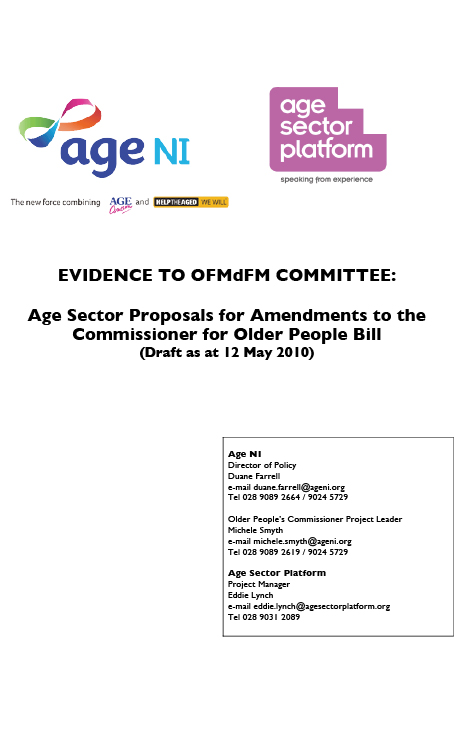
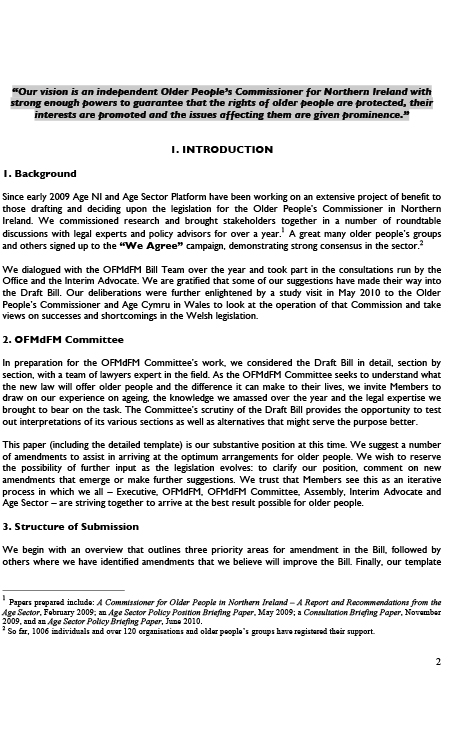
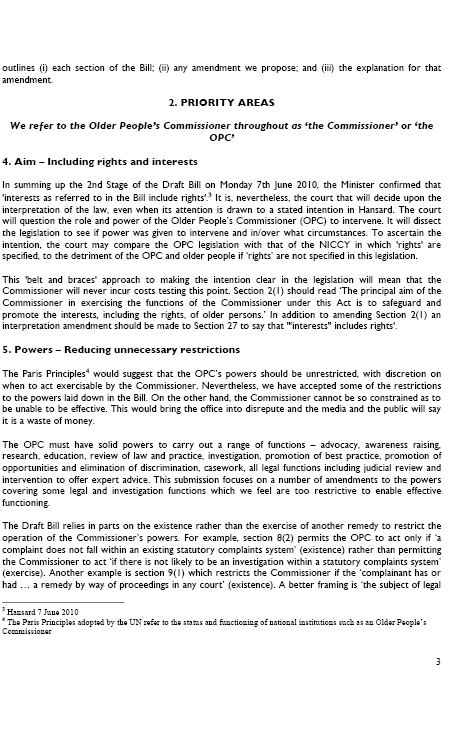
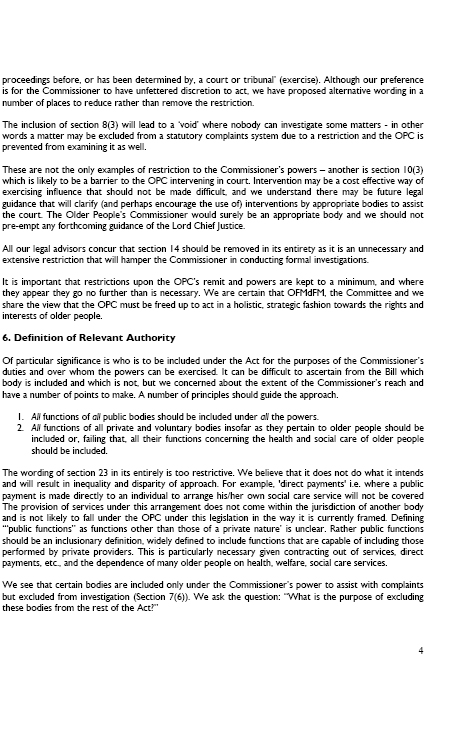

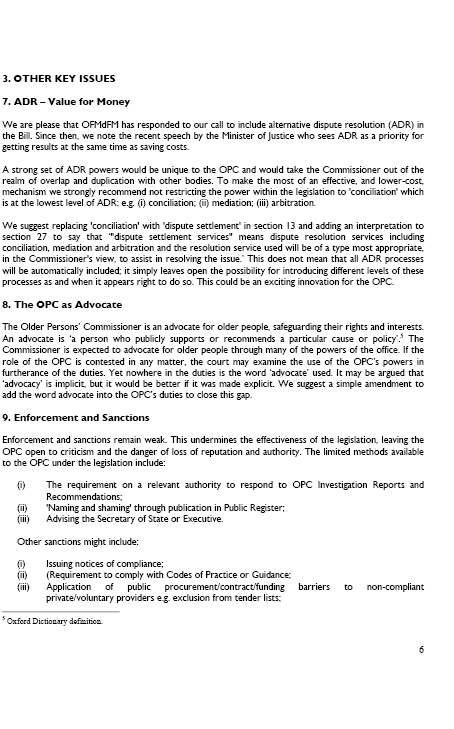
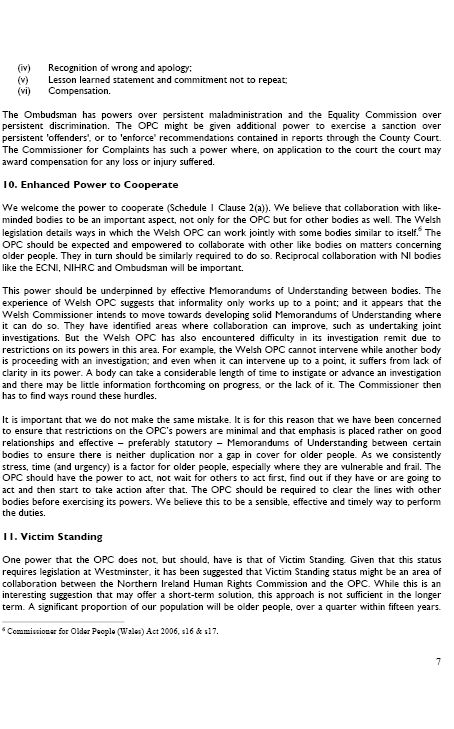
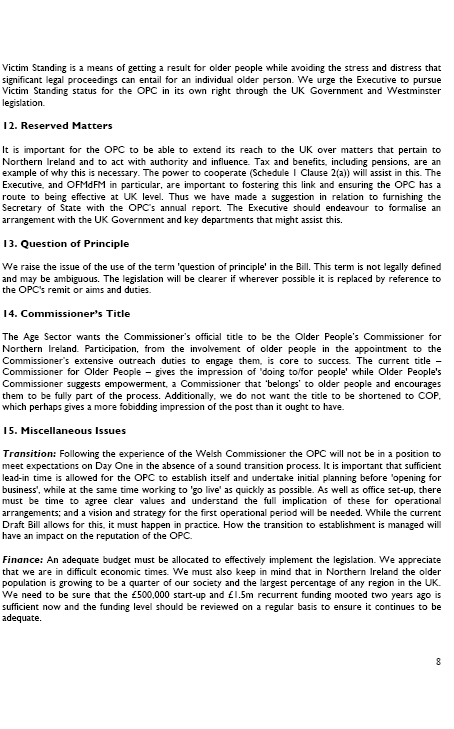
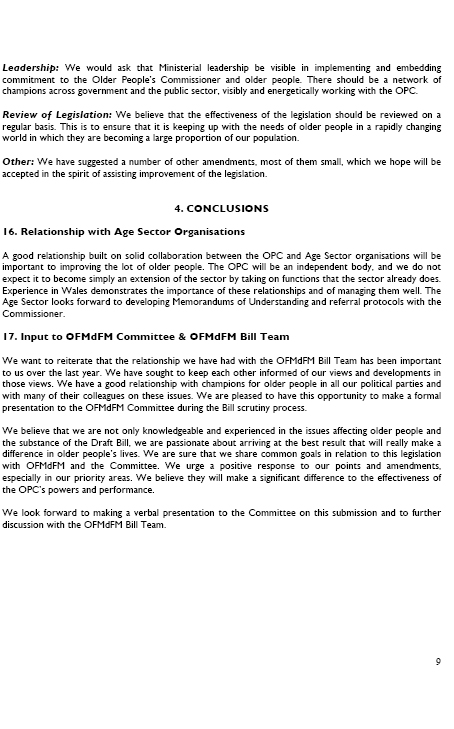
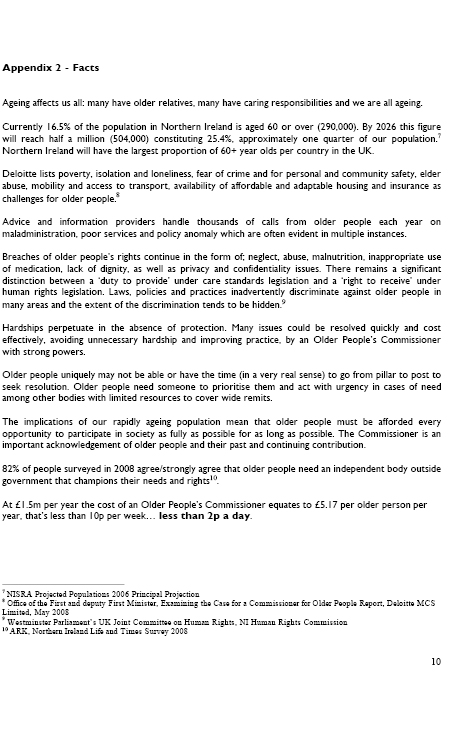
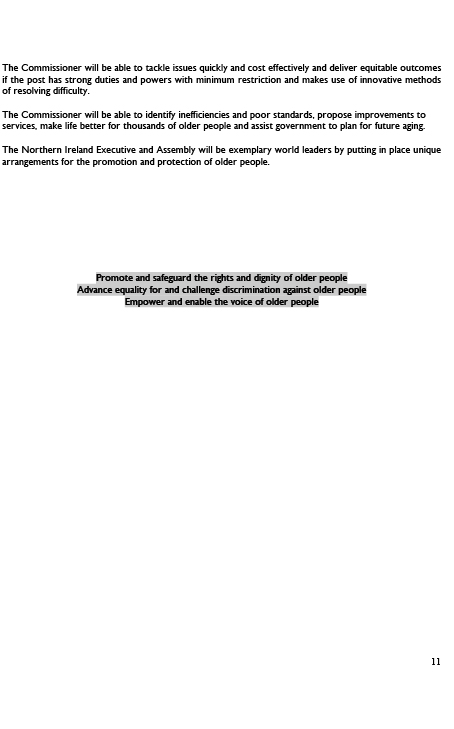
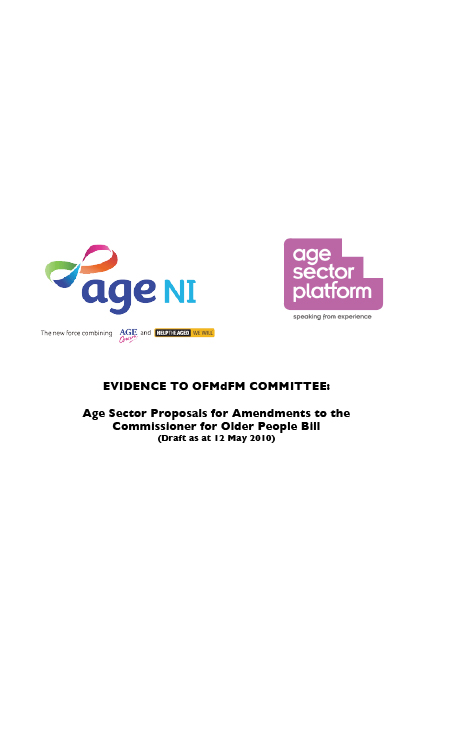
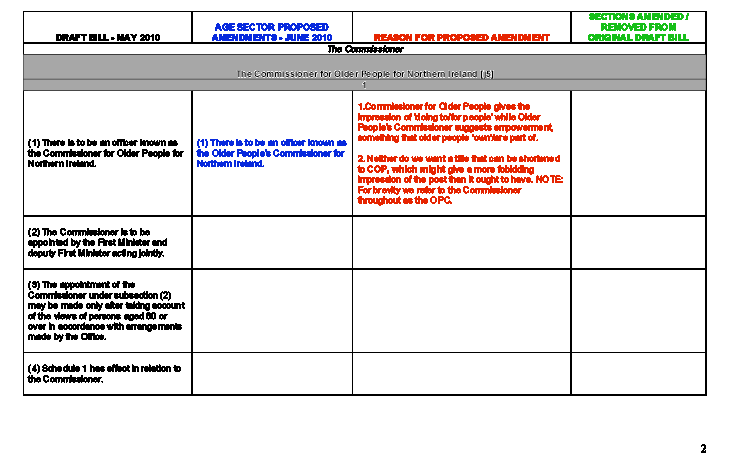
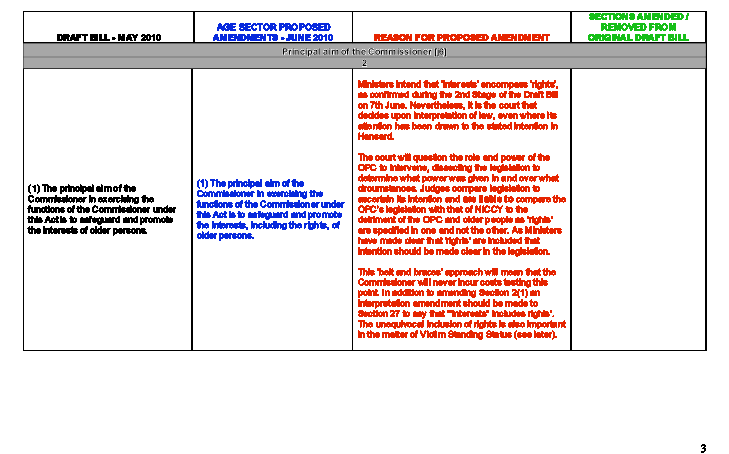
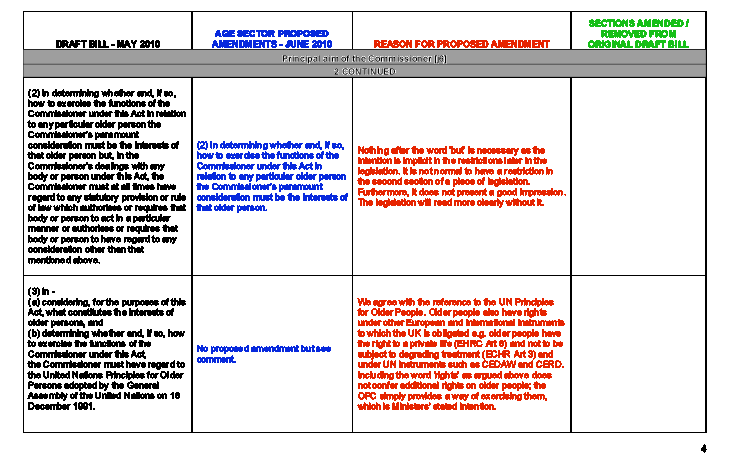
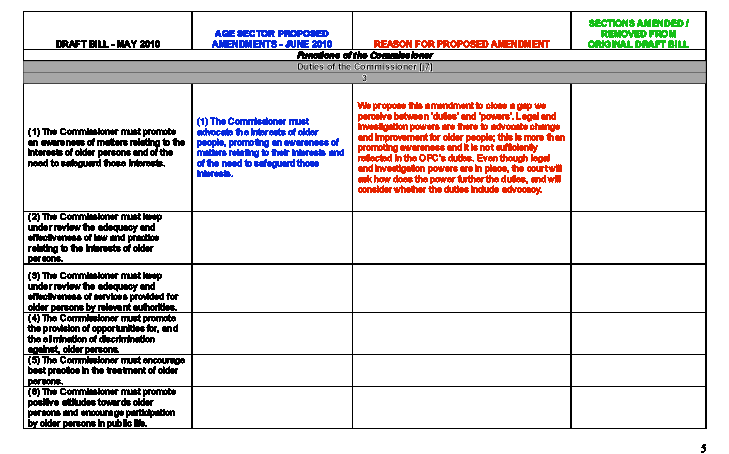
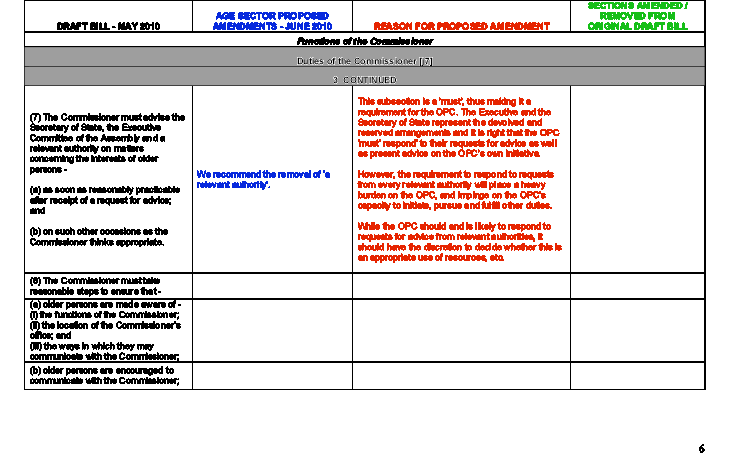
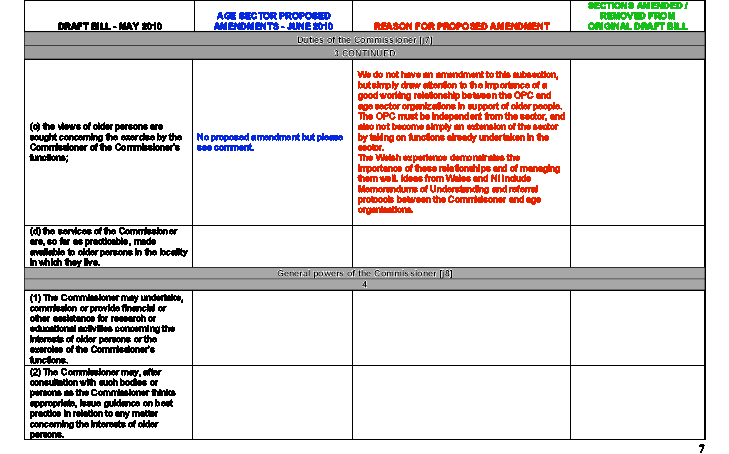



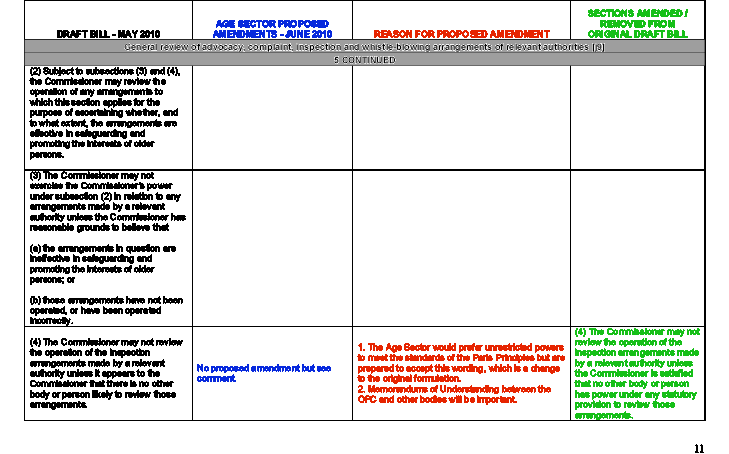


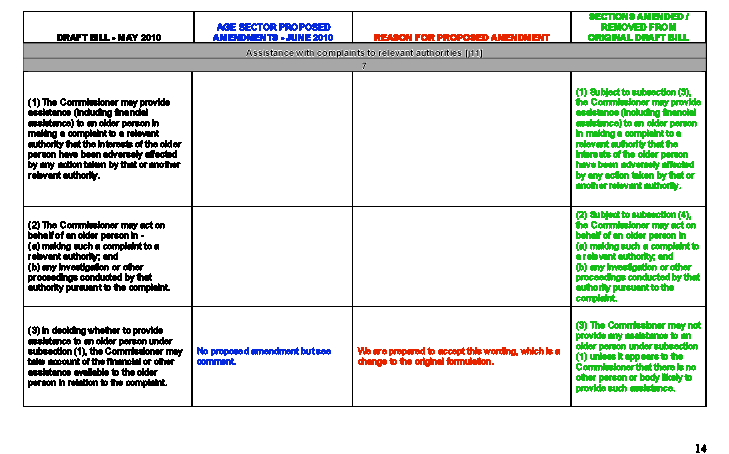
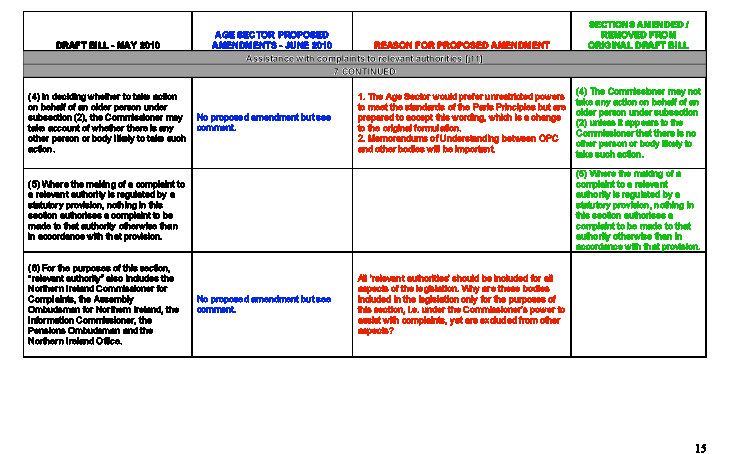
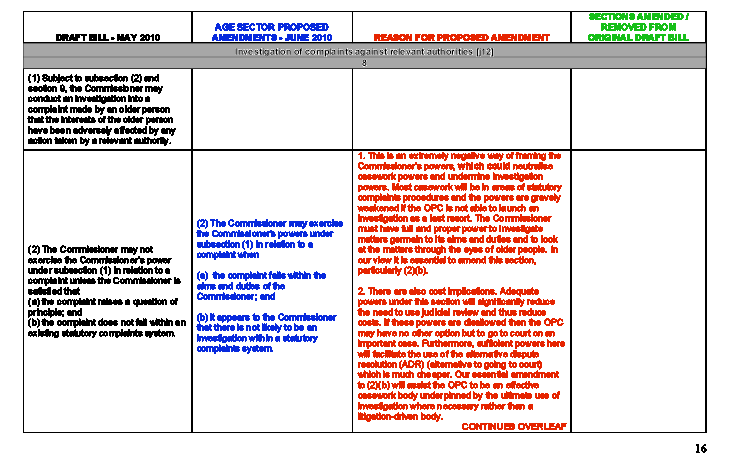
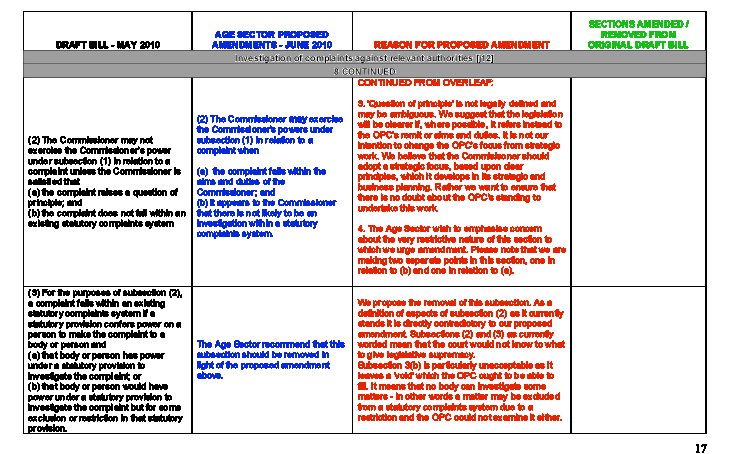
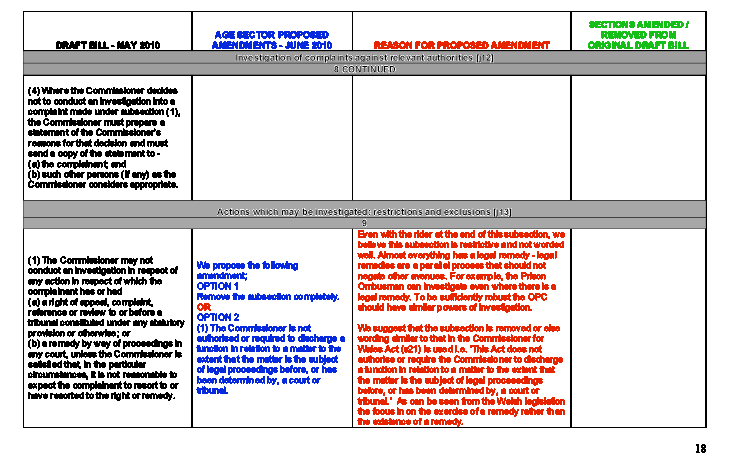


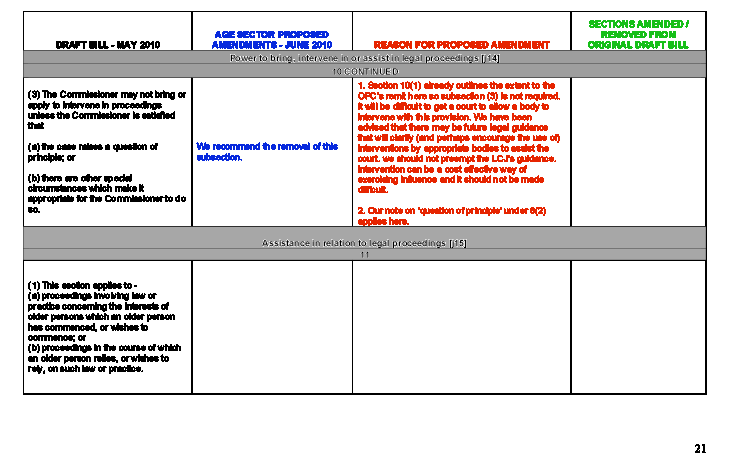
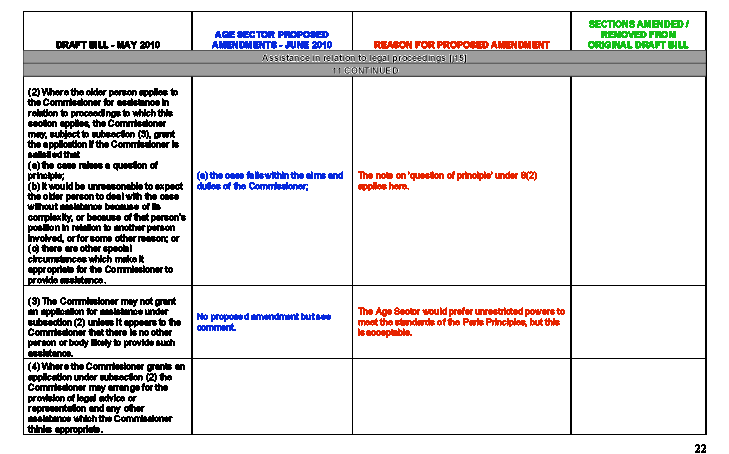
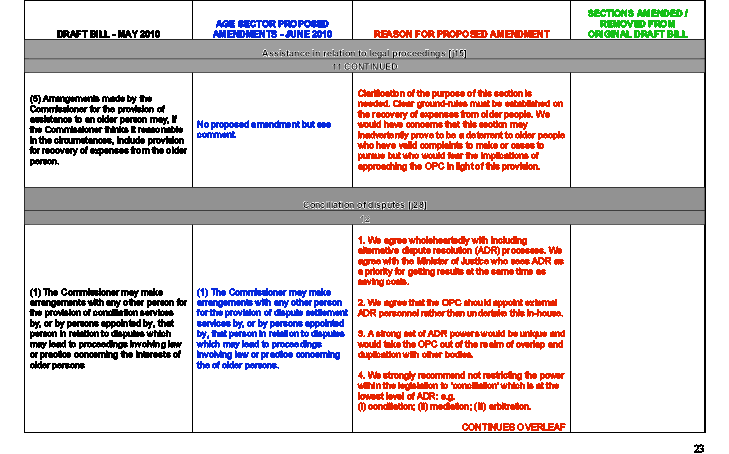
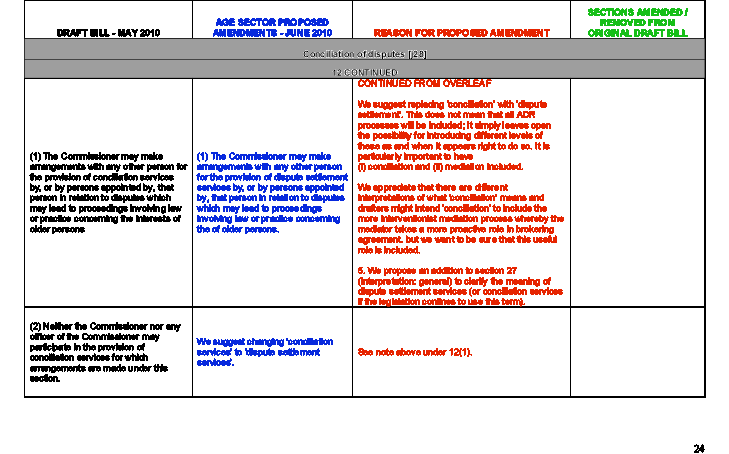
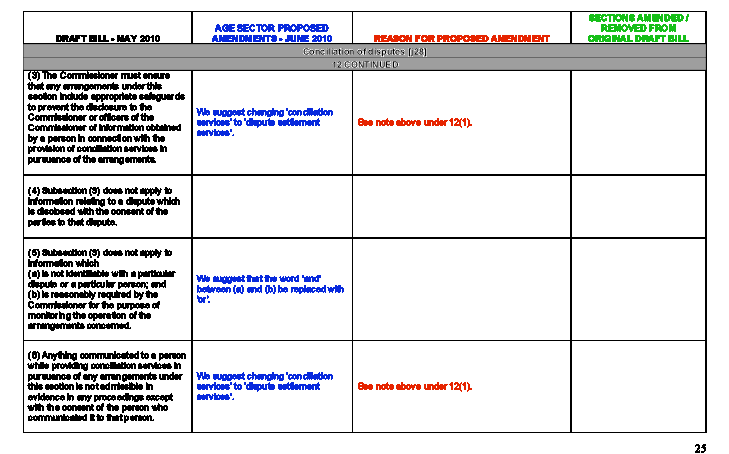
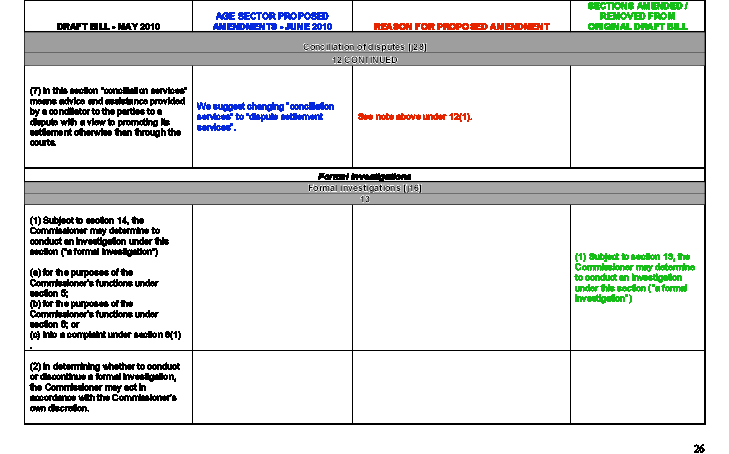
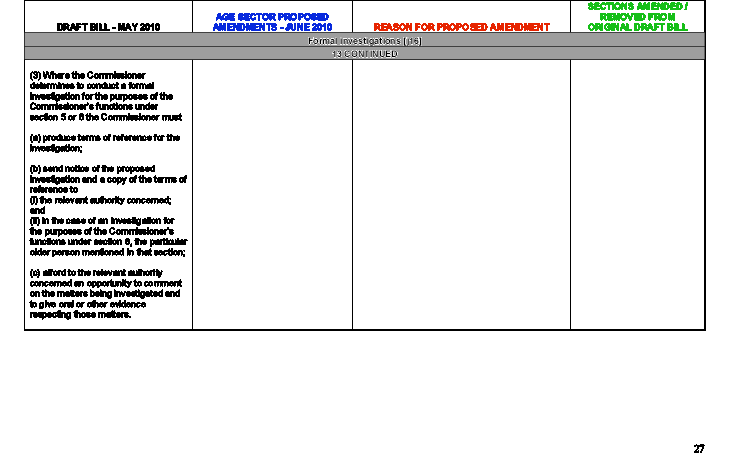
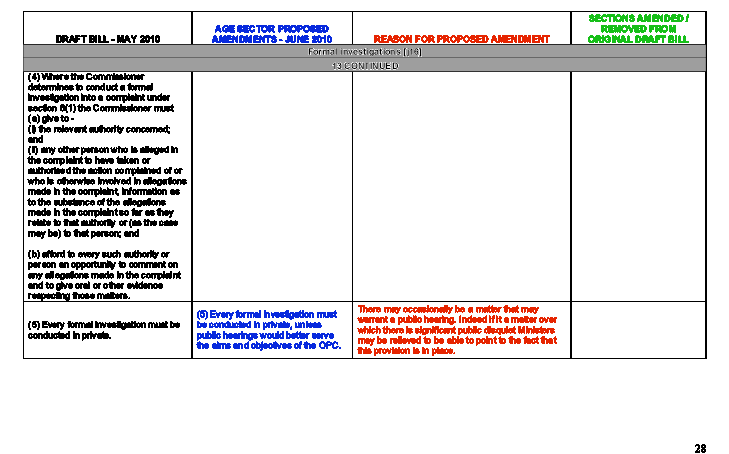

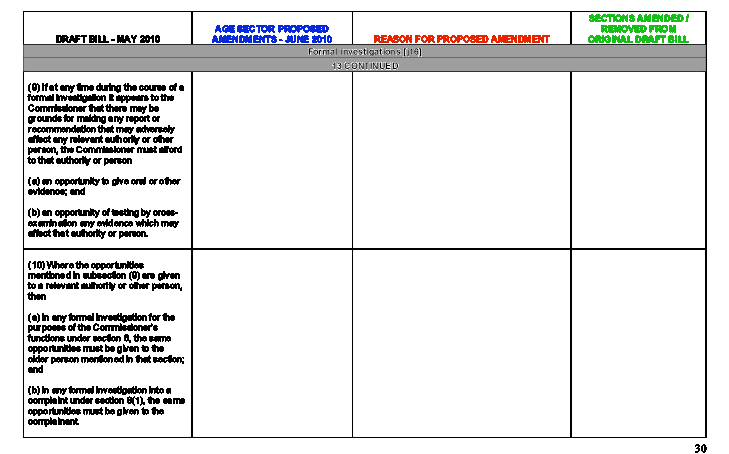

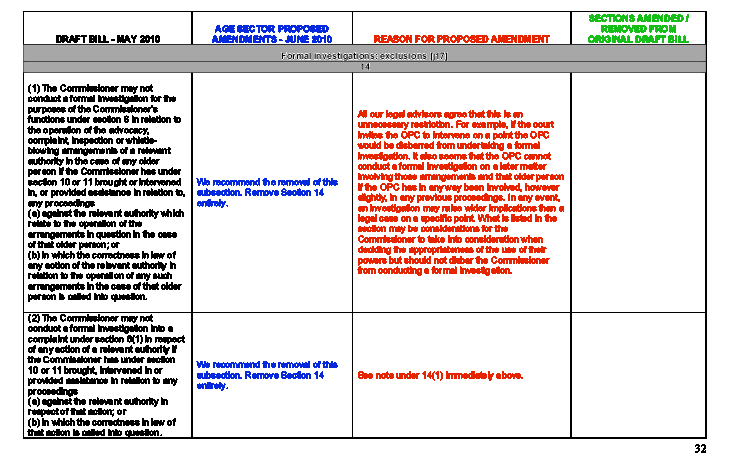
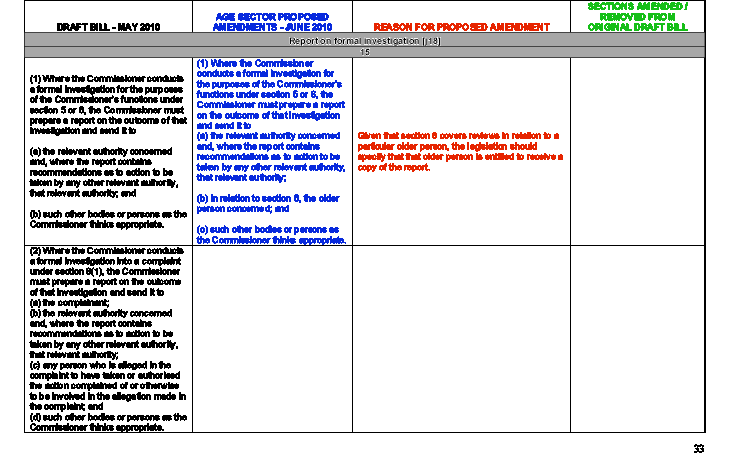

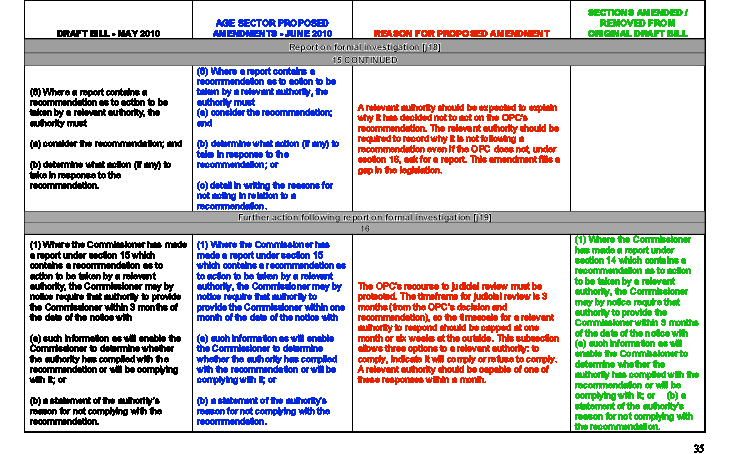
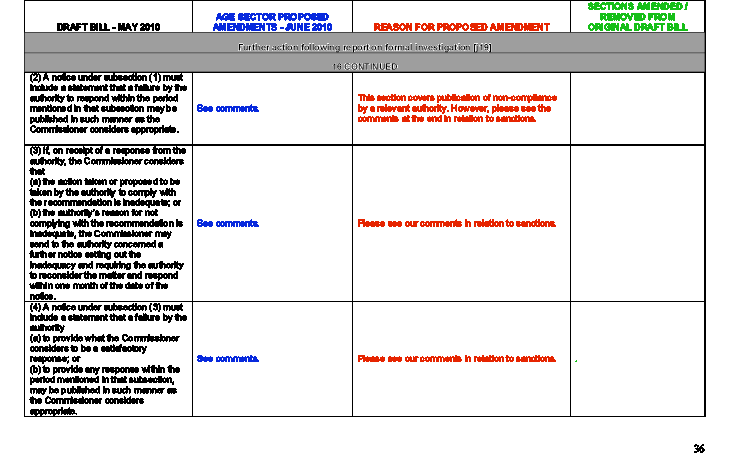
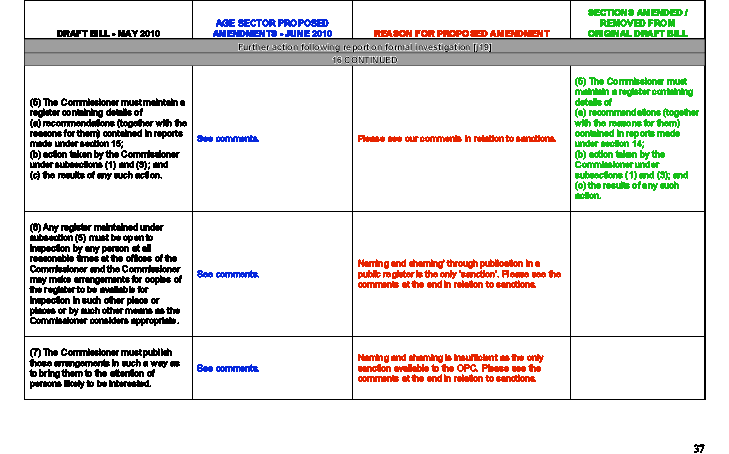

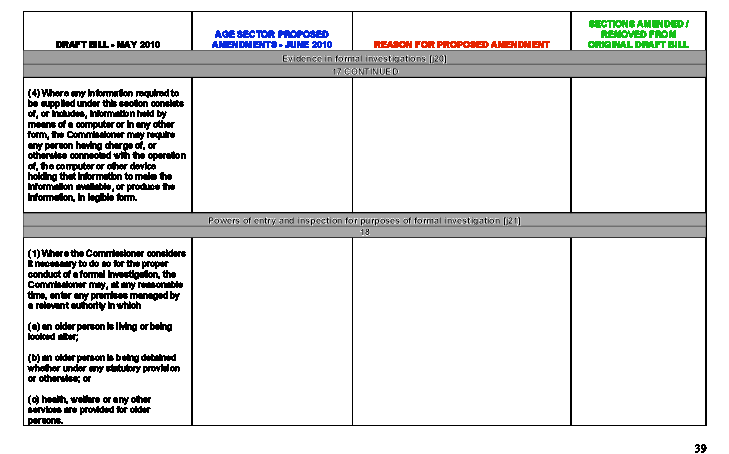
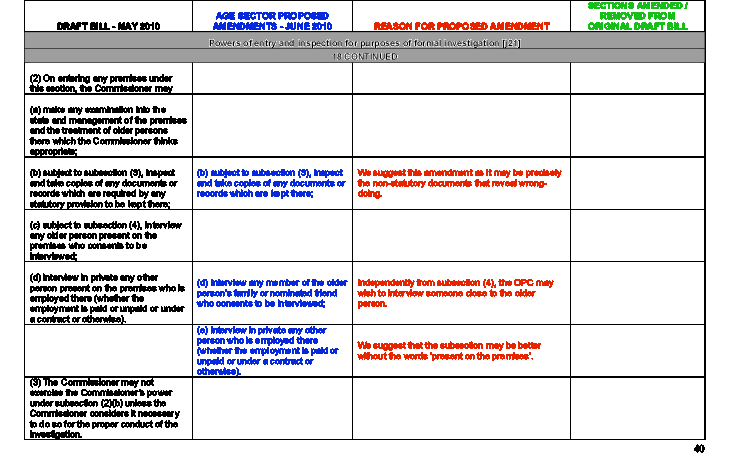



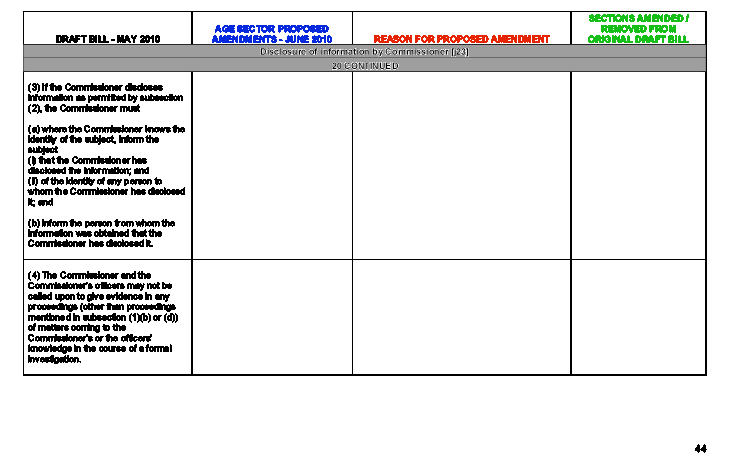
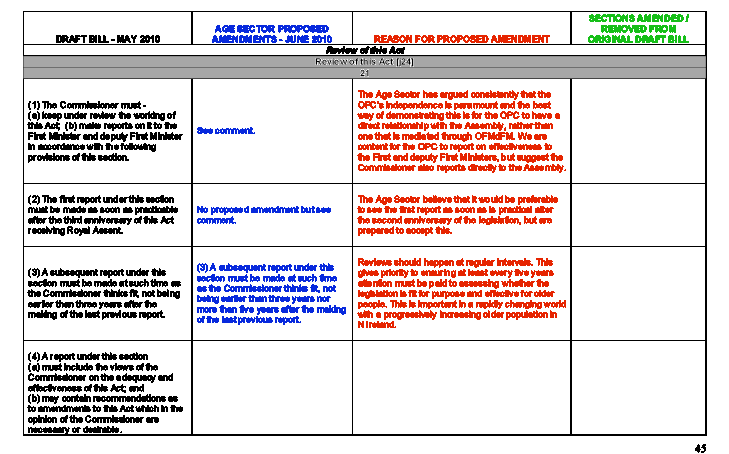
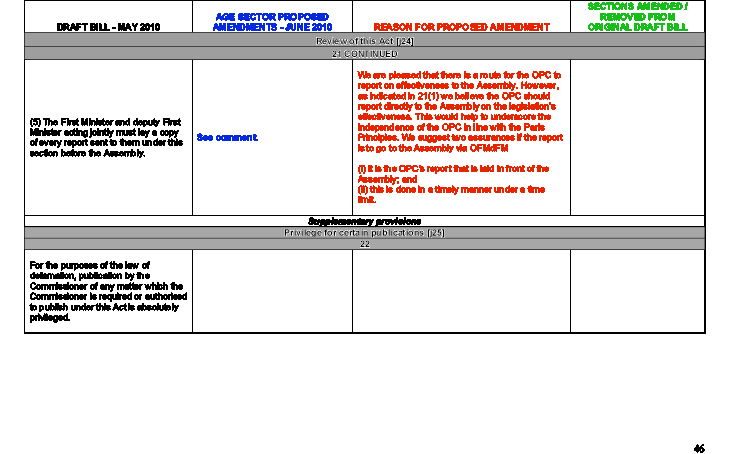
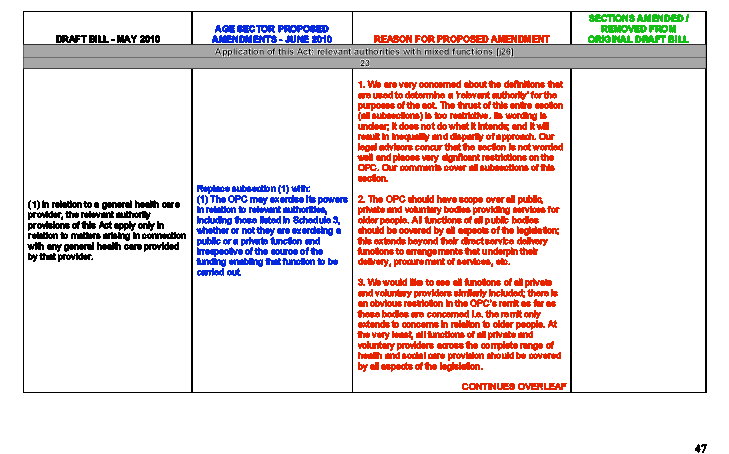
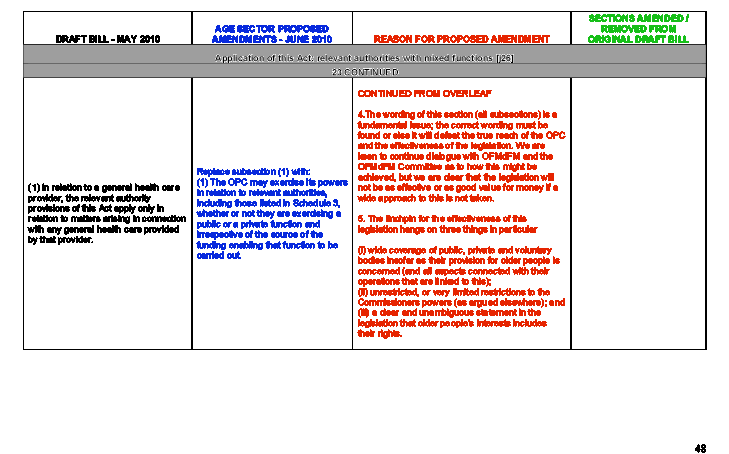
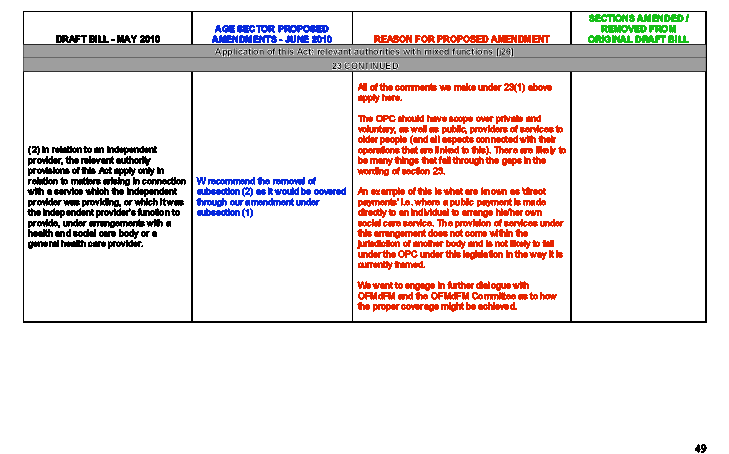
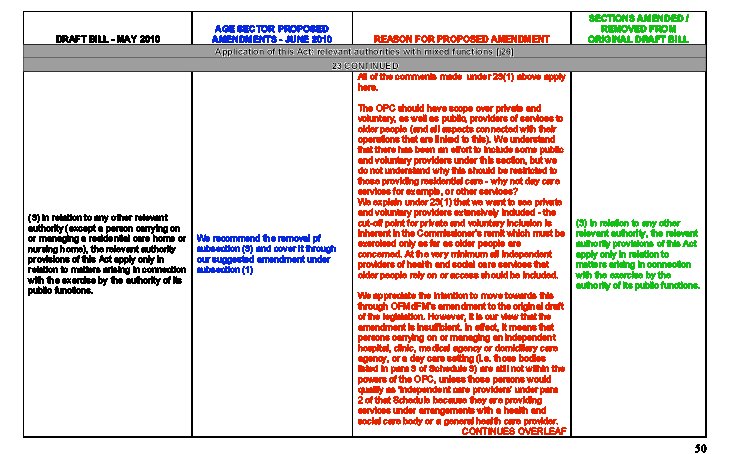
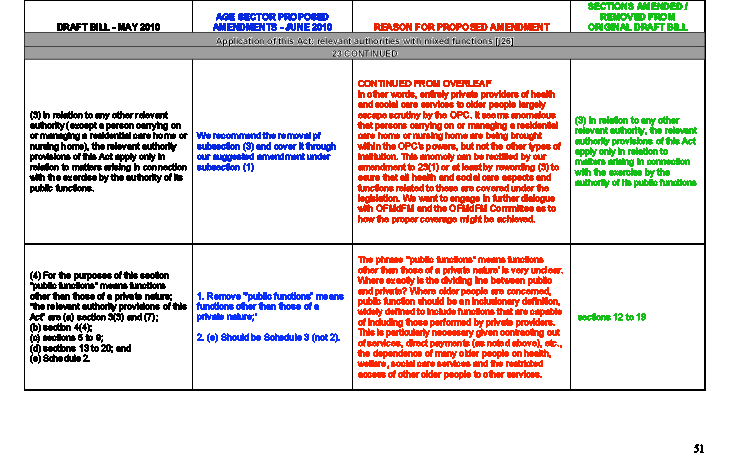
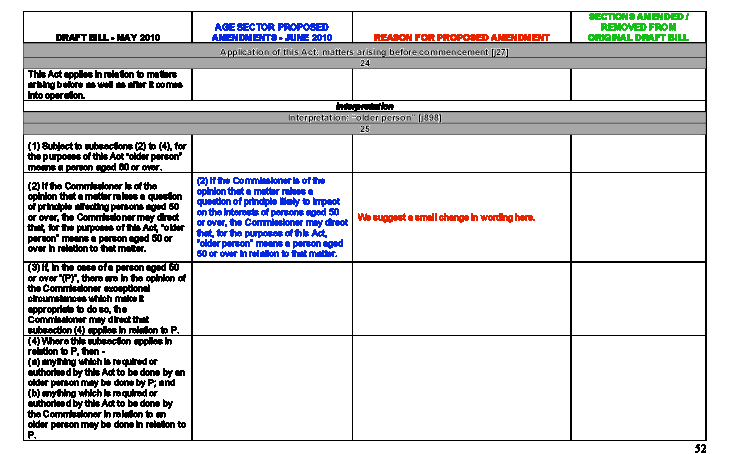
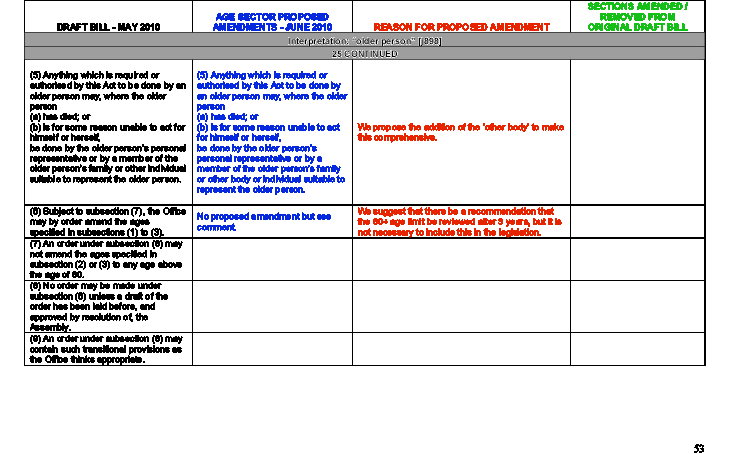
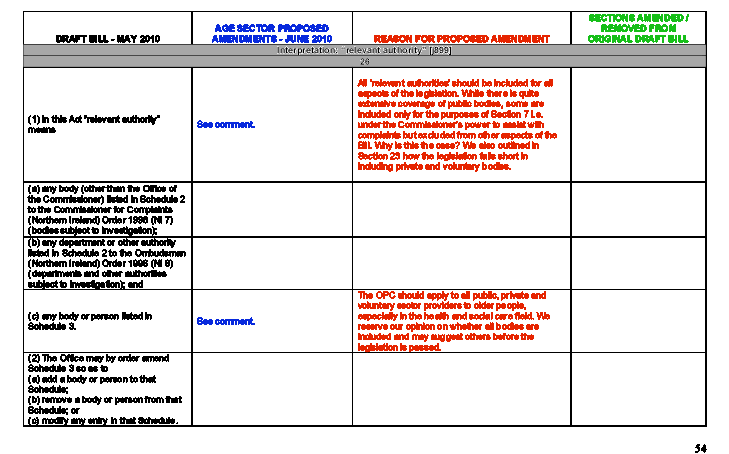
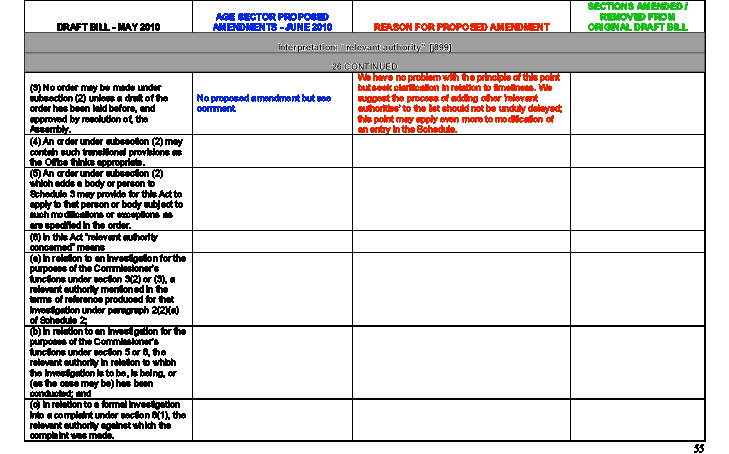
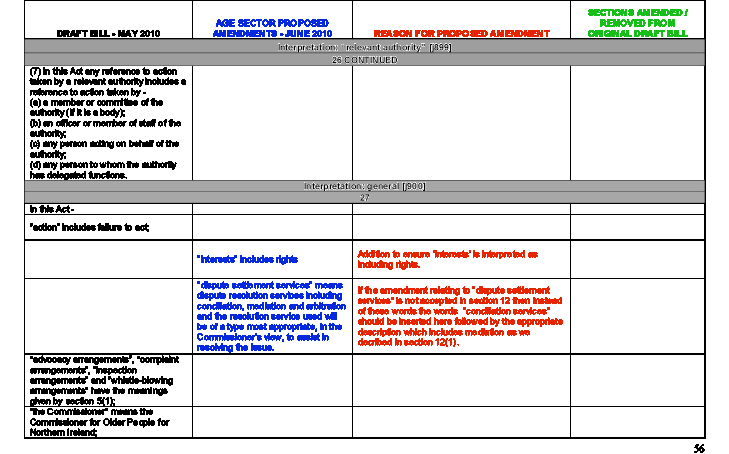
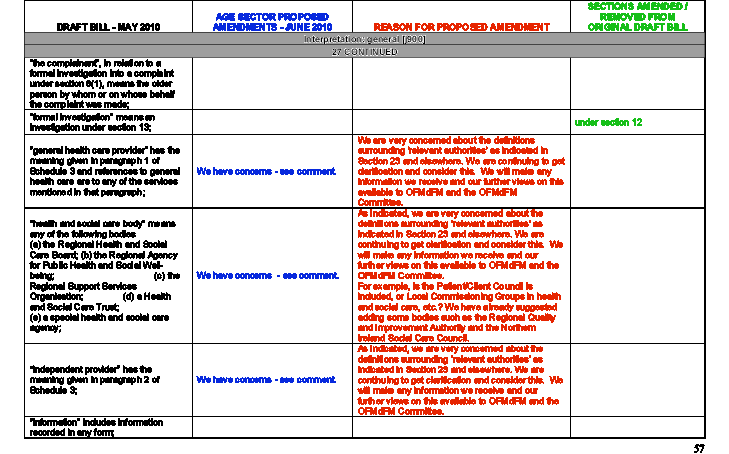
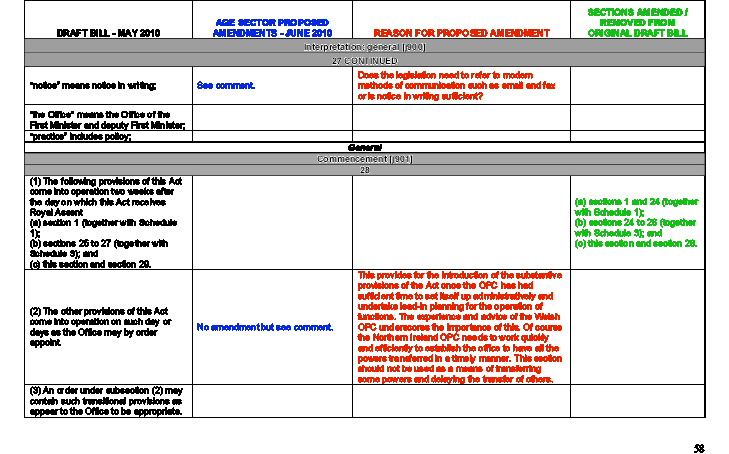
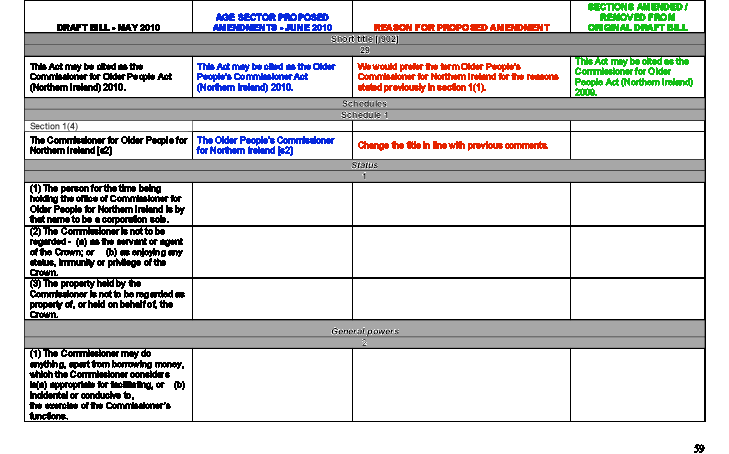
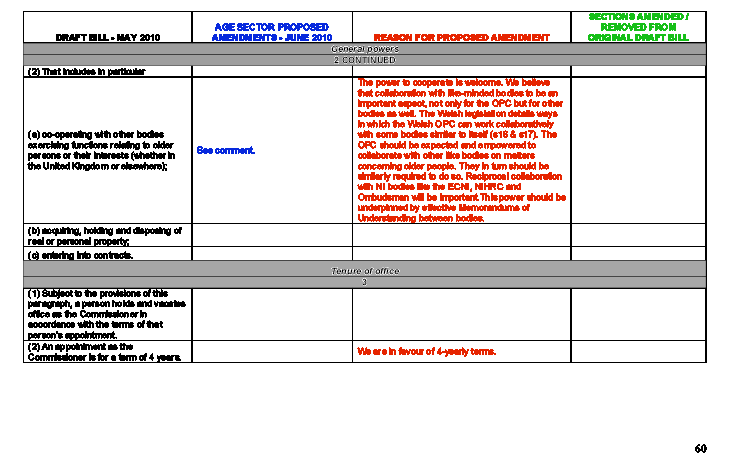
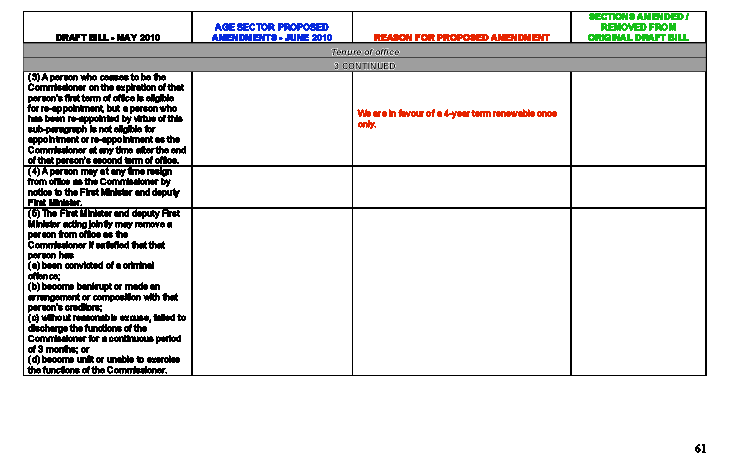
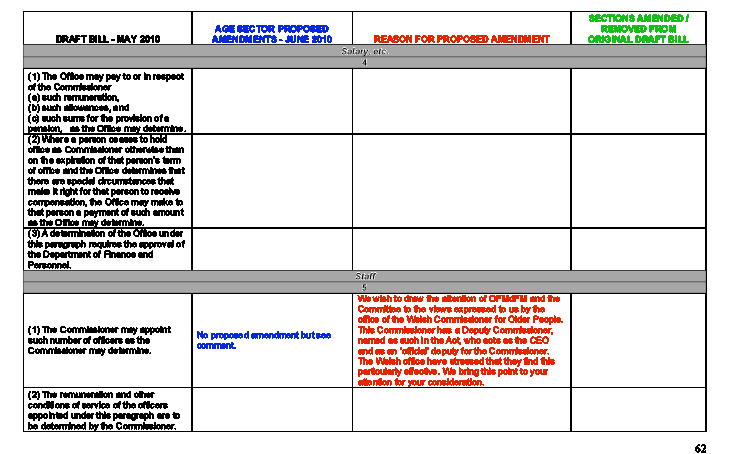
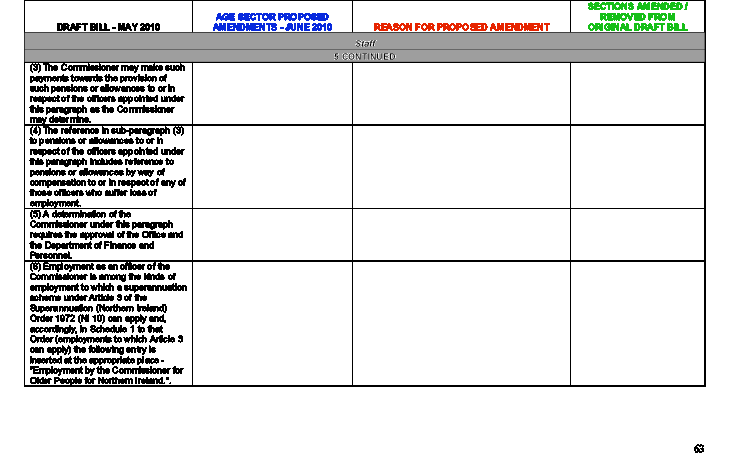
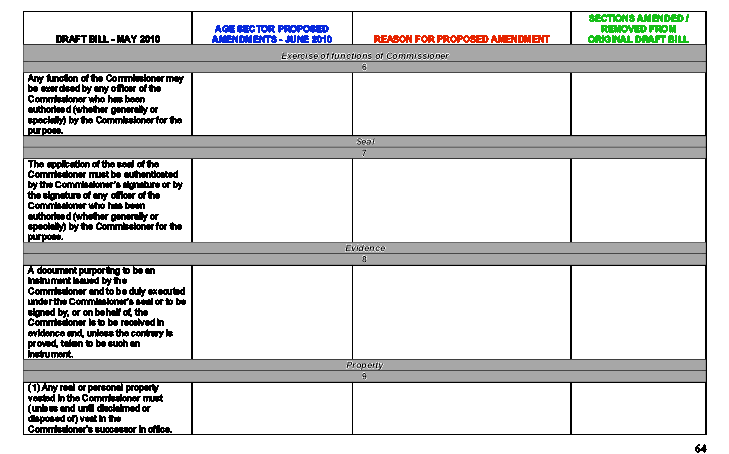
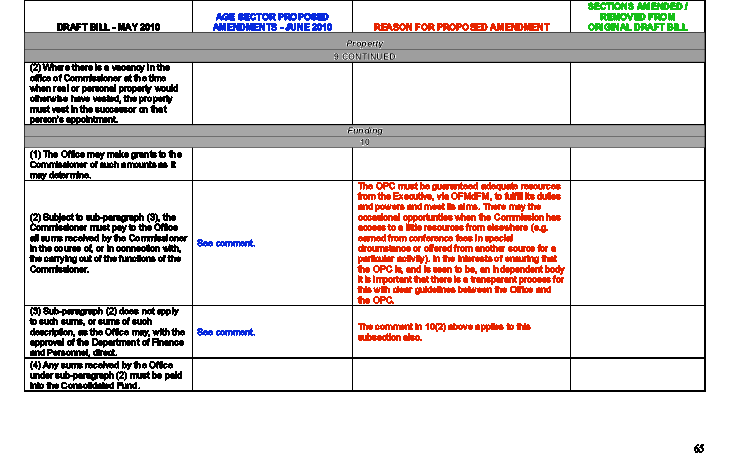
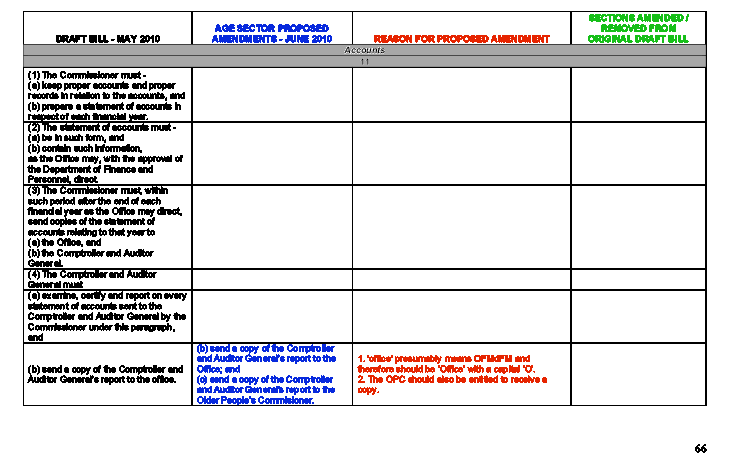
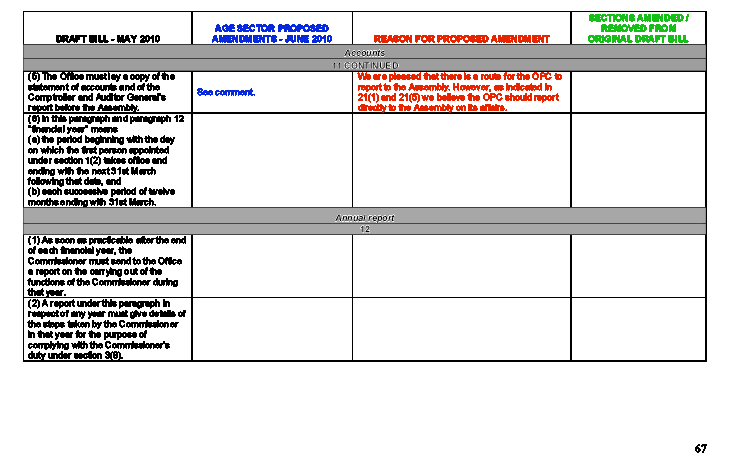
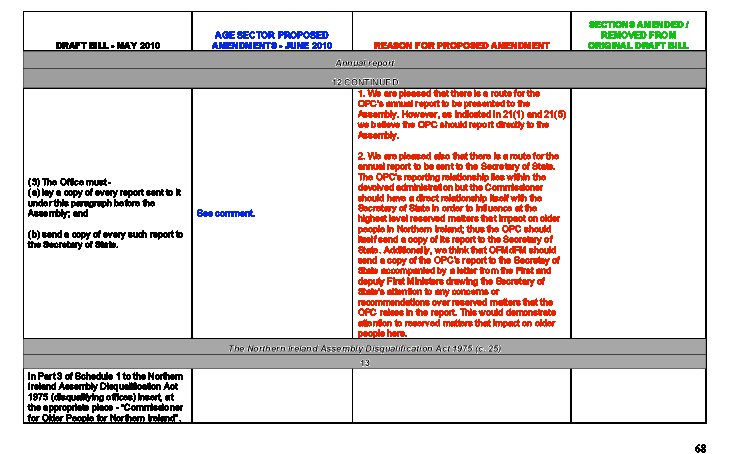
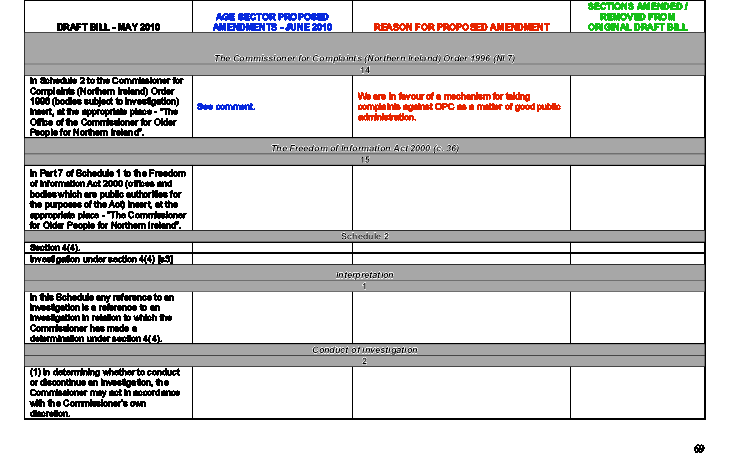
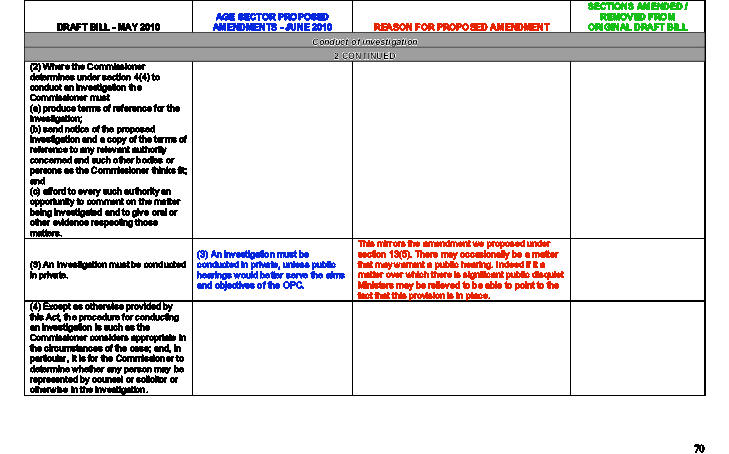
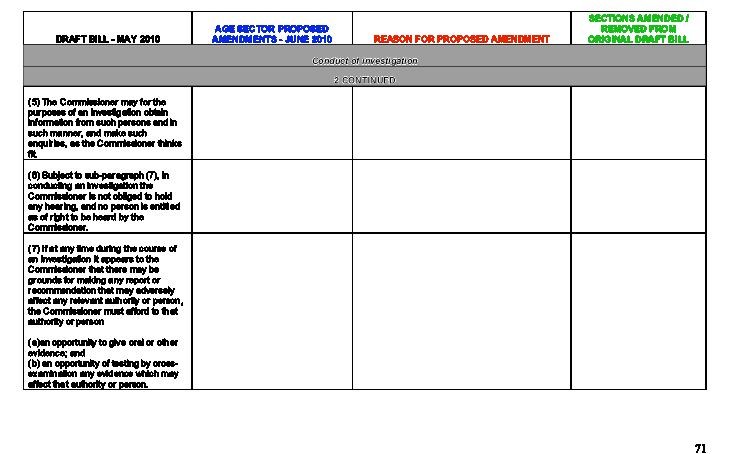

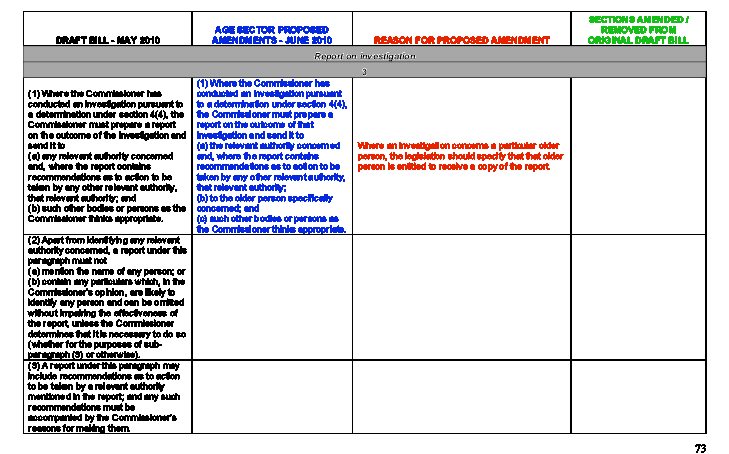
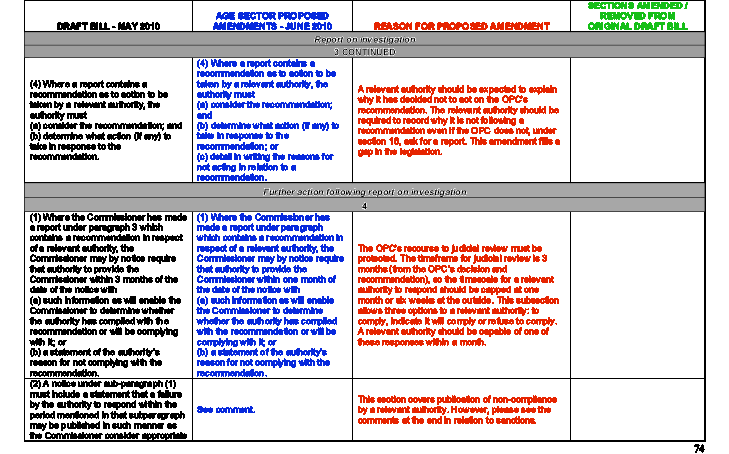
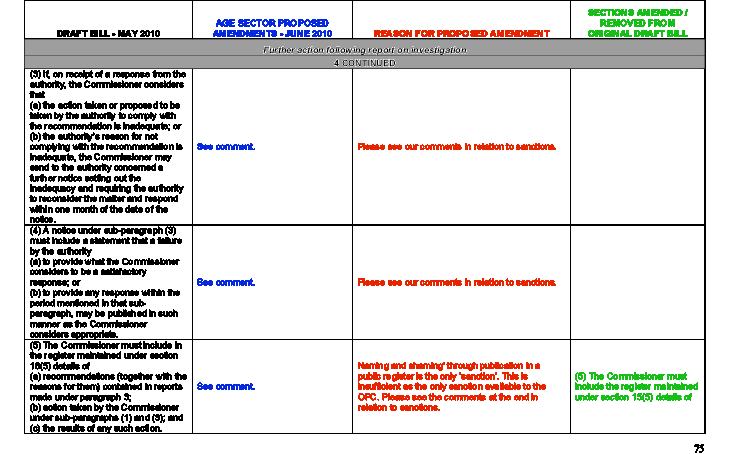
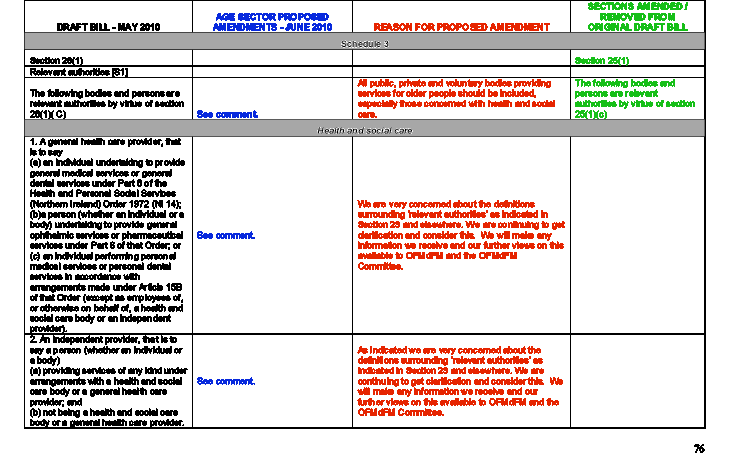
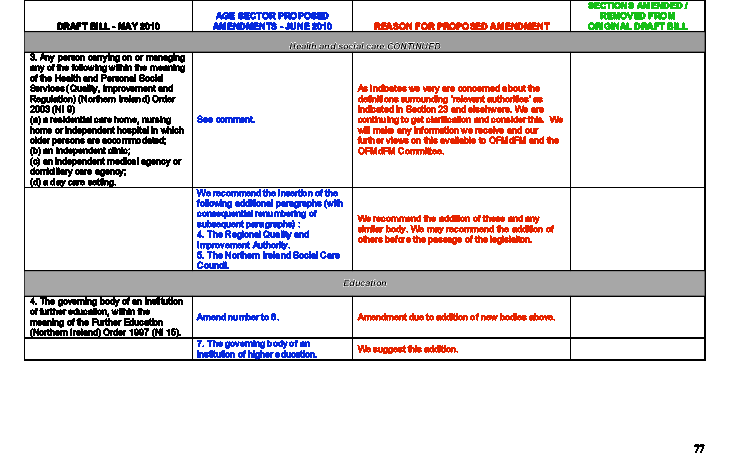
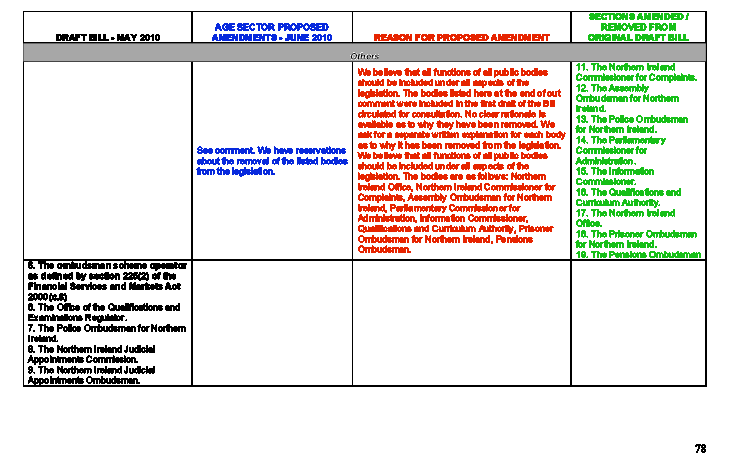
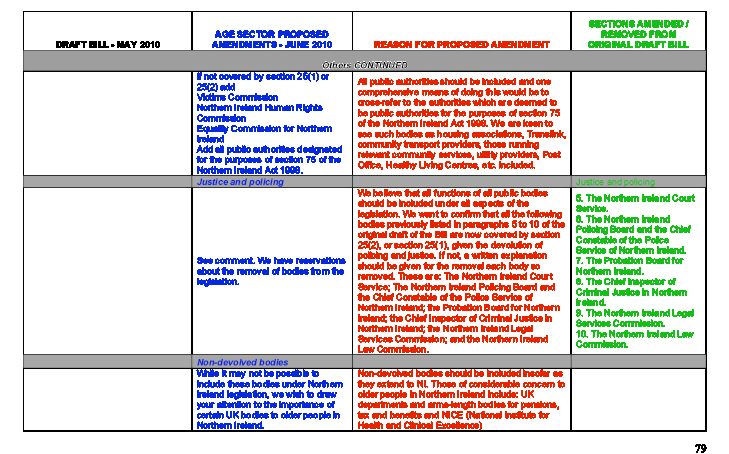
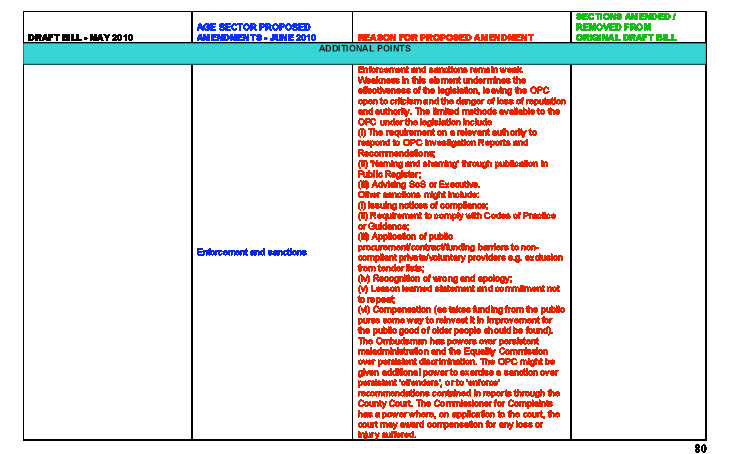

Citizens Advice supports the appointment of a Commissioner for older people in Northern Ireland. There are currently over 296,000 people of pensionable age living in Northern Ireland which represents 16% of the population. It is vital that the needs and rights of older people are represented by a dedicated Commissioner.
Citizens Advice acknowledges the aim to safeguard and promote the interests of older persons in Northern Ireland. Many of the issues that have been highlighted by the bill, including social security, fuel, transport and debt, are consistent with those presented to our own network of advisers by older people in Northern Ireland.
It is important that the Older People's Commissioner does not duplicate the work of other agencies while simultaneously providing a robust mechanism for older people to influence policy. Citizens Advice expects that the Commission will be influential in all the major areas of law, where these affect older people's lives. Once established, older people will logically approach the Commissioner's office for information and advice and it is imperative that links must be forged between the voluntary advice sector and the new Commissioner's office to ensure that a joined up approach is accomplished.
It is important that funding is not diverted away from those organisations currently supporting older people in Northern Ireland in order to establish and run the new Commissioner's Office. It is also important that any subsequent public information relating to the office will have the duties of the office identified in clear jargon-free language to prevent clients approaching the office and having to be referred to a more appropriate organisation.
Age and generalist advice charities in Northern Ireland who provide casework currently do not have the statutory basis or resources to proceed with all cases through the courts. The Older People's Commissioner should have the power to pursue legal proceedings and undertake legal casework where necessary. Taking strategic legal cases will have a wider impact for other people in similar circumstances. This casework will provide scope for future strategic reviews concerning policy, legislation and good practice.
The Commissioner should also be able to provide mediation and advocacy to assist people in a process less costly and quicker than court or tribunal proceedings. Many cases would be suitable for this recourse without the need for litigation. Citizens Advice believes that the powers of mediation and advocacy are necessary for an effective commissioner. We do not necessarily agree with the contention over conflict of interest. However if the Commissioner proceeds with the alternative option of outsourcing mediation services it would be essential that the independence of any third party is assured.
Citizens Advice supports the specific powers of review, however we would encourage the Commissioner to have clear definitions of when there is no other body to offer assistance and it is important therefore to maintain a clear understanding with other organisations. Due to the nature of disputes or complaints there are usually associated time limits and it is imperative that the complainant's issue is acted upon swiftly without them being sent to more than one organisation.
As with Clause 5 we again support this provision and would reiterate that there should be a clear understanding of when it is appropriate for the Commissioner to intervene.
Similarly we support assistance with complaints but would dispute the condition that the Commission again will only act in the occasion that no other body is available to assist.
We would question why cases can only be investigated on a point of principle and recommend that the Commissioner is given full powers of investigating complaints.
The process of carrying out an investigation can be enough to resolve a dispute in some cases, however there will be many cases where the incidence of making recommendations to an authority will simply not be enough. The Commission will need harsher actions and a system of compliance with strict time limits and penalties.
We support the power to bring, intervene in and assist with legal proceedings but would again recommend a clear definition of managing overlap in powers with regard to separate procedures.
Citizens Advice fully supports the Commissioner assisting those seeking legal proceedings. The issue around "Victim Standing" is a vital power for the Commissioner to be able to bring cases in their own name. Older people are a particularly vulnerable group and research shows that they have limited access to legal advice. Many individuals would be unwilling or unable to appear in court so this reinforces the need to endow victim standing.
Citizens Advice supports the facility of providing conciliation services and, similarly to our points made in respect to mediation, there needs to be Memoranda of understanding as proposed by the Age Sector Platform
Citizens Advice supports this clause
Citizens Advice would like to seek further clarification on this clause in relation to matters 'previously' brought, intervened in or sought legal assistance on. There may be valid instances where further evidence or a change of circumstances has come to light.
Citizens Advice supports this clause
See clause 9
Citizens Advice supports this clause
Citizens Advice supports this clause
Citizens Advice supports this clause
Citizens Advice supports this clause
Citizens Advice supports this clause
Citizens Advice supports this clause
Citizens Advice supports this clause
Citizens Advice supports this clause
Citizens Advice supports this clause
Citizens Advice supports this clause
No comments
No comments
No comments
Citizens Advice is the largest advice charity in Northern Ireland working against poverty, meeting the information and advice needs of some 92,000 people per year and dealing with over 324,000 issues.
Citizens Advice Northern Ireland has formal links to National Citizens Advice in England and Wales and close working relationships with Citizens Advice Scotland (CAS). Together the three associations constitute the largest advice network in Europe, with over 60 year's experience of providing advice and information to the public. Citizens Advice also works in partnership with the Citizens Information Board in the Republic of Ireland to provide cross border advice and information.
The CAB network is very finely tuned to the targeting of social need and, with its regional spread, modern integrated IT infrastructure and skilled staff, represents an efficient and cost effective channel for the delivery of information and advice to the most socially vulnerable people in Northern Ireland.
Advice is provided on a huge range of issues by trained, specialist advisers across both main communities and to minority groupings from 28 main offices and from some 120 other outlets within the framework of 4 principles. The advice given is:-
To ensure that advice and information are as accessible to as many people as possible the services of Citizens Advice are available through local CAB offices, online at www.adviceguide.org.uk, by e-mail, by telephone and in many community venues such as health centres, hospitals and community centres. In addition, the majority of CAB offices also provide home visits for those who are unable to access their local office due to health problems.
In June 2008 Citizens Advice was awarded a tender to increase the uptake of social security benefits for vulnerable people in Northern Ireland. Since 2005 an additional £27 million of annual benefits and arrears has been paid to Social Security Agency (SSA) customers through benefit uptake programmes.
The Benefit Uptake project aims to assist some of the more vulnerable client groups across Northern Ireland, a substantial number of whom required additional support to maximise their benefit entitlement. Many were at risk of, or already experiencing poverty and social exclusion. As older people are one of the most vulnerable groups in society, they are one of the primary beneficiaries of this project.
In 2008 Citizens Advice became the sole provider of the Benefit Uptake Programme. Upwards of 25,000 customers were contacted under the three categories as part of the project. This programme resulted in an additional 1,800 claims for benefit being identified which amounted to £5.7 million annually. People who benefited from the project were on average better off by £50 per week with average arrears of benefit of £822.
Case StudyAn elderly couple were referred to Fermanagh CAB through the Rural Exercise of the 2008 Social Security Benefit Uptake Project. The couple were referred to the bureau as they were aged over 75, in receipt of State Retirement Pension, but not Pension Credit and they live in a rural area where at least 80% of houses are owner-occupied. They were of the opinion that because they had State Retirement Pensions and Work Pensions, they were not entitled to any Social Security benefits. Fermanagh CAB undertook a home visit to carry out a benefit entitlement check for the clients in September 2008. Following this the bureau assisted the clients with making individual claims for Attendance Allowance, as well as with a joint claim for Pension Credit. By December 2008 both clients had received decisions on these claims receiving awards of low rate Attendance Allowance respectively, and they also became entitled to Pension Credit. This increased their weekly income by £227. The clients said they never would have approached the SSA themselves about claiming benefits and they are delighted with the outcome. |
Macmillan Cancer Support has been working with Citizens Advice to deliver a Welfare Rights Service in the Royal Victoria Hospital (RVH), the Belfast City Hospital (BCH) and the Mater Hospital. The service is delivered by Citizens Advice Belfast with the aim of providing dedicated advice to both patients with cancer and their families. Independent surveys have consistently identified that people with cancer list money worries as second only to pain as a source of stress. This service therefore specialises in an area where greater needs have been identified.
Over the past two years the RVH and BCH have helped approximately 1,800 clients. The total additional benefits claimed and received by clients is over £2.5 million.
Case StudyA client of the Macmillan CAB is a 57 year old woman with terminal cancer. She is married and her husband is also ill with heart problems. They live in a NIHE house and have no dependent children. They are in receipt of Pension Credit and full Housing Benefit with access to the Social Fund and NHS costs. The Macmillan CAB adviser applied for Disability Living Allowance for the client under the Special Rules and she was awarded High Rate Care and High Rate Mobility a total of £109.50 per week. The client leased a motability car and obtained free road tax, free insurance and a blue badge. The Macmillan CAB adviser also advised and assisted her husband to apply for Carer's Allowance as an underlying entitlement and this increased their income by the Carer's Premium of £27.15 per week. Overall the Macmillan CAB increased the client's income by £136.65 per week. |
Evidence received from CAB Managers and advisers suggested that there were a number of barriers to people making a claim for benefits, namely the complexity of the benefit system and clients confusion about benefits generally relating to privacy and stigma. This was particularly the case for older people.
In the words of the Manager of Newtownabbey District CAB:
"Older people find themselves quite isolated on the whole and the process of claiming benefits is too much for them so they continue to manage on very low incomes."
In submissions to a national inquiry the following reasons for poor take-up amongst pensioners noted similar findings:
Citizens Advice Northern Ireland is pleased to take this opportunity to respond to the Office of the First Minster and Deputy First Minister's consultation on A Commissioner for Older People.
The consultation paper outlines the proposed role and powers of the Commissioner for Older People, as well as giving some detail about the administrative elements of the proposed new post.
There are currently over 296,000 people of pensionable age living in Northern Ireland. That figure represents over 16% of the total population. By any measure this is a sizeable proportion of the population and one which is only likely to increase, given decreasing mortality rates. Some estimates state that by 2050, almost 45% of the population in Northern Ireland will be aged over 50. Citizens Advice therefore believes it is vital that the needs and rights of older people are represented by a Commissioner.
Citizens Advice supports the consultation paper in its assertion that the needs of older people are many and varied. Many of the issues highlighted in the consultation document (including health and social care, access to social security benefits, housing, debt, in particular fuel debt, isolation and transport) are consistent with those presented to Citizens Advice by older people throughout Northern Ireland.
Whilst organisations within the voluntary sector aim to assist those seeking advice and information, it is clear that older people may be being underrepresented when it comes to policy making influence.
Assembly members have acknowledged that "older people are an important resource and one the Executive is committed to nurture."
Despite this claim around 28% of pensioners in Northern Ireland still live in poverty and 64% of people agreed that older people are discriminated against as a result of their age. These figures highlight the urgent need for the establishment of a Commissioner with sufficient powers to protect the interests of older people, uphold their rights and act with urgency where appropriate.
It is however imperative that the development of local advice and information services must go hand in hand with any proposed changes to an established system. Without suitable advice and support for those who need it any new systems set up will not be able to effectively assist those it has set out to support. Citizens Advice feels strongly that links must be forged between the voluntary advice sector and the new Commissioner's Office to ensure that a joined up approach can be more easily accomplished. Citizens Advice would envisage that the Commissioner's Office would act as a source of assistance to the work of advisers in bureaux. Conversely we would hope that the Commissioner would feel able to contact Citizens Advice Regional Office or individual bureaux for assistance and/or specialist advice when required. This goal will not be achievable without established links and strong ties between the respective organisations.
Assembly Members who work closely with advice organisations recognise the value they bring to society, with one member saying recently: "There is little doubt that the Voluntary and Community sector is often best placed to identify those who may be in need of help." Whilst any future Commissioner's Office will undoubtedly be well placed to campaign and lobby on behalf of older people, it will require the assistance of established voluntary sector organisations, such as CAB, to identify issues, provide information and advice and bring forward individuals who require help and support.
While CAB strongly endorses the establishment of the Commissioner as well as supporting the proposed powers that have been outlined in the consultation document, it is important that funding is not diverted away from those organisations currently supporting older people in Northern Ireland, in order to establish and run the new Commissioner's Office.
Indeed the consultation document proposes that, due to potential conflicts of interest, the Commissioner will not have powers of mediation or arbitration. Citizens Advice believes that the power to mediate on issues of contention between service providers and older people is a must have for an effective Commissioner. If the new Commissioner's Office is to have no mediation and/or arbitration powers it could be viewed as being powerless to assist those who are most in need of help. The public may be reluctant to share their problems and seek advice from a body which it feels can ultimately be of no great assistance in solving their problem. If the Commissioner is truly to be an advocate for older people it must at the very least have the right to mediate on their behalf. Being able to respond to older peoples' concerns in a meaningful way is central to the credibility of the Office of the new Commissioner.
The question of arbitration is perhaps more difficult. Citizens Advice notes the views of organisations working specifically for older people that an arbitration function is central to the effectiveness of the new Commissioner, especially in cases of extreme urgency. However, we also note the high likelihood that this could create conflicts of interest and difficult working relationships with the providers of services for older people. These are problems that must be avoided if the Commissioner is to be able to successfully promote the needs and rights of older people. A good working relationship with service providers will be imperative if this is to be the case. This will be difficult to achieve if those same service providers feel that the Commissioner's Office is "against them" on certain matters. Consequently while we feel strongly that mediation powers are a must for the Commissioner's Office we accept that it may not currently be feasible to include powers of arbitration in this remit.
The consultation document's suggestion that the Commissioner should be able to financially assist those seeking mediation or arbitration services is one which CAB would very much support, particularly in light of recent research to suggest that older people in Northern Ireland have limited access to information about legal advice.
This issue about access to legal advice is also pertinent to the question of "Victim Standing" posed in the consultation document. The consultation document correctly asserts endowing the Commissioner with "Victim Standing" would mean that they could initiate Human Rights cases in her/his own right, without involving a specific older person (i.e. be able to take the case in its own name). Without victim standing the Commissioner could only become involved in such a case where s/he was assisting someone or making an intervention in a relevant case. Citizens Advice feels that it should be a function of the Commissioner to be able to bring cases in their own name. Older people are a particularly vulnerable group and as stated above have limited access to legal advice. They may also be unwilling or unable to present as a witness in court.
However we also recognise the current legislative obstacles to endowing the Commissioner with Victim Status, and that it may not be possible to overcome these obstacles at this time.
Citizens Advice supports the Consultation document's proposals regarding the establishment of the Commissioner for Older People in Northern Ireland. We feel that the new Commissioner must have wide ranging powers including but not limited to the power to:
1. Act independently from all other Government and public authorities;
2. Act on behalf of older people in ALL areas where older people's rights and lives are being affected;
3. Undertake casework and bring legal action where necessary;
4. Commission and publish research on issues affecting older people;
5. Liaise with other organisations currently acting on behalf of or giving advice to older people (indeed this should be a duty on the Commissioner);
6. Have jurisdiction to act for those aged 60 or over and also jurisdiction to act for those aged 50 or over, when age is an issue.
Committee for Agriculture
and Rural Development
Room 284a
Parliament Buildings
Tel: +44 (0)28 9052 1918
Fax: +44 (0)28 9052 1679
To: Cathie White
Clerk to the Committee for the Office of the
First Minister and deputy First Minister
From: Paul Carlisle
Clerk to the Committee for Agriculture and Rural Development
Date: 2 June 2010
Subject: Committee Stage of the Commissioner for Older People Bill
1. I refer to the above matter and your correspondence dated 24 May 2010.
2. The Committee for Agriculture and Rural Development (the Committee) considered this matter at their meeting of 1 June 2010.
3. The Committee welcomes the introduction of the proposed legislation, in particular the policy outcome of establishing more effective ways for older people to obtain help if their interests are adversely affected. This is particularly relevant in rural areas where isolation of older inhabitants is an additional barrier to obtaining help and maintaining their interests.
4. I am happy to discuss.
Paul Carlisle
Clerk to the Committee for Agriculture
and Rural Development
Committee for Education
Room 241
Parliament Buildings
Tel: +44 (0)28 9052 1655
Fax: +44 (0)28 9052 1371
To: Cathie White
Clerk to the Committee for Office of the
First and deputy First Minister
From: John Simmons
Clerk to the Committee for Education
Ref: 196/10/C/04
Date: 10 June 2010
Re: Commissioner for Older People
Please see attached correspondence from the Department of Education with regard to your correspondence of 24 May 2010 regarding the Commissioner for Older People Bill.
The Committee for Education noted this correspondence at its meeting of 9 June 2010 and agreed to forward it to you for information.
Regards
John Simmons
Committee Clerk
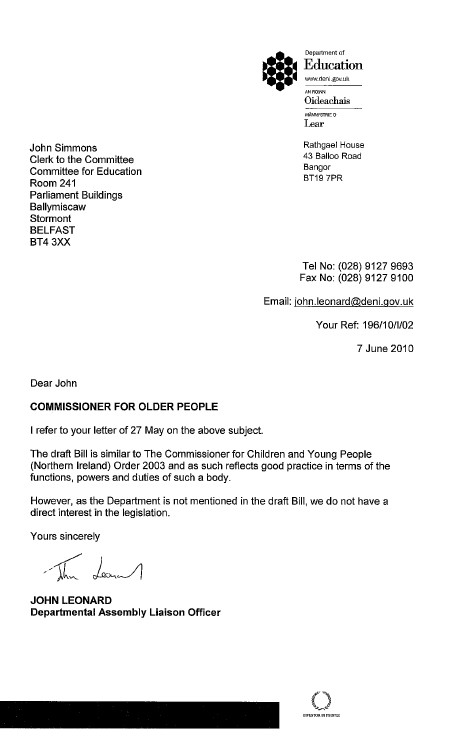
Committee for Employment and Learning
Room 245
Parliament Buildings
Tel: +44 (0)28 9052 0379
Fax: +44 (0)28 9052 1433
To: Cathie White
Clerk to the Committee for the Office of the
First Minister and Deputy First Minister
From: Peter Hall
Clerk to the Employment and Learning Committee
Date: 10th June 2010
Subject: Commissioner for Older People Bill
Cathie,
Please find attached the Committee for Employment and Learning's response to your request for views on the Commissioner for Older People Bill. This response was agreed by the Committee at its meeting on 9th June.
Peter Hall
Committee Clerk
Dolores Kelly MLA, Chairperson,
Committee for Employment and Learning
Danny Kennedy MLA
Chairperson
Committee for the Office of the First Minister and deputy First Minister
Room 404
Parliament Buildings
Stormont
Belfast
BT4 3XX
9th June 2010
Dear Danny,
The Committee for Employment and Learning considered your request for views on the Commissioner for Older People Bill at its meeting today and agreed to the response below.
The Committee welcomes the Bill putting in place a Commissioner for Older People. The Committee has had considerable contact with the Older People's Advocate, Dame Joan Harbison, through its campaign to have concessionary fees for older people reintroduced in further education colleges. Members have seen the need for a focal point for issues affecting older people. Dame Joan has done an excellent job in this capacity and the Committee looks forward to the appointment of a Commissioner for Older People to take this work to the next level.
The Committee acknowledges the reasoning behind the establishment of a Commissioner for Older People and Members agree that it is entirely appropriate that older people have this high level representative with direct access to the Executive. As I indicated above, the Committee is a strong supporter of lifelong learning and Members believe that a Commissioner for Older People will be a strong advocate for this. With regard to the Bill, the Committee agrees with the aims, powers and specific functions of the Commissioner as set down. The Committee is content that the Committee for the Office of the First Minister and deputy First Minister undertakes the detailed scrutiny of the Bill as is your Committee's role and prerogative.
Thank you for offering the Committee the opportunity to comment.
Yours sincerely,

Dolores Kelly MLA
Chairperson
Committee for Enterprise, Trade & Investment
Room 424
Parliament Buildings
Tel: +44 (0)28 90522 1614
Fax: +44 (0) 28 9052 1355
To: Cathie White
Clerk to the Office of the First Minister & deputy First Minister
From: Jim McManus
Clerk to the Enterprise, Trade & Investment Committee
Date: 17 June 2010
Subject: Commissioner for Older People Bill
1. At its meeting on the 10 June, the Committee for Enterprise, Trade & Investment considered OFMDFM's request for views on the Commissioner for Older People Bill.
2. Members had no comments on the Bill.
Please do not hesitate to contact me if you have any questions.
Committee for the Environment
Room 245
Parliament Buildings
Tel: +44 (0)28 9052 1347
Fax: +44 (0)28 9052 1795
To: Cathie White
Clerk to the OFMDFM Committee
From: Alex McGarel
Clerk to the Committee for the Environment
Date: 04 June 2010
Subject: Commissioner for Older People Bill
1. The Committee for the Environment, at its meeting on 3 June, considered correspondence dated 24 May 2010 from the OFMdFM Committee seeking the views of the Committee on the Commissioner for Older People Bill.
2. Members agreed that I write stating that they have noted your correspondence and that they have no substantive comments to offer.
Alex McGarel
Clerk
Committee for the Environment
From: Shane McAteer
Clerk to the Committee for Finance and Personnel
Date: 10 June 2010
To: Cathie White
Clerk to the Committee for the Office of the First Minister and deputy First Minister
At it's meeting on 9 June 2010, the Committee for Finance and Personnel considered your correspondence regarding the Commissioner for Older People Bill. The Committee agreed that it had no comment to make.
SHANE MCATEER
Tel: 21843
Committee for Health, Social Services and Public Safety
Room 410
Parliament Buildings
Tel: +44 (0)28 90521475
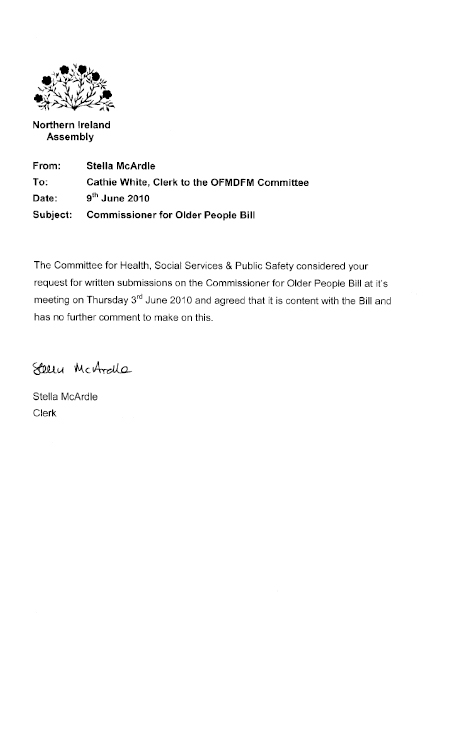
Committee for Regional Development
Room 402
Parliament Buildings
Tel: +44 (0)28 9052 1970
Fax: +44 (0)28 9052 5917
Fax: +44 (0)28 9052 1083
To: Cathie White
Committee for the Office of the First Minister and deputy First Minister
From: Roisin Kelly
Regional Development Committee Clerk
Date: 8 June 2010
Subject: Commissioner for Older People Bill
At the Committee for Regional Development meeting, on 2 June 2010, the Committee considered the correspondence received from the Committee for the Office of the First Minister and deputy First Minister in relation to the Commissioner for Older People Bill.
At the Committee for Regional Development meeting, on 8 June 2010, a Committee response was agreed on this issue and has also been attached for your information.

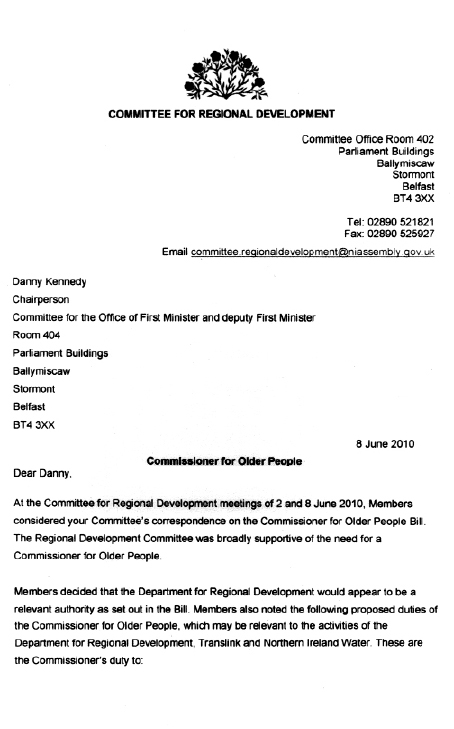

Committee for Social Development
Room 412, Parliament Buildings, Stormont, Belfast BT4 3XX
Tel: 028 9052 1864
Mob:078 2514 1294
peter.mccallion@niassembly.gov.uk
To: Cathie White
Clerk to the Committee for the OFMDFM
From: Peter McCallion
Date: 5 July 2010
Subject: Commissioner for Older People Bill
At its meeting of 1 July 2010, the Committee for Social Development considered your memo (24 May 2010) inviting submissions on the Commissioner for Older People Bill.
The Committee agreed that it will not be submitting evidence to the Committee Stage of the Commissioner for Older People Bill.
Peter McCallion
Committee Clerk
Enc.
1.1 The Equality Commission for Northern Ireland ("the Commission") is an independent public body established under the Northern Ireland Act 1998. The Commission is responsible for implementing the legislation on fair employment, sex discrimination and equal pay, race relations, sexual orientation, disability and age.
1.2 The Commission's remit also includes overseeing the statutory duties on public authorities to promote equality of opportunity and good relations under Section 75 of the Northern Ireland Act 1998 and the positive disability duties under the Disability Discrimination Act 1995.
1.3 The Commission's general duties include:
2.1 The Equality Commission welcomes the opportunity formally to submit evidence to the Committee stage of the Bill on the establishment of a Commissioner for Older People and on the associated structures and powers. This follows upon the response that the Commission made to the consultation on the draft Bill in January of this year.
2.2 The Commission has been involved in discussions and consultations concerning the establishment of the Office of the Commissioner for Older People from the outset. We recognise the validity of the concerns in relation to the rights and entitlements of older people, a recognition that is fortified by our experience of enquiries and applications for legal assistance in relation to age discrimination and by our research into the effects of age discrimination in the financial services field and otherwise.
2.3 The Commission reiterates its welcome for the focus on older people and the commitment to encourage their greater participation in society that the proposed measure represents.
2.4 The Commission recognises that there are weaknesses in the current law in Northern Ireland in respect of older people. In particular, the anti-discrimination law in respect of age applies only in the areas of employment and vocational training. Unlike any other area of discrimination legislation, the provision of goods, facilities and services is not covered with respect to age. This omission is made more pronounced by the enactment of the Equality Act 2010 in Great Britain earlier this year.
2.5 The Commission proposed change in the law in a formal submission made to the Office of the First and deputy First Minister in February of last year. We reiterate the view that one of the most effective means of enhancing the position of older people in the life of Northern Ireland would be the extension of protection against discrimination in respect of the provision of goods, facilities and services. Such a legislative change would repair the existing omission and redress the current situation where older people – and those of all ages – in Northern Ireland enjoy considerably less protection than is available to those who live in other parts of the United Kingdom. In the view of the Commission, the enactment of amending legislation in this respect is one of the most effective measures that the Executive and Assembly should take in the interests of older people and, of course, of people of all ages.
2.6 It continues to be the Commission's position that whatever form the proposed legislation in respect of the Commissioner for Older People ultimately takes, we envisage no alteration in our relationship with or responsibilities for the current or future age discrimination legislation or those provisions in other anti-discrimination legislation that may be relevant to older people.
2.7 It is the Commission's further understanding that nothing in the proposed statute or in the operation of the Commissioner's office will alter the underlying and enduring responsibilities of the Equality Commission.
3.1 The Commission does not wish to rehearse all of the points made in its response to the consultation in January of this year but it is appropriate that some general and more specific observations be made here. It was a source of regret that none of the issues raised in the consultation response, although no doubt taken into account, seems to have been acted upon. Indeed, some of our concern may well have been increased rather than allayed.
3.2 We welcome the progress that has been made through the work carried out by the Older People's Advocate in the interim. We specifically support measures that will enhance the position of older people in Northern Ireland and agree that it is important that they have a strong independent voice to represent their interests.
3.3 We recognise, too, that there is a clearly expressed political will to provide further support for older people.
3.4 While not expressing any sentiment that could remotely be characterised as territorial, the Commission continues to have reservations about some aspects of the Bill as currently presented.
3.5 The first area of concern is the risk of duplication between the proposed Commissioner for Older People and other bodies. It is recognised that some endeavours have been made to avoid overlaps. The Commission is not convinced that this has been achieved in every case.
3.6 As noted, it is not intended to revisit in detail the points made in the response to the consultation. A few examples will be cited to reflect the essential point. For ease of reference, the relevant sections of the January 2010 response are attached as an appendix, with the caution that some of the section numbers have been altered in the new draft Bill.
3.7 Section 7 seems, on its face, to collide with the legal assistance provisions of existing, and any future, anti-discrimination legislation and, perhaps, with aspects of the Section 75 arrangements. It is recognised that some steps have been incorporated to limit this but it is not clear if duplication is entirely avoided.
3.8 In the consultation response, the Commission urged that the qualification on the Commissioner's capacity to engage with this section be strengthened. The opposite has happened and the discretion has widened. It is not from any attempt to limit unduly the capacity of the proposed Commissioner that the Commission again suggests that the Commissioner should be obliged to satisfy herself/himself that no other body is likely to take the action that the section allows.
3.9 Section 11 appears to the Commission to have an even greater potential for duplication as it seems to mirror the legal assistance powers of the Equality Commission, not only in respect of age legislation but across all areas of anti-discrimination law. Here, the argument made by the Commission in the consultation response remains as strong as ever on the need for a requirement that the Commissioner be satisfied that no other body can or will provide the assistance concerned.
3.10 The Commission's second area of concern is the avoidance of confusion. While it is desirable in itself to avoid duplication so as to ensure that scarce public resources are used to greatest effect, there is also a real and genuine concern that the fact – even the appearance – of duplication will act as a source of confusion for the very people in whose interest the new provisions are being introduced.
3.11 If two or more bodies are charged with offering assistance or dealing with complaints about the same or similar issues, there is a risk that individuals will not know what route to choose or, worse, my be deterred from seeking any assistance because of uncertainty.
3.12 The third area of concern is that there be no dilution of any entitlements currently enjoyed by anyone, of whatever age, in Northern Ireland.
3.13 The Commission continues to be uncertain of the wisdom of identifying 60, and in certain circumstances 50, as the age at which one is regarded as an older person. It seems out of kilter with changing practices and patterns and at odds with developments in public policy relative to default retirement age and age of pension entitlement.
4.1 The Commission restates its commitment to discharging its responsibilities under the current age legislation and to taking account of the particular needs of older people in the context of all anti-discrimination law and in the area of the positive statutory duties that are laid on public authorities. It recognises the value of the concept of a champion role in respect of older people. It appreciates the quality of work undertaken by the Older People's Advocate. It retains its concerns that the proposed legislation has within it the potential to give rise to duplication and to generate confusion as to who carries responsibility in any given circumstances.
4.2 It draws attention again to current circumstances in respect of public expenditure and to the debate about the best way of providing certain public services and the associated architecture of public bodies. Against that background, the Commission repeats its question as to whether the creation of the new position of Commissioner for Older People is the best way forward. It invites again, even at this late stage, consideration of whether a strengthened statutory role for the Older People's Advocate, with statutory links to other bodies, might be just as effective a means of securing the Executive's objectives.
4.3 The Equality Commission is committed to improving the life experiences of people in older age and the removal of structural impediments to the full enjoyment of later life as citizens. We renew our conviction that the most effective step that can be taken at the moment is the extension of legislative protection to the provision of goods, facilities and services, on grounds of age. Such a development should not be delayed by any consideration of the establishment of the office of Commissioner.
4.4 Finally, the Commission is concerned that an impression may have been created in evidence to the Committee that a body that reports to a Minister or Ministers cannot be independent; that the provision of funding through a Department can have a similar effect; and that there is an inherent incompatibility between the role of advocacy or advice, on the one hand, and enforcement on the other. Whatever reservations the Commission has in respect of the present proposals, it does not share the view that they can be assailed on these grounds. To do so would question the proper functioning of a number of public authorities.
4.5 The Equality Commission would welcome the opportunity to discuss these and all other matters touching on these proposals with the Committee.
The Commission notes the difference between 'promoting the provision of opportunities for older people' envisaged for the Commissioner for Older People and promoting equality of opportunity which is one of the Commission's duties under the Age Regulations and other legislation. We recognise that this difference indicates the absence of potential conflict. We welcome the obligation on the Commissioner to promote the elimination of discrimination, which mirrors that of the Commission, believing that the broader the range of action against discrimination, the better the outcomes will be. However, we consider that it is important that the continuing role of the Commission in this regard is reinforced and that effective measures be put in place to avoid any unnecessary or confusing duplication.
We note the duty to encourage best practice in the treatment of older persons and the potential for this to overlap with our work to encourage best practice by employers in respect of workers whatever their age and would want to work to ensure no unnecessary or confusing duplication.
There is the possibility of some overlap and confusion between this section and the role of the Commission in respect of Section 75 arrangements, including measures to consult with persons directly affected by the Section 75 duties. The Section opens the possibility of overlap with the responsibility of designated public authorities to develop Equality Schemes and the role of the Commission in approving them. On the face of the section the complaints issue at Clause (1)(b) looks like a duplication although that seems to be resolved later; (1) (d) (ii) also has an Equality Scheme dimension; and we consider that Clause 5 (2) could overlap with aspects of Schedule 9.
On the face of it, this could be seen to intersect with the legal assistance provisions of existing, and any future, anti-discrimination legislation and perhaps of Section 75 complaints. It has the potential to be a source of uncertainty and confusion for older people who wish to exercise their legal entitlements.
While the provisions of Section 7 (3) and (4) represent some mitigation measures, the qualifications "appears to the Commissioner" and "likely to provide" seem a little uncertain. We recommend that consideration should be given to making it a requirement that the Commissioner needs to satisfy himself/herself to this effect.
The provision at sub-paragraph (b) seems to remove any potential for clash with the Commission's role in respect of investigation of complaints.
This provision seems to duplicate a capacity already possessed by the Commission. That, in itself, may not be an issue but care will be required to avoid unnecessary or costly duplication or confusion as to which approach best meets the needs of older people.
This provision has, in stronger form, the same potential for confusion as in Section 7. It is potentially an exact duplication of the legal assistance powers of the Commission, not just in respect of the age legislation but across the entire range of law. In this case, the provision at 11(3) appears inadequate to avoid duplication and there should be a clear requirement that the Commissioner satisfy herself/himself that no other body is considering an application, or that such consideration has resulted in a decision not to assist, together with a parallel requirement for the other body (ies) to respond to the Commissioner within a specified timescale.
This section has the potential to clash with investigation powers of the Commission but perhaps only to a limited extent. Complaints by individuals that could be investigated by the Commission are precluded. We recommend that consideration be given to making it a requirement that the Commission satisfy herself/himself that the matter is not the subject of investigation by any other body without intending in any way to trench on the independence of the Commissioner
This is a valuable power as are the related provisions in respect of places where older people reside or are detained, although we would query whether it might overlap with powers residing in other statutory bodies and highlight the need to avoid unnecessary duplication or confusion.
The Commission has some concerns about the definition of an older person as a person over 60. The assumption that everybody over 60 is an older person seems to fly in the face of much contemporary experience. The entire measure is premised on the notion that older people require special protection. Whether those who are well, working and willing to live actively for as long as possible should be included as coming within the remit of the Commissioner just because they are over 60 is questionable. A fortiori, the idea that somebody at the age of 50 could, however exceptional the circumstances, be considered "older" seems to defy logic. Whatever their circumstances may be, it is difficult to imagine that they derive from their age.
The definition of "complainant" is markedly different from the "directly affected by" requirement of schedule 9. This is the preferable approach and we might urge its transposition. The Commission welcomes the definition of complainant as including somebody who makes a complaint on behalf of an older person. Such a facility might well be considered for extension to other areas
National Energy Action Northern Ireland (NEA NI) welcomes the opportunity to provide a submission in response to the Commissioner for Older People Bill.
NEA NI is the fuel poverty charity working throughout the United Kingdom, with regional offices in all of the devolved administrations.
In response to the Older People's Commissioner Consultation in December 2009, NEA NI suggested that such a Commissioner should have a range of powers at their disposal, in order to be effective and contribute positively to the Older population in Northern Ireland. The following powers and actions were put forward for consideration;
(1) Ability to demonstrate a clear independence from all other government and public authorities
(2) Provide a vehicle to mediate on behalf of older people with service providers
(3) Power to commission and publish research on issues affecting older people in Northern Ireland
(4) Communicate widely – seeking the opinion of older people and take their views into account
NEA NI is pleased to see that the proposed Bill includes many of the recommendations and suggestions that were put forward during the Consultation period. Indeed, NEA NI welcomes the attention that the Bill pays to the role of the Commissioner as a mediator and representative of Older people. The Bill details the ability of the Commissioner to assistance with complaints on behalf of Older people with 'relevant authorities'; NEA NI feel that the inclusion of this in the Bill is very important if the Commissioner is to be effective.
The Bill also refers to continued communication with Older people in Northern Ireland. NEA NI feel this is a crucial addition to the Bill, stakeholder engagement is very important if the Commissioner is to be creditable and speak with authority on issues affecting Older people in Northern Ireland.
NEA NI would have like to have seen the inclusion of specific powers in relation to Fuel Poverty. As 55%[1] of the over 60s are experiencing fuel poverty NEA NI would like to see very close links established between the Commissioner and the Northern Ireland Utility Regulator. We feel that it is important that this vulnerable group which is highly likely to experience fuel poverty be represented strongly by the Commissioner on this issue.
[1] Housing Condition Survey 2006, http://www.nihe.gov.uk/index/sp_home/research-2/house_condition_survey.htm
1. The Northern Ireland Human Rights Commission (the Commission) is a statutory body created by the Northern Ireland Act 1998. It has a range of functions including reviewing the adequacy and effectiveness of Northern Ireland law and practice relating to the protection of human rights,[1] advising on legislative and other measures which ought to be taken to protect human rights,[2] advising on whether a Bill is compatible with human rights[3] and promoting understanding and awareness of the importance of human rights in Northern Ireland.[4] In all of that work the Commission bases its positions on the full range of internationally accepted human rights standards, including the European Convention on Human Rights (ECHR), other treaty obligations in the Council of Europe and United Nations systems, and the non-binding 'soft law' standards developed by the human rights bodies.
2. The Commission welcomes this opportunity to provide evidence to the Committee of the Office of the First Minister and deputy First Minister (the OFMdFM Committee) for the Committee Stage of the Commissioner for Older People Bill. The Commission welcomes in principle the creation of a Commissioner for Older People and recognises that older people are a potentially vulnerable group with rights that require particular attention. The Commission will address a number of clauses within the Bill as well as the issue of 'victim standing'. The Commission understands that victim standing is not included within the draft Bill for the Older People's Commissioner. However, victim standing has been discussed before the OFMdFM Committee in the context of the Commission's own powers and it is important that the Commission is permitted an opportunity to raise its concerns on this point.
3. Overall, it is disappointing that the principal aim and hence the remainder of the Bill are focused on the concept of 'interests.' This is a vague term that is difficult to define. While the Bill contains quite extensive powers for the Commissioner, it is the Commission's view that these are undermined somewhat due to the focus on 'interests.' For instance, when the Commissioner conducts a formal investigation, which permits her or him to call for documents and witnesses, enter premises, takes copies of documents etc (Clause 18), against what standards is she or he assessing the information? Where the powers of an investigatory body are as extensive as those proposed in the Bill, those against whom they are exercised should know what standards are being applied. The Commission is also concerned that with such a vague concept it will be difficult to manage public expectations of what the Commissioner can and cannot do. The term 'interests' is either so broad that it is rendered meaningless or it is setting a dangerous precedent whereby extensive investigation powers can be used without legal certainty as to their remit. It is the Commission's view that the principal aim should be explicit in its focus on rights. Rights are clearly codified in national, regional and international legal instruments while 'interests' are not.
4. The Commission notes that clause 2 (3) requires the Commissioner to have regard to the UN Principles for Older Persons when determining what 'interests' means. As in its original response to the consultation, the Commission notes that the UN Principles are soft law. The UN Principles do need to be considered, but the primary focus should be on the human rights which older people have, as set out in legally binding international treaties to which the UK is a party.
5. Clause 3 sets out the 'duties' of the Commissioner, that is, those duties that the Commissioner 'must' execute. Clause 3 (8) then refers to the Commissioner's functions. A 'function' suggests something that an individual or body can do but is not necessarily obliged to do. The interchange between the two terms in the draft Bill is at times confusing. It seems that the term 'function' is intended to refer to the Commissioner's duties as set out in Clause 3 and her or his 'general powers' as in Clause 4 and, if this is the case, it would be helpful if an explanation to this effect could be included within the section on interpretation (clause 27).
6. The duties of the Commissioner require her or him to perform various tasks that are related to older person's interests. Again, 'interests' is not defined yet there is a statutory duty on the Commissioner to work within this concept. There is a lack of clarity and therefore potential for the Commissioner to breach her or his own legislation because there is no agreement on what the term 'interests' means. This risks the Commissioner's office being the subject of endless litigation and/or complaints as relevant authorities and interested stakeholders question and attempt to define the concept of 'interests' whether for the purposes of warding off an investigation or attempting to initiate one.
7. Clause 3 (4) requires the Commissioner to promote the provision of opportunities for, and the elimination of discrimination against older persons. This is a direct duplication of the functions of the Equality Commission for Northern Ireland and the Commission would question why it is has been included. In addition, it would be preferable if the Commissioner's duty could be to advise "on measures which ought to be taken" to protect the rights and interests of older people" rather than the present wording, which is "matters concerning" their interests (Clause 3 (7)).
8. There are circumstances when the Commissioner is prevented from investigating a complaint against a relevant authority, in particular, if the complaint falls within an existing statutory complaints system (clause 8 (2) (b)). The Commission asks what types of complaints are envisaged that would not fall within an existing statutory complaints system. The Commission suspects that most matters will fall within the remit of the Northern Ireland Ombudsman. If that is the case, the Commission would question the usefulness of this power if this exclusion is to remain.
9. As in our original submission, the Commission again asks for clarity on the meaning of clause 8 (3) (b). It appears to exclude the Commissioner from pursuing a complaint even if it is excluded from other statutory complaints systems.
10. New clause 12 permits the Commissioner to make arrangements for the provision of conciliation services. Clause 12 (2) prevents the Commissioner and any officer of the Commissioner from participating in the provision of such services. Clause 12 (3) states that the Commissioner must ensure appropriate safeguards to prevent disclosure to the Commissioner of information obtained by a person via such services. It is reasonable to question why this new clause is necessary given that a body with a case work function will ordinarily seek a resolution to a case outside of an official process. The Commission therefore asks why it is proposed to involve the services of a third party. The Commission does not believe it would compromise the office's role if it were itself to attempt to reach a resolution to the satisfaction of the complainant through informal means.
11. The Commissioner's powers of formal investigation are akin to those of the High Court and are therefore extensive. These powers would place the Commissioner's office in a position far exceeding those of other oversight bodies. This is even more so when such extensive powers are set out against such an elusive concept as 'interests'. The Commission also questions the validity of giving an organisation such extensive powers while at the same time requiring the investigation to be conducted in private and leaving publication of the investigations findings to the discretion of the Commissioner (clause 13 (5) and clause 15). That is certainly not the case with High Court proceedings, where it is the exception rather than the norm for its business to be held in private. High Court judgements are also available for public view and scrutiny with certain details redacted if deemed appropriate. Published investigation reports have great merit in terms of demanding a rigorous process from the oversight body, offering learning to other public authorities that are not the subject of the investigation and therefore bringing value much wider than the particular investigation, which for practical reasons often has to be narrow and disciplined in focus.
12. As in its original submission, the Commission's view is that if the Commissioner's role is to protect the rights of older people then OFMdFM should pursue the option of giving the Commissioner 'victim standing' for the purposes of the Human Rights Act 1998. The Commission does not see the merit in any other approach; a body either has victim standing or it does not. The Commission is currently the only body with victim standing in Northern Ireland. As part of its work the Commission engages widely and routinely with other individuals and organisations to encourage referrals where there is potential for victim standing to be considered. However, the Commission cannot contemplate an approach, as has been suggested, whereby there is an agreement that by its nature places a duty on the Commission to collaborate with another named body on this matter. For various reasons, the Commission must reject this approach:
13. The Commission maintains that a joined up approach to promoting the rights of older people will ultimately better protect the rights of everyone in Northern Ireland and ensure efficient use of scarce resources. This is a matter that the relevant organisations can assess and agree on an operational basis. For example, Memoranda of Understanding can be developed if appropriate among relevant statutory bodies and voluntary organisations. However, this cannot impact on the discretion and independence of this Commission in relation to any of its powers including the issue of victim standing.
14. The Commission welcomes the inclusion of individuals who are private fee paying residents in a residential or nursing home within the terms of the Bill.
15. Given the concerns raised above the Commission suggests that should the Executive still be minded to maintain the focus on interests the role of the Commissioner should more appropriately be concentrated on a general review of advocacy, complaint, inspection and whistle-blowing arrangements, assistance with complaints, and promotional or education activities.
June 2010
Northern Ireland Human Rights Commission
Temple Court, 39 North Street
Belfast BT1 1NA
Tel: (028) 9024 3987
Textphone: (028) 9024 9066
SMS Text: 07786 202075
Fax: (028) 9024 7844
Email: information@nihrc.org
Website: www.nihrc.org
[1] Northern Ireland Act 1998, s.69(1).
[2] Ibid., s.69(3).
[3] Ibid., s.69(4).
[4] Ibid., s.69(6).
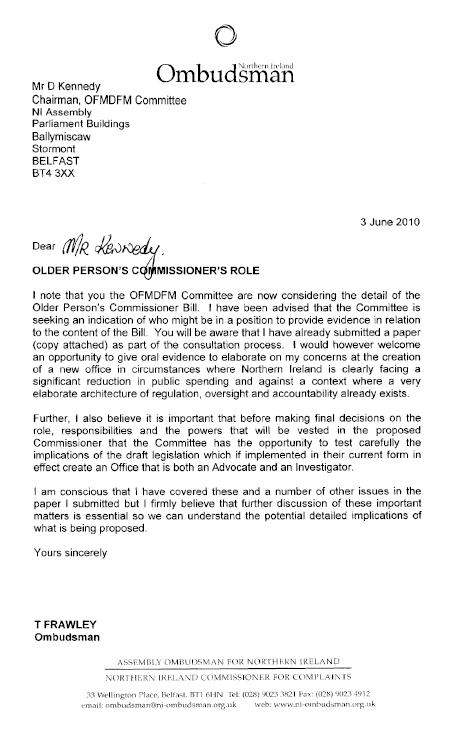
Chairman, Committee members, thank you for affording me the opportunity to provide oral evidence to the Committee as it finalises its evaluation of the draft legislation which will inform the role of the proposed Commissioner for Older People. Firstly, let me acknowledge the adjustments that have been made as a result of our original submission to the Committee. However I continue to have major reservations and concerns about the range of roles and responsibilities being proposed for the Older People's Commissioner.
The documentation developed by the Bill team following the consultation process states that the investigatory powers proposed that the Older Persons Commissioner will be based on an Ombudsman/Advocacy model. I again ask the Committee to recognise that such a proposal is based on a flawed analysis of the concept on which the role of an Ombudsman is based. Indeed it demonstrates a lack of understanding of the key criteria that must be met if a viable proposal for an Ombudsman Office is to be created.
Chairman, Gottehrer (2009) states that there are four fundamental characteristics of an Ombudsman:
1. Independence
2. Impartiality and Fairness
3. Credible Review Process
4. Confidentiality
The Older Persons Commissioner as proposed does not meet the independence test, the impartiality and fairness test or a credible review process test.
Firstly, independence – the Commission proposal is sponsored by a government department - independence is assumed - not demonstrated.
Impartiality and fairness - the Commissioner is an advocate for particular individuals and groups - older people. Indeed the document makes clear that older people must have primacy in any consideration undertaken by the Commissioner. The Commissioner must therefore weigh the interests of older people before the interests of other groups e.g. learning disabled. What are the implications of such an approach in health and social care, for example where there will always be competing needs for limited resources, need is infinite, resources finite.
Credible review process - the Commissioner is confined to dealing purely with a narrow jurisdiction and complaints from older people – this will lead inevitably to service capture. Ombudsmen on the other hand must be in a position to investigate anyone's grievances concerning any decision, recommendation or act and must consider that grievance against the context of competing priorities, which will involve all individuals or groups of individuals and not just older people
The notion of an Ombudsman/Advocate is therefore I would contend, self evidently contradictory. Clearly anyone therefore who is the subject of an investigation by the Commissioner will always have a perception that the very title of the Office biases the investigation in favour of older people.
Could I now make some more general comments around the evaluation of the consultation responses. There is evidence within the consultation that had consultees been better informed on the role and purpose of other oversight offices including the NI Ombudsman that they might have been more aware of what I believe is the duplication and replication of those existing powers in the role proposed for the Older People's Commissioner.
The consultation document as I have indicated failed to inform those being consulted about the role of these existing bodies that are available to older people to provide redress and review. It is disappointing that such information and clarification did not form part of the initial consultation to ensure consultees were making informed statements about what was required in a new Commissioner for Older People when tested against the existing oversight landscape.
I acknowledge that the new Commissioner is being advised not to act without due regard to the statutory powers and duties of other organisations, however, the legislation does not prevent him/her from doing so.
Chairman, some final comments:
Within the current proposal the Older Person's Commissioner can initiate arrangements to facilitate resolution of complaints including the provision of funds to enable conciliation services. In respect of health and social care this is a direct duplication of the current arrangements established only last year between the Regional Health and Social Care Board and the Trusts to facilitate mediation and ADR (alternative dispute resolution).
The full extent of the potential overlap between regulatory and statutory bodies already in existence and dealing with issues affecting older people and the Older People's Commissioner is unknown as no mapping work was undertaken pre-consultation. Providing the Commissioner with such extensive powers in the absence of such work does not appear to represent best practice or importantly in our circumstance a good use of public funds.
The responses to the consultation process recognise that whilst people stated what powers the Commissioner should have, few if any examples are actually given as to why in their experience such powers are necessary; there is I would suggest a fundamental difference between the 'wants' and 'needs' of individuals or sectors.
It's unclear as to how the objective of ensuring that public money is used efficiently by ensuring that where an organisation has been funded to provide a service, another organisation is not also being funded to provide the same service, can be met when so much potential overlap has been identified in the absence of any real mapping exercise having been undertaken.
Finally, the principles of better regulation adopted by the UK cabinet office states that laws and regulations should not be introduced which would lead to duplication or disproportionate action by the state. I would suggest that the potential for such extensive duplication and overlap as currently detailed in the proposed role(s) for the Commissioner has the potential to confuse and compound the existing adverse public perceptions about 'quangos'.
T J FRAWLEY
30 June 2010
Can I thank you for this opportunity to provide further comment on the outcome of the consultation process that will inform the decisions of the Committee as it moves to finalise the draft legislation that will inform the creation of a Commissioner for Older People in Northern Ireland. The opportunity to submit further comments about this issue is timely given the recent budget that has just been announced and the implications the creation of a Commissioner for Older People has for public funds. Whilst Offices such as mine are never more important than in times of economic challenge, when decisions being taken by public bodies have the potential to have major implications for the citizens of Northern Ireland, the need to replicate the full range of oversight and scrutiny that is already available to older people within 'generalist' offices, such as my own, in a Commissioner for Older People, it is in my view difficult to justify such an application of public funds at this time. It requires therefore to be very carefully considered. The costs we should note are not limited to funding the office, there are also significant costs for the bodies required to respond to the Commissioner.
Oversight offices not only represent fairness for individuals but also can contribute to greater efficiency and effectiveness by improving public services through the reduction of duplication and overlap. We can help governments in making decisions that are not just more reasonable, but are fiscally responsible. We can assist public bodies in managing their reduced resources more efficiently - something we have always done, but which is now more important than ever. The institution of the ombudsman is I would suggest the least expensive dispute resolution mechanism within the administrative justice landscape.
Importantly, if we investigate and recommend extravagant solutions with little regard to financial consequences, we will lose credibility and thus the intangible asset of moral persuasion.
I wish to take this opportunity to restate my support for the creation of an advocate for older people in Northern Ireland. Advocacy for any vulnerable population is always a positive thing in my view and is central to ensuring that the most vulnerable in our society can effectively access and maximise the benefit of the services that are being provided to support and assist in coping with an increasingly complex world. Where problems arise advocacy can be central to ensuring issues are brought to the attention of those in charge of services. Where problems cannot be resolved advocates are key to navigating vulnerable individuals to offices such as my own, and thereafter supporting vulnerable individuals through the relevant complaints and investigation processes, which I acknowledge can be challenging and sometimes require a level of tenacity which there is not always a reserve of if you are already dealing with complex individual circumstances.
My office is committed to supporting and encouraging complainants to make use of advocates where they feel it is beneficial to the process of making a complaint. As I stated in my consultation response I endorse the view that older persons in a changing society require a 'champion' to promote and celebrate the diversity of experiences and skills that older persons bring to our society. I also agree that given the changing demographics of Northern Ireland as highlighted in the Deloitte Report there is a need for a public appointed official to have an advocacy, educational and an advisory role so as to shape and influence policy and to inform the wider public and to contribute to the public debate on the interests and needs of older people.
As I indicated in my previous submission, however, the need to replicate, in a Commissioner for Older People, the full range of oversight and regulation which is already available to Older People through a number of existing bodies (see Annex 1) is highly questionable at this time of economic restraint and growing demands to 'retrench' the public sector. What particularly concerns me is that the premise for proposing such wide reaching powers be bestowed upon the Commissioner appears to have been purely derived from small scale limited research with the older population itself and the exclusion of a range of other interested constituencies eg learning disabled, mentally ill disabled etc. Having reviewed the research it is apparent that no review of the current complaints handling and oversight landscape in Northern Ireland was undertaken to benchmark older people's knowledge of same against the resultant 'wish list' of powers and authority which it is proposed should be made available to a Commissioner for Older People. It is clearly referenced within Dame Joan Harbison's consultation response to the Commissioner for Older People's consultation that a number of bodies already exist which currently provide the necessary investigatory function that is being duplicated in the proposed role for Commissioner for Commissioner for Older People. Dame Joan notes:
'It is unlikely that there would be any cases… which would not fall within the remit of the Equality Commission and Northern Ireland Human Rights Commission'.
Whilst these offices deal with systemic complaints, my own office is available to undertake investigations which relate to the individual and which can result in individual remedy and redress rather than the 'class action' approach which is the model sometimes adopted by the Human Rights Commission, and the Equality Commissioner. Dame Joan also states that there is a need to:
'Establish memoranda of understanding with other regulatory bodies to ensure effective and efficient use of resources and exercise of remit to avoid duplication and overlap of roles.'
My argument is why duplicate the roles in the first place, with all of the associated costs, when we know the creation of a Commissioner with powers of investigation is in itself a replication of the role of existing bodies (see Annex 1). To do this without mapping the current landscape and identifying gaps and failures of the system before deciding which might be deleted and merged as was done in Scotland is hard to defend.
Dame Joan goes onto to further reflect what the duplication the creation of such a role would have in relation to the current oversight and complaints handling landscape by noting that:
'Investigations should only be undertaken when it is thought that the only body with power to investigate is the Older People's Commissioner. In instances where other bodies have statutory or regulatory roles in respect of the services in question then that body should be consulted and a way forward agreed between the parties.'
What this statement fails to appreciate is that agreeing a way forward is not a viable option where the Commissioner for Older People is actually a body within the jurisdiction of another of the bodies who can also investigate complaints from Older People.
Currently as I have indicated no evidence has been demonstrated to show how if at all older people are disadvantaged in respect of the current oversight and complaints handling arrangements already available to them. Dame Joan's comments do suggest that provision is sufficient and that the work of a Commissioner for Older People in investigation may be limited to no more than the creation of memorandums of understanding for the completion of investigations which may never actually be undertaken by the Commissioner him or herself. However an important role consistent with advocacy may be for a Commissioner to monitor and evaluate the existing oversight bodies in how effectively they engage with older people.
It is my view that the research already undertaken is not suggestive of the need to replicate the funded investigatory roles that are already in place and available to older people, but rather it points up the need to educate and inform older people on the range of recourses that already exists, how they can be accessed and for what purpose.
For example, I am already committed in my outreach strategy 2010-2011 to working with older people to help increase their knowledge about my office and my investigatory powers. I am currently drafting an article for inclusion in the Older Person's advocate monthly newsletter, which is circulated widely within the older people's voluntary and community sector. I am also committed in the coming months to undertaking a series of roadshows with older people's participation networks and forums profiling the work of my office and its role in investigating individual complaints regarding the public sector and government departments. However, fundamental to informing the public including older people about the recourse open to them is to replicate the arrangements adopted by the complaints procedure in HSC, signposting complainants to my Office at the end of the complaints procedure if they are not satisfied.
Within my consultation response I focused heavily on what I consider to be the two diametrically opposed roles, proposed for the Commissioner for Older People, namely advocacy and investigation. I have stated categorically and remain of the view that a model which combines advocacy, championing, and education with investigatory powers is inherently flawed. I'm not sure anyone could reasonably hope to argue that a Commissioner who advocates on behalf of a population can then go on to independently and impartially investigate complaints. I cannot see how this would be perceived by public bodies to be a fair and balanced investigation, especially where they had encountered the Commissioner in his/her advocacy role, championing the case of an older person. One shouldn't forget the power of perception- we have within the last year witnessed the complete overhaul of the Health and Social Care complaints procedure, which saw the removal of the independent review stage purely on the basis that it was not 'perceived' by the public to be independent. Whilst little to no evidence of actual bias or partiality on the part of the independent people charged with undertaking this role was demonstrated by the policy reviewers, the perception of the public alone was enough to see the independent review stage scrapped and a new one stage procedure, which allowed fast access to my office being introduced. I would should also point out that in the event an individual complained to my office about a scenario where they were being 'sold' the concept of an independent and impartial investigation and I looked and found examples where the investigator had previously advocated on and had taken policy lines on the same matter being individually investigated, it is quite possible that I could reach the view that such action constitutes maladministration.
Further, I am unable to resolve the misfit between the idea that the Commissioner for Older People as proposed can be considered as 'Independent' when he/she will be responsible and report directly to the Office of the First Minister and Deputy First Minister. Independence is the bedrock on which the other fundamental characteristics of effective complaints handling rest. The other characteristics include Impartiality and fairness; a credible review process and confidentiality. In order to meet the requirements of impartiality and fairness the investigator cannot favour either the government nor the complainant. The Commissioner for Older People as proposed automatically fails on both counts, advocating for the complainant whilst reporting directly to a department within government.
The requirements of a credible review process are that the investigator has a broadly defined, general jurisdiction that does not restrict them to one agency or one type of grievance. The Investigator must be able to consider the competing factors that may have influenced government or public body action in any one case. It is hard to imagine that in the current fiscal climate that any public body could make decisions with only one population demographic in mind, namely older people. If as the draft bill suggests the principal aim of the Older People's Commissioner, in exercising his or her functions or powers more generally, will be to safeguard and promote the interests of older people, it is hard to see how any type of credible review can flow from this premise. The bill goes onto the state that when working on a particular case involving an individual older person, the paramount consideration that the Commissioner must bear in mind will be the interests of the older people.
I will conclude by indicating that I continue to have major concerns about the proposal as drafted. I believe, as I indicated in my previous submission to the Committee, we should first of all do as Wales did – build a strategy for older people, review the performance of whole system against that strategy, testing existing oversight arrangements against what exists and what will be required to address the interests of older people into the future but not ahead of all other groups who require similar protection.
T J FRAWLEY
30 June 2010
The Equality Commission
The Information Commission
The Human Rights Commission
The Consumer Council
The Regulatory and Quality Improvement Authority
The Police Ombudsman
Role of the Northern Ireland Ombudsman
Introduction
Summary of Ombudsman's Response
1. Additional Consultation Questions
2. Independence
3. Regulatory Landscape
4. Enforcement Powers and Recommendation
5. Accountability Fatigue
6. Alternative Approaches
7. Conclusion and Moving Forward
The Northern Ireland Ombudsman (the Ombudsman) is the popular title for two offices, the Assembly Ombudsman for Northern Ireland and the Commissioner for Complaints for Northern Ireland. The Ombudsman investigates complaints about 'maladministration' arising from the actions or failure of government departments, their agencies, health trusts, and other public bodies such as the Housing Executive and local Councils. The Ombudsman's jurisdiction is wide and his oversight covers bodies whose expenditure, taken together, amounts to two thirds of the public purse.
The Ombudsman's Office was established in 1969 and was the second such office to be created in the United Kingdom. The Ombudsman enjoys a privileged constitutional position, with appointment and removal from Office requiring Royal approval. The Ombudsman's office is not a corporate body and the Ombudsman himself has legal status as a 'corporation sole'. He is also an officer of the Northern Ireland Assembly.
Maladministration is not defined and can cover a wide range of administrative failures such as bias, delay, unfairness or neglect by a public body.
The Ombudsman may be contacted as follows: by email to ombudsman@ni-ombudsman.org.uk; by fax to 9089 7787; or in writing to: The Ombudsman, Progressive House, Wellington Place, BELFAST, BT1 6HN.
This paper records the views of the Northern Ireland Ombudsman in response to the consultation document entitled 'A Commissioner for Older People in Northern Ireland'. The Ombudsman welcomes the opportunity to contribute to the consultation process in relation to the proposals for the creation of a Commissioner for Older People in Northern Ireland (the Commissioner). In preparing this response the Ombudsman has considered the consultation process, the consultation document itself, draft Bill and the draft Integrated Impact Assessment. In addition, the Ombudsman has examined the extensive research on this proposal by way of background to the consultation documents and a list of references of the publications considered is attached.
The Ombudsman has followed closely the OFMDFM Committee discussions on the issue of the proposed draft legislation and has considered the views expressed in those debates and the evidence given by interested parties, notably the evidence of the Older Person's Advocate, Dame Joan Harbinson, on 16 September 2009 on the role, remit and powers of the Commissioner. The Ombudsman has examined the legislative frameworks of a range of regulatory bodies with advocacy and complaints handling functions across the United Kingdom. In addition, the recently adopted model of an Ombudsman for Older People for Wales has been examined in detail as well as the strategy of the Welsh Assembly Government informing this model.
The basic function of an Ombudsman is to investigate and report on complaints against public authorities[1]. Therefore, in commenting on the role, function and remit of a Commissioner, the Ombudsman has focused particularly on the complaints handling and investigatory functions of the proposed models. Given the wide ranging experience developed by the Office over the forty years of its existence, the Ombudsman is well placed to comment on these particular aspects of the proposed models. The Ombudsman has examined closely the emerging model in Wales and notes the history of the development of a similar office in Scotland.
The Ombudsman supports the establishment of a Commissioner for Older People with the aim of providing a strong, independent voice for older persons. However, the Ombudsman is concerned that the proposal is premature and that progress on the Wales model and a fundamental review of the existing oversight and complaints handling landscape in Northern Ireland is needed. Such a review would inform where (if at all) the current system is failing to address the particular needs of older people. Post-review, informed decisions can be taken on how the key functions/roles of the Commissioner should be developed.
The Ombudsman has been provided with the policy proposals and a copy of the draft legislation that would enable the establishment of a Commissioner. Part 4 of the consultation document reprises the consultation questions that have also been detailed throughout the body of the document. However, the document also indicates that consultees are free to comment generally or to refer to any relevant issues which are not covered in the consultation document. It is this latter approach which has been adopted in developing this paper.
References in this paper to clauses (cl) and schedules (sch) are references to the draft Bill unless otherwise stated.
a. The consultation process being undertaken by OFMDFM covers both the policy proposals and the draft legislation to facilitate the creation of a post of Commissioner for Older People. At the outset, it is important to emphasise that the comment in this paper is premised on clear support for the creation of a strong independent voice in the form of a Commissioner for Older People. Where this proposal becomes more difficult is in the wide range of roles the consultation paper proposes for a future Commissioner. This section of the response examines the consultation document by focusing comment on the key areas where this Office has acknowledged expertise, in the area of providing recourse and remedy to aggrieved persons through effective complaint handling. But before moving to those central comments, it may be helpful to raise a number of initial points around the consultation document.
b. The consultation document does set out in detail the background and context as well as the research that helped to inform the development of the consultation paper and draft bill. The purpose of the consultation process therefore is to gather a wide range of views on the proposed role/remit, functions and powers of an Office of a Commissioner for Older People. It is clear that the consultation responses will be considered with a view to informing decisions on any future Commissioner model. In the absence of an agreed model for such an office, it is premature to publish a draft bill based on a particular model derived from as yet untested conclusions. Further, the consultation proposals rely heavily on the Deloitte Report which was informed by a limited 'direct' consultation with 'older' persons and members of that sector. There is a danger of 'sectoral bias' by virtue of the manner in which the direct consultation has been conducted with a series of roadshows for older people.
c. To address this weakness, it would be important to expand the consultation to include further questions that will inform the consultation process, and the ultimate decisions on the nature of the Commissioner model. These would include:
d. In delivering effective outcomes for all public policy initiatives, it is important that all parts of a public administration system should be acting in concert with one another. If due consideration is not given to whether the different elements of a whole system are operating in a complementary manner, there is the potential for systemic dysfunction. A fundamental weakness of the present consultation is its lack of overall system awareness: there is considerable focus on roles for the Commissioner, without any detailed analysis of how it will interact with, and complement, the highly developed oversight system that is already in place. Memoranda of Understanding, while helpful, are no substitute for effective structures and clarity of roles, responsibilities and accountability from the outset.
e. There is a risk with the current proposals of viewing our diverse population as a series of lobby and interest groups. This presents a dual risk of creating a sense of exclusion and discrimination on the part of any interest groups who do not have the benefit of their own statutory advocacy office, in parallel to the creation of a series of silos where the primacy of a group becomes more important than the interests of the community as a whole.
At the heart of the BIOA principles of good governance for Ombudsman's or any complaint handling scheme is the principle of independence . This is essential to ensuring the office holder as an investigator is free from interference.
a. It is proposed in the consultation document that the Commissioner for Older People take on the role as the 'strong, independent voice' of older people within the arrangements for delivering the Executive's Programme for Government. This role is to be welcomed but when combined with the wider functions proposed in the consultation document, will create conflict. Having an interventionist role in policy making and the setting of priorities for government department, agencies and public bodies as well as the private sector is incompatible with an oversight/advocacy role.
b. Before examining the different aspects of the Commissioner's proposed powers, it is important to establish the basis of regulatory authority in wider society. As Trotter (2008) remarks, the basis for the regulation of many sectors of the economy and society has its origins in rules laid down by government that affects the activities of other agents in those settings: regulation takes many forms and the forms and types of response that regulatory authorities employ also differ. To take the Ombudsman as a comparator, given that this Office derives its authority from the legislature, the Ombudsman is independent of the Executive, in the local context, the Northern Ireland Executive. This is reflected in the Ombudsman's appointment through Royal Warrant, his tenure which is at the discretion of the Queen, funding arrangements and overall accountability. The Ombudsman acts as an officer of the Assembly and is independent of the bodies that he investigates. The Ombudsman operates alongside the Comptroller and Auditor General in support of the Assembly to demonstrate and achieve functional and political independence from Government Departments, their agencies and public bodies who are in the Ombudsman's jurisdiction. However, as proposed, the Commissioner would not have the requisite degree of independence from OFMDFM to be viewed as independent of the agency they serve and may investigate.
c. It is noteworthy that the Ombudsman, however, has a general jurisdiction across and over government departments and public bodies that is broadly defined and not restricted to one agency or one particular type of grievance/complaint. Ombudsmen with a broadly defined, general jurisdiction are not as vulnerable to pressure or influence as those with jurisdiction over only one agency or one group of particular complaints, who can be open to 'service/sector capture' or because of constant interaction vulnerable to a criticism of over-familiarity with the sector covered by their jurisdiction. Therefore, given the lack of independence, there will be a potential for significant compromise and challenge to the Commissioner by those who do not believe they will receive a fair and balanced investigation from an office holder whose primary purpose is to be a strong voice for older people.
d. The proposal is for a Commissioner to be appointed by the First and deputy First Minister acting jointly (cl 1(2)). He or she will in effect be what is known as an 'Executive Regulator'. This link to the Executive compromises the independence of the office holder. Schedule 1 of the draft Bill sets out in detail the status, general powers and terms of office of the Commissioner. The proposed Commissioner will be a 'corporation sole'. This is a privileged position similar to that enjoyed currently by the Ombudsman and Comptroller and Auditor General. This status is afforded only to officers appointed to the legislature to underpin their independence. In this instance, there is a contradiction between the proposed status of the Commissioner and the fact he/she will be appointed and funded by OFMDFM who in turn have the power to remove him/her from office. The links with an Executive are strong.
e. The proposed Commissioner for Older People as an 'executive regulator' cannot meet the essential BIOA criteria for this form of complaint handling scheme of 'independence'. Therefore there are clear difficulties in the Commissioner having an investigatory or complaint handling function because of the absence of this essential independence, which would clearly arise if the proposals as currently described in the consultation paper are implemented without change.
f. It is proposed that the appointment of the Commissioner will be made by the First and deputy First Minister's Office after taking account of the views of persons aged 60 or over in accordance with arrangements by the Office (cl 1(3)). This arrangement undermines the independence of the office holder. The appointment process will include the views of persons over 60. This clause does not reflect the fact that the Commissioner may at his or her discretion consider matters concerning persons aged 50 or over. This poses a further question about the proposed appointment process as to why it is subject only to the views of persons aged 60 or over.
g. Cl 2(1) sets out the principal aim of the Commissioner in exercising his functions under the Act which is to 'safeguard and promote the interests of older people'. This fundamental aim is to be welcomed and the creation of a Commissioner for such purposes is a positive development. The need for an office with advocacy, promotional and education roles has been as described in the Deloitte Review. No corresponding need for a Commissioner with a complaints handling role has been set out in the Review. However, the draft legislation is, as already indicated, fundamentally inconsistent, because such an objective is at odds with the extent of the proposed investigatory function. This investigation of individual complaint calls for investigation of the performance of 'relevant authorities' in their interactions with older people. There is an inconsistent approach in proposing a Commissioner whose object is to promote the interests of older persons while also fulfilling the role of 'executive regulator' with responsibility to investigate complaints from them.
h. The consultation document requires that the Commissioner will refer to the United Nations Principles for Older People when determining what the interests of older people are and when deciding how to exercise his/her functions. Again, this emphasises that the interests of older people must have precedence over all others. This general approach is welcomed but in practice, for instance in the healthcare sector, where need is infinite and resources are finite, does this mean that in investigating a complaint about health, the Commissioner is drawn to find in favour of the older person over the younger person where there is an inevitable competition for finite resources? This issue does not appear to have been considered fully in the Draft Sustainable Development Assessment nor in the Consultation Document.
Clauses 3 – 19 of the Bill provide for an extensive list of proposed duties and powers for a Commissioner for Older People. These duties include promotional, advisory, educational, legal and investigatory functions and powers which are to be exercised in the interests of older people, both generally and individually. The detail of these duties can be found in the draft Bill and need not be repeated here. However, they raise significant issues regarding the workings of the existing mechanisms of oversight of Northern Ireland public sector bodies. These are conflicting. For instance:
The latter are the same bodies falling within the Ombudsman's jurisdiction but extend to the Ombudsman himself and other non-devolved regulators (Parliamentary and Health Service Ombudsman and the Information Commissioner). The Ombudsman considers conflicting mandates cannot be undertaken 'properly' and 'effectively' by the same officer/Office. How is such an Office to prioritise such functions in an era of scarce resources?
The wide ranging functions and duties of the Commissioner will operate in an already crowded regulatory and judicial landscape in a jurisdiction with a population of only 1.7 million. For instance, the Equality Commission has a duty to deal with complaints arising from a failure by public bodies to implement the Section 75 duty in respect of nine protected groups, one of which is 'older people'. This overlap and duplication is confusing for the individual and will contribute to the increasing level of 'accountability fatigue' that is already being complained of by public bodies. In turn, public bodies subject to scrutiny by so many regulators and oversight bodies are already asking who has primacy or must all be given equal priority? One further question arises – is it reasonable to give priority to all such functions in the present economic climate?
The Ombudsman's role in handling complaints of maladministration based on the model of an office of last resort has not been fully considered in the proposed model. The Ombudsman is subject only to the scrutiny of the Courts in the exercise of his functions. The proposed inclusion of his office as a 'relevant authority' in the draft Bill is inconsistent with the principle of 'last resort'. The Ombudsman is the final arbiter for resolving disputes between complainants and public bodies. His role is unique within the architecture of accountability in Northern Ireland. A review of the landscape of administrative justice in Northern Ireland is currently being considered. It may be appropriate to await developments in the wider regulatory and judicial field before giving further consideration to a Commissioner for Older People with such wide ranging functions and powers.
Enforcement Powers and Recommendations
The Ombudsman has already contributed to the consultation process when asked for his experience of the use of recommendations. The Ombudsman considers that formal enforcement powers are not necessary to achieve a satisfactory outcome in relation to a complaint. The power to make recommendations is highly effective in any complaint handling model as it allows the body complained of to take responsibility for correcting any failures.
a. One of the striking aspects of the architecture of accountability in Northern Ireland is that it has been significantly developed in recent years. These developments recognise that as society changes so too must the institutions which exist to serve it – responding to changing demographics, changing levels of expectation among users of both private and public sectors. In Northern Ireland, as elsewhere, there is now a formidable architecture of regulation and oversight across the whole range of public and private services.
b. Consequently, complexity of accountability arrangements presents its own potential risks: the challenge of affordability and the risk of 'accountability fatigue'. The latter has the potential to have a debilitating effect on public services. The oversight arrangements for Northern Ireland public sector bodies already occupy a very crowded landscape for a modest jurisdiction. A public body can find itself dealing with any combination of the already detailed regulatory and oversight bodies at the one time.
c. Each oversight body has to recognise that its requirements for information or the demands of investigations have to be accommodated by an individual public body alongside the wide range of service delivery priorities and performance targets it is required to achieve. There is unquestionably a real problem of 'accountability fatigue' among staff who have to lead service delivery at a time of reducing resources, increasing public expectations, while at the same time responding to the requirements of regulatory and oversight bodies. This situation will be exacerbated by a lack of clarity about the roles and functions of oversight bodies that as a result could also be perceived to be competing with each other, both for scarce resources and primacy across an increasingly complex oversight landscape.
d. Importantly, 'accountability fatigue' can adversely affect two distinct groups. The first, as already indicated, are those public services that are subject to oversight and regulation - low morale can develop in that they come to believe no matter how hard they try, they are always going to be the subject of criticism from some quarter, that there will always be an oversight body describing the glass as 'half empty'. This type of experience also has the potential to create a deep cynicism among professionals and administrators; in the longer term, this may well be counter to the public interest. Organisations have a finite supply of energy – physical, intellectual and emotional – and there is a risk that significant energy being invested in providing a response to individual regulators and oversight bodies, as well as giving account, leaves limited energy for the core purpose of delivering, and providing, high quality public services. An awareness of the potential for 'accountability fatigue' is something that government must be alert to. There is a need to take seriously those who provide public services and who voice concerns about the danger of 'excessive accountability', which they perceive as nothing other than unproductive bureaucracy.
e. The second group for whom 'accountability fatigue' has become an issue is the general public itself. A general public who often admit to being confused and frustrated at the myriad organisations and offices that have been established to investigate their concerns – so complex in fact that they struggle to identify to which, if any, they should bring those concerns. A general public who increasingly are posing the question – how affordable is this system of oversight and advocacy at a time when public expenditure is contracting, especially when it now seems all public services will be reduced to meet the challenge of restoring the public finances?
f. A further question that the consultation paper fails to address is that the creation of an Older Persons Commissioner alongside the Children and Young People's Commissioner does mean that there are a number of groups who may also argue that their particular needs and interests are being ignored. The Integrated Impact Assessment does not consider other sectors; is there a need for a Commissioner for Disabilities in the age group 18-50 (one assumes the Children's Commissioner will advocate for young people with disabilities and the Older Persons Commissioner will advocate/investigate for people with disabilities that are over 50)? A case could then be made for a Commissioner for people with mental health illness who it is asserted also require specific and specialised advocacy. All of this demonstrates how a system can fracture and separate with each new initiative without a careful and regular scoping of the landscape of advocacy and a strategic review, that regularly projects five and ten years forward to examine how systems should evolve and whether they continue to be fit for purpose.
Finally, there needs to be careful consideration of other models. The approach adopted in the Republic of Ireland is noted, where a Minister for Older People has been appointed, extending the remit of one of the current ministerial portfolios. Such a solution would mean that issues of concern to older people could be raised by the Older Person's Advocate acting as a ministerial adviser, with the Minister providing political leadership at minimal additional, incremental cost, as well as having direct access into the Executive itself. In other devolved jurisdictions, different approaches to considering this issue have been adopted. In Scotland a Bill to establish an older person's office did not proceed in April 2007; it is noteworthy that the 2004 paper by Alex Neill proposing an Older Person's Commissioner for Scotland did not include complaint handling powers. In the Republic of Ireland, in response to the economic situation, the overall landscape of oversight is to be reviewed.
An advisory group was set up in 2002 to consider the needs of older people in Wales. The group prepared a report 'When I'm 64…….and more' which provided a comprehensive, challenging and dynamic framework for progress. The work of this group informed the development by the Welsh Assembly of a 10 year strategy for Older People in Wales published in 2003.
The Strategy for Older People in Wales was launched to support the public and independent sectors to develop policies and plans that would address the needs of an ageing population. It recognised the importance of mainstreaming older people's issues through a 'joined up' approach to implementation.
Jane Hutt AM, Minister for Health and Social Services Welsh Assembly Government, stated in her introduction to the document,
All of this work must of course build on the achievements and good practice already in place and not "re-invent" the wheel where it is already working well enough.
The Minister also established an Older People's National Partnership Forum to drive forward the Welsh Strategy.
As part of the important implementation architecture developed by the Welsh Assembly, a Minister was appointed with specific responsibility for older people leading the Strategy in the Welsh Assembly. Their role is to ensure that Cabinet decisions are implemented. The Welsh Cabinet also approved an agenda for change which encompasses the mainstreaming of the Strategy for Older People - its aims and objectives and underlying values must be taken into account by all Assembly Government and local authority departments. The appointment of a Commissioner for Older People in Wales was only made by the Assembly in 2008 some 5 years after the Strategy for older people had been introduced. In this regard Wales has led the way in being the first administration in Europe to appoint a Commissioner exclusively for Older Persons.
From the analysis in this paper, the Ombudsman considers that further consideration is needed before reaching final conclusions on the role and functions of a Commissioner for Older People. If this is not undertaken, there is a real risk of failing to meet the stated purpose for the Commissioner - 'the creation of a strong independent voice for older people'. A champion for older persons is needed but providing for a combined advocate, educator, investigator and regulator will create conflicting roles. Finally, without robust testing of the purpose, structure and the nature of the role of the Commissioner, there is a possibility of elevating the rights of older people above the rights of other citizens, leading to far reaching implications for equality and equity over time for all who live in Northern Ireland.
The Ombudsman considers that the experience of the Wales Model requires further consideration before creating a similar model in Northern Ireland. It is early days for the Welsh Commissioner. The advocacy/promotional and complaints/investigations model in Wales followed an extensive consultation process and strategy. This informed the decision to appoint a Minister and subsequently a Commissioner in April 2008. The Welsh Assembly has yet to evaluate this model.
In reviewing the proposal for the creation of a Commissioner for Northern Ireland I note the experience of the Welsh Assembly provides an important insight into the systematic approach to planning ahead for an ageing population and the role of a Commissioner for Older People in these developments. It also provides a roadmap to the development of the implementation architecture to support such a strategy. This approach will also create the opportunity to undertake the reviw of the regulatory and oversight architecture which is necessary to inform where adjustment and change is needed. This would enable the design of the Commissioner for Older People to be integrated effectively into wider oversight architecture.
It is essential that in taking this important proposal forward that the role, functions, responsibilities and accountability of the proposed Commissioner is thought through, that clarity is achieved and the impact of the post on behalf of older people is optimised.
[1] Extract from Speech by Professor Nikiforos Diamandouras, European Ombudsman, to the 34th Session of the Asser Colloquium on European Law, The Hague, 15 October 2004.
[2] BIOA – British and Irish Ombudsman's Association
The Committee for the Office of the First and Deputy First Minister
Committee Office Room 404
Parliament Buildings
Ballymiscaw
Stormont
Belfast
BT4 3XX
14 June 2010
The Older People's Advocate would like to thank the Committee for the OFMdFM for the opportunity to respond to the Bill for the Commissioner for Older People but would like to raise concerns about the short timescale given to respond.
The Older People's Advocate continues to work and consider the legislation and reserves the right to make further input as time progresses.
Clause 3 – Duties of the Commissioner
5. General review of advocacy, complaint, inspection and whistle-blowing arrangements of relevant authorities
5.1 There is no reference to the Commissioner's role as Advocate at this point but Clause 5 starts with' advocacy arrangements'. The advocacy role would go beyond theses arrangements. This role is likely to be the most significant of all the roles and will precede action on most of other powers. The following
are potential ways in which the advocate might ensure that the perspective of older people is heard, understood and responded to.
b) A remedy by way of proceedings in any court – Clarification of this paragraph is required.
c) 9 (2) a and c Is there an issue here about timing – remembering that older people do not have time
9(3) There should be a time limited on inquiries affecting older people
9(4) Again what is 'unreasonable delay' needs defined as time is not on the side of older people.
Clause 10 – Power to bring, intervene, or assist
Recommendation:
(6) Should this be qualified e.g. after whether 'the circumstances require/warrant the person being represented' by counsel………..
Enforcement and Sanctions
Powers in relation to Compliance, Enforcement and Sanctions are non existent
Recommendations on these powers:
There are 3 levels of ADR (conciliation, mediation and arbitration). All require neutrality. Mediation requires a higher level of pro-activity by the mediator than conciliation does. Arbitration is a quasi-judicial. These distinctions would suggest that Instead of using the words 'Conciliation Services' in the legislation use 'dispute settlement services would be more appropriate.'
The purpose of developing a comprehensive approach to ADR should be to avoid costly legal action. The use of these powers would require outsourcing the activity to ensure there was no conflict of interest for either party and the Commissioner could not be perceived as being biased in favour of the older person.
The need for the power of Victim Standing was raised frequently throughout the consultation process. We understand that Ministers have agreed that Victim Standing is not a matter that can be included in the Bill. However it is an important issue particularly in respect of very vulnerable individuals and thus there needs to be an attempt to find a methodology for dealing with a matter in this way if it became appropriate
NB Should the drafting and agreeing of Memoranda of Understanding with a number of relevant authorities whose role, remit and powers might overlap with the Commissioner' powers in some areas be mentioned in the schedules as a way of implementing residual clauses?
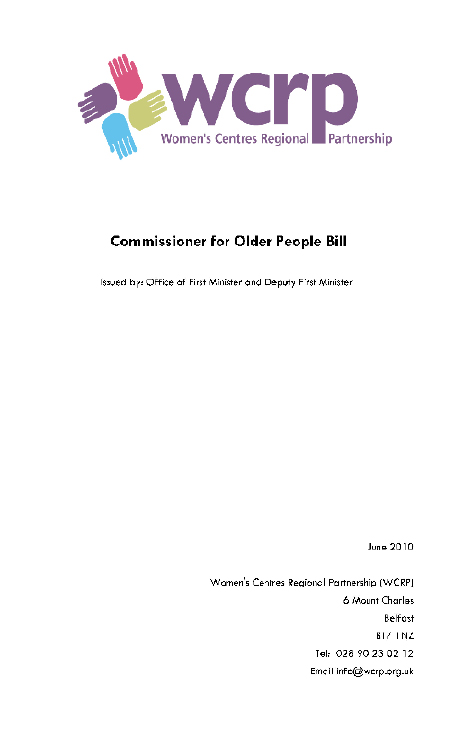
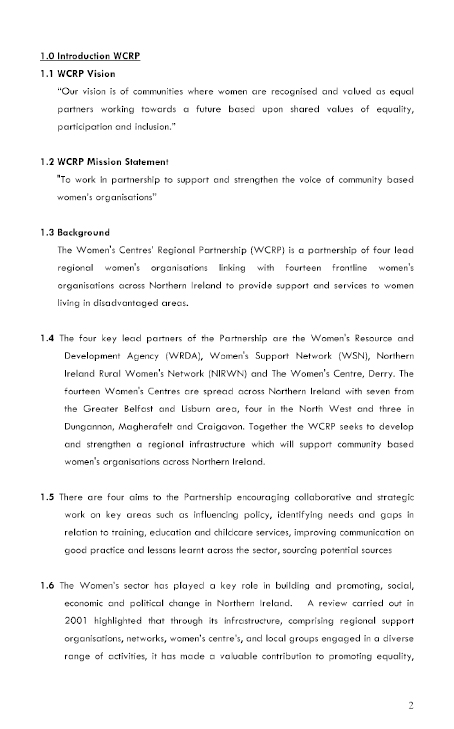
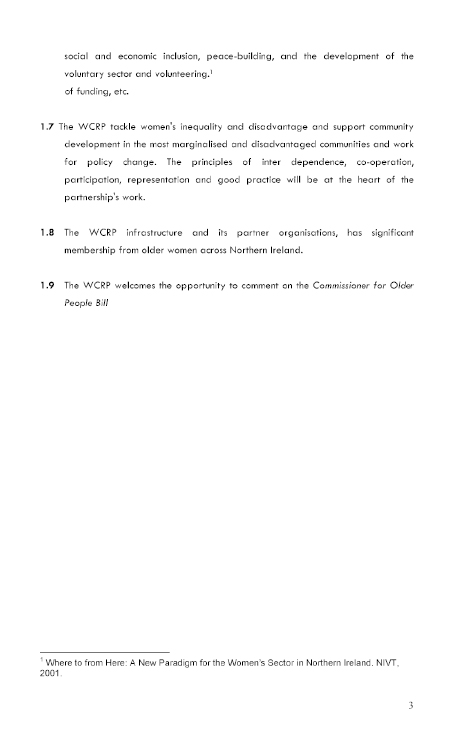
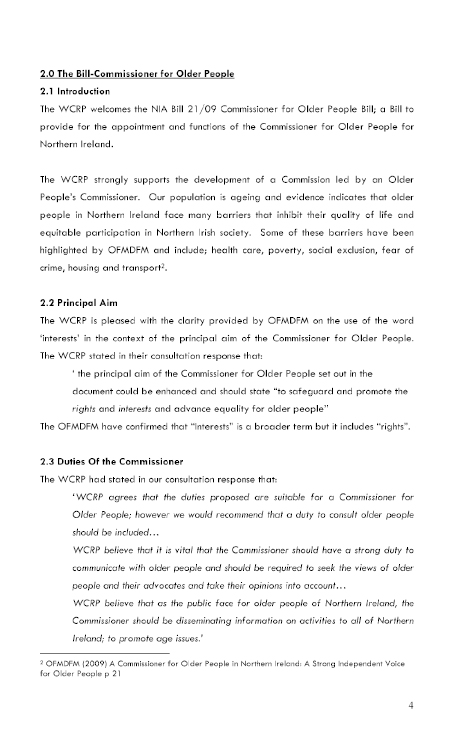
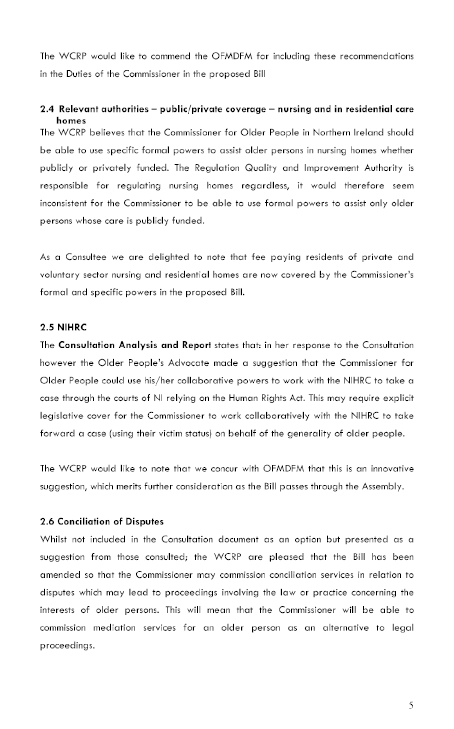
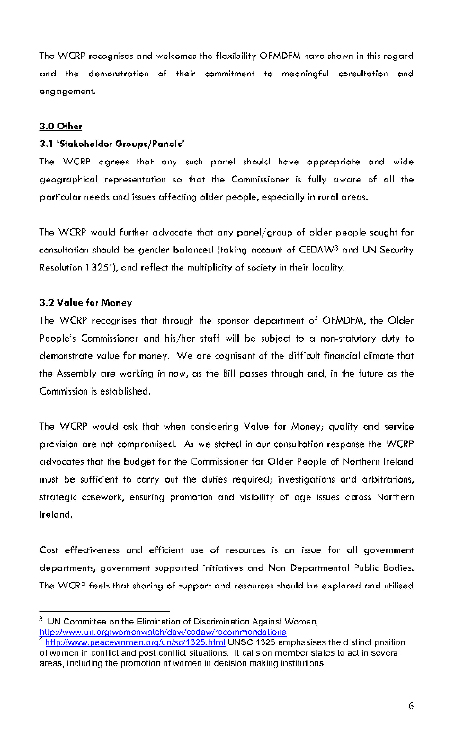
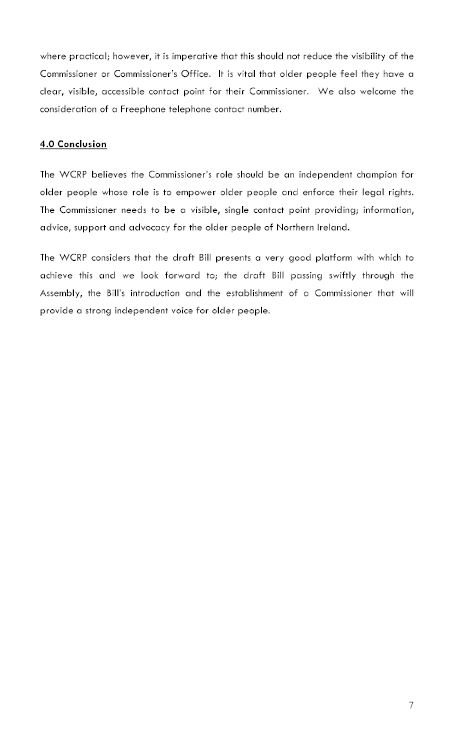
Dame Joan Harbison
Mrs Kate McCullough
Professor Monica McWilliams
Dr Nazia Latif
Ms Roisin Devlin
Mr Francis Hughes
Mr Duane Farrell
Ms Michelle Smyth
Dr Tom Frawley
Ms Michaela McAleer
Mr Tim Losty
Ms Jane Corderoy
Mr Stephen Orr
Mr Chris McCafferty
Cathie White
Clerk
Committee for OFMDFM
Room 416
Parliament Buildings
Ballymiscaw
Stormont
BELFAST
BT4 3XX 9 June 2010
Dear Cathie
You requested information on the secondary legislative making powers contained in the Commissioner for Older People Draft Bill. The appropriate powers are detailed below.
This clause contains a provision to allow OFMDFM to amend, by Order, the interpretation (specifically the age range) of the term "older person" as used in the Bill. This Order making power is subject to a caveat at clause 25 (7) that any change made by Order cannot raise the age referred to in subsections (2) and (3) (age 50) above 60. A provision in clause 25 (8) states that a draft of any Order must be laid before, and approved by resolution of the Assembly. Finally, a sub-section to this clause at 25 (9), states that any order made under clause 25 (6) may contain such transitional provisions as OFMDFM thinks appropriate.
This clause contains provisions that allow OFMDFM to amend the list of relevant authorities contained in Schedule 3 to the Draft Bill; either by adding, removing or otherwise modifying an entry. A provision in clause 26 (3) states that a draft of any Order must be laid before, and approved by, a resolution of the Assembly. A sub-section at 26 (4), states that any Order made under clause 26 (2) may contain such transitional provisions as OFMDFM thinks appropriate. Finally, a sub-section of the clause at 26 (5) allows any Order made at clause 26 (2) to enable the inclusion of any body or person added by that Order to be subject to any modifications or exclusions that are specified in the Order.
Clause 28 contains provision for OFMDFM to bring into operation other provisions of the Act (other than Clause 1 and Clauses 25-29 which come into operation two weeks after Royal Assent) on such day or days as OFMDFM may appoint. Further to this sub-section (3) of clause 28 states that any Order made under clause 28 (2) may contain such transitional provisions as OFMDFM thinks appropriate.
I hope this is helpful in clarifying the position and we are happy to provide further information if required.
Yours sincerely
Signed Gail McKibbin
GAIL MCKIBBIN
Departmental Assembly Liaison Officer
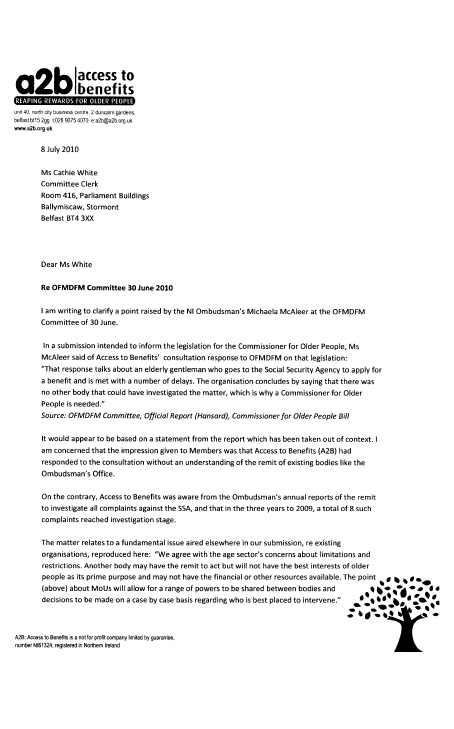
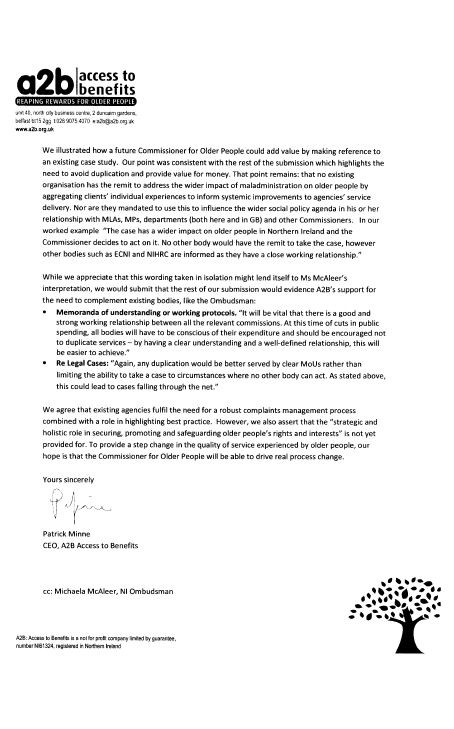
Cathie White
Clerk
Committee for OFMDFM
Room 416
Parliament Buildings
Ballymiscaw
Stormont
BELFAST
BT4 3XX 1 September 2010
Dear Cathie
As requested in your letter of 24 June 2010, I have attached the Departmental comments on the responses to the Bill received by the Committee.
Annex 1 is a table showing all of the responses and the Departmental Comments;
Annex 2 are the Departmental comments on issues raised specifically by the NI Ombudsman during his evidence session with the Committee on 30 June.
Yours sincerely
Signed Gail McKibbin
GAIL MCKIBBIN
Departmental Assembly Liaison Officer
This table brings together all of the responses whether by proposed amendment or comment made by each of the eight organisations that submitted written submissions to the OFMDFM Committee regarding the Commissioner for Older People Bill.
Officials have used a similar tabular format to that used by the Age sector in their evidence to the Committee and so each suggested amendment or comment is detailed against the relevant section of the Bill to which it relates. The table outlines each section of the Bill, by clause. The second and third column provides detail on any amendment proposed or comment made and by whom and the explanation for that comment/amendment. The final column details the view/response from the Department indicating which issues Ministers wish to retain the current formulation in the Bill together with the reason and likewise for non-legislative policy issues, and also where Ministers would be prepared to bring forward legislative amendments to the Bill, subject to the Committee's views.
Some of the issues raised to the Committee by consultees are already provided for in the Bill and so do not require amendment to the legislation. Where this is the case this has been detailed and clarification provided on what the specific clause provides for and/or where this is covered.
Reflecting the number of amendments/comments and the size of the Bill itself and its schedules this is a substantial document. Pages 3 to 100 relate to the Bill. The second part of the table (pages 101 to 107) relate to comments made by consultees in respect of issues not included in the Bill for example this is where comments on 'victim standing' are included, and general comments from consutlees on other non-legislative matters for example resources, communication, and the transition process prior to establishing the Commissioner.
Draft Bill – May 2010 |
Proposed Amendments |
Comment/Reason Given for Proposed Amendment/Comment |
OFMDFM Comment |
|---|---|---|---|
The Commissioner for Older People for Northern Ireland (Clause 1) |
|||
| (1)There is to be an officer known as the Commissioner for Older People for Northern Ireland. | AGE NI There is to be an officer known as the Older People's Commissioner for Northern Ireland. | 1. Commissioner for Older People gives the impression of 'doing to/for people' while Older People's Commissioner suggests empowerment, something that older people 'own'/are part of. 2. Neither do we want a title that can be shortened to COP, which might give a more forbidding impression of the post than it ought to have. | There is nothing in the Bill which prevents the Commissioner from adopting the title, "The Older People's Commissioner for Northern Ireland" for operational purposes if he or she so wishes. However this will be a matter for the Commissioner to decide. The Title in the Bill is the appropriate title for legal purposes in keeping with the titles of comparable statutory bodies such as the Northern Ireland Commissioner for Children and Young People. The Welsh Commissioner decided to alter her title in the way proposed for operational purposes. However her legal title remains the Commissioner for Older People in Wales. |
| OLDER PEOPLE'S ADVOCATE The name should be changed to Older Peoples Commissioner. | Older peoples Commissioner suggests empowerment, a Commissioner that belongs to older people and encouraged them to be fully part of the process. | ||
| CITIZENS ADVICE BUREAU Support establishment of The Older Peoples Commissioner. | |||
| (2) The Commissioner is to be appointed by the First Minister and deputy First Minister acting jointly. | |||
| (3) The appointment of the Commissioner under subsection (2) may be made only after taking account of the views of persons aged 60 or over in accordance with arrangements made by the Office. | |||
Principal Aim of the Commissioner (Clause 2) |
|||
| (1)The principal aim of the Commissioner in exercising the functions of the Commissioner under this Act is to safeguard and promote the interests of older persons. | AGE NI (1) The principal aim of the Commissioner in exercising the functions of the Commissioner under this Act is to safeguard and promote the interests, including the rights, of older persons. | Ministers intend that 'interests' encompass 'rights', as confirmed during the 2nd Stage of the Draft Bill on 7th June. Nevertheless, it is the court that decides upon interpretation of law, even where its attention has been drawn to the stated intention in Hansard. The court will question the role and power of the OPC to intervene, dissecting the legislation to determine what power was given in and over what circumstances. Judges compare legislation to ascertain its intention and are liable to compare the OPC's legislation with that of NICCY to the detriment of the OPC and older people as 'rights' are specified in one and not the other. As Ministers have made clear that 'rights' are included that intention should be made clear in the legislation. This 'belt and braces' approach will mean that the Commissioner will never incur costs testing this point. In addition to amending Section 2(1) an interpretation amendment should be made to Section 27 to say that '"interests" includes rights'. The unequivocal inclusion of rights is also important in the matter of Victim Standing Status (see later). | "Interests" is a broader term covering the wider picture. It includes but is broader than rights. It is not usually defined in legislation as in the Commissioner for Older People in Wales Act, the Fair Employment and Treatment Order and the Commissioner for Victims and Survivors legislation. However after further consideration of the points made, subject to the Committee's view, Ministers would be prepared to amend the Bill, specifically Clause 27, Interpretation: general to clarify that in the Bill "interests" includes "rights". |
Principal Aim of the Commissioner (Clause 2) Continued |
|||
| (1)The principal aim of the Commissioner in exercising the functions of the Commissioner under this Act is to safeguard and promote the interests of older persons. | NIHRC Want Principal Aim to refer to "Rights". 2(1) Should read "The principle aim of the Commissioner in exercising the functions of the Commissioner under this Act is to safeguard and promote the interests, including the rights of older people. | NIHRC consider that interests is too vague a term to define. Rights are codified in domestic, national and international law. | See comment above. |
| OLDER PEOPLES ADVOCATE The Principal Aim should refer to interests and rights. | See comment above. | ||
| (2) In determining whether and, if so, how to exercise the functions of the Commissioner under this Act in relation to any particular older person the Commissioner's paramount consideration must be the interests of that older person but, in the Commissioner's dealings with any body or person under this Act, the Commissioner must at all times have regard to any statutory provision or rule of law which authorises or requires that body or person to act in a particular manner or authorises or requires that body or person to have regard to any consideration other than that mentioned above. | AGE NI In determining whether and, if so, how to exercise the functions of the Commissioner under this Act in relation to any particular older person the Commissioner's paramount consideration must be the interests of that older person. | Nothing after the word 'but' is necessary as the intention is implicit in the restrictions later in the legislation. It is not normal to have a restriction in the second section of a piece of legislation. Furthermore, it does not present a good impression. The legislation will read more clearly without it. | The second part of this section covers the Commissioners dealings with other bodies. The section after "but" is an important provision in relation to the Commissioner's dealings with other persons or bodies who have different authorities/requirements or have different considerations. The Department wishes to retain this formulation. |
Principal Aim of the Commissioner (Clause 2) Continued |
|||
| (3) In (a) considering, for the purposes of this Act, what constitutes the interests of older persons, and (b) determining whether and, if so, how to exercise the functions of the Commissioner under this Act, the Commissioner must have regard to the United Nations Principles for Older Persons adopted by the General Assembly of the United Nations on 16 December 1991. | AGE NI No proposed amendment but see comment. | We agree with the reference to the UN Principles for Older People. Older people also have rights under other European and international instruments to which the UK is obligated e.g. older people have the right to a private life (EHRC Art 8) and not to be subject to degrading treatment (ECHR Art 3) and under UN instruments such as CEDAW and CERD. Including the word 'rights' as argued above does not confer additional rights on older people; the OPC simply provides a way of exercising them, which is Ministers' stated intention. | See response to Clause 1(1). |
| NIHRC NIHRC believes the UN Principles for Older People do need to be considered but focus should be on Human Rights which older people have as set out in legally binding international treaties. | In relation to suggestions made in the public consultation about the Commissioner taking account of other relevant protocols and international agreements, we consider that the Commissioner should be aware of and take account of these (in a non-statutory manner) but we believe that the clear focus in the legislation should be on the UN Principles. We are proposing that as part of its sponsorship role OFMDFM should draw the Commissioner's attention to these other agreements upon appointment. These would include the UN Paris Principles of National Human Rights Institutions and the EU Employment Framework Directive. | ||
Duties of the Commissioner (Clause 3) |
|||
| (1) The Commissioner must promote an awareness of matters relating to the interests of older persons and of the need to safeguard those interests. | AGE NI The Commissioner must advocate the interests of older people, promoting awareness of matters relating to their interests and of the need to safeguard those interests. | We propose this amendment to close a gap we perceive between 'duties' and 'powers'. Legal and investigation powers are there to advocate change and improvement for older people; this is more than promoting awareness and it is not sufficiently reflected in the OPC's duties. Even though legal and investigation powers are in place, the court will ask how does the power further the duties, and will consider whether the duties include advocacy. | Advocacy is about representing an individual; what is being promoted here is an awareness of matters relating to the interests of older people generally. The Department would be concerned that this drafting suggestion could risk narrowing the power from 'representing' a group of older people to the power to 'advocate' for an individual older person or an individual complaint. This would potentially narrow the limit of the Commissioner's work. Advocacy is a key role for the Commissioner. The power of advocacy is already covered in the Bill by Clause 4(6) the wording of which has been used in a number of pieces of legislation for this purpose. OFMDFM would propose putting a note in the EFM clarifying this to make it explicit that 4(6) provides the Commissioner with the power of advocacy. |
| OLDER PEOPLE'S ADVOCATE There should be a duty to act as an advocate this should be defined and articulated. | |||
| (2) The Commissioner must keep under review the adequacy and effectiveness of law and practice relating to the interests of older persons. | |||
| (3)The Commissioner must keep under review the adequacy and effectiveness of services provided for older persons by relevant authorities. | |||
| (4) The Commissioner must promote the provision of opportunities for, and the elimination of discrimination against, older persons. | NIHRC Questions that this clause is a direct duplication of ECNI functions. | The ECNI position is correct. The ECNI duty under the Age Regulations is to "promote equality of opportunity". The Commissioner's duty is focused on promoting the "provision of opportunities for, and the elimination of, discrimination against older persons". | |
| ECNI No proposed amendment but see comment. | The Commission notes the difference between 'promoting the provision of opportunities for older people' envisaged for the Commissioner for Older People and promoting equality of opportunity which is one of the Commission's duties under the Age Regulations and other legislation. We recognise that this difference indicates the absence of potential conflict. We welcome the obligation on the Commissioner to promote the elimination of discrimination, which mirrors that of the Commission, believing that the broader the range of action against discrimination, the better the outcomes will be. | ||
Duties of the Commissioner (Clause 3) Continued |
|||
| (5) The Commissioner must encourage best practice in the treatment of older persons. | ECNI No proposed amendment but see comment. | We note the duty to encourage best practice in the treatment of older persons and the potential for this to overlap with our work to encourage best practice by employers in respect of workers whatever their age and would want to work to ensure no unnecessary or confusing duplication. | |
| (6) The Commissioner must promote positive attitudes towards older persons and encourage participation by older persons in public life. | WCRP Welcomes the duties in the Bill. | No comment required. | |
| (7) The Commissioner must advise the Secretary of State, the Executive Committee of the Assembly and a relevant authority on matters concerning the interests of older persons – (a) as soon as reasonably practicable after receipt of a request for advice; and (b) on such other occasions as the Commissioner thinks appropriate. | AGE NI We recommend the removal of 'a relevant authority'. | This subsection is a 'must', thus making it a requirement for the OPC. The Executive and the Secretary of State represent the devolved and reserved arrangements and it is right that the OPC 'must' respond' to their requests for advice as well as present advice on the OPC's own initiative. However, the requirement to respond to requests from every relevant authority will place a heavy burden on the OPC, and impinge on the OPC's capacity to initiate, pursue and fulfil other duties. While the OPC should and is likely to respond to requests for advice from relevant authorities, it should have the discretion to decide whether this is an appropriate use of resources, etc. | There is no evidence to suggest that the obligation to respond to requests for advice from relevant authorities would prove to be burdensome. Based on the experience of NICCY and other comparable bodies the Department therefore considers this to be a helpful provision and to retain it in the Bill. |
| NIHRC Would prefer the wording "matters concerning" replaced with "on measures which ought to be taken to protect the interests of older people" (C1.3 (7)). | We consider that what the NIHRC have suggested is narrower than the current provision. Their proposal creates a duty only to advise on what positive steps to take. The Bill creates a duty to advise on matters concerning the interests of older people which is wider. | ||
Duties of the Commissioner (Clause 3) Continued |
|||
| (8)The Commissioner must take reasonable steps to ensure that - | ADVICE NI Definition needed/concern about "reasonable steps". | This gives the Commissioner a large degree of interpretation and they are "weary of how this might be qualified and delivered". | The term "reasonable" is not defined in legislation because what would be considered reasonable will vary with the facts of the particular case. There must be a degree of discretion allowed which enables the particular circumstances to be taken into consideration when determining what is a reasonable course of action. |
| (a) older persons are made aware of (i) the functions of the Commissioner; (ii) the location of the Commissioner's office; and(iii) the ways in which they may communicate with the Commissioner; | NIHRC Want "functions" to be defined. | They believe its scope is unclear and as both functions and duties are referred to in the legislation and they are unsure about what aspects of the Bill are covered by "functions." | This is unnecessary because any statutory powers or duties of a body are "functions" under the definition of the Interpretation Act 1954. |
| (b) older persons are encouraged to communicate with the Commissioner; | |||
| (c) the views of older persons are sought concerning the exercise by the Commissioner of the Commissioner's functions; | AGE NI No proposed amendment but please see comment. | We do not have an amendment to this subsection, but simply draw attention to the importance of a good working relationship between the OPC and age sector organizations in support of older people. The OPC must be independent from the sector, and also not become simply an extension of the sector by taking on functions already undertaken in the sector. The Welsh experience demonstrates the importance of these relationships and of managing them well. Ideas from Wales and NI include Memorandums of Understanding and referral protocols between the Commissioner and age organisations. | We note the comments made. As part of OFMDFM's sponsorship role of the Commissioner, it will expect the Commissioner to make every effort to agree memoranda of understanding with relevant and appropriate organisations. A joined-up approach will ultimately better protect the rights and interests of older people as well as ensuring the efficient use of resources. |
| WCRP Welcomes the Commissioner having a strong duty to communicate with older people. | No comment required. | ||
| WCRP Welcomes the proposal that there is a duty to consult older people. | No comment required. | ||
| (d) The services of the Commissioner are, so far as practicable, made available to older persons in the locality in which they live. | ADVICE NI Definition needed/concern about "as far as is practicable" | Concerned that this could enable inequalities to develop and result in some older people to be left without the Commissioner's service. | The term "as far as is practicable" (similar to "reasonable") is not defined in legislation because what would be considered practicable will vary with the facts of the particular case. There must be a degree of discretion allowed which enables the particular circumstances to be taken into consideration when determining what is a practicable course of action. |
General Powers of the Commissioner (Clause 4) |
|||
| (1) The Commissioner may undertake commission or provide financial or other assistance for research or educational activities concerning the interests of older persons or the exercise of the Commissioner's functions. | CITIZENS ADVICE BUREAU No proposed amendment but see Comment. | The Commission should also be able to provide mediation and advocacy to assist people. This is a process less costly and quicker that court or tribunal proceedings. Many cases would be suitable for this recourse without the need for litigation. | The new Clause 12 "Conciliation of Disputes" in the Bill provides for such services. The consultation document1 explains this. The Bill enables the Commissioner to make arrangements (including the providing of funds) to enable conciliation services to be made available in disputes concerning the interests of older people. |
| (2) The Commissioner may, after consultation with such bodies or persons as the Commissioner thinks appropriate, issue guidance on best practice in relation to any matter concerning the interests of older persons. | |||
| (3) The Commissioner may, for the purposes of any of the Commissioner's functions, conduct such investigations as the Commissioner considers necessary or expedient. | NI OMBUDSMAN No proposed amendment but see comment. | The notion of an ombudsman advocate is self-evidently contradictory. Clearly, therefore, anyone who is the subject of an investigation by the Commissioner for Older People will always have the perception that the very title of the office biases the investigation in favour of older people. | There are successful precedents for this model: the Children's Commissioner for Wales; the Older Peoples Commissioner for Wales; NICCY; the Irish Ombudsman for Children, the Norwegian Ombudsman for Children. Any potential for tensions between the advocacy and investigatory roles within an organisation can be well managed internally through the creation of different teams etc. On the issue of bias, any organisation, tasked with investigatory functions seeks to prove or disprove the complaint based on an independent investigation informed by evidence gathered. A decision by the Commissioner would be based on the evidence gathered and the Commissioner, as with any organisation, would be exposed if he/she were to make a decision contrary to these findings. |
| ECNI No proposed amendment but please see comment. | The Commission is concerned that an impression may have been created in evidence to the Committee that a body that reports to a Minister or Ministers cannot be independent; that the provision of funding through a Department can have a similar effect; and that there is an inherent incompatibility between the role of advocacy or advice, on the one hand, and enforcement on the other. Whatever reservations the Commission has in respect of the present proposals, it does not share the view that they can be assailed on these grounds. To do so would question the proper functioning of a number of public authorities. | ||
General Powers of the Commissioner (Clause 4) Continued |
|||
| (4) If the Commissioner so determines, Schedule 2 is to apply in relation to an investigation conducted by the Commissioner for the purposes of the Commissioner's functions under section 3(2) or (3). | |||
| 5) The Commissioner may - (a) compile information concerning the interests of older persons; (b) provide advice or information on any matter concerning the interests of older persons; (c) publish any matter concerning the interests of older persons, including (i) the outcome of any research or activities mentioned in subsection (1); (ii) the outcome of any investigations conducted under subsection (3); (iii) any advice provided by the Commissioner. | |||
| (6) The Commissioner may make representations or recommendations to any body or person about any matter concerning the interests of older persons. | ADVICE NI Need measures in the Bill to ensure recommendations are thoroughly acknowledged and acted upon. | See comments under 3(1) above regarding how this subsection empowers the Commissioner to act as an advocate. This will be clarified in the EFM. On enforcement powers/sanctions see comments under 'Sanctions' at Part 2 below. | |
General Review of Advocacy, Complaint, Inspection and Whistle Blowing Arrangements of Relevant Authorities (Clause 5) |
|||
| (1) This section and section 6 apply to the following arrangements of a relevant authority | Citizens Advice Bureau (CAB) No proposed amendment but see Comment | Supports the specific powers of review, however the CAB would encourage the Commissioner to have clear definitions of when there is no other body to offer assistance. | We note the comments made. As part of OFMDFM's sponsorship role of the Commissioner, it will expect the Commissioner to make every effort to agree memoranda of understanding with relevant and appropriate organisations. A joined-up approach will ultimately better protect the rights and interests of older people as well as ensuring the efficient use of resources. This process as well as specific clauses in the Bill will enable the Commissioner to determine when another body may or may not be able to offer assistance. |
| (a) advocacy arrangements, that is to say arrangements for making persons available (i) to represent the views, wishes and interests of older persons in relation to whom any functions of the authority are exercisable; and (ii) to provide such older persons | |||
| (A) with information, advice and support to enable or assist them to express their views and wishes to the authority; and (B) with advice about their interests; (b) complaint arrangements, that is to say arrangements for dealing with complaints made to the authority by older persons about actions taken in relation to them by that or another relevant authority; (c) inspection arrangements, that is to say arrangements for examining the state and management of, and the treatment of older persons on, any premises managed by that or another relevant authority in which (i) an older person is living or being looked after; (ii) an older person is being detained whether under any statutory provision or otherwise; or (iii) health, welfare or any other services are provided for older persons; and | |||
| ECNI No proposed amendment but see Comment | On the face of the section the complaints issue at Clause (1)(b) looks like a duplication although that seems to be resolved later; (1) (d) (ii) also has an Equality Scheme dimension; and we consider that Clause 5 (2) could overlap with aspects of Schedule 9. | Provisions in this clause at Sub-section 5(4) minimise duplication with other bodies. ECNI's role is in the effectiveness of how public bodies have fulfilled their Section 75 obligations including approval of Equality Schemes. The Clause in this Bill provides for wider remit of the oversight role of the Commissioner. The Commissioner could respond to a problem and look at or review the internal procedures. | |
| (d) whistle-blowing arrangements, that is to say arrangements for ensuring that proper action is taken in response to any disclosure of information which may tend to show (i) that a criminal offence has been committed; (ii) that a person has failed to comply with any legal obligation to which that person is subject; (iii) that the health and safety of any older person has been endangered; (iv) that the rights of any older person have been infringed; or (v) that any matter falling within one of the preceding paragraphs has been deliberately concealed, in the course of, or in connection with, the exercise by the relevant authority of any of its functions in relation to older persons. | |||
| (2) Subject to subsections (3) and (4), the Commissioner may review the operation of any arrangements to which this section applies for the purpose of ascertaining whether, and to what extent, the arrangements are effective in safeguarding and promoting the interests of older persons. | |||
| (3) The Commissioner may not exercise the Commissioner's power under subsection (2) in relation to any arrangements made by a relevant authority unless the Commissioner has reasonable grounds to believe that (a) the arrangements in question are ineffective in safeguarding and promoting the interests of older persons; or (b) those arrangements have not been operated, or have been operated incorrectly. | |||
| (4) The Commissioner may not review the operation of the inspection arrangements made by a relevant authority unless it appears to the Commissioner that there is no other body or person likely to review those arrangements. | AGE NI No proposed amendment but see comment. | 1. The Age Sector would prefer unrestricted powers to meet the standards of the Paris Principles but are prepared to accept this wording, which is a change to the original formulation. 2. Memorandums of Understanding between the OPC and other bodies will be important. | This subsection has already been amended in response to comments from consultees during the OFMDFM consultation. The revised clause now gives the Commissioner greater discretion to act. |
| (5) Where a relevant authority has failed to make any arrangements of a kind mentioned in subsection (1), the Commissioner may assess the effect of that failure on older persons. | |||
| (6) The power conferred by this section to review the operation of any arrangements includes power to review the failure of any such arrangements to operate. | |||
Review of Advocacy, Complaint, Inspection and Whistle-blowing Arrangements of Relevant Authorities in Individual Cases (Clause 6) |
|||
| (1) Subject to subsections (2) and (3), the Commissioner may review the operation of any arrangements to which this section applies in the case of a particular older person (or, as regards inspection arrangements, in the case of any particular premises). | CITIZENS ADVICE BUREAU No proposed amendment but see comment. | Citizens Advice Bureau - CAB believe there should be a clear understanding of when it is appropriate for the Commissioner to intervene. | See comments under 5(1) above. |
| (2) The Commissioner may not exercise the Commissioner's power under subsection (1) in relation to the operation of any arrangements made by a relevant authority in the case of a particular older person unless the Commissioner has reasonable grounds to believe that (a) the arrangements in question were ineffective in safeguarding and promoting the interests of the older person concerned; or (b) those arrangements did not operate, or were operated incorrectly, in relation to the older person concerned. | |||
Review of Advocacy, Complaint, Inspection and Whistle-blowing Arrangements of Relevant Authorities in Individual Cases (Clause 6) Continued |
|||
| (3) The Commissioner may not review the operation of the inspection arrangements made by a relevant authority unless it appears to the Commissioner that there is no other body or person likely to review those arrangements. | AGE NI No proposed amendment but see comment. | 1. We wanted unrestricted powers to meet the standards of the Paris Principles but are prepared to accept this wording, which is a change to the original formulation. 2. Memorandums of Understanding between the OPC and other bodies will be important. | This subsection has already been amended in response to comments from consultees during the ODFMDFM consultation. The revised clause now gives the Commissioner greater discretion to act. |
| (4) The power conferred by subsection (1) to review the operation of any arrangements includes power to review the failure of any such arrangements to operate. | |||
| (5) Where a relevant authority has failed to make any arrangements of a kind mentioned in subsection (1), the Commissioner may assess the effect of that failure on any particular older person. | |||
Assistance with Complaints to Relevant Authorities (Clause 7) |
|||
| (1) The Commissioner may provide assistance (including financial assistance) to an older person in making a complaint to a relevant authority that the interests of the older person have been adversely affected by any action taken by that or another relevant authority. | OLDER PEOPLE'S ADVOCATE The Advocate believes that this Clause could be misleading and suggests that the Commissioner would take on any issue that older people bring to the office. She believes there needs to be clarity that the issues the Commissioner deals with must have a strategic benefit (i.e. affects a lot of people). | This Clause is aimed at assisting individuals and so in deciding whether to exercise the Commissioner's functions in relation to a particular older person Clause 2(2) applies. This means that it is the interests of the individual older person that must be the Commissioner's paramount consideration. This Clause was also amended [at 7(1), 7 (3), 7(4)] following public consultation to give the Commissioner greater discretion to act. | |
| (2) The Commissioner may act on behalf of an older person in - (a) making such a complaint to a relevant authority; and (b) any investigation or other proceedings conducted by that authority pursuant to the complaint. | . | ||
| (3) In deciding whether to provide assistance to an older person under subsection (1), the Commissioner may take account of the financial or other assistance available to the older person in relation to the complaint. | AGE NI No proposed amendment but see comment. | We are prepared to accept this wording, which is a change to the original formulation. | The purpose of this clause is to prevent duplication of the Commissioner's work with that of other bodies. However it was amended in response to the public consultation to give the Commissioner greater discretion to act. |
| ECNI No proposed amendment but see comment. | Section 7 seems, on its face, to collide with the legal assistance provisions of existing, and any future, anti-discrimination legislation and, perhaps, with aspects of the Section 75 arrangements. It is recognised that some steps have been incorporated to limit this but it is not clear if duplication is entirely avoided. | ||
| CITIZENS ADVICE BUREAU No proposed amendment but see comment | CAB are supportive of assistance with complaints to Relevant authorities, however they dispute the condition that the Commissioner will again only act in the occasion that no other body is available to assist. | ||
| ECNI – Clause7 (3) & (4). Want the restriction strengthened so that the "Commissioner should be obliged to satisfy herself/himself that no other body is likely to provide assistance (including financial) to an older person or act on behalf of an older person. | |||
| (4) In deciding whether to take action on behalf of an older person under subsection (2), the Commissioner may take account of whether there is any other person or body likely to take such action. | AGE NI No proposed amendment but see comment. | 1. The Age Sector would prefer unrestricted powers to meet the standards of the Paris Principles but are prepared to accept this wording, which is a change to the original formulation. 2. Memorandums of Understanding between OPC and other bodies will be important. | See comment at 7(3). |
| (5) Where the making of a complaint to a relevant authority is regulated by a statutory provision, nothing in this section authorises a complaint to be made to that authority otherwise than in accordance with that provision. | |||
| (6) For the purposes of this section, "relevant authority" also includes the Northern Ireland Commissioner for Complaints, the Assembly Ombudsman for Northern Ireland, the Information Commissioner, the Pensions Ombudsman and the Northern Ireland Office. | AGE NI No proposed amendment but see comment. | All 'relevant authorities' should be included for all aspects of the legislation. Why are these bodies included in the legislation only for the purposes of this section, i.e. under the Commissioner's power to assist with complaints, yet are excluded from other aspects? | All of these bodies (except the NI Commissioner for Complaints/Assembly Ombudsman) operate in the reserved field. They can be included as relevant authorities for all clauses in the Bill if they consent to be so included. These bodies did not give their consent to being included as relevant authorities with the exception of being so included for this clause alone. The NI Ombudsman regards his Office as the oversight body of last resort and therefore did not agree to his inclusion as a relevant authority for other clauses in the Bill. It is however for the Assembly to determine the scope of the oversight role for the Commissioner and there is no constitutional/legal reason why the NI Ombudsman should not be listed. [The inclusion of the NI Ombudsman for all purposes may be a matter for the Assembly to consider.] |
Investigation of Complaints against Relevant Authorities (Clause 8) |
|||
| (1) Subject to subsection (2) and section 9, the Commissioner may conduct an investigation into a complaint made by an older person that the interests of the older person have been adversely affected by any action taken by a relevant authority. | OLDER PEOPLE'S ADVOCATE No proposed amendment but see comment. | Clauses 8 and 9 do not describe what the Commissioner can do but rather the restrictions on any power of investigation that the Commissioner may have. | Comment noted. |
| NI OMBUDSMAN No proposed amendment but please see comment. In relation to a credible review process, the commissioner will be confined to dealing purely with a narrow jurisdiction and complaints from older people. I believe that that will lead inevitably to what I would describe as service capture. | An Ombudsman, must be in a position to investigate anyone's grievances concerning any decision, recommendation or action, and must consider that grievance against the context of competing priorities, which will involve all individuals and groups, not just older people. The notion of an ombudsman advocate is, therefore, I contend, self-evidently contradictory. Clearly, therefore, anyone who is the subject of an investigation by the Commissioner for Older People will always have the perception that the very title of the office biases the investigation in favour of older people. | The Department does not accept that the Commissioner, in providing a service to older people, will not be capable of carrying out Reviews of the internal procedures of relevant authorities in a professional and independent manner. | |
| CLAUSE 8 CONTINUED (2) The Commissioner may not exercise the Commissioner's power under subsection (1) in relation to a complaint unless the Commissioner is satisfied that (a) the complaint raises a question of principle; and (b) the complaint does not fall within an existing statutory complaints system. | AGE NI (2) The Commissioner may exercise the Commissioner's powers under subsection (1) in relation to a complaint when (a) the complaint falls within the aims and duties of the Commissioner; and (b) it appears to the Commissioner that there is not likely to be an investigation within a statutory complaints system. | 1. This is an extremely negative way of framing the Commissioner's powers, which could neutralise casework powers and undermine investigation powers. Most casework will be in areas of statutory complaints procedures and the powers are gravely weakened if the OPC is not able to launch an investigation as a last resort. The Commissioner must have full and proper power to investigate matters germain to its aims and duties and to look at the matters through the eyes of older people. In our view it is essential to amend this section, particularly (2) (b). 2. There are also cost implications. Adequate powers under this section will significantly reduce the need to use judicial review and thus reduce costs. If these powers are disallowed then the OPC may have no other option but to go to court on an important case. Furthermore, sufficient powers here will facilitate the use of the alternative dispute resolution (ADR) (alternative to going to court) which is much cheaper. Our essential amendment to (2) (b) will assist the OPC to be an effective casework body underpinned by the ultimate use of investigation where necessary rather than a litigation-driven body. | The Department considers that what is proposed is potentially more restrictive, i.e. specifying the (only) circumstances when the Commissioner may act rather than the limited circumstances when he/she may not. It is also intended to avoid duplication of the Commissioner's work with that of other bodies which already possess the responsibility, the expertise and the resources to act on a complaint. The Commissioner would be able to challenge any such organisation that did not respond promptly to a complaint from an older person by making representations or recommendations as empowered under Clause 4(6). "Question of principle" is a well established and understood legal concept. It is used in NICCY, the Equality (Disability) (NI) Order 2000 and FETO among others and is undefined. It generally means that the issue raises a matter of public concern or public interest. It is not merely a matter about a dispute based on a personal preference; it must raise a strategic issue. |
| 3. 'Question of principle' is not legally defined and may be ambiguous. We suggest that the legislation will be clearer if, where possible, it refers instead to the OPC's remit or aims and duties. It is not our intention to change the OPC's focus from strategic work. We believe that the Commissioner should adopt a strategic focus, based upon clear principles, which it develops in its strategic and business planning. Rather we want to ensure that there is no doubt about the OPC's standing to undertake this work. 4. The Age Sector wish to emphasise concern about the very restrictive nature of this section to which we urge amendment. Please note that we are making two separate points in this section, one in relation to (b) and one in relation to (a). | See comments above. See comments above on question of principle. On the issue of duplication the Department believes that Clause 8(2) prevents duplication in relation to the power of investigation of complaints. In addition there are many other subsections of the Bill that also limit the Commissioner from acting in circumstances where another body already has the responsibility, expertise and resources to act. This does not prevent the Commissioner from challenging the body about any delay in acting. | ||
| CLAUSE 8 CONTINUED | NIHRC 'Question of principle' is not legally defined and may be ambiguous. We suggest that the legislation will be clearer if, where possible, it refers instead to the OPC's remit or aims and duties. No proposed amendment but see comment. | The first area of concern is the risk of duplication between the proposed Commissioner for Older People and other bodies. | This provision aims to prevent duplication with other bodies by restricting the Commissioner's powers to act where another organisation has responsibility in that area. |
| ECNI No proposed amendment but see comment. | The provision at sub-paragraph (b) seems to remove any potential for clash with the Commission's role in respect of investigation of complaints. | The ECNI are correct. This is the case. | |
| CLAUSE 8 CONTINUED | OLDER PEOPLE'S ADVOCATE Wants to know how "question of principle" is defined. Wants to know what is the cut off point between informal and formal investigations. | See comments above on "question of principle". The formal investigation powers are significant. The decision on whether to carry out a Formal Investigation is a matter that is left to the discretion of the Commissioner. This may include cases where there is evidence of significant systemic failure in a public service or where the same problem arises repeatedly, indicating that remedial action has not been taken by the body to prevent the recurrence of the problem. | |
| NIHRC Question what type of case would not fall within existing complaints systems and if most complaints are within the remit of the Ombudsman what is the point of this power if this clause is retained (Cl. 8). | The Commissioner's complaint investigatory power is focused on complaints that adversely impact on the interests of older people. It is therefore wider than complaints based on, for example, maladministration that may focus on the procedural aspects of a decision rather than the merit or how it affects an older person's 'interests'. Many public bodies do not have statutory complaints systems. | ||
| CITIZENS ADVICE BUREAU No proposed amendment but see comment | Question why cases can only be investigated on a point of principle and recommend that the Commissioner is given full powers of investigating complaints. | See comments above on "question of principle". | |
| NI OMBUDSMAN No proposed amendment but see comment. | I acknowledge that the new commissioner will be advised not to act without due regard to the statutory powers and duties of other organisations; However, the legislation will not prevent him or her from doing so. | This statement is incorrect. Clause 8(2) does prevent the Commissioner from acting when another body has a statutory complaint system. There are many other examples of clauses limiting the Commissioner from acting when another body has responsibility. As an example these include Clause 5(4); Clause 6(3); Clause 7(4); Clause 9 in its entirety; and Clause 11(3). | |
| (3) For the purposes of subsection (2), a complaint falls within an existing statutory complaints system if a statutory provision confers power on a person to make the complaint to a body or person and (a) that body or person has power under a statutory provision to investigate the complaint; or (b) that body or person would have power under a statutory provision to investigate the complaint but for some exclusion or restriction in that statutory provision. | AGE NI The Age Sector recommend that this subsection should be removed in light of the proposed amendment above. | We propose the removal of this subsection. As a definition of aspects of subsection (2) as it currently stands it is directly contradictory to our proposed amendment. Subsections (2) and (3) as currently worded mean that the court would not know to what to give legislative supremacy. Subsection 3(b) is particularly unacceptable as it leaves a 'void' which the OPC ought to be able to fill. It means that no body can investigate some matters - in other words a matter may be excluded from a statutory complaints system due to a restriction and the OPC could not examine it either. | In relation to subsection 3(b), the reason for this is the need to respect the content of existing legislation. Where such exclusion would be detailed in existing legislation there would have to be a very firm foundation for this, for example a complaint may be excluded under a statutory provision if it is considered malicious or there has been unreasonable delay in making the complaint. The Consultation Analysis Report provides further information on this and examples (paragraphs 11.22 – 11.23 refer).2 |
| NIHRC Requested clarification on this point. | |||
| Where the Commissioner decides not to conduct an investigation into a complaint made under subsection (1), the Commissioner must prepare a statement of the Commissioner's reasons for that decision and must send a copy of the statement to - (a) the complainant; and (b) such other persons (if any) as the Commissioner considers appropriate. | |||
Actions which may be investigated: Restrictions and Exclusions (Clause 9) |
|||
| The Commissioner may not conduct an investigation in respect of any action in respect of which the complainant has or had (a) a right of appeal, complaint, reference or review to or before a tribunal constituted under any statutory provision or otherwise; or (b) a remedy by way of proceedings in any court, unless the Commissioner is satisfied that, in the particular circumstances, it is not reasonable to expect the complainant to resort to or have resorted to the right or remedy. | AGE NI We propose the following amendment; OPTION 1 Remove the subsection completely. OR OPTION 2 (1) The Commissioner is not authorised or required to discharge a function in relation to a matter to the extent that the matter is the subject of legal proceedings before, or has been determined by, a court or tribunal. | Even with the rider at the end of this subsection, we believe this subsection is restrictive and not worded well. Almost everything has a legal remedy – legal remedies are a parallel process that should not negate other avenues. For example, the Prison Ombudsman can investigate even where there is a legal remedy. To be sufficiently robust the OPC should have similar powers of investigation. We suggest that the subsection is removed or else wording similar to that in the Commissioner for Wales Act (s21) is used i.e. 'This Act does not authorise or require the Commissioner to discharge a function in relation to a matter to the extent that the matter is the subject of legal proceedings before, or has been determined by, a court or tribunal.' As can be seen from the Welsh legislation the focus is on the exercise of a remedy rather than the existence of a remedy. | The significant risk with the Age Sector proposal is that the investigation process could be used, by someone who wishes to take a legal case but may not have the evidence, as a means of obtaining evidence to be used in future legal proceedings. If legal proceedings following an investigation in this manner did occur, it would then make it much more difficult for the Commissioner to carry out future investigations. The relevant authority involved would be aware of the need to prepare themselves for the possibility of legal proceedings following the investigation which would significantly alter the nature of the relationship between the Commissioner and the relevant authority during the conduct of the investigation. The qualification to this clause is not a wide ranging restriction and allows for the Commissioner to assess if in the circumstances 'it is not reasonable' for the complainant to have resorted to the right to remedy. The Department considers that it is preferable to retain the current wording which gives the Commissioner the flexibility to decide whether or not to carry out an investigation. |
| CITIZENS ADVICE BUREAU No proposed amendment but see comment. | The process of carrying out an investigation could resolve the dispute in some cases. However where recommendations may not be enough then the Commissioner will need harsher actions and a system of compliance with strict time limits and penalties. | See comments on enforcement powers/sanctions below at Part 2 of the table. | |
| OLDER PEOPLES ADVOCATE Clarification of the meaning of remedy is needed. Cl.9(1) | See comments above on 9(1). | ||
| 2) The Commissioner may not conduct an investigation in respect of (a) the commencement before any court in the United Kingdom of (i) any criminal proceedings; or (ii) any civil proceedings by any person other than a relevant authority; (b) the conduct of any civil or criminal proceedings before any court in the United Kingdom; or (c) the commencement or conduct of any proceedings before any international court or tribunal. | |||
| (3) The Commissioner may not conduct an investigation in respect of any action which is, or has been, the subject of a local or public inquiry. | AGE NI 3) The Commissioner may not conduct an investigation in respect of any action which is, or has been, the subject of a local or public inquiry, unless new evidence or material comes to light which would warrant such an investigation. | We suggest that it is sensible to add this rider to the subsection for the unforeseen. | The risk with this proposal is that individuals could withhold relevant evidence from a public inquiry. In the event of the inquiry outcome not meeting their expectations the withheld evidence could then be used to produce an investigation by the Commissioner. This would be a very undesirable outcome and we would intend therefore to retain the current wording. |
| OLDER PEOPLE'S ADVOCATE "There should be a time limited on enquiries affecting older people". | We have been advised that the period of time during which enquiries affecting older people should reasonably be completed will be dependent on the particular circumstances of the case. We consider therefore that it would not be appropriate to include time limits in the legislation. | ||
| (4) The Commissioner may not conduct an investigation into a complaint if it appears to the Commissioner that there has been an unreasonable delay in making the complaint to the Commissioner. | OLDER PEOPLE'S ADVOCATE Unreasonable delay needs to be defined. | See comments above on 3(8). | |
Power to bring, intervene in or assist in legal proceedings (Clause 10) |
|||
| (1) Subject to the following provisions of this section, the Commissioner may in any court or tribunal (a) bring proceedings (other than criminal proceedings) involving law or practice concerning the interests of older persons; (b) intervene in any proceedings involving law or practice concerning the interests of older persons; (c) act as amicus curiae in any such proceedings. | CITIZENS ADVICE BUREAU No amendment - supportive of this power. | No comment required. | |
| (2) An intervention under subsection (1)(b) may not be made except (a) with the leave of the court or tribunal; and (b) in accordance with any such provision as may be made by the rules regulating the practice and procedure of the court or tribunal. | AGE NI No proposed amendment but see comment. | The practice should be established for the OPC to be recognised and called upon by the court to give expert oral or written evidence on a matter(s) affecting older people. | The Department agrees with this comment. Clause 10(1) (b) empowers the Commissioner to give oral or written evidence to a court through acting as amicus curiae. |
| (3) The Commissioner may not bring or apply to intervene in proceedings unless the Commissioner is satisfied that (a) the case raises a question of principle; or (b) there are other special circumstances which make it appropriate for the Commissioner to do so. | AGE NI We recommend the removal of this subsection. | 1. Section 10(1) already outlines the extent to the OPC's remit here so subsection (3) is not required. It will be difficult to get a court to allow a body to intervene with this provision. We have been advised that there may be future legal guidance that will clarify (and perhaps encourage the use of) interventions by appropriate bodies to assist the court. we should not pre-empt the LCJ's guidance. Intervention can be a cost effective way of exercising influence and it should not be made difficult. 2. Our note on 'question of principle' under 8(2) applies here. | Ministers are content with the current formulation of this clause. The purpose of the subsection is to focus the Commissioner's work in relation to legal proceedings on issues that affect older people generally or which raise special circumstances. [Any new guidance from the Lord Chief Justice could be considered by the Commissioner by way of paragraph (b) of this provision that is as under "special circumstances".] |
| ECNI No proposed amendment but see comment. | This provision seems to duplicate a capacity already possessed by the Commission. That, in itself, may not be an issue but care will be required to avoid unnecessary or costly duplication or confusion as to which approach best meets the needs of older people. | Clause 10(3) (a) provides a definition of when the Commissioner may act. As part of OFMDFM's sponsorship role of the Commissioner, it will expect the Commissioner to make every effort to agree memoranda of understanding with relevant and appropriate organisations. This will assist with preventing any overlap of powers. | |
| CITIZENS ADVICE BUREAU The CAB indicates support for this power and recommends a clear definition of managing overlap in powers with regard to separate procedures. | Clause 10(3) (a) provides a definition of when the Commissioner may act. As part of OFMDFM's sponsorship role of the Commissioner, it will expect the Commissioner to make every effort to agree memoranda of understanding with relevant and appropriate organisations. This will assist with preventing any overlap of powers. | ||
| OLDER PEOPLE'S ADVOCATE "principle needs definition" | See comments above on 8(2) regarding question of principle. | ||
Assistance in relation to legal proceedings (Clause 11) |
|||
| (1) This section applies to - (a) proceedings involving law or practice concerning the interests of older persons which an older person has commenced, or wishes to commence; or (b) proceedings in the course of which an older person relies, or wishes to rely, on such law or practice. | CITIZENS ADVICE BUREAU Supportive of this clause – see comments under Victim Status | CITIZENS ADVICE BUREAU Victim Standing - The issue around "Victim Standing" is a vital power for the Commissioner to be able to bring cases in their own name. Also see non-Bill matters. | Clause 10(1) does enable the Commissioner to bring legal cases in his/her own name. However in relation to cases relying on European Convention Rights, only the NI Human Rights Commission in NI can take cases without a "victim". This is not a power that can be granted through this Bill. It would require Westminster legislation. The NIHRC which does have victim standing is willing to take referrals from other organisations. In addition the Commissioner could take a judicial review case without directly using the Human Rights Act 1998 but relying on fundamental common law rights. The Commissioner could also support an individual person who was a "victim" to take a case. See additional comments on Victim Standing at Part 2 of this Table. |
| (2) Where the older person applies to the Commissioner for assistance in relation to proceedings to which this section applies, the Commissioner may, subject to subsection (3), grant the application if the Commissioner is satisfied that (a) the case raises a question of principle; (b) it would be unreasonable to expect the older person to deal with the case without assistance because of its complexity, or because of that person's position in relation to another person involved, or for some other reason; or (c) there are other special circumstances which make it appropriate for the Commissioner to provide assistance. | AGE NI (a) the case falls within the aims and duties of the Commissioner; | The note on 'question of principle' under 8(2) applies here. | See comments on 8(2) above. |
| (3) The Commissioner may not grant an application for assistance under subsection (2) unless it appears to the Commissioner that there is no other person or body likely to provide such assistance. | AGE NI No proposed amendment but see comment. | The Age Sector would prefer unrestricted powers to meet the standards of the Paris Principles, but this is acceptable. | The Department notes the comments. Limitations on the Commissioner's powers are necessary to prevent duplication of work with other bodies with the responsibility, expertise and resources to address matters. |
| ECNI No proposed amendment but see comment. | The provision at 11(3) appears inadequate to avoid duplication and there should be a clear requirement that the Commissioner satisfy herself/himself that no other body is considering an application, or that such consideration has resulted in a decision not to assist, together with a parallel requirement for the other body (ies) to respond to the Commissioner within a specified timescale. | This Clause limits the Commissioner's powers but does provide for the Commissioner to act in the instance where it appears that no other body or person is likely to provide assistance. At an operational level this could be supplemented with an MOU with the ECNI and the Commissioner drawing up criteria for funding such as the ECNI itself has. | |
| (4) Where the Commissioner grants an application under subsection (2) the Commissioner may arrange for the provision of legal advice or representation and any other assistance which the Commissioner thinks appropriate. | |||
| (5) Arrangements made by the Commissioner for the provision of assistance to an older person may, if the Commissioner thinks it reasonable in the circumstances, include provision for recovery of expenses from the older person. | AGE NI No proposed amendment but see comment. | Clarification of the purpose of this section is needed. Clear ground-rules must be established on the recovery of expenses from older people. We would have concerns that this section may inadvertently prove to be a deterrent to older people who have valid complaints to make or cases to pursue but who would fear the implications of approaching the OPC in light of this provision. | The purpose of this clause is to make the most effective use of the Commissioner's budget. It empowers the Commissioner to recoup costs where this is reasonable. |
Conciliation of disputes (Clause 12) |
|||
| (1) The Commissioner may make arrangements with any other person for the provision of conciliation services by, or by persons appointed by, that person in relation to disputes which may lead to proceedings involving law or practice concerning the interests of older persons | AGE NI The Commissioner may make arrangements with any other person for the provision of dispute settlement services by, or by persons appointed by, that person in relation to disputes which may lead to proceedings involving law or practice concerning the of older persons. | 1. We agree wholeheartedly with including alternative dispute resolution (ADR) processes. We agree with the Minister of Justice who sees ADR as a priority for getting results at the same time as saving costs. 2. We agree that the OPC should appoint external ADR personnel rather than undertake this in-house. 3. A strong set of ADR powers would be unique and would take the OPC out of the realm of overlap and duplication with other bodies. 4. We strongly recommend not restricting the power within the legislation to 'conciliation' which is at the lowest level of ADR: e.g. | Conciliation is defined in a broad manner in 12(7). This definition is comparable to that used in other legislation. However in response to the points made and subject to the Committee's view, the Department is willing to reconsider the definition of conciliation services. See alternate wording that could be substituted for definition of 'conciliation services' at Clause 12 (7). |
| (i) conciliation; (ii) mediation; (iii) arbitration. We suggest replacing 'conciliation' with 'dispute settlement'. This does not mean that all ADR processes will be included; it simply leaves open the possibility for introducing different levels of these as and when it appears right to do so. It is particularly important to have (i) Conciliation and (ii) mediation included. We appreciate that there are different interpretations of what 'conciliation' means and drafters might intend 'conciliation' to include the more interventionist mediation process whereby the mediator takes a more proactive role in brokering agreement. But we want to be sure that this useful role is included. 5. We propose an addition to section 27 (Interpretation: general) to clarify the meaning of dispute settlement services (or conciliation services if the legislation continues to use this term). | |||
| CITIZENS ADVICE BUREAU No proposed amendment but commented that, the Commissioner should "be able to provide mediation and advocacy to assist people in a process less costly and quicker than court or tribunal proceedings". | The new Clause 12 provides for this. | ||
| (2) Neither the Commissioner nor any officer of the Commissioner may participate in the provision of conciliation services for which arrangements are made under this section. | AGE NI We suggest changing 'conciliation services' to 'dispute settlement services'. | See note above under 12(1). | See comment above. |
| (3) The Commissioner must ensure that any arrangements under this section include appropriate safeguards to prevent the disclosure to the Commissioner or officers of the Commissioner of information obtained by a person in connection with the provision of conciliation services in pursuance of the arrangements. | NIHRC Question the need for this clause as they assume that the COP would initially seek a resolution outside of an official process and not require the services of a third party - question why this new clause is necessary given that a body with a case work function will ordinarily seek a resolution to a case outside of an official process. The Commission therefore asks why it is proposed to involve the services of a third party. The Commission does not believe it would compromise the office's role if it were itself to attempt to reach a resolution to the satisfaction of the complainant through informal means. | See note above under 12(1). | Based on the experience of comparable bodies, the Department would anticipate that the Commissioner could in some instances informally mediate in some disputes involving older people with the agreement of all parties involved. However if that proved unsuccessful and as an alternative to legal proceedings, the parties involved were willing to participate in formal conciliation undertaken by a neutral third party, Clause 12 empowers the Commissioner to procure such services. |
| (4) Subsection (3) does not apply to information relating to a dispute which is disclosed with the consent of the parties to that dispute. | |||
| (5) Subsection (3) does not apply to information which (a) is not identifiable with a particular dispute or a particular person; and (b) is reasonably required by the Commissioner for the purpose of monitoring the operation of the arrangements concerned. | AGE NI We suggest that the word 'and' between (a) and (b) be replaced with 'or'. | This sub-section is to enable the Commissioner to produce anonymised statistical information for his/her reports. Removing the 'and' could create the situation whereby the Commissioner could lawfully be given access to any information which does not have someone's name on it that one party (for e.g. the older person or a relevant authority) may not want them to receive. This scenario could potentially damage the conciliation process and so Ministers wish to retain the current formulation of the clause. Any of the information could of course be disclosed to the Commissioner with the consent of the parties involved. | |
| (6) Anything communicated to a person while providing conciliation services in pursuance of any arrangements under this section is not admissible in evidence in any proceedings except with the consent of the person who communicated it to that person. | AGE NI We suggest changing 'conciliation services' to 'dispute settlement services'. | See note above under 12(1). | See comments above at 12(1) and 12 (7). |
| (7) In this section "conciliation services" means advice and assistance provided by a conciliator to the parties to a dispute with a view to promoting its settlement otherwise than through the courts. | AGE NI We suggest changing "conciliation services" to "dispute settlement services". | See note above under 12(1). | Subject to the Committee's view, Ministers would be prepared 'in principle' to bring forward an amendment to substitute this current definition for similar wording to that used in the Equality Act 2006 [Section 27 (9)]. This provides a broader definition of 'conciliation services'. |
| OLDER PEOPLES ADVOCATE Should refer to "dispute resolution services" | See comments at 12(1) above. | ||
| NI OMBUDSMAN No proposed amendment but see comment. | Within the current proposal, the Commissioner for Older People can initiate arrangements to facilitate resolution of complaints, including the provision of funds to enable conciliation services. In respect of health and social care, that is a direct duplication of the current arrangements established only last year between the regional Health and Social Care Board and the trusts to facilitate mediation and alternative dispute resolution in health and social care. | The power of the Commissioner to arrange conciliation services is not limited to the field of health and social care. | |
Formal investigations (Clause 13) |
|||
| (1) Subject to section 14, the Commissioner may determine to conduct an investigation under this section ("a formal investigation") (a) for the purposes of the Commissioner's functions under section 5; (b) for the purposes of the Commissioner's functions under section 6; or (c) into a complaint under section 8(1) | CITIZENS ADVICE BUREAU Indicate they support this clause. | No comment required. | |
| ECNI This section has the potential to clash with investigation powers of the Commissioner (ECNI) but perhaps only to a limited extent. | Clause 8 (2) (b), clause 5(4) and clause 6(3) which place limits on the Commissioner's powers of investigation should provide reassurance. The ECNI response also notes that Clause 8 (2) (b) removes "any potential for clash with the Commissioner's role in respect of investigation of complaints". | ||
| (2) In determining whether to conduct or discontinue a formal investigation, the Commissioner may act in accordance with the Commissioner's own discretion. | |||
| (3) Where the Commissioner determines to conduct a formal investigation for the purposes of the Commissioner's functions under section 5 or 6 the Commissioner must (a) produce terms of reference for the investigation; (b) send notice of the proposed investigation and a copy of the terms of reference to (i) the relevant authority concerned; and (ii) in the case of an investigation for the purposes of the Commissioner's functions under section 6, the particular older person mentioned in that section; (c) afford to the relevant authority concerned an opportunity to comment on the matters being investigated and to give oral or other evidence respecting those matters. | |||
| (4) Where the Commissioner determines to conduct a formal investigation into a complaint under section 8(1) the Commissioner must (a) give to - (i) the relevant authority concerned; and (ii) any other person who is alleged in the complaint to have taken or authorised the action complained of or who is otherwise involved in allegations made in the complaint, information as to the substance of the allegations made in the complaint so far as they relate to that authority or (as the case may be) to that person; and (b) afford to every such authority or person an opportunity to comment on any allegations made in the complaint and to give oral or other evidence respecting those matters. | |||
| (5) Every formal investigation must be conducted in private. | AGE NI Every formal investigation must be conducted in private, unless public hearings would better serve the aims and objectives of the OPC. | There may occasionally be a matter that may warrant a public hearing. Indeed if it is a matter over which there is significant public disquiet Ministers may be relieved to be able to point to the fact that this provision is in place. | The public exposure of organisations through the formal investigation procedure is already provided for in Clause 16 following non-compliance or inadequate compliance with Commissioner recommendations. The Department considers this to be the appropriate occasions when public exposure should be used as an enforcement power and/or sanction. |
| (6) Except as otherwise provided by this Act, the procedure for conducting a formal investigation must be such as the Commissioner considers appropriate in the circumstances of the case; and, in particular, it is for the Commissioner to determine whether any person may be represented by counsel or solicitor or otherwise in the investigation. | OLDER PEOPLES ADVOCATE Seeks clarification on this point. | It is a matter for the Commissioner to determine whether the circumstances warrant representation by counsel or solicitor. | |
| (7) The Commissioner may for the purposes of a formal investigation obtain information from such persons and in such manner, and make such enquiries, as the Commissioner thinks fit. | |||
| (8) Subject to subsections (9) and (10), in conducting a formal investigation the Commissioner is not obliged to hold any hearing and no person is entitled as of right to be heard by the Commissioner. | |||
| (9) If at any time during the course of a formal investigation it appears to the Commissioner that there may be grounds for making any report or recommendation that may adversely affect any relevant authority or other person, the Commissioner must afford to that authority or person (a) an opportunity to give oral or other evidence; and (b) an opportunity of testing by cross examination any evidence which may affect that authority or person. | |||
| (10) Where the opportunities mentioned in subsection (9) are given to a relevant authority or other person, then (a) in any formal investigation for the purposes of the Commissioner's functions under section 6, the same opportunities must be given to the older person mentioned in that section; and (b) in any formal investigation into a complaint under section 8(1), the same opportunities must be given to the complainant. | |||
| (11) The Commissioner may, if the Commissioner thinks fit, pay to any person (including a complainant) who attends or supplies information for the purposes of a formal investigation (a) sums in respect of expenses properly incurred by that person; (b) allowances by way of compensation for the loss of that person's time, in accordance with such scales and subject to such conditions as the Office may determine. | |||
| (12) A formal investigation does not affect (a) any action taken by a relevant authority or by any department or Minister with respect to that authority; or (b) any power or duty of that authority, department or Minister to take further action with respect to any matters subject to the investigation. | |||
Formal investigations: exclusions (Clause 14) |
|||
| (1) The Commissioner may not conduct a formal investigation for the purposes of the Commissioner's functions under section 6 in relation to the operation of the advocacy, complaint, inspection or whistleblowing arrangements of a relevant authority in the case of any older person if the Commissioner has under section 10 or 11 brought or intervened in, or provided assistance in relation to, any proceedings (a) against the relevant authority which relate to the operation of the arrangements in question in the case of that older person; or (b) in which the correctness in law of any action of the relevant authority in relation to the operation of any such arrangements in the case of that older person is called into question. | AGE NI We recommend the removal of this subsection. Remove Section 14 entirely. | All our legal advisors agree that this is an unnecessary restriction. For example, if the court invites the OPC to intervene on a point the OPC would be disbarred from undertaking a formal investigation. It also seems that the OPC cannot conduct a formal investigation on a later matter involving those arrangements and that older person if the OPC has in any way been involved, however slightly, in any previous proceedings. In any event, an investigation may raise wider implications than a legal case on a specific point. What is listed in the section may be considerations for the Commissioner to take into consideration when deciding the appropriateness of the use of their powers but should not disbar the Commissioner from conducting a formal investigation. | The aim of this clause is to avoid internal conflict between the Commissioner's legal and investigatory powers. The purpose of this Clause is to prevent the circumstances arising whereby the Commissioner, having been unsuccessful in a legal case, then conducted a Formal Investigation on the same matter. In those circumstances the relevant authority concerned could have difficulty in perceiving the Commissioner's investigation as being conducted in an impartial manner. This clause does not prevent the Commissioner from conducting a formal investigation if he or she has previously acted as amicus curiae in a court case. The Department will consider providing clarification on this point in a revision to the EFM of the Bill following Consideration stage. |
| Citizens Advice Bureau No proposed amendment but see comment. | Want further clarification on this clause regarding matters 'previously' brought, intervened in or sought legal assistance on. There may be valid instances where further evidence or a change of circumstances has come to light. | See comment at 14 (1) above. We intend to consider clarifying this in the EFM. | |
| (2) The Commissioner may not conduct a formal investigation into a complaint under section 8(1) in respect of any action of a relevant authority if the Commissioner has under section 10 or 11 brought, intervened in or provided assistance in relation to any proceedings (a) against the relevant authority in respect of that action; or (b) in which the correctness in law of that action is called into question. | AGE NI We recommend the removal of this subsection. Remove Section 14 entirely. | See note under 14(1) immediately above. | See comments on 14(1) above. |
Report on formal investigations (Clause 15) |
|||
| (1) Where the Commissioner conducts a formal investigation for the purposes of the Commissioner's functions under section 5 or 6, the Commissioner must prepare a report on the outcome of that investigation and send it to (a) the relevant authority concerned and, where the report contains recommendations as to action to be taken by any other relevant authority, that relevant authority; and (b) such other bodies or persons as the Commissioner thinks appropriate. | AGE NI Where the Commissioner conducts a formal investigation for the purposes of the Commissioner's functions under section 5 or 6, the Commissioner must prepare a report on the outcome of that investigation and send it to (a) the relevant authority concerned and, where the report contains recommendations as to action to be taken by any other relevant authority, that relevant authority; (b) in relation to section 6, the older person concerned; and (c) such other bodies or persons as the Commissioner thinks appropriate. | Given that section 6 covers reviews in relation to a particular older person, the legislation should specify that that older person is entitled to receive a copy of the report. | In the case of a formal investigation in relation to a review carried out under Clause 6, the particular older person need not have initiated anything, therefore it would not be appropriate to create an obligation to issue the report to them. The current provision gives the Commissioner the discretion to do so if it is appropriate. Clause 15 (2) below concerns a formal investigation into a complaint under section 8(1) and so is always initiated by a complaint made by an older person and so that clause requires the Commissioner to send a report to the complainant (i.e. the older person). |
| (2) Where the Commissioner conducts a formal investigation into a complaint under section 8(1), the Commissioner must prepare a report on the outcome of that investigation and send it to (a) the complainant; (b) the relevant authority concerned and, where the report contains recommendations as to action to be taken by any other relevant authority, that relevant authority; (c) any person who is alleged in the complaint to have taken or authorised the action complained of or otherwise to be involved in the allegation made in the complaint; and (d) such other bodies or persons as the Commissioner thinks appropriate. | NIHRC "The Commission also questions the validity of giving an organisation such extensive powers while at the same time requiring the investigation to be conducted in private and leaving publication of the investigation findings to the discretion of the Commissioner". | This is not the case with High Court proceedings, where it is the exception rather than the norm for its business to be held in private. High Court judgements are also available for public view and scrutiny with certain details redacted if deemed appropriate. Published investigation reports have great merit in terms of demanding a rigorous process from the oversight body, offering learning to other public authorities that are not the subject of the investigation and therefore bringing value much wider than the particular investigation, which for practical reasons often has to be narrow and disciplined in focus. | Clause 4(5) (c) empowers the Commissioner to publish information on any matter concerning the interests of older people including the outcome of investigations. There is already an obligation on the Commissioner to publish the recommendations from a Formal Investigation report in Clause 16(5). Clause 16 (5) and clause 16(6) ensure that the Commissioner must maintain a register that should be made publicly available for inspection, containing details of recommendations. Ministers consider these clauses to be appropriate provisions as they stand. |
| (3) Apart from identifying any relevant authority concerned, a report under this section must not (a) mention the name of any person; or (b) contain any particulars which, in the Commissioner's opinion, are likely to identify any person and can be omitted without impairing the effectiveness of the report, unless the Commissioner determines that it is necessary to do so (whether for the purposes of subsection (4) or otherwise). | |||
| (4) A report under this section may include recommendations as to action to be taken by a relevant authority mentioned in the report; and any such recommendations must be accompanied by the Commissioner's reasons for making them. | |||
| (5) In particular, the report on a formal investigation conducted for the purposes of the Commissioner's functions under section 6 in relation to any complaint arrangements may recommend that the relevant authority concerned reconsider afresh the complaint in question. | |||
| (6) Where a report contains a recommendation as to action to be taken by a relevant authority, the authority must (a) consider the recommendation; and (b) determine what action (if any) to take in response to the recommendation. | AGE NI Where a report contains a recommendation as to action to be taken by a relevant authority, the authority must (a) consider the recommendation; and (b) determine what action (if any) to take in response to the recommendation; or (c) detail in writing the reasons for not acting in relation to a recommendation. | A relevant authority should be expected to explain why it has decided not to act on the OPC's recommendation. The relevant authority should be required to record why it is not following a recommendation even if the OPC does not, under section 16, ask for a report. This amendment fills a gap in the legislation. | Clause 16(1) (b) already provides the Commissioner with the power to require a relevant authority to provide the Commissioner with a statement of its reason for not complying with a recommendation. Ministers believe that this graduated response to recommendations is appropriate and that the proposed amendment would be a duplication of Clause 16(1) (b). |
Further action following report on formal investigations (Clause 16) |
|||
| (1) Where the Commissioner has made a report under section 15 which contains a recommendation as to action to be taken by a relevant authority, the Commissioner may by notice require that authority to provide the Commissioner within 3 months of the date of the notice with (a) such information as will enable the Commissioner to determine whether the authority has complied with the recommendation or will be complying with it; or (b) a statement of the authority's reason for not complying with the recommendation. | AGE NI Where the Commissioner has made a report under section 15 which contains a recommendation as to action to be taken by a relevant authority, the Commissioner may by notice require that authority to provide the Commissioner within one month of the date of the notice with (a) such information as will enable the Commissioner to determine whether the authority has complied with the recommendation or will be complying with it; or (b) a statement of the authority's reason for not complying with the recommendation. | The OPC's recourse to judicial review must be protected. The timeframe for judicial review is 3 months (from the OPC's decision and recommendation), so the timescale for a relevant authority to respond should be capped at one month or six weeks at the outside. This subsection allows three options to a relevant authority: to comply, indicate it will comply or refuse to comply. A relevant authority should be capable of one of these responses within a month. | Reducing the time period detailed in this clause to one month does not seem a reasonable time limit to enable a relevant authority to fully consider the recommendations, decide what to do and provide the Commissioner with the necessary and fullest information. In particular the recommendation(s) following a Formal Investigation may require internal consideration and consultation by the authority concerned. On the concerns raised in respect of judicial review, we understand that the High Court would not consider that the three month deadline had elapsed whilst the Commissioner was waiting for a response to his or her recommendations. It is our understanding that the High Court would not regard exhausting alternative remedies to be inaction for the purposes of determining whether a judicial review application was out of time. |
| ADVICE NI Further following Report – greater authority needed; follow up inspection should be made to ensure measures pursued have been effective and practice improved. | This clause provides for the Commissioner's power to 'follow-up' on recommendations. Please also see comments on 'sanctions' below. | ||
| (2) A notice under subsection (1) must include a statement that a failure by the authority to respond within the period mentioned in that subsection may be published in such manner as the Commissioner considers appropriate. | AGE NI See comments. | This section covers publication of non-compliance by a relevant authority. However, please see the comments at the end in relation to sanctions. | See comments below on sanctions. |
| (3) If, on receipt of a response from the authority, the Commissioner considers that (a) the action taken or proposed to be taken by the authority to comply with the recommendation is inadequate; or (b) the authority's reason for not complying with the recommendation is inadequate, the Commissioner may send to the authority concerned a further notice setting out the inadequacy and requiring the authority to reconsider the matter and respond within one month of the date of the notice. | AGE NI See comments. | Please see our comments in relation to sanctions. | As above. |
| (4) A notice under subsection (3) must include a statement that a failure by the authority (a) to provide what the Commissioner considers to be a satisfactory response; or (b) to provide any response within the period mentioned in that subsection, may be published in such manner as the Commissioner considers appropriate. | AGE NI See comments. | Please see our comments in relation to sanctions. | As above. |
| (5) The Commissioner must maintain a register containing details of (a) recommendations (together with the reasons for them) contained in reports made under section 15; (b) action taken by the Commissioner under subsections (1) and (3); and (c) the results of any such action. | AGE NI See comments. | Please see our comments in relation to sanctions. | As above. |
| (6) Any register maintained under subsection (5) must be open to inspection by any person at all reasonable times at the offices of the Commissioner and the Commissioner may make arrangements for copies of the register to be available for inspection in such other place or places or by such other means as the Commissioner considers appropriate. | AGE NI See comments. | Naming and shaming' through publication in a public register is the only 'sanction'. Please see the comments at the end in relation to sanctions. | See comments below on 'sanctions'. |
| CITIZENS ADVICE BUREAU "There may be some cases where making recommendations to an authority may not be enough". | As above. | ||
| (7) The Commissioner must publish those arrangements in such a way as to bring them to the attention of persons likely to be interested. | AGE NI See comments. | Naming and shaming is insufficient as the only sanction available to the OPC. Please see the comments at the end in relation to sanctions. | As above. |
Evidence in formal investigations (Clause 17) |
|||
| (1) For the purposes of a formal investigation the Commissioner may require any person who in the Commissioner's opinion is able to supply information or produce documents relevant to the investigation to supply any such information or produce any such documents. | CITIZENS ADVICE BUREAU Supports this clause | No comment required. | |
| (2) For the purposes of such an investigation the Commissioner has the same powers as the High Court in respect of (a) the attendance and examination of witnesses, including the administration of oaths or affirmations and the examination of witnesses abroad; and (b) the production of documents. | |||
| (3) A person may not be compelled for the purposes of a formal investigation to give any evidence or produce any document which that person could not be compelled to give or produce in civil proceedings in the High Court. | |||
| (4) Where any information required to be supplied under this section consists of, or includes, information held by means of a computer or in any other form, the Commissioner may require any person having charge of, or otherwise connected with the operation of, the computer or other device holding that information to make the information available, or produce the information, in legible form. | |||
Powers of entry and inspection for purposes of formal investigation (Clause 18) |
|||
| (1) Where the Commissioner considers it necessary to do so for the proper conduct of a formal investigation, the Commissioner may, at any reasonable time, enter any premises managed by a relevant authority in which (a) an older person is living or being looked after; (b) an older person is being detained whether under any statutory provision or otherwise; or (c) health, welfare or any other services are provided for older persons. | CITIZENS ADVICE BUREAU Supports this clause | No comment required. | |
| ECNI This is a valuable power as are the related provisions in respect of places where older people reside or are detained, although we would query whether it might overlap with powers residing in other statutory bodies and highlight the need to avoid unnecessary duplication or confusion. | The formal investigation powers are bound by certain limitations as detailed above. As detailed above MOU or protocols may be an effective means to address this. | ||
| (2) On entering any premises under this section, the Commissioner may (a) make any examination into the state and management of the premises and the treatment of older persons there which the Commissioner thinks appropriate; | |||
| (b) subject to subsection (3), inspect and take copies of any documents or records which are required by any statutory provision to be kept there; | AGE NI (b) subject to subsection (3), inspect and take copies of any documents or records which are kept there; | We suggest this amendment as it may be precisely the non-statutory documents that reveal wrongdoing. | Ministers are content with the current formulation. The widening of this power to any documents may have human rights implications. |
| (c) subject to subsection (4), interview any older person present on the premises who consents to be interviewed; | |||
| (d) interview in private any other person present on the premises who is employed there (whether the employment is paid or unpaid or under a contract or otherwise). | AGE NI (d) interview any member of the older person's family or nominated friend who consents to be interviewed; | Independently from subsection (4), the OPC may wish to interview someone close to the older person. | This provision relates solely to the Commissioner's statutory power of entry specifically the Commissioner' right to enter premises managed by a relevant authority and then to interview any older person there (see section 18 (2) (c) above), or a member of staff [clause 18(2) (d)]. There is nothing in the legislation to prevent the Commissioner separately from interviewing any member of the older person's family or nominated friend (who consents to be) at any point. The power of entry does not need to be invoked for the Commissioner to do this. |
| AGE NI (e) interview in private any other person who is employed there (whether the employment is paid or unpaid or under a contract or otherwise). | We suggest that the subsection may be better without the words 'present on the premises'. | As detailed above this section is specifically about the Commissioner's powers to enter premises and his/her right (irrespective of the relevant authority's consent) to then undertake certain actions there, such as interviewing an older person or employee there. Outside of this power of entry there is nothing to prevent the Commissioner from freely interviewing any other person who agrees to be interviewed in any place they allow him/her access to. | |
| (3) The Commissioner may not exercise the Commissioner's power under subsection (2) (b) unless the Commissioner considers it necessary to do so for the proper conduct of the investigation. | |||
| (4) An interview under subsection (2)(c) must be conducted (a) if the older person requires another person to be present, in that other person's presence; and (b) otherwise in the presence of others only to the extent that the older person and the Commissioner have consented to their being present. | |||
| (5) Where the Commissioner proposes to exercise the power of entry conferred by this section the Commissioner must, if so required, produce some duly authenticated document showing the Commissioner's authority to exercise the power. | |||
| (6) Nothing in this section authorises the Commissioner to enter any premises (or any part of any premises) used wholly or mainly as a private dwelling. | AGE NI (6) Nothing in this section authorises the Commissioner to enter any premises (or any part of any premises) used wholly or mainly as a private dwelling, without the consent of the person dwelling there. | We suggest a small change in wording here. | The Commissioner can go anywhere if he/she is invited or allowed including private premises. This provision relates to the Commissioner's 'right of entry' onto certain premises whether or not he or she is invited or allowed. If the Commissioner had the consent of the person dwelling in a private dwelling then the Commissioner would not require the use of the power of entry on this occasion. |
Obstruction and contempt in relation to formal investigation (Clause 19) |
|||
| (1) If any person without lawful excuse (a) obstructs the Commissioner or any officer of the Commissioner in the conduct of a formal investigation; or (b) is guilty of any act in relation to such an investigation which, if that investigation were a proceeding in the High Court, would constitute contempt of court, the Commissioner may certify the offence to the High Court. | CITIZENS ADVICE BUREAU Supports this clause | No comment required. | |
| (2) Where an offence is certified under this section, the High Court may inquire into the matter and, after hearing (a) any witnesses who may be produced against or on behalf of the person charged with the offence; and (b) any statement that may be offered in defence, may deal with the person charged with the offence in any manner in which the court could deal with that person if the person had committed the same offence in relation to the court. | |||
| (3) This section does not apply to the taking in good faith of any action mentioned in section 13(12). | |||
Disclosure of information by Commissioner (Clause 20) |
|||
| (1) Information obtained by the Commissioner or the Commissioner's officers in the course of, or for the purposes of, a formal investigation must not be disclosed except as permitted by subsection (2) or for the purposes of (a) the investigation and any report to be made thereon under this Act; (b) any proceedings for a criminal offence; (c) an inquiry with a view to the taking of proceedings for a criminal offence; or (d) any proceedings under section 19. | CITIZENS ADVICE BUREAU Supports this clause | No comment required. | |
| (2) Where information is to the effect that any person ("the subject") is likely to constitute a threat to the health or safety of any other person ("the person at risk"), the Commissioner may disclose that information to any person to whom the Commissioner thinks it should be disclosed in the interests of the health or safety of the person at risk. | |||
| (3) If the Commissioner discloses information as permitted by subsection (2), the Commissioner must (a) where the Commissioner knows the identity of the subject, inform the subject (i) that the Commissioner has disclosed the information; and (ii) of the identity of any person to whom the Commissioner has disclosed it; and (b) inform the person from whom the information was obtained that the Commissioner has disclosed it. | |||
| (4) The Commissioner and the Commissioner's officers may not be called upon to give evidence in any proceedings (other than proceedings mentioned in subsection (1) (b) or (d)) of matters coming to the Commissioner's or the officers' knowledge in the course of a formal investigation. | |||
Review of this Act (Clause 21) |
|||
| (1) The Commissioner must - (a) keep under review the working of this Act; (b) make reports on it to the First Minister and deputy First Minister in accordance with the following provisions of this section. | AGE NI See comment. | The Age Sector has argued consistently that the OPC's independence is paramount and the best way of demonstrating this is for the OPC to have a direct relationship with the Assembly, rather than one that is mediated through OFMDFM. We are content for the OPC to report on effectiveness to the First and deputy First Ministers, but suggest the Commissioner also reports directly to the Assembly. | Sub-section 21 (5) requires the First Minister and deputy First Minister to lay a copy of the Commissioner's report before the Assembly. The Commissioner will be accountable to the Assembly in that he/she may be required to /or request to appear before the OFMDFM Committee or choose to submit a report to any other Committee of the Assembly which addresses the issues of older people. |
| CITIZENS ADVICE BUREAU Supports this clause | No comment required. | ||
| (2) The first report under this section must be made as soon as practicable after the third anniversary of this Act receiving Royal Assent. | AGE NI No proposed amendment but see comment. | The Age Sector believe that it would be preferable to see the first report as soon as is practical after the second anniversary of the legislation, but are prepared to accept this. | The majority of responses to a question on this in the public consultation favoured reviewing the legislation after 3 years. |
| (3) A subsequent report under this section must be made at such time as the Commissioner thinks fit, not being earlier than three years after the making of the last previous report. | AGE NI (3) A subsequent report under this section must be made at such time as the Commissioner thinks fit, not being earlier than three years nor more than five years after the making of the last previous report. | Reviews should happen at regular intervals. This gives priority to ensuring at least every five years attention must be paid to assessing whether the legislation is fit for purpose and effective for older people. This is important in a rapidly changing world with a progressively increasing older population in Northern Ireland. | Providing the Committee is content Ministers would be prepared 'in principle' to bring forward an amendment to this sub-section as proposed. |
| (4) A report under this section (a) must include the views of the Commissioner on the adequacy and effectiveness of this Act; and (b) may contain recommendations as to amendments to this Act which in the opinion of the Commissioner are necessary or desirable. | |||
| (5) The First Minister and deputy First Minister acting jointly must lay a copy of every report sent to them under this section before the Assembly. | AGE NI See comment. | We are pleased that there is a route for the OPC to report on effectiveness to the Assembly. However, as indicated in 21(1) we believe the OPC should report directly to the Assembly on the legislation's effectiveness. This would help to underscore the independence of the OPC in line with the Paris Principles. We suggest two assurances if the report is to go to the Assembly via OFMDFM (i) it is the OPC's report that is laid in front of the Assembly; and (ii) this is done in a timely manner under a time limit. | This sub-section provides that the First Minister and deputy First Minister must present a copy of the Commissioner's report to the Assembly. |
Privilege for certain publications (Clause 22) |
|||
| For the purposes of the law of defamation, publication by the Commissioner of any matter which the Commissioner is required or authorised to publish under this Act is absolutely privileged. | CITIZENS ADVICE BUREAU Supports this clause | No comment required. | |
Application of this Act: relevant authorities with mixed functions (Clause 23) |
|||
| (1) In relation to a general health care provider, the relevant authority provisions of this Act apply only in relation to matters arising in connection with any general health care provided by that provider. | AGE NI Replace subsection (1) with: (1) The OPC may exercise its powers in relation to relevant authorities, including those listed in Schedule 3, whether or not they are exercising a public or a private function and irrespective of the source of the funding enabling that function to be carried out. | 1. We are very concerned about the definitions that are used to determine a 'relevant authority' for the purposes of the act. The thrust of this entire section (all subsections) is too restrictive. Its wording is unclear; it does not do what it intends; and it will result in inequality and disparity of approach. Our legal advisors concur that the section is not worded well and places very significant restrictions on the OPC. Our comments cover all subsections of this section. 2. The OPC should have scope over all public, private and voluntary bodies providing services for older people. All functions of all public bodies should be covered by all aspects of the legislation; this extends beyond their direct service delivery functions to arrangements that underpin their delivery, procurement of services, etc. 3. We would like to see all functions of all private and voluntary providers similarly included; there is an obvious restriction in the OPC's remit as far as these bodies are concerned i.e. the remit only extends to concerns in relation to older people. At the very least, all functions of all private and voluntary providers across the complete range of health and social care provision should be covered by all aspects of the legislation. | Ministers are content with the current formulation of this clause and with the list of relevant authorities included within the remit of the Commissioner. Following the Department's public consultation on the Bill, Ministers agreed, as an exceptional measure to amend the Bill [Clause 23 (3)] to expand the list of relevant authorities that the Commissioner's powers of review, complaint and formal investigation relate to, to now also extend to nursing and residential care homes in the private and voluntary sector. The Bill also enables OFMDFM by Order to add, modify or remove bodies or persons included with in the remit of the Commissioner. This provision [Clause 26 (2)] will also enable the Department, through subordinate legislation to address any omissions identified. General comment: The Commissioner's powers, including acting as an advocate on behalf of older people and the general investigatory powers are not limited to a particular type of organisation or individual and can be exercised in relation to any organisation. In addition to this there are provisions in the Bill which give the Commissioner powers of review, complaint handling and formal investigation which apply to the relevant authorities. |
| 4. The wording of this section (all subsections) is a fundamental issue; the correct wording must be found or else it will defeat the true reach of the OPC and the effectiveness of the legislation. We are keen to continue dialogue with OFMDFM and the OFMDFM Committee as to how this might be achieved, but we are clear that the legislation will not be as effective or as good value for money if a wide approach to this is not taken. 5. The linchpin for the effectiveness of this legislation hangs on three things in particular (i) wide coverage of public, private and voluntary bodies insofar as their provision for older people is concerned (and all aspects connected with their operations that are linked to this); (ii) unrestricted, or very limited restrictions to the Commissioners powers (as argued elsewhere); and (iii) a clear and unambiguous statement in the legislation that older people's interests includes their rights. | The list of relevant authorities that these additional and strong powers apply to is extensive. The list covers those bodies that are 'relevant' to the concerns of older people and covers all bodies listed within the Commissioner for complaints (NI) Order 1996 Schedule 2 and the Ombudsman (NI) Order 1996 Schedule 2. It also extends to include organisations which carry out work directly 'relevant' to the lives of older people including bodies in the health and social care field. In addition independent bodies (both in the private and voluntary sector) are included within the remit of the Bill when they are providing services of any kind 'under arrangement' with a Health and social care body or general health care provider. In the exercise of its public functions independent clinics, medical agencies, domiciliary care and day care settings are also covered. | ||
| CITIZENS ADVICE BUREAU Supports this clause | |||
| (2) In relation to an independent provider, the relevant authority provisions of this Act apply only in relation to matters arising in connection with a service which the independent provider was providing, or which it was the independent provider's function to provide, under arrangements with a health and social care body or a general health care provider. | AGE NI We recommend the removal of subsection (2) as it would be covered through our amendment under subsection (1) | All of the comments we make under 23(1) above apply here. The OPC should have scope over private and voluntary, as well as public, providers of services to older people (and all aspects connected with their operations that are linked to this). There are likely to be many things that fall through the gaps in the wording of section 23. An example of this is what are known as 'direct payments' i.e. where a public payment is made directly to an individual to arrange his/her own social care service. The provision of services under this arrangement does not come within the jurisdiction of another body and is not likely to fall under the OPC under this legislation in the way it is currently framed. We want to engage in further dialogue with OFMDFM and the OFMDFM Committee as to how the proper coverage might be achieved. | See comment above. |
| (3) In relation to any other relevant authority (except a person carrying on or managing a residential care home or nursing home), the relevant authority provisions of this Act apply only in relation to matters arising in connection with the exercise by the authority of its public functions. | AGE NI We recommend the removal of subsection (3) and cover it through our suggested amendment under subsection (1) | All of the comments made under 23(1) above apply here. The OPC should have scope over private and voluntary, as well as public, providers of services to older people (and all aspects connected with their operations that are linked to this). We understand that there has been an effort to include some public and voluntary providers under this section, but we do not understand why this should be restricted to those providing residential care - why not day care services for example, or other services? We explain under 23(1) that we want to see private and voluntary providers extensively included – the cut-off point for private and voluntary inclusion is inherent in the Commissioner's remit which must be exercised only as far as older people are concerned. At the very minimum all independent providers of health and social care services that older people rely on or access should be included. | See comment above at 23 (1). |
| We appreciate the intention to move towards this through OFMDFM's amendment to the original draft of the legislation. However, it is our view that the amendment is insufficient. In effect, it means that persons carrying on or managing an independent hospital, clinic, medical agency or domiciliary care agency, or a day care setting (i.e. those bodies listed in para 3 of Schedule 3) are still not within the powers of the OPC, unless those persons would qualify as 'independent care providers' under para 2 of that Schedule because they are providing services under arrangements with a health and social care body or a general health care provider. | |||
| (3) In relation to any other relevant authority (except a person carrying on or managing a residential care home or nursing home), the relevant authority provisions of this Act apply only in relation to matters arising in connection with the exercise by the authority of its public functions. | AGE NI We recommend the removal of subsection (3) and cover it through our suggested amendment under subsection (1) | In other words, entirely private providers of health and social care services to older people largely escape scrutiny by the OPC. It seems anomalous that persons carrying on or managing a residential care home or nursing home are being brought within the OPC's powers, but not the other types of institution. This anomaly can be rectified by our amendment to 23(1) or at least by rewording (3) to ensure that all health and social care aspects and functions related to these are covered under the legislation. We want to engage in further dialogue with OFMDFM and the OFMDFM Committee as to how the proper coverage might be achieved. | See comment at 23 (1) above. |
| (4) For the purposes of this section "public functions" means functions other than those of a private nature; "the relevant authority provisions of this Act" are (a) section 3(3) and (7); (b) section 4(4); (c) sections 5 to 9; (d) sections 13 to 20; and (e) Schedule 2. | AGE NI 1. Remove '"public functions" means functions other than those of a private nature;' 2. (e) Should be Schedule 3 (not 2). | The phrase '"public functions" means functions other than those of a private nature' is very unclear. Where exactly is the dividing line between public and private? Where older people are concerned, public function should be an inclusionary definition, widely defined to include functions that are capable of including those performed by private providers. This is particularly necessary given contracting out of services, direct payments (as noted above), etc., the dependence of many older people on health, welfare, social care services and the restricted access of other older people to other services. | 1. "public functions" is an expansive term and includes functions that are contracted out to private and independent providers. 2. Schedule 2 is correct here. The relevant authority provisions are those provisions conferring functions etc in relation to relevant authorities. Schedule 3 is the list of relevant authorities. |
Application of this Act: matters arising before commencement (Clause 24) |
|||
| This Act applies in relation to matters arising before as well as after it comes into operation. | |||
Interpretation: "older person" (Clause 25) |
|||
| (1) Subject to subsections (2) to (4), for the purposes of this Act "older person" means a person aged 60 or over. | |||
| (2) If the Commissioner is of the opinion that a matter raises a question of principle affecting persons aged 50 or over, the Commissioner may direct that, for the purposes of this Act, "older person" means a person aged 50 or over in relation to that matter. | AGE NI (2) If the Commissioner is of the opinion that a matter raises a question of principle likely to impact on the interests of persons aged 50 or over, the Commissioner may direct that, for the purposes of this Act, "older person" means a person aged 50 or over in relation to that matter | We suggest a small change in wording here. | Whilst this amendment would broaden the Commissioners' scope it could allow for the Commissioner to have to deal with hypothetical cases |
| ECNI No proposed amendment but see comment. | The Commission (ECNI) continues to be uncertain of the wisdom of identifying 60, and in certain circumstances 50, as the age at which one is regarded as an older person. It seems out of kilter with changing practices and patterns and at odds with developments in public policy relative to default retirement age and age of pension entitlement. | The public consultation demonstrated overwhelming support that 60+ should be the age range for the Commissioner and that the Commissioner should be able to provide his or her services to people aged 50 and over in certain circumstances. | |
| NI OMBUDSMAN No proposed amendment but please see comment Part of the legislation states that the authority would be extended beyond people over 65 to people aged 50 and above. | However, when we look at the changing demographics of Northern Ireland, it becomes clear very quickly that over half of the population of Northern Ireland would then fall within the remit of a Commissioner for Older People | This statement is incorrect. The Bill clearly provides for the age limit at which the Commissioner can act, as "aged 60 and over". The public consultation showed strong support that the Commissioner should however be able to provide his/her services to people aged 50 years and over in exceptional circumstances where a matter raises a 'question of principle', and Clause 25(2) provides for this. | |
| (3) If, in the case of a person aged 50 or over "(P)", there are in the opinion of the Commissioner exceptional circumstances which make it appropriate to do so, the Commissioner may direct that subsection (4) applies in relation to P. | |||
| (4) Where this subsection applies in relation to P, then – (a) anything which is required or authorised by this Act to be done by an older person may be done by P; and (b) anything which is required or authorised by this Act to be done by the Commissioner in relation to an older person may be done in relation to P. | |||
| (5) Anything which is required or authorised by this Act to be done by an older person may, where the older person (a) has died; or (b) is for some reason unable to act for himself or herself, be done by the older person's personal representative or by a member of the older person's family or other body or individual suitable to represent the older person. | AGE NI (5) Anything which is required or authorised by this Act to be done by an older person may, where the older person (a) has died; or (b) is for some reason unable to act for himself or herself, be done by the older person's personal representative or by a member of the older person's family or other body or individual suitable to represent the older person. | We propose the addition of the 'other body' to make this comprehensive. | This is a typo mistake from the Age Sector. 'Other Body' is already included in this sub-section. This Clause provides that the Commissioner should be able to accept complaints made on behalf of an older person for example if an older person was incapable or unable to do so themselves. |
| (6) Subject to subsection (7), the Office may by order amend the ages specified in subsections (1) to (3). | AGE NI No proposed amendment but see comment. | We suggest that there be a recommendation that the 60+ age limit be reviewed after 3 years, but it is not necessary to include this in the legislation. | Clause 21 places a duty on the Commissioner to review and report on this legislation. The review might consider and comment on the age range specified here. |
| (7) An order under subsection (6) may not amend the ages specified in subsection (2) or (3) to any age above the age of 60. | |||
| (8) No order may be made under subsection (6) unless a draft of the order has been laid before, and approved by resolution of, the Assembly. | |||
| (9) An order under subsection (6) may contain such transitional provisions as the Office thinks appropriate. | |||
Interpretation: "relevant authority" (Clause 26) |
|||
| (1) In this Act "relevant authority" means | NIHRC No proposed amendment but see comment. | The Commission welcomes the inclusion of individuals who are private fee paying residents in a residential or nursing home within the terms of the Bill.3 | No comment required. |
| WCRP No proposed amendment but see comment. | We are delighted to note that fee paying residents of private and voluntary sector nursing and residential homes are now covered by the Commissioners formal and specific powers in the proposed Bill. | ||
| AGE NI See comment. | All 'relevant authorities' should be included for all aspects of the legislation. While there is quite extensive coverage of public bodies, some are included only for the purposes of Section 7 i.e. under the Commissioner's power to assist with complaints but excluded from other aspects of the Bill. Why is this the case? We also outlined in Section 23 how the legislation falls short in including private and voluntary bodies. | See comment at Clause 7(6). See comment at Clause 23 (1). | |
| (a) any body (other than the Office of the Commissioner) listed in Schedule 2 to the Commissioner for Complaints (Northern Ireland) Order 1996 (NI 7) (bodies subject to investigation); | |||
| (b) any department or other authority listed in Schedule 2 to the Ombudsman (Northern Ireland) Order 1996 (NI 8) (departments and other authorities subject to investigation); and | |||
| (c) any body or person listed in Schedule 3 |
AGE NI See comment | The OPC should apply to all public, private and voluntary sector providers to older people, especially in the health and social care field. We reserve our opinion on whether all bodies are included and may suggest others before the legislation is passed. | See comment at Clause 23. |
| (2) The Office may by order amend Schedule 3 so as to (a) add a body or person to that Schedule; (b) remove a body or person from that Schedule; or (c) modify any entry in that Schedule. | |||
| (3) No order may be made under subsection (2) unless a draft of the order has been laid before, and approved by resolution of, the Assembly. | AGE NI No proposed amendment but see comment. | We have no problem with the principle of this point but seek clarification in relation to timeliness. We suggest the process of adding other 'relevant authorities' to the list should not be unduly delayed; this point may apply even more to modification of an entry in the Schedule. | There should be no delay in this type of procedure. This sub-section provides that the subordinate legislation goes before the Assembly. |
| (4) An order under subsection (2) may contain such transitional provisions as the Office thinks appropriate. | |||
| (5) An order under subsection (2) which adds a body or person to Schedule 3 may provide for this Act to apply to that person or body subject to such modifications or exceptions as are specified in the order. | |||
| (6) In this Act "relevant authority concerned" means (a) in relation to an investigation for the purposes of the Commissioner's functions under section 3(2) or (3), a relevant authority mentioned in the terms of reference produced for that investigation under paragraph 2(2)(a) of Schedule 2; (b) In relation to an investigation for the purposes of the Commissioner's functions under section 5 or 6, the relevant authority in relation to which the investigation is to be, is being, or (as the case may be) has been conducted; and (c) in relation to a formal investigation into a complaint under section 8(1), the relevant authority against which the complaint was made. | |||
| (7) In this Act any reference to action taken by a relevant authority includes a reference to action taken by – (a) a member or committee of the authority (if it is a body); (b) an officer or member of staff of the authority; (c) any person acting on behalf of the authority; (d) any person to whom the authority has delegated functions. | |||
Interpretation: general (Clause 27) |
|||
| In this Act - | |||
| "action" includes failure to act; | AGE NI "interests" includes rights | Addition to ensure 'interests' is interpreted as including rights. | Providing the Committee is content, Ministers would be prepared 'in principle' to bring forward an amendment here to provide that "interests" includes "rights". See also comment at Clause 1. |
| AGE NI "dispute settlement services" means dispute resolution services including conciliation, mediation and arbitration and the resolution service used will be of a type most appropriate, in the Commissioner's view, to assist in resolving the issue. | If the amendment relating to "dispute settlement services" is not accepted in section 12 then instead of these words the words "conciliation services" should be inserted here followed by the appropriate description which includes mediation as we described in section 12(1). | "Conciliation Services" is defined at Clause 12(7) above. See comments at that sub-section with proposed substitution that Ministers, subject to Committee's views would be prepared "in principle" to bring forward. | |
| "advocacy arrangements", "complaint arrangements", "inspection arrangements" and "whistle-blowing arrangements" have the meanings given by section 5(1); | |||
| "the Commissioner" means the Commissioner for Older People for Northern Ireland; | |||
| "the complainant", in relation to a formal investigation into a complaint under section 8(1), means the older person by whom or on whose behalf the complaint was made; | |||
| "formal investigation" means an investigation under section 13; | |||
| "general health care provider" has the meaning given in paragraph 1 of Schedule 3 and references to general health care are to any of the services mentioned in that paragraph; | AGE NI We have concerns - see comment. | We are very concerned about the definitions surrounding 'relevant authorities' as indicated in Section 23 and elsewhere. We are continuing to get clarification and consider this. We will make any information we receive and our further views on this available to OFMDFM and the OFMDFM Committee. | See comment in response to Clause 23. |
| "health and social care body" means any of the following bodies (a) the Regional Health and Social Care Board; (b) the Regional Agency for Public Health and Social Wellbeing; (c) the Regional Support Services Organisation; (d) a Health and Social Care Trust; (e) a special health and social care agency; | AGE NI We have concerns - see comment. | As indicated, we are very concerned about the definitions surrounding 'relevant authorities' as indicated in Section 23 and elsewhere. We are continuing to get clarification and consider this. We will make any information we receive and our further views on this available to OFMDFM and the OFMDFM Committee. For example, is the Patient/Client Council is included, or Local Commissioning Groups in health and social care, etc.? We have already suggested adding some bodies such as the Regional Quality and Improvement Authority and the Northern Ireland Social Care Council. | The Patient and Client Council, the RQIA and the NI Social Care Council are within the remit of the Commissioner by their inclusion within Schedule 2 of the Commissioner for Complaints Order. |
| "independent provider" has the meaning given in paragraph 2 of Schedule 3; | AGE NI We have concerns - see comment. | As indicated, we are very concerned about the definitions surrounding 'relevant authorities' as indicated in Section 23 and elsewhere. We are continuing to get clarification and consider this. We will make any information we receive and our further views on this available to OFMDFM and the OFMDFM Committee. | See comment at Clause 23. |
| "information" includes information recorded in any form; | |||
| "notice" means notice in writing; | AGE NI See comment. | Does the legislation need to refer to modern methods of communication such as email and fax or is notice in writing sufficient? | No Section 46(1) of the Interpretation Act 1954 provides clarification on this. |
| "the Office" means the Office of the First Minister and deputy First Minister; | |||
| "practice" includes policy; | |||
Commencement (Clause 28) |
|||
| (1) The following provisions of this Act come into operation two weeks after the day on which this Act receives Royal Assent (a) section 1 (together with Schedule 1); (b) sections 25 to 27 (together with Schedule 3); and (c) this section and section 29. | |||
| (2) The other provisions of this Act come into operation on such day or days as the Office may by order appoint. | AGE NI No amendment but see comment. | This provides for the introduction of the substantive provisions of the Act once the OPC has had sufficient time to set itself up administratively and undertake lead-in planning for the operation of functions. The experience and advice of the Welsh OPC underscores the importance of this. Of course the Northern Ireland OPC needs to work quickly and efficiently to establish the office to have all the powers transferred in a timely manner. This section should not be used as a means of transferring some powers and delaying the transfer of others. | Point noted. |
| (3) An order under subsection (2) may contain such transitional provisions as appear to the Office to be appropriate. | |||
Short title (Clause 29) |
|||
| This Act may be cited as the Commissioner for Older People Act (Northern Ireland) 2010. | AGE NI This Act may be cited as the Older People's Commissioner Act (Northern Ireland) 2010. | We would prefer the term Older People's Commissioner for Northern Ireland for the reasons stated previously in section 1(1). | See comment at Clause 1 above. |
Schedule 1 |
|||
| Title The Commissioner for Older People for Northern Ireland. | AGE NI The Older People's Commissioner for Northern Ireland [s2] | Change the title in line with previous comments. | See comment at Clause 1 above. |
Status 1 |
|||
| (1) The person for the time being holding the office of Commissioner for Older People for Northern Ireland is by that name to be a corporation sole. | |||
| (2) The Commissioner is not to be regarded – (a) as the servant or agent of the Crown; or (b) as enjoying any status, immunity or privilege of the Crown. | |||
| (3) The property held by the Commissioner is not to be regarded as property of, or held on behalf of, the Crown. | |||
General Powers 2 |
|||
| (1) The Commissioner may do anything, apart from borrowing money, which the Commissioner considers is (a) appropriate for facilitating, or (b) incidental or conducive to, the exercise of the Commissioner's functions. | CITIZENS ADVICE BUREAU Believe strong links should be forged between the voluntary advice sector and the Commissioner to ensure joined up approach. | Agree with proposal This is not a matter for the Bill. The Department has committed to highlight to the Commissioner the value of agreeing MOU with the appropriate organisations. | |
| (2) That includes in particular | |||
| (a) co-operating with other bodies exercising functions relating to older persons or their interests (whether in the United Kingdom or elsewhere); | AGE NI See comment. | The power to cooperate is welcome. We believe that collaboration with like-minded bodies to be an important aspect, not only for the OPC but for other bodies as well. The Welsh legislation details ways in which the Welsh OPC can work collaboratively with some bodies similar to itself (s16 & s17). The OPC should be expected and empowered to collaborate with other like bodies on matters concerning older people. They in turn should be similarly required to do so. Reciprocal collaboration with NI bodies like the ECNI, NIHRC and Ombudsman will be important. This power should be underpinned by effective Memorandums of Understanding between bodies. | See comment above. |
| (b) acquiring, holding and disposing of real or personal property; | |||
| (c) entering into contracts. | |||
Tenure of office 3 |
|||
| (1) Subject to the provisions of this paragraph, a person holds and vacates office as the Commissioner in accordance with the terms of that person's appointment.. | |||
| (2) An appointment as the Commissioner is for a term of 4 years. | AGE NI See comment. | We are in favour of 4-yearly terms. | Ministers have considered this as part of the analysis of the Consultation responses. The 4 year term proposed is in line with that for NICCY and the Welsh Older people's Commissioner. |
| (3) A person who ceases to be the Commissioner on the expiration of that person's first term of office is eligible for re-appointment, but a person who has been re-appointed by virtue of this sub-paragraph is not eligible for appointment or re-appointment as the Commissioner at any time after the end of that person's second term of office. | AGE NI See comment. | We are in favour of a 4-year term renewable once only. | No comment required. |
| (4) A person may at any time resign from office as the Commissioner by notice to the First Minister and deputy First Minister. | |||
| (5) The First Minister and deputy First Minister acting jointly may remove a person from office as the Commissioner if satisfied that that person has (a) been convicted of a criminal offence; (b) become bankrupt or made an arrangement or composition with that person's creditors; (c) without reasonable excuse, failed to discharge the functions of the Commissioner for a continuous period of 3 months; or (d) become unfit or unable to exercise the functions of the Commissioner. | |||
Salary, etc 4 |
|||
| (1) The Office may pay to or in respect of the Commissioner (a) such remuneration, (b) such allowances, and (c) such sums for the provision of a pension, as the Office may determine. | |||
| (2) Where a person ceases to hold office as Commissioner otherwise than on the expiration of that person's term of office and the Office determines that there are special circumstances that make it right for that person to receive compensation, the Office may make to that person a payment of such amount as the Office may determine. | |||
| (3) A determination of the Office under this paragraph requires the approval of the Department of Finance and Personnel. | |||
Staff 5 |
|||
| (1) The Commissioner may appoint such number of officers as the Commissioner may determine. | AGE NI No proposed amendment, but see comment. | We wish to draw the attention of OFMDFM and the Committee to the views expressed to us by the office of the Welsh Commissioner for Older People. This Commissioner has a Deputy Commissioner, named as such in the Act, who acts as the CEO and as an 'official' deputy for the Commissioner. The Welsh office have stressed that they find this particularly effective. We bring this point to your attention for your consideration. | This is not for the legislation. The Commissioner will be a Corporation Sole and so independent of Government. The Commissioner has the power to employ staff as he/she considers necessary. Paragraph 6 of Schedule 1: 'Exercise of Functions of Commissioner' also allows for the Commissioner to delegate his/her role and any of his/her functions to a member of staff within the commissioner's office. |
| (2) The remuneration and other conditions of service of the officers appointed under this paragraph are to be determined by the Commissioner. | |||
| (3) The Commissioner may make such payments towards the provision of such pensions or allowances to or in respect of the officers appointed under this paragraph as the Commissioner may determine. | |||
| (4) The reference in sub-paragraph (3) to pensions or allowances to or in respect of the officers appointed under this paragraph includes reference to pensions or allowances by way of compensation to or in respect of any of those officers who suffer loss of employment. | |||
| (5) A determination of the Commissioner under this paragraph requires the approval of the Office and the Department of Finance and Personnel. | |||
| (6) Employment as an officer of the Commissioner is among the kinds of employment to which a superannuation scheme under Article 3 of the Superannuation (Northern Ireland) Order 1972 (NI 10) can apply and, accordingly, in Schedule 1 to that Order (employments to which Article 3 can apply) the following entry is inserted at the appropriate place – "Employment by the Commissioner for Older People for Northern Ireland.". | |||
Exercise of functions of Commissioner 6 |
|||
| Any function of the Commissioner may be exercised by any officer of the Commissioner who has been authorised (whether generally or specially) by the Commissioner for the purpose. | |||
Seal 7 |
|||
| The application of the seal of the Commissioner must be authenticated by the Commissioner's signature or by the signature of any officer of the Commissioner who has been authorised (whether generally or specially) by the Commissioner for the purpose. | |||
Evidence 8 |
|||
| A document purporting to be an instrument issued by the Commissioner and to be duly executed under the Commissioner's seal or to be signed by, or on behalf of, the Commissioner is to be received in evidence and, unless the contrary is proved, taken to be such an instrument. | |||
Property 9 |
|||
| (1) Any real or personal property vested in the Commissioner must (unless and until disclaimed or disposed of) vest in the Commissioner's successor in office. | |||
| (2) Where there is a vacancy in the office of Commissioner at the time when real or personal property would otherwise have vested, the property must vest in the successor on that person's appointment. | |||
Funding 10 |
|||
| (1) The Office may make grants to the Commissioner of such amounts as it may determine. | Advice NI There is little information within this schedule to explain how resources will be used. | There are no clear indications to how resources will be allocated to enable the Commissioner to bring about court cases or progress individual cases etc. We would like to see further information and clarification in this area, as funding has huge implications to all aspects of the Commissioners work and on their ability to implement the bill effectively. | This is not a matter for the legislation. see comments on "funding" below. |
| NI OMBUDSMAN | Suggests that the Commissioner would cost £2m or £3M | The Deloitte Report considered the budgets for organisations with comparable powers and duties such as NI Commissioner for Children and Young People, the Welsh Older People's Commissioner, the NI Ombudsman and the NI Human Rights Commission. On this basis they provided an indicative figure of £1.5m as the annual cost of the Commissioner. | |
| ECNI No amendment, see comment. | It draws attention again to current circumstances in respect of public expenditure and to the debate about the best way of providing certain public services and the associated architecture of public bodies. | ||
| NI OMBUDSMAN No proposed amendment but please see comment. | In relation to independence, the commissioner proposal is sponsored by a Government Department. Independence is assumed, not demonstrated. | The Department believes that its oversight of expenditure by the Commissioner's office for accountability of public monies is appropriate and does not equate to any loss of autonomy for the Commissioner. There is no evidence of interference by OFMDFM in the decision-making of arms-length bodies that it sponsors such as the Equality Commission, NICCY, the Community Relations Council or the Commission for Victims and Survivors. | |
| ECNI No proposed amendment but please see comment. | The Commission is concerned that an impression may have been created in evidence to the Committee that a body that reports to a Minister or Ministers cannot be independent; that the provision of funding through a Department can have a similar effect; and that there is an inherent incompatibility between the role of advocacy or advice, on the one hand, and enforcement on the other. Whatever reservations the Commission has in respect of the present proposals, it does not share the view that they can be assailed on these grounds. To do so would question the proper functioning of a number of public authorities. | ||
| (2) Subject to sub-paragraph (3), the Commissioner must pay to the Office all sums received by the Commissioner in the course of, or in connection with, the carrying out of the functions of the Commissioner. | AGE NI See comment. | The OPC must be guaranteed adequate resources from the Executive, via OFMDFM, to fulfil its duties and powers and meet its aims. There may the occasional opportunities when the Commission has access to a little resources from elsewhere (e.g. earned from conference fees in special circumstance or offered from another source for a particular activity). In the interests of ensuring that the OPC is, and is seen to be, an independent body it is important that there is a transparent process for this with clear guidelines between the Office and the OPC. | The fine detail of this, including the workings of the funding and audit arrangements between the Department and the Commissioner's office can be drawn up within the 'Financial memorandum' and the 'Management Statement'. This will be agreed by the Department and by the Commissioner and do not have to be detailed on the face of the legislation. |
| (3) Sub-paragraph (2) does not apply to such sums, or sums of such description, as the Office may, with the approval of the Department of Finance and Personnel, direct. | AGE NI See comment. | The comment in 10(2) above applies to this subsection also. | See comment above. |
| (4) Any sums received by the Office under sub-paragraph (2) must be paid into the Consolidated Fund. | |||
Accounts 11 |
|||
| (1) The Commissioner must – (a) keep proper accounts and proper records in relation to the accounts, and (b) prepare a statement of accounts in respect of each financial year. | |||
| (2) The statement of accounts must – (a) be in such form, and (b) contain such information, as the Office may, with the approval of the Department of Finance and Personnel, direct. | |||
| (3) The Commissioner must, within such period after the end of each financial year as the Office may direct, send copies of the statement of accounts relating to that year to (a) the Office, and (b) the Comptroller and Auditor General. | |||
| (4) The Comptroller and Auditor General must | |||
| (a) examine, certify and report on every statement of accounts sent to the Comptroller and Auditor General by the Commissioner under this paragraph, and | |||
| (b) send a copy of the Comptroller and Auditor General's report to the office. | AGE NI (b) send a copy of the Comptroller and Auditor General's report to the Office; and (c) send a copy of the Comptroller and Auditor General's report to the Older People's Commissioner. | 1. 'office' presumably means OFMDFM and therefore should be 'Office' with a capital 'O'. 2. The OPC should also be entitled to receive a copy. | 1. This is a typo error and will be corrected through the Bill Office. 2. The procedure set out here is a standard, normal and well established government accounting practice. The Comptroller and Auditor General's report goes to the sponsoring department. The Department has no problem in sharing a copy of this report with the Commissioner. This is an operational issue and is not for the face of the Bill. The Department will as good practice forward the Auditor General's report to the Older People's Commissioner. |
| (5) The Office must lay a copy of the statement of accounts and of the Comptroller and Auditor General's report before the Assembly. | AGE NI See comment. | We are pleased that there is a route for the OPC to report to the Assembly. However, as indicated in 21(1) and 21(5) we believe the OPC should report directly to the Assembly on its affairs. | The Commissioner will also be accountable to the Assembly in that he/she may be required to appear before the OFMDFM Committee and could be invited to appear before or choose to submit a report for the attention of any other Committee of the Assembly which addresses the issues of older people. |
| (6) In this paragraph and paragraph 12 "financial year" means (a) the period beginning with the day on which the first person appointed under section 1(2) takes office and ending with the next 31st March following that date, and (b) each successive period of twelve months ending with 31st March. | |||
Annual report 12 |
|||
| (1) As soon as practicable after the end of each financial year, the Commissioner must send to the Office a report on the carrying out of the functions of the Commissioner during that year. | |||
| (2) A report under this paragraph in respect of any year must give details of the steps taken by the Commissioner in that year for the purpose of complying with the Commissioner's duty under section 3(8). | ADVICE NI Want to see evaluative research and attitudinal research to find out how successful the Commissioner has been at ground level and to ensure the Commissioner is accountable to the population he/she serves. Would like to see older people represented on an "oversight committee" to represent the older persons voice. | We believe the Commissioner should organise regular events to update older people of the work being carried out and feedback on progress and results. The Commissioner should also take steps to communicate a range of information to older people, such as policy updates and raising awareness of services, rights and entitlements. Advice NI would be happy to support the Commissioner in raising older people's awareness of their rights and entitlements and of services and information available to them, given our skills, expertise and resources (e.g. rights based website) in this area. Particular consideration needs to be given to developing methods to involve those considered to be hard to reach in communications in both directions. This is particularly important in relation to isolated older people as well as those with communication difficulties (e.g. those with disabilities or literacy difficulties | The Department welcomes these comments. Ministers recognise the accessibility of the Commissioner and the participation of older people was strongly felt issue from the consultation. It is important that older people should feel able both to participate with the work of the Commissioner and to engage with the Commissioner's office. It is also important that the Commissioner consults regularly with older people and seeks feedback from the people that he/she will be tasked to represent and champion. OFMDFM has made a policy commitment in the 'Consultation Analysis and Report' (May 2010) to draw the Commissioner's attention to the duty to take account of the views of older people when exercising his/her functions. A stakeholder panel or developing the Older people's Advisory panel are options here. Outreach surgeries and workshops are also useful mechanisms to enable the Commissioner to fulfil the duty to make services and advice available to older people in the localities in which they live. |
| (3) The Office must – (a) lay a copy of every report sent to it under this paragraph before the Assembly; and (b) send a copy of every such report to the Secretary of State. | AGE NI See comment. | 1. We are pleased that there is a route for the OPC's annual report to be presented to the Assembly. However, as indicated in 21(1) and 21(5) we believe the OPC should report directly to the Assembly. 2. We are pleased also that there is a route for the annual report to be sent to the Secretary of State. The OPC's reporting relationship lies within the devolved administration but the Commissioner should have a direct relationship itself with the Secretary of State in order to influence at the highest level reserved matters that impact on older people in Northern Ireland; thus the OPC should itself send a copy of its report to the Secretary of State. Additionally, we think that OFMDFM should send a copy of the OPC's report to the Secretary of State accompanied by a letter from the First and deputy First Ministers drawing the Secretary of State's attention to any concerns or recommendations over reserved matters that the OPC raises in the report. This would demonstrate attention to reserved matters that impact on older people here. | Clause 4(6) of the Bill allows the Commissioner "to make representation or recommendations to any body or person." This includes the Secretary of State. |
| ADVICE NI It is outlined in part 12 of schedule 1 that the commissioner must report back, by way of annual report, to the First Minister and Deputy First Minister. However, we do not feel that the areas outlined as the subject of the annual report are adequate measures of the success of the Older Persons Commissioner. | Furthermore, accountability and measures of success could go further, for example, by including evaluative research (e.g. of those who used the services) and attitudinal research (e.g. within the target population of people 60+) to find out how successful the commissioner has been at ground level, and also to ensure the Commissioner is accountable to the population he/she serves. | Comments noted. This detail is not for the face of the legislation but can be brought to the Commissioner's notice by OFMDFM. | |
The Northern Ireland Assembly Disqualification Act 1975 (c.25) 13 |
|||
| In Part 3 of Schedule 1 to the Northern Ireland Assembly Disqualification Act1975 (disqualifying offices) insert, at the appropriate place - "Commissioner for Older People for Northern Ireland". | |||
The Commissioner for Complaints (Northern Ireland) Order 1996 (NI 7) 14 |
|||
| In Schedule 2 to the Commissioner for Complaints (Northern Ireland) Order 1996 (bodies subject to investigation) insert, at the appropriate place - "The Office of the Commissioner for Older People for Northern Ireland". | AGE NI See comment. | We are in favour of a mechanism for taking complaints against OPC as a matter of good public administration. | The Older People's Commissioner will be added to Schedule 2 of the Commissioner for Complaints Order. This would allow the Commissioner for Complaints to deal with complaints about the Commissioner for Older People. In addition the Commissioner will be able to draw up an internal complaints procedure. What this would look like, we believe, should be something that the Older People's Commissioner would be best placed to take forward as part of his/her accountability once he/she is in post. |
The Freedom of Information Act 2000 (c. 36) 15 |
|||
| In Part 7 of Schedule 1 to the Freedom of Information Act 2000 (offices and bodies which are public authorities for the purposes of the Act) insert, at the appropriate place - "The Commissioner for Older People for Northern Ireland". | |||
Schedule 2 |
|||
| Section 4(4). | |||
| Investigation under section 4(4) [s3] | |||
Interpretation 1 |
|||
| In this Schedule any reference to an investigation is a reference to an investigation in relation to which the Commissioner has made a determination under section 4(4). | |||
Conduct of Investigation 2 |
|||
| (1) In determining whether to conduct or discontinue an investigation, the Commissioner may act in accordance with the Commissioner's own discretion. | |||
| (2) Where the Commissioner determines under section 4(4) to conduct an investigation the Commissioner must (a) produce terms of reference for the investigation; (b) send notice of the proposed investigation and a copy of the terms of reference to any relevant authority concerned and such other bodies or persons as the Commissioner thinks fit; and (c) afford to every such authority an opportunity to comment on the matter being investigated and to give oral or other evidence respecting those matters. | |||
| (3) An investigation must be conducted in private. | AGE NI (3) An investigation must be conducted in private, unless public hearings would better serve the aims and objectives of the OPC. | This mirrors the amendment we proposed under section 13(5). There may occasionally be a matter that may warrant a public hearing. Indeed if it a matter over which there is significant public disquiet Ministers may be relieved to be able to point to the fact that this provision is in place. | See comment at 13(5). |
| (4) Except as otherwise provided by this Act, the procedure for conducting an investigation is such as the Commissioner considers appropriate in the circumstances of the case; and, in particular, it is for the Commissioner to determine whether any person may be represented by counsel or solicitor or otherwise in the investigation. | |||
| (5) The Commissioner may for the purposes of an investigation obtain information from such persons and in such manner, and make such enquiries, as the Commissioner thinks fit. | |||
| (6) Subject to sub-paragraph (7), in conducting an investigation the Commissioner is not obliged to hold any hearing, and no person is entitled as of right to be heard by the Commissioner. | |||
| (7) If at any time during the course of an investigation it appears to the Commissioner that there may be grounds for making any report or recommendation that may adversely affect any relevant authority or person, the Commissioner must afford to that authority or person (a)an opportunity to give oral or other evidence; and (b) an opportunity of testing by cross examination any evidence which may affect that authority or person. | |||
| (8) The Commissioner may, if the Commissioner thinks fit, pay to any person who attends or supplies information for the purposes of a formal investigation (a) sums in respect of expenses properly incurred by that person; (b) allowances by way of compensation for the loss of that person's time, in accordance with such scales and subject to such conditions as the Office may determine. | |||
| (9) An investigation does not affect (a) any action taken by a relevant authority or by any department or Minister with respect to that authority; or (b) any power or duty of that authority, department or Minister to take further action with respect to any matters subject to the investigation. | |||
Report on investigation 3 |
|||
| (1) Where the Commissioner has conducted an investigation pursuant to a determination under section 4(4), the Commissioner must prepare a report on the outcome of the investigation and send it to (a) any relevant authority concerned and, where the report contains recommendations as to action to be taken by any other relevant authority, that relevant authority; and (b) such other bodies or persons as the Commissioner thinks appropriate. | AGE NI (1) Where the Commissioner has conducted an investigation pursuant to a determination under section 4(4), the Commissioner must prepare a report on the outcome of that investigation and send it to (a) the relevant authority concerned and, where the report contains recommendations as to action to be taken by any other relevant authority, that relevant authority; (b) to the older person specifically concerned; and (c) such other bodies or persons as the Commissioner thinks appropriate. | Where an investigation concerns a particular older person, the legislation should specify that that older person is entitled to receive a copy of the report. | This is not necessary. Schedule 2 applies in relation to Section 4(4) investigations and these investigations do not involve a particular older person as they are for the purposes of the Commissioner's functions at Section 3(2) – duty to 'keep under review the adequacy and effectiveness of law and practice relating to the interests of older persons' and Section 3(3) – the duty to 'keep under review the adequacy and effectiveness of services provided to older persons by relevant authorities'. |
| (2) Apart from identifying any relevant authority concerned, a report under this paragraph must not (a) mention the name of any person; or (b) contain any particulars which, in the Commissioner's opinion, are likely to identify any person and can be omitted without impairing the effectiveness of the report, unless the Commissioner determines that it is necessary to do so (whether for the purposes of subparagraph (3) or otherwise). | |||
| (3) A report under this paragraph may include recommendations as to action to be taken by a relevant authority mentioned in the report; and any such recommendations must be accompanied by the Commissioner's reasons for making them. | |||
| (4) Where a report contains a recommendation as to action to be taken by a relevant authority, the authority must (a) consider the recommendation; and (b) determine what action (if any) to take in response to the recommendation. | AGE NI (4) Where a report contains a recommendation as to action to be taken by a relevant authority, the authority must (a) consider the recommendation; and (b) determine what action (if any) to take in response to the recommendation; or (c) detail in writing the reasons for not acting in relation to a recommendation. | A relevant authority should be expected to explain why it has decided not to act on the OPC's recommendation. The relevant authority should be required to record why it is not following a recommendation even if the OPC does not, under section 16, ask for a report. This amendment fills a gap in the legislation. | See comment at Clause 15(6). |
Further action following report on investigation 4 |
|||
| (1) Where the Commissioner has made a report under paragraph 3 which contains a recommendation in respect of a relevant authority, the Commissioner may by notice require that authority to provide the Commissioner within 3 months of the date of the notice with (a) such information as will enable the Commissioner to determine whether the authority has complied with the recommendation or will be complying with it; or (b) a statement of the authority's reason for not complying with the recommendation. | AGE NI (1) Where the Commissioner has made a report under paragraph which contains a recommendation in respect of a relevant authority, the Commissioner may by notice require that authority to provide the Commissioner within one month of the date of the notice with (a) such information as will enable the Commissioner to determine whether the authority has complied with the recommendation or will be complying with it; or (b) a statement of the authority's reason for not complying with the recommendation. | The OPC's recourse to judicial review must be protected. The timeframe for judicial review is 3 months (from the OPC's decision and recommendation), so the timescale for a relevant authority to respond should be capped at one month or six weeks at the outside. This subsection allows three options to a relevant authority: to comply, indicate it will comply or refuse to comply. A relevant authority should be capable of one of these responses within a month. | See comment at Clause 16(1). |
| (2) A notice under sub-paragraph (1) must include a statement that a failure by the authority to respond within the period mentioned in that subparagraph may be published in such manner as the Commissioner consider appropriate. | AGE NI See comment. | This section covers publication of non-compliance by a relevant authority. However, please see the comments at the end in relation to sanctions. | See response to Sanctions below. |
| (3) If, on receipt of a response from the authority, the Commissioner considers that (a) the action taken or proposed to be taken by the authority to comply with the recommendation is inadequate; or (b) the authority's reason for not complying with the recommendation is inadequate, the Commissioner may send to the authority concerned a further notice setting out the inadequacy and requiring the authority to reconsider the matter and respond within one month of the date of the notice. | AGE NI See comment. | Please see our comments in relation to sanctions. | As above. |
| (4) A notice under sub-paragraph (3) must include a statement that a failure by the authority (a) to provide what the Commissioner considers to be a satisfactory response; or (b) to provide any response within the period mentioned in that subparagraph, may be published in such manner as the Commissioner considers appropriate. | AGE NI See comment. | Please see our comments in relation to sanctions. | As above. |
| (5) The Commissioner must include in the register maintained under section 16(5) details of (a) recommendations (together with the reasons for them) contained in reports made under paragraph 3; (b) action taken by the Commissioner under sub-paragraphs (1) and (3); and (c) the results of any such action. | AGE NI See comment. | Naming and shaming' through publication in a public register is the only 'sanction'. This is insufficient as the only sanction available to the OPC. Please see the comments at the end in relation to sanctions. | See response to Sanctions below. |
Schedule 3 |
|||
| Section 26(1) | |||
| Relevant authorities [S1] | |||
| The following bodies and persons are relevant authorities by virtue of section 26(1)( C) | AGE NI See comment. | All public, private and voluntary bodies providing services for older people should be included, especially those concerned with health and social care. | See comments on relevant authorities at Clause 23 and Clause 26 above. |
Health and social care |
|||
| 1. A general health care provider, that is to say (a) an individual undertaking to provide general medical services or general dental services under Part 6 of the Health and Personal Social Services (Northern Ireland) Order 1972 (NI 14); (b)a person (whether an individual or a body) undertaking to provide general ophthalmic services or pharmaceutical services under Part 6 of that Order; or (c) an individual performing personal medical services or personal dental services in accordance with arrangements made under Article 15B of that Order (except as employees of, or otherwise on behalf of, a health and social care body or an independent provider). | AGE NI See comment. | We are very concerned about the definitions surrounding 'relevant authorities' as indicated in Section 23 and elsewhere. We are continuing to get clarification and consider this. We will make any information we receive and our further views on this available to OFMDFM and the OFMDFM Committee. | As above. |
| 2. An independent provider, that is to say a person (whether an individual or a body) (a) providing services of any kind under arrangements with a health and social care body or a general health care provider; and (b) not being a health and social care body or a general health care provider. | AGE NI See comment. | As indicated we are very concerned about the definitions surrounding 'relevant authorities' as indicated in Section 23 and elsewhere. We are continuing to get clarification and consider this. We will make any information we receive and our further views on this available to OFMDFM and the OFMDFM Committee. | As above. |
| 3. Any person carrying on or managing any of the following within the meaning of the Health and Personal Social Services (Quality, Improvement and Regulation) (Northern Ireland) Order 2003 (NI 9) (a) a residential care home, nursing home or independent hospital in which older persons are accommodated; (b) an independent clinic; (c) an independent medical agency or domiciliary care agency; (d) a day care setting. | AGE NI See comment. | As indicates we very are concerned about the definitions surrounding 'relevant authorities' as indicated in Section 23 and elsewhere. We are continuing to get clarification and consider this. We will make any information we receive and our further views on this available to OFMDFM and the OFMDFM Committee. | As above. |
| AGE NI We recommend the insertion of the following additional paragraphs (with consequential renumbering of subsequent paragraphs) : 4. The Regional Quality and Improvement Authority. 5. The Northern Ireland Social Care Council. | We recommend the addition of these and any similar body. We may recommend the addition of others before the passage of the legislation. | The RQIA and the NI Social Care Council are included in the Bill and therefore within the remit of the Commissioner through Schedule 2 of the Commissioner for Complaints Order. | |
Education |
|||
| 4. The governing body of an institution of further education, within the meaning of the Further Education (Northern Ireland) Order 1997 (NI 15). | AGE NI Amend number to 6. | Amendment due to addition of new bodies above. | Not necessary – see comment above. |
| AGE NI 7. The governing body of an institution of higher education. | We suggest this addition. | See comment in relation to "Relevant Authorities" at Clauses 23 and 26 above. | |
Others |
|||
| AGE NI See comment. We have reservations about the removal of the listed bodies from the legislation. | We believe that all functions of all public bodies should be included under all aspects of the legislation. The bodies listed here at the end of out comment were included in the first draft of the Bill circulated for consultation. No clear rationale is available as to why they have been removed. We ask for a separate written explanation for each body as to why it has been removed from the legislation. We believe that all functions of all public bodies should be included under all aspects of the legislation. The bodies are as follows: Northern Ireland Office, Northern Ireland Commissioner for Complaints, Assembly Ombudsman for Northern Ireland, Parliamentary Commissioner for Administration, Information Commissioner, Qualifications and Curriculum Authority, Prisoner Ombudsman for Northern Ireland, Pensions Ombudsman. | 11. The Northern Ireland Commissioner for Complaints. 12. The Assembly Ombudsman for Northern Ireland. (Numbering relates to those included in the draft Bill included in the October 2009 Consultation Document). As detailed above at Clause 7, the NI Ombudsman did not agree to its inclusion as a relevant authority as it views its office as a body of 'last resort' for complainants. Ultimately it is a matter for the Assembly to determine the scope of the oversight role for the Commissioner. The NI Ombudsman and the Commissioner for Complaints are included within Clause 7 of the Bill and so the Commissioner for Older people will still be able to provide assistance to an older person making a complaint in relation to these organisations. 13. The Police Ombudsman for Northern Ireland. This body is still included in this section of the Bill. 14. The Parliamentary Commissioner for Administration. | |
| The Assembly can include as relevant authorities organisations dealing with matters that are not within the Assembly's remit but only with the consent of the organisation. The PCA did not give their consent to be included in the Bill and so have been removed. 15. The Information Commissioner. The Assembly can include as relevant authorities organisations dealing with matters that are not within the Assembly's remit but only with the consent of the organisation and the appropriate Secretary of State. The Information Commissioner (ICO) had agreed 'in principle' to its inclusion but had some concerns about its inclusion within the full range of the Commissioner's powers and so has been removed. The ICO did however agree to be included within clause 7 of the Bill and so the Commissioner will still be able to provide assistance to an older person making a complaint in relation to this organisation. 16. The Qualifications and Curriculum Authority. The Office of the Qualifications and Examinations Regulator (Ofqual) is now included instead of the Qualifications and Curriculum Authority (QCA) as it has taken over the relevant responsibilities. | |||
| 17. The Northern Ireland Office. As a consequence of the transfer of policing and justice, the new Department of Justice has been brought within the remit of the Commissioner and as a result the NIO has been removed. 18. The Prisoner Ombudsman for Northern Ireland. Following devolution of policing and criminal justice powers, the Prisoner Ombudsman for NI are now listed in the NI Ombudsman Order (Schedule 2) and is therefore brought within the remit of the Commissioner by means of this through Clause 26 of the Bill. 19. The Pensions Ombudsman The Assembly can include as relevant authorities organisations dealing with matters that are not within the Assembly's remit but only with the consent of the organisation and the appropriate Secretary of State. As a body dealing with reserved matters the Pensions Ombudsman did not wish to be included in the Bill and so has been removed. However as pension provision is a significant issue raised through the consultation the Pensions Ombudsman has been included within clause 7 of the Bill and so the Commissioner will still be able to provide assistance to an older person making a complaint in relation to this organisation. | |||
| 5. The ombudsman scheme operator as defined by section 225(2) of the Financial Services and Markets Act 2000(c.8) 6. The Office of the Qualifications and Examinations Regulator. 7. The Police Ombudsman for Northern Ireland. 8. The Northern Ireland Judicial Appointments Commission. 9. The Northern Ireland Judicial Appointments Ombudsman. | |||
| AGE NI If not covered by section 25(1) or 25(2) add Victims Commission Northern Ireland Human Rights Commission Equality Commission for Northern Ireland. Add all public authorities designated for the purposes of section 75 of the Northern Ireland Act 1998. | All public authorities should be included and one comprehensive means of doing this would be to cross-refer to the authorities which are deemed to be public authorities for the purposes of section 75 of the Northern Ireland Act 1998. We are keen to see such bodies as housing associations, Translink, community transport providers, those running relevant community services, utility providers, Post Office, Healthy Living Centres, etc. included. | Victims Commission and ECNI are included under 25(1) and 25(2). The NIHRC is not included. Housing Associations are included within the remit of the Bill. The Utility Regulator is also included. Through the inclusion of the Department of Environment the Office of the Transport Regulator has also been brought within the remit of the Bill. | |
Justice and Policing |
|||
| AGE NI See comment. We have reservations about the removal of bodies from the legislation. | We believe that all functions of all public bodies should be included under all aspects of the legislation. We want to confirm that all the following bodies previously listed in paragraphs 5 to 10 of the original draft of the Bill are now covered by section 25(2), or section 25(1), given the devolution of policing and justice. If not, a written explanation should be given for the removal each body so removed. These are: The Northern Ireland Court Service; The Northern Ireland Policing Board and the Chief Constable of the Police Service of Northern Ireland; the Probation Board for Northern Ireland; the Chief Inspector of Criminal Justice in Northern Ireland; the Northern Ireland Legal Services Commission; and the Northern Ireland Law Commission. | Following the devolution of Policing and Criminal Justice all of these bodies are brought within the Commissioner's remit by means of Clause 26 and so no longer require explicit reference. This applies to all of the following bodies (the numbering of which relates to the draft Bill included in the October 2009 Consultation Document); 5. The Northern Ireland Court Service. 6. The Northern Ireland Policing Board and the Chief Constable of the Police Service of Northern Ireland. 7. The Probation Board for Northern Ireland. 8. The Chief Inspector of Criminal Justice in Northern Ireland. 9. The Northern Ireland Legal Services Commission. 10. The Northern Ireland Law Commission. | |
Non-devolved bodies |
|||
| AGE NI While it may not be possible to include these bodies under Northern Ireland legislation, we wish to draw your attention to the importance of certain UK bodies to older people in Northern Ireland. | Non-devolved bodies should be included insofar as they extend to NI. Those of considerable concern to older people in Northern Ireland include: UK departments and arms-length bodies for pensions, tax and benefits and NICE (National Institute for Health and Clinical Excellence) | Comment noted. The Commissioner has a duty [Clause 3(7)] that he/she must advise the Secretary of State on matters concerning the interests of older people and so can approach the Secretary of State directly about matters and organisations not listed as relevant authorities. The Commissioner also has the explicit power [Clause 4(6)] to make recommendations or representations to any body or person about any matter concerning the interests of older persons. The Commissioner's powers in relation to non-devolved areas exceed those of the Commissioner for Older People in Wales. | |
Evidence to OFMDFM Committee - Part 2: General comments and non-legislative matters |
|||
|---|---|---|---|
Additional Points |
|||
| Enforcement and sanctions remain weak. Weakness in this element undermines the effectiveness of the legislation, leaving the OPC open to criticism and the danger of loss of reputation and authority. The limited methods available to the OPC under the legislation include (i) The requirement on a relevant authority to respond to OPC Investigation Reports and Recommendations; (ii) 'Naming and shaming' through publication in Public Register; (iii) Advising SoS or Executive. Other sanctions might include: (i) Issuing notices of compliance; (ii) Requirement to comply with Codes of Practice or Guidance; (iii) Application of public procurement/contract/funding barriers to noncompliant private/voluntary providers e.g. exclusion from tender lists; | Ministers believe that the current provisions in the Bill should be retained. The Department does not believe that additional sanctions are necessary. As detailed in the 'Consultation Analysis and Report' (May 2010), Ministers believe that the evidence of successful complaint resolution from comparable organisations such as NICCY and the NI Ombudsman does not provide a convincing case for the need for additional enforcement powers and strongly supports the position that such powers are not necessary for the Commissioner to be effective. As requested here the Commissioner can already issue codes of practice, set timescales for action, can formally report and monitor compliance of a body with the Codes of Practice and can as part of his or her recommendations request lessons learned statement, a written apology and a commitment not to repeat. Although not enforceable, it is possible that the Commissioner might, if financial loss was a consequence of the organisations infringement of the older person's interests, recommend that the relevant authority reimburse the older people concerned. Recommendations made by the Commissioner will not only have the authority of the Commissioner's office but non-compliance with them can be subject to political and significant public exposure. | ||
| Enforcement and sanctions | AGE NI Enforcement and sanctions | (iv) Recognition of wrong and apology; (v) Lesson learned statement and commitment not to repeat; (vi) Compensation (as takes funding from the public purse some way to reinvest it in improvement for the public good of older people should be found). The Ombudsman has powers over persistent maladministration and the Equality Commission over persistent discrimination. The OPC might be given additional power to exercise a sanction over persistent 'offenders', or to 'enforce' recommendations contained in reports through the County Court. The Commissioner for Complaints has a power where, on application to the court, the court may award compensation for any loss or injury suffered. | In addition Clause 21- 'Review of this Act' will allow the Commissioner to make recommendations to amend the legislation including if required to include sanctions and/or enforcement powers, should the experience of the Commissioner demonstrate evidence of persistent 'offenders' and thereby a need for this. The Commissioner, just like the NI Ombudsman could bring their recommendations to the Regulation and Quality Improvement Authority, the Criminal Justice Inspectorate and other regulatory/inspectorate organisations who could use these recommendations as part of how they go on to assess organisations. Several consultees responding to the Department's consultation also suggested the Commissioner should be able to bring their recommendations to the OFMDFM Committee, or the appropriate Departmental Committee to give greater scrutiny and to allow the Committee to call and question the organisation(s) concerned. There is nothing in the legislation to prevent this should the Commissioner wish to do so. |
| OLDER PEOPLE'S ADVOCATE The Advocate wants methods of sanction to include - |
|
||
| AGE NI Public disclosure. | The Welsh OPC has raised an issue re public disclosure - as the OPC is not listed as a prescribed person under the Public Interest Disclosure Act it is not possible for someone to give information in complete confidentiality. This has come up as an issue that Welsh Commissioner is considering. OFMDFM might wish to consider the implications for Northern Ireland. | This is not a matter for the Bill. This point has been noted and officials will continue to liaise with colleagues in Wales and the Commissioner there on any implications. | |
Non-Bill Matters |
|||
| Victim Standing | AGE NI Victim Standing | While 'Victim Standing' status might be identified in the legislation as an area of collaboration between the Northern Ireland Human Rights Commission and the OPC, we urge the Executive to pursue 'Victim Standing' status for the OPC in its own right through the UK Government and Westminster legislation. | Victim standing is not a matter that can be included in this Bill. Following the public consultation the Department committed to give further consideration to whether the Commissioner through his/her collaborative powers and powers of co-operation could work with the NIHRC to take forward a case (using the NIHRC victim status) on behalf of the generality of older people. In their evidence to the Committee and in meetings between the Bill team and the NIHRC they have expressed concerns about any explicit legislative provision relating to this in the Bill. There will therefore be no explicit duty in the Bill in relation to this. The NIHRC have however indicated that they engage widely with other individuals and organisations and would welcome referrals as a matter of course where there is the potential for victim standing to be considered. The Commissioner's general powers of collaboration will allow him/her to work with the NIHRC in the interests of older people and OFMDFM officials will continue to liaise with NIHRC and NIO to find a methodology for dealing with this issue for e.g. establishing an informal arrangement or MOU (as NIHRC has with many organisations) for facilitating the consideration of taking of referrals. |
| CITIZENS ADVICE BUREAU See comment | Victim Standing - The issue around "Victim Standing" is a vital power for the Commissioner to be able to bring cases in their own name. | ||
| OLDER PEOPLE'S ADVOCATE Should discuss Victim Standing with NIHRC | A methodology should be found to deal with this matter perhaps through an MOU with the NIHRC. | ||
| NIHRC See comment | The Commission's view is that if the Commissioner's role is to protect the rights of older people then OFMdFM should pursue the option of giving the Commissioner 'victim standing' for the purposes of the Human Rights Act 1998.4 The Commission does not see the merit in any other approach; a body either has victim standing or it does not. | ||
| Reserved Matters | AGE NI Reserved Matters | It is important for the OPC to be able to extend its reach, and remit, to the UK over matters that pertain to Northern Ireland. Tax and benefits, including pensions, are an example of why this is necessary. The OPC should be able to act with authority and influence at UK level. The Executive should set up whatever arrangements are necessary to formalise an arrangement with UK Government. | Comment noted. The Commissioner has a duty [Clause 3(7)] that he/she must advise the Secretary of State on matters concerning the interests of older people and so can approach the Secretary of State directly about matters and organisations not listed as relevant authorities. The Commissioner also has the explicit power [Clause 4(6)] to make recommendations or representations to any body or person about any matter concerning the interests of older persons. The Commissioner's powers in relation to non-devolved areas exceed those of the OPC in Wales. Ministers recognise that pension provision is a significant issue for older people and so the Commissioner has been specifically empowered at Clause 7 to assist an older person with a complaint to a relevant authority. |
| AGE NI Minsterial Leadership | Ministerial leadership should be visible in implementing and embedding commitment to the OPC and older people. There should be a network of champions across government and public sector, evidently working with the OPC. | Comment noted. | |
| Finance | AGE NI Finance | An adequate budget must be allocated to effectively implement the legislation. £500,000 start-up and £1.5m recurrent were suggested in 2008. WCRP Comment When considering VFM, quality and service provision should not be compromised. The budget must be sufficient to convey "sharing and support and resources should be explained and utilised where practical; however it is imperative that this should not reduce the visibility of the Commissioner or Commissioners office. | In examining the case for a Commissioner for Older People, Deloitte considered the budgets for organisations with comparable powers and duties such as NICCY, the Welsh OPC, the NI Ombudsman and the NIHRC and on this basis provided an indicator figure of £1.5m. In the current economic climate it is more important that ever that the Commissioner not only 'adds value' to the experiences of older people but that the Commissioner's office demonstrates maximum benefits within the resources available to it. |
| WCRP | When considering VFM, quality and service provision should Not be compromised. The budget must be sufficient to carry out the duties required, 'sharing and support resources should be explored and utilised where practical however it is imperative that this should not reduce the visibility of the Commissioner or Commissioner's office". | ||
| AGE NI Transition | Following the experience of the Welsh Commissioner the OPC will not be in a position to meet expectations on Day One in the absence of a sound transition process. It is important that sufficient lead-in time is allowed for the OPC to establish itself and undertake initial planning before 'opening for business', while at the same time it is working to 'go live' as quickly as possible. As well as office set-up, there must be time to agree clear values and understand the full implication of these for operational arrangements; and a vision and strategy for the first operational period will be needed. While the current Draft Bill allows for this, it must happen in practice. How the transition to establishment is managed will have an impact on the reputation of the OPC. | The appointment of the Interim Advocate and her office will ensure that the Commissioner will be well equipped with evidence of issues affecting and of concern to older people. The Advocate's experience will be of huge benefit to the Commissioner and will aid smooth transition in the set-up of the Commissioner. | |
| Joined up approach | CITIZENS ADVICE BUREAU See comment | Once established, older people will logically approach the Commissioner's office for information and advice and it is imperative that links must be forged between the voluntary advice sector and the new Commissioner's office to ensure that a joined up approach is accomplished. | The Commissioner has a general power at Schedule 1, paragraph 2 to co-operate with other bodies in the exercise of his/her functions relating to older persons or their interests. The Department has also committed to highlight to the Commissioner the value of agreeing MOU with the appropriate organisations. |
| Evaluation | ADVICE NI It is outlined in part 12 of schedule 1 that the commissioner must report back, by way of annual report, to the First Minister and Deputy First Minister. However, we do not feel that the areas outlined as the subject of the annual report are adequate measures of the success of the Older Persons Commissioner. | Furthermore, accountability and measures of success could go further, for example, by including evaluative research (e.g. of those who used the services) and attitudinal research (e.g. within the target population of people 60+) to find out how successful the commissioner has been at ground level, and also to ensure the Commissioner is accountable to the population he/she serves. | Comments noted. This detail is not for the face of the legislation but can be brought to the Commissioner's notice by OFMDFM. |
| Communication | CITIZENS ADVICE BUREAU See comment | It is also important that any subsequent public information relating to the office will have the duties of the office identified in clear jargon-free language. | Comments noted. |
| WCRP | Welcomes duty on Commissioner to consult with older people. Welcomes commitment from OFMDFM to stakeholder panel. WCRP advocates any panel or group sought for consultation would be gender balanced. | Comments noted. | |
| ADVICE NI Would like to see older people represented on an "oversight committee" to represent the older persons voice. | We believe the Commissioner should organise regular events to update older people of the work being carried out and feedback on progress and results. The Commissioner should also take steps to communicate a range of information to older people, such as policy updates and raising awareness of services, rights and entitlements. Advice NI would be happy to support the Commissioner in raising older people's awareness of their rights and entitlements and of services and information available to them, given our skills, expertise and resources (e.g. rights based website) in this area. Particular consideration needs to be given to developing methods to involve those considered to be hard to reach in communications in both directions. This is particularly important in relation to isolated older people as well as those with communication difficulties (e.g. those with disabilities or literacy difficulties | The Department welcomes these comments. Ministers recognise the accessibility of the Commissioner and the participation of older people was a strongly felt issue from the consultation. It is important that older people should feel able both to participate with the work of the Commissioner and to engage with the Commissioner's office. It is also important that the Commissioner consults regularly with other older people and seeks feedback from the people that he/she will be tasked to represent and champion. OFMDFM has made a policy commitment in the Consultation Analysis and Report (May 2010) to draw the Commissioner's attention to the duty to take account of the views of older people when exercising his/her functions. A stakeholder panel or developing the Older people's Advisory panel are options here. Outreach surgeries and workshops are also useful mechanisms to enable the Commissioner to fulfil the duty to make services and advice available to older people in the localities in which they live. | |
In his 30 June presentation to the Committee and related papers the NI Ombudsman raised a number of concerns in relation to the Bill to establish a Commissioner for Older People. These concerns centred on the issues of the functions of the Commissioner; in particular its possession of advocacy and investigatory powers; the Commissioner's independence; the need for a landscape review of existing oversight bodies to avoid duplication; and the issue of cost.
Officials will refer to these issues during their oral presentation to the Committee on 8 September.
This note corrects some factual inaccuracies in the information presented by the NI Ombudsman to the Committee by way of written and oral evidence.
These are addressed below: -
1. The NI Ombudsman stated in his evidence to the Committee that nothing in legislation prevents the Commissioner from acting where other organisations have statutory powers and duties. This is incorrect and as examples of such provisions we would refer the Committee to the following Clauses in the Bill: Clause 5(4); Clause 6(3); Clause 7(4); Clause 8(2); Clause 9 in its entirety; and Clause 11(3). All of these Clauses limit the Commissioner from acting when another body has responsibility for and has been funded to provide a service for older people.
2. For example Clause 8(2) of the Bill sets out precisely such a statutory restriction on the Commissioner's powers. In the legislation it states at clause 8(2)(b): -
"the Commissioner may not exercise the Commissioner's powers under subsection (1) in relation to a complaint unless the Commissioner is satisfied that – (b) the complaint does not fall within an existing statutory complaints system"
3. The NI Ombudsman alleged that no mapping work was undertaken in the pre-consultation process to look at the full picture of bodies and services that provide assistance to older people across Northern Ireland. This is incorrect. The work undertaken to prepare the Report on the need for a Commissioner for Older People by Deloitte included precisely such mapping. The report considered the work of the Equality Commission, the NI Human Rights Commission, the Office of the NI Ombudsman, the Regulation and Quality Improvement Authority, the NI Social Care Council, the (then existing) Mental Health Commission, the Victims' Commissioners, the Police Ombudsman for NI, the Prisoner Ombudsman for NI, Criminal Justice Inspection NI, and the NI Commissioner for Children and Young People.[1]
4. The NI Ombudsman suggested that the original idea of a Commissioner was fundamentally that of an Advocate without investigatory powers. However the Deloitte review was clear, even from its title, that it was recommending the establishment of a Commissioner for Older People, i.e. a body with powers comparable to other Commissioners which typically include but are not limited to advocacy. The review did recommend advocacy, promotional and educational roles and these are reflected in the Bill. However, the review also recommended that the Commissioner should have investigatory powers[2] – like those of the Northern Ireland Commissioner for Children and Young People – and these are therefore included in the Bill and received wide support during the pre-consultation and public consultation on the Bill.
5. Additionally the NI Ombudsman suggested that the Deloitte Report did not identify the need for a complaints handling role. Deloitte did in fact recommend that the Commissioner should undertake casework: the review and taking of individual complaints was identified as a very important element of the role by consultees and Deloitte based their recommendation on this fact.[3]
6. The NI Ombudsman also stated that the Bill included conciliation powers that were a duplication of mediation services already provided by Social Care Boards and Trusts. The fact is that the Social Care Boards and Trusts provide mediation services only within the arena of health and social care. What the Commissioner will be able to do is facilitate mediation concerning any arena that impacts on the lives of older people (not simply health and social care). For example in the arena of public transport or banking services the Commissioner could assist with the settlement of disputes. The purpose of the conciliation power is to reduce the number of legal cases involving older people and consequently to enable disputes involving older people to be resolved in a way that is quicker, less stressful and costly than legal proceedings.
7. The NI Ombudsman criticises the evaluation of consultation responses on the basis that the consultees were insufficiently informed about the role and purpose of other oversight officers. The public consultation document provided information on the work of the Equality Commission, the NI Human Rights Commission, the NI Ombudsman, the Regulation and Quality Improvement Authority, the NI Social Care Council, the Mental Health Commission for NI, the Commission for Victims and Survivors, the Police Ombudsman, the Prisoner Ombudsman, the Criminal Justice Inspectorate, and the NI Commissioner for Children and Young People.[4] The document also contained a chapter on how the Commissioner would work with other organisations.[5] Additionally attendees at the public consultation events were well informed about the work of existing bodies and strongly of the opinion that there was a need for a Commissioner for Older People.
8. The NI Ombudsman compares the situation in Wales with that of Northern Ireland and suggests that the landscape in Wales is very different because they do not have an equivalent to the Equality Commission for Northern Ireland or the Northern Ireland Human Rights Commission. This point fails to acknowledge that as equality is not a devolved issue in Scotland and Wales that the remit of the GB Equality and Human Rights Commission includes Wales. They are therefore covered by a dedicated equality and human rights body. Officials from the Office of the Older People's Commissioner for Wales have advised the Bill Team that they have regular meetings with the Equality and Human Rights Commission and work well with that organisation to make best use of their respective resources. We would expect the Commissioner for Older People to liaise regularly with oversight bodies here.
9. The NI Ombudsman talks of the Commissioner's powers extending to all over 50's in Northern Ireland. This is incorrect. The legislation makes it clear that the Commissioner for Older People can act in the interests of people aged 60 years and over. Only in exceptional circumstances or where the matter raises a question of principle affecting people aged 50 or over, can the Commissioner look at a case affecting an individual below 60 years of age, but not less than 50 years of age. This power has been included to address unforeseen circumstances, but also to take account of differing needs in differing sections of society. While the settled community might regard 50 years of age as relatively young, the Irish Traveller community, members of which have lower life expectancy, could see 50 years of age as relatively old.
10. The NI Ombudsman refers to the Strategy for Older People in Wales as an alternative approach to dealing with matters affecting older people. There has been an Older People's strategy here since March 2005. Aging in an Inclusive Society contains an Action Plan across Government to address inclusion issues facing older people. It was the result of a Promoting Social Inclusion Working Group established in 2002, made up of representatives from all departments, the wider public sector, and organisations representing older people such as Help the Aged, Age Concern and the Age Sector Reference Group. The Department is currently reviewing the Older Peoples' Strategy and action plan with a view to developing a new Older Peoples' Strategy. The role of the Commissioner both here and in Wales is to be independent of Government and safeguard and promote the rights and interests of older people. This is completely different to the role of a strategy which is to primarily provide a comprehensive framework for action across government departments.
11. The NI Ombudsman suggested to the Committee that there is a fundamental focus in the Bill on investigatory powers. The Bill speaks to advocacy (Clause 4(6)); promoting awareness of the interests of older people (Clause 3(1)); carrying out reviews of services and the law as it affects older people (Clause 3(2) and 3(3)); educational activities and research (Clause 4(1)); reviews of the internal procedures of public bodies (Clauses 5 and 6) before it covers investigatory powers. The Formal Investigatory powers are significant. However by the very nature of their formality and the potential use of High Court powers they are reserve powers to be used exceptionally for critical strategic matters affecting the lives of older people. The NI Commissioner for Children and Young People, established in 2003 and with the same Formal Investigatory powers, has yet to carry out a Formal Investigation. In addition the Formal Investigatory powers are subject to a number of limitations to ensure there is no overlap with the work of other bodies.
12. On 30 June session the NI Ombudsman suggested the Commissioner would be able to overturn decisions already taken by other investigatory bodies. While the Bill allows the Commissioner to look at how an investigation was conducted it does not give the Commissioner powers to reinvestigate or overturn a previously investigated issue.
13. On the NI Ombudsman's comment on the inspection powers of the Commissioner and potential overlap with others it is important to note that the Bill does not confer inspection powers on the Commissioner. The Bill gives the Commissioner power to 'review the inspection arrangements' of public bodies only if it appears to the Commissioner that there is no other body or person likely to review those arrangements. The purpose of such a review is to determine to what extent the inspection arrangements are effective in safeguarding and promoting the interests of older people. This is a legitimate policy objective for a body focussing on the interests of older people.
14. The NI Ombudsman stated that to fund all the functions that the Commissioner will have would exceed £2 million or £3 million. The Deloitte Report considered the budgets for organisations with comparable powers and duties such as NI Commissioner for Children and Young People, the Welsh Older People's Commissioner, the NI Ombudsman and the NI Human Rights Commission. On this basis they provided an indicative figure of £1.5m as the annual cost of the Commissioner. All Departmental budgets will come under scrutiny as part of the imminent Comprehensive Spending Review and no commitments on budgetary matters can be given at this stage.
Mr. D. Kennedy MLA
Chairperson
Office of the First and Deputy First Minister
Room 416
Parliament Buildings
Ballymiscaw
Belfast BT4 3XX
3rd September 2010
Dear Mr. Kennedy
Thank you for the opportunity to present evidence to the Committee on the 23 June. I hope the Committee found the evidence useful. I would like to take the opportunity to add something further to the debate. My Policy Officer Ms McCullough attended the hearing of evidence on 30th June and I have read the Hansard report of that session very carefully.
I believe some of the points made, in particular by the NI Ombudsman, about the role and remit of a Commissioner for Older People were a little confusing and did not fully reflect the reality of the situation and I would therefore wish to clarify some points.
I work closely with the Older People's Commissioner in Wales and have had discussions with her about the implementation of the legislation in Wales. Ms Marks has kindly made some comments on the current discussions on the Northern Ireland legislation. I have enclosed these comments with my own additional comments in the hope that they might be of some assistance to the Committee in their continued scrutiny of the Commissioner for Older People Bill (Northern Ireland).
I hope this additional information may be of value to the Committee in its deliberations on the content of the Bill to establish an Older People's Commissioner. I would be pleased to appear before the Committee again to clarify any further issues raised by this submission.
For your information I will be on leave from 8th to 24th October inclusive.
Yours sincerely,
Dame Joan Harbison
Older People's Advocate
Older Peoples Advocate,
1st Floor Millennium House,
17-25 Great Victoria Street,
Belfast BT2 7AQ
Tel: (028) 90 316383
e-mail: info@olderpeoplesadvocateni.org
The evidence presented implied that the Commissioner could not demonstrate 'Impartiality and fairness' because 'the commissioner will be an advocate for particular individuals and groups e.g. disabilities' A Commissioner for older people might well in some instances represent the interests of an older person with a disability or indeed some other attribute but that in no way would compromise the Commissioner's ability to act on behalf of and to promote the interests of all older people.
The group designated older in our society is as diverse and complex as any other part of society reflecting as it does multi identities across many dimensions including generations, different ethnic backgrounds, men and women, different sexual orientations and many different religions and political opinions. These specific attributes might influence the approach taken by the Commissioner on behalf of specific individuals as and when necessary but no particular group or identity would have any greater call on the services of the Commissioner than any other.
Furthermore it was claimed 'The very title of the office biases the investigation in favour of older people' but this belies the purpose of having a Commissioner for older people which is not that the person holding the office would be biased at all times in favour of older people but that the Commissioner would ensure that older people were treated with the same consideration and fairness as others in society and are not placed in a position where decisions and actions taken do not treat them less favourably. It is about fairness for all.
As Older People's Advocate I had the privilege of attending the nine consultations which were held all round Northern Ireland in November 2009. These consultations were evidence of older people's desire not to be treated differently but to ensure that the role of the Commissioner could be fulfilled in a fair and impartial manner to ensure the office was held in high respect and could operate effectively. The suggestion of having an advisory group was to ensure that there was external moderation of this fairness and impartiality.
The informed and constructive discussions at the consultations and the contributions of a wide range of stakeholders did not suggest any lack of knowledge or understanding of the powers and roles of other bodies nor that 'Had the consultees been better informed on the role and purpose of other oversight officers, including the Northern Ireland Ombudsman, they might have been more aware of the potential duplication and replication of existing powers in the role that is proposed for the Commissioner for Older People' they would have proposed anything different.
An important factor in considering where and how there is potential duplication and replication between the existing powers of other bodies and the Commissioner is where, when and how those powers are used. Each body will assess any intervention it might make on behalf of older people in terms of the strategic benefit of that intervention to achieving the priorities established by the particular organisation in fulfilling its duties. The decision may be that an investigation will not take place because it does not fit within the immediate strategic priorities of that body, it would not have sufficient opportunity cost to the organisation or that it is postponed to a later time. In the first instance while the particular body may not judge the investigation to be cost effective and sufficiently strategic within its priorities it could well be that it would be strategic for the Older People's Commissioner by adding to the understanding of good practice in respect of older people or by enhancing or changing practices towards them.
It is essential therefore for an Older People's Commissioner 'not to act without due regard to the statutory powers and duties of other organisations' but that 'the legislation will not prevent him or her from doing so' when it is in the strategic interests of older people so to do.
In the last year I was asked by the Junior Ministers to undertake an examination of the impact that the withdrawal of concessionary fees had had on older people's participation in education. This request was supported by the Minister with responsibility for Employment and Learning. The process of this examination was most interesting uncovering as it did that the situation was not uni-dimensional but rather a complex interaction between policies and practices at many different levels. This could well have been the subject of an investigation by a Commissioner for Older People without duplicating or replicating the work of other bodies.
Another safeguard against potential duplication or replication is the provision in the Bill for Memoranda of Understanding between the bodies with which this might be most likely. It is also cautionary to consider if some overlap may ensure greater vigilance in decision making affecting older people and provide more accessible pathways into the relevant systems if problems occur.
The comments about the new arrangements 'In respect of health and social care' being 'a direct duplication of the current arrangements established only last year between the regional Health and Social Care Board and the trusts to facilitate mediation and alternative dispute resolution in health and social care' begs the question of the effectiveness of these arrangements and the role the Commissioner might have in ensuring they operate effectively for older people. In my time as the Older People's Advocate I have been made aware of the difficulties older people face when things go wrong within health and social care provision and the length of time it takes to have issues addressed. Time is something which many older people may not have.
Some of these issues may well be able to be addressed informally through taking a pragmatic and common sense approach but it would be necessary for an Older People's Commissioner to have the powers to investigate the effectiveness of such procedures if they are consistently found wanting in respect of older people.
The powers that are given to the Commissioner in the Bill are not just 'wants' but rather are 'needs' to ensure the protection of the interests of older people and to ensure any issues or difficulties which arise are dealt with in a timely and open manner.
Older people interact with a wide range of agencies and have issues with very many of them including those who deal with complaints and for this reason I do not support the view that any individual body should be removed from the 'relevant authority' list. No office is an office of last resort in terms of its practices and procedures and how these interact with the best interests of individuals and groups and so if the Commissioner wished to investigate how a body proceeded when it was dealing with older people then I believe it is imperative that this power is retained in the Bill for all public bodies and agencies including the Northern Ireland Ombudsman.
In relation to representation by the Commissioner for 50+ year olds in special circumstances I would point out that this is a necessary clause in the Bill as there are a number of different groups within our society, such as those in the Traveller Community, which research has indicated may not be afforded the opportunity of living much beyond the age of 60 and for whom many of the limitations of old age begin much earlier. There are also increasing sources of evidence that those with learning disability may experience mental health issues such as the early onset of dementia at a much earlier age than others in the population.
Since anti-discrimination legislation in Northern Ireland in respect of age is so far limited to employment older people need more protection in monitoring and raising awareness of issues arising from the provision of goods, facilities and services. A Commissioner could be an important watchdog in this regard and raise the profile of issues in respect of discrimination in such provision and promote the importance of further legislation to protect older people from discrimination in the delivery of goods, facilities and services.
I would suggest that it might be useful for the Committee to consider further the importance of investing long term in an Older People's Commissioner to protect the interests of the fastest growing group in the population. There is no doubt that we are all going to have to work longer and continue to contribute to the economy. An Older People's Commissioner could play an important role in creating an environment which is flexible and responsive and allows people to continue to work in different ways and in different work patterns so that expertise, knowledge and commitment can be used to best advantage for employers and those employed.
The Committee has already considered and endorsed the May 2008 report commissioned by OFMdFM from Deloitte and Touche which argued strongly in support of the role an Older people's Commissioner might play not only in protecting the interests of older people but also in promoting their contribution to the community and the economy.
The Committee may be aware that the Junior Ministers have invited me to Chair an Advisory Panel to support the Review of the 'Ageing in an Inclusive Society' strategy for Northern Ireland. This review will engage all Departments in focusing on their future policies and actions in respect of older people. The Advisory Group will offer advice Ministers on the principles and vision of such a strategy and indicate the priorities for action which will make the most cost effective difference to the lives of older people within the context of the Un Principles for older people – participation, independence, self-fulfilment, dignity and care. This demonstrates the strategic role a Commissioner could play in offering advice to Ministers on the development of policies relevant to older people.
The comments made on the experience of implementing the Welsh legislation which is also attached with this document does I believe re-enforce the importance of having an Older People's Commissioner and the significance of the role such an office can fulfil.
DAME JOAN HARBISON
Older People's Advocate
We have been asked to comment on recent discussions around the Commissioner for Older People (Northern Ireland) Bill. We believe that several of the queries and concerns raised are legitimate and must be fully addressed. We hope that the comments that follow might prove to be helpful in understanding how the role of Older People's Commissioner for Wales is operating in practice.
We understand the concerns over the Older People's Commissioner for Northern Ireland being funded by the executive arm of the NI Government.
When the legislation for the Older People's Commission for Wales was drawn up, Wales did not have distinct separation between the executive and legislature. This did not happen until May 2007. The National Assembly for Wales is now the legislature and the Welsh Assembly Government is the executive. The Older People's Commission for Wales receives its annual budget from the executive arm of government. This comes from the funding agreed for the Older People's Strategy for Wales, which comes out of the Health and Social Care Directorate funding.
There is acceptance in Wales that the Welsh Commissioner needs to be independent and be seen to be independent. Ideally, this should have been stated in primary or secondary legislation but, due to the development of devolution in Wales at that time, this was not the case. Fortunately, the creation of the post received all-party support and our relationship with government to date has demonstrated respect for the Commissioner's independence. It may be that a specific protocol between the Commissioner and the Welsh Assembly Government would be helpful in further securing this independence unless there is an agreement to amend the legislation. We would not enter a Memorandum of Understanding with the government since the Commission has the legal power to review or examine the executive – this could lead to a conflict of interest.
If Northern Ireland is in a position to choose whether the potential Commissioner reports to – and is funded by – the legislature or the executive, we would recommend that the Commissioner's role is linked to the legislature so that there is no potential compromise of independence.
The observations recorded in Hansard that Wales had a 'lead-up' period to having a Commissioner are true. The establishment of the Older People's Strategy was an important part of that process. It is understandable, especially in the current economic climate, that people want to ensure that the public in Northern Ireland are clear about what role any new Older People's Commissioner would fulfil.
We would recommend a period of time between the role of Commissioner being taken up and the role being 'launched'. The Commissioner needs time to set up the team that will work for him/her and prepare the systems that will enable all of the Commission's functions to operate properly. It may be that some of these systems are already in place since Northern Ireland already has an Older People's Advocate with offices and so forth. The Welsh Commissioner started day one of her post with hundreds of outstanding pieces of correspondence and a team of six people. It has taken until now for the Commission to be fully populated with staff (25 people) who have the relevant skills to fulfill all the functions attributed to the Commissioner, including review and examination.
In Wales, we have a fairly tight-knit public sector community where people tend to know (at least, those who wish to) which body fulfils which role. Where there has been any confusion over the Commissioner's role, we explain that we are like the Children's Commissioner and people then identify our niche. We explain that our niche is different to that of other bodies, such as the Public Services Ombudsman for Wales, because older people are the focus of what we do.
Next month a Memorandum of Understanding will be signed by the Older People's Commissioner, the Children's Commissioner and the Public Services Ombudsman which will demonstrate our commitment to joint working and training, where appropriate, and avoidance of duplication of roles. We believe that, for the Wales context at least, this will work. We already refer cases to each other where appropriate.
The Commissioner for Older People (Wales) Act 2006 does not make any reference to investigation powers for the Commissioner. It talks of 'review' and 'examination'. The Commissioner may:
a) Review the way in which public bodies - and others who provide services - safeguard and promote the interests of older people whilst delivering services.
A review of service delivery is designed to look for good and not so good practice so that good practice can be praised and bad practice exposed.
We are currently looking at the way in which older people are treated whilst in hospital, thus reviewing one of the functions of Local Health Boards across Wales. This review topic was chosen after extensive consultation with older people. We have set up a Panel of Inquiry (of people qualified to perform the task) which is taking evidence from individuals, older people's groups and the Health Boards themselves. The Panel will also, by virtue of power delegated to them under the Commissioner for Older People Act, be able to enter hospitals to interview older people and any staff who wish to engage with them. A report will be published on the findings, along with any recommendations the Commissioner wishes to make, and given to the National Assembly for Wales. Recommendations will be made to the Local Health Boards on the changes that should be made to improve the service offered to older people and there is an expectation that these recommendations will be followed. The Commissioner has power to chase up those public bodies that do not follow her recommendations and has the ability to 'name and shame' those who ignore her recommendations.
The report to the National Assembly is designed to i) alert the Assembly to what is going on in relation to older people, and ii) inform decision-makers so that they make better decisions about services to older people. Equally, a report may highlight best practice and show public bodies in different areas of Wales what they can learn from each other. It is designed to be a constructive and helpful process rather than a punitive one. We will only know once the first Review is complete whether the power to review is adequate to secure sectoral change.
b) Review arrangements in Wales for advocacy, complaints and whistle-blowing (in relation to older people).
This power has not yet been 'launched'. We have commissioned two pieces of research around advocacy and complaints in Wales. The findings of these reports will help us determine how we advance our work around advocacy and complaints provision in Wales.
With whistle-blowing being such a 'taboo' subject, we may consider a piece of joint work with bodies similar to the Commission so that any findings have support from a range of organisations, since whistle-blowing arrangements do not affect older people only. This work would have a direct link to our work on elder abuse, but for other organisations it would link to work that they are doing in their own area of responsibility. Discussions are currently at a very early stage.
C) Examine the individual case of an older person where the case is of wider relevance to older people.
This is the strongest of the Commissioner's legal powers in that it gives the Commissioner the potential backing of the High Court to compel witnesses and examine under oath. We do not envisage having to use this route very often at all. The Public Services Ombudsman for Wales has never, to our knowledge, had to use similar powers that he possesses. To date, the very mention of the Commissioner's name is usually enough to evoke a speedy response and no case has had to proceed to the full examinations stage yet. However, there may be a time when we do need to use it to uncover evidence that is being hidden. There are guidelines set out in Regulations as to how this power should be used and any public body being examined is entitled to legal representation.
It is important that these powers are recognised as being a 'means to an end' and not an end in themselves. They are designed to unearth information and practices that might remain hidden, so that older people can be better treated and protected in Wales. In that sense, we believe that these powers complement the advocacy role. Anybody being reviewed or examined should expect the Commissioner to reflect the interests of older people, but they will also be aware that it is not the Commissioner who makes the policy that aims to balance the needs of competing groups in society – that is a task for government. The Commissioner has, however, been given a role by the National Assembly that allows her to raise the profile of issues that affect older people and a measure of authority to make strong recommendations that the National Assembly expects will be given due regard.
The Older People's Commissioner for Wales does not have victim standing. Neither may she launch a review or examination where there is an ongoing or concluded legal case. The Commissioner has power to assist an older person in bringing a legal case (financially or otherwise) but only where it would be of wider relevance to older people. This is a power we will use very sparingly, and only in exceptional circumstances. Our first aim may be to establish a network of pro bono legal support for older people. We have been contacted by solicitors, who work specifically with older people, with their concerns about access to justice and other matters, e.g. the Court of Protection. We are working to ensure that access to justice for older people is vastly improved.
We are also looking at other possibilities within the court system – as an intervener, an amicus curiae or even as a McKenzie Friend to an older person bringing their own case.
The 'assistance' section of our Act is very much drafted in a way that paints a picture of an older person being empowered to act for his/her self, with support from the Commission. There is not an expectation that we will spend large amounts of money on legal proceedings.
This has been mentioned to us in relation to our own Act. Some people would have preferred to see the word 'rights' rather than 'interests' in s.2(1)(a) of the Act. Since we are a public body, and therefore covered by s. 6 of the Human Rights Act 1998, we are expected to act in ways that are compatible with Convention rights. Therefore, we read our Act in light of the Human Rights Act and conclude that 'interests' include human rights for older people. We believe that a court would do the same if we were ever subject to judicial review.
The concern that using the word 'interests' will bring with it legal uncertainty in relation to examination does not ring true with us. Any service provider or public body that we would examine will be given terms of reference for the examination and so will be certain as to what we are examining. This requirement is set out in secondary legislation. We will also follow the usual rules of civil procedure, such as letter before action and other pre-action protocols, including attempts to sort matters out by alternative dispute resolution.
There is a danger, if using the word 'rights', that if a matter does not fall into the legally accepted definition of a particular human right (i.e. as defined by legislation and case law), then it will be excluded from examination. For example, an older person may have been treated in a way that falls just short of the accepted legal parameters of inhuman or degrading treatment (Article 3 European Convention on Human Rights). We know that the threshold for engaging some of the ECHR Articles can be high. Would this mean that a case of unacceptable treatment (as opposed to inhuman treatment) of an older person could not be examined by the Older People's Commissioner because it would lack legal certainty? Or what of older people who fund their own care in independent care homes? A strict 'rights' approach citing the Human Rights Act would not cover this group, but the 'interests' approach would. The legal certainty for an examination flows from the Commissioner's own primary legislation and regulations.
Additionally, it may not be clear until after an examination – during which hidden evidence has been uncovered - that there has been a human rights violation. As was said earlier, we see our legal powers as a means to an end – getting to the root of a matter. If it was discovered that there was a clear violation of human rights, the Commissioner may decide to take the case to court or refer it elsewhere to be taken to court. At that point, the case would no longer be subject to the Commissioner's powers of examination but would fall within the general rules of the civil court system and would need to be founded on human rights legislation.
We would point out, however, that it is possible that the Older People's Commissioner for Wales' examination function and the proposed investigation function for the Older People's Commissioner for Northern Ireland may not be exactly 'like for like'. The draft legislation for Northern Ireland does seem to have a more 'ombudsman-like' feel to it than our own.
We hope that this is of help in some way. We would be happy to come across to Northern Ireland and give oral evidence if that would help at all. Please contact us with any further questions.
Anna Buchanan
Policy Officer
Older People's Commission for Wales, September 2010
1 Consultation Document, paras 10.3-10.9, pp52-55
2 Consultation Analysis and Report May 2010, http://www.ofmdfmni.gov.uk/version_-_final-_for_web_-_con_report_and_analysis_25_may_2010.doc
3 See Hansard 12 May 2010, Committee for the Office of the First Minister and deputy First Minister: Draft Commissioner for Older People Bill
4 This would permit the Commissioner to take a case in her or his own name.
[1] Examining The Case For A Commissioner For Older People – Deloitte MCS Ltd May 2008, pp19-23. http://www.ofmdfmni.gov.uk/opc_report_may__pdf463kb_.pdf
[2] Deloitte MCS Ltd May 2008, pp35,36 & 40. http://www.ofmdfmni.gov.uk/opc_report_may__pdf463kb_.pdf
[3] Deloitte MCS Ltd May 2008, pp36 & 40. http://www.ofmdfmni.gov.uk/opc_report_may__pdf463kb_.pdf
[4] A Commissioner for Older People in Northern Ireland – Consultation Document & Draft Bill with explanatory notes, pp113-115 http://www.ofmdfmni.gov.uk/consultation_pack_nv.doc
[5] A Commissioner for Older People in Northern Ireland – Consultation Document & Draft Bill with explanatory notes, pp45-47 http://www.ofmdfmni.gov.uk/consultation_pack_nv.doc
[1][1] Consultation Document, paras 10.3-10.9, pp56-59
[1][1]2 Consultation Analysis and Report May 2010, http://www.ofmdfmni.gov.uk/version_-_final-_for_web_-_con_report_and_analysis_25_may_2010.doc
[1][1]3 See Hansard 12 May 2010, Committee for the Office of the First Minister and deputy First Minister: Draft Commissioner for Older People Bill
[1][1]4 This would permit the Commissioner to take a case in her or his own name
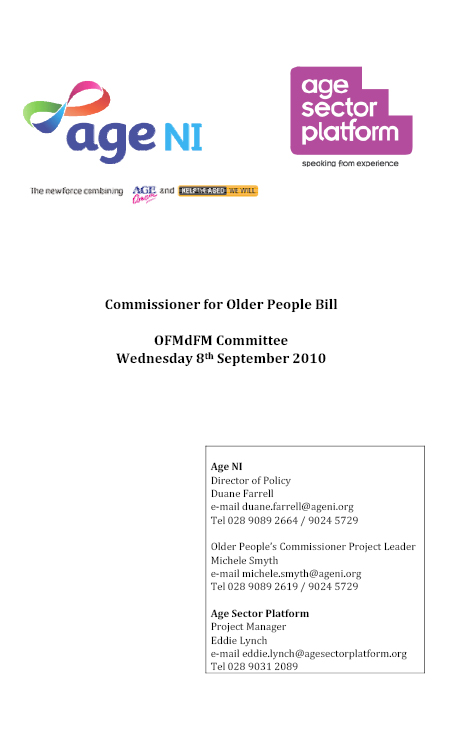
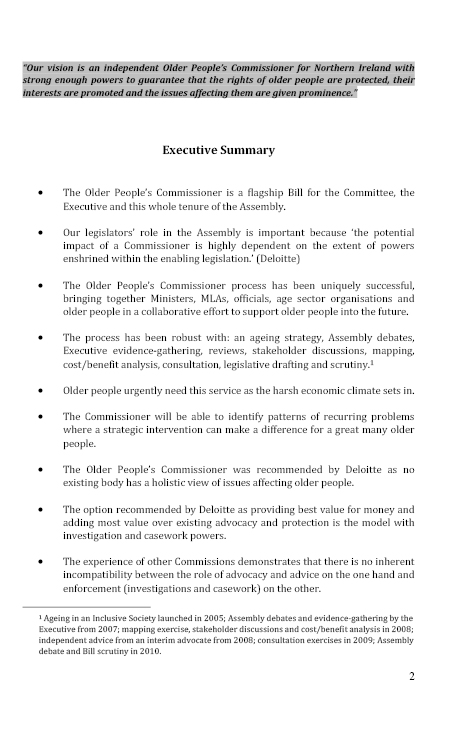
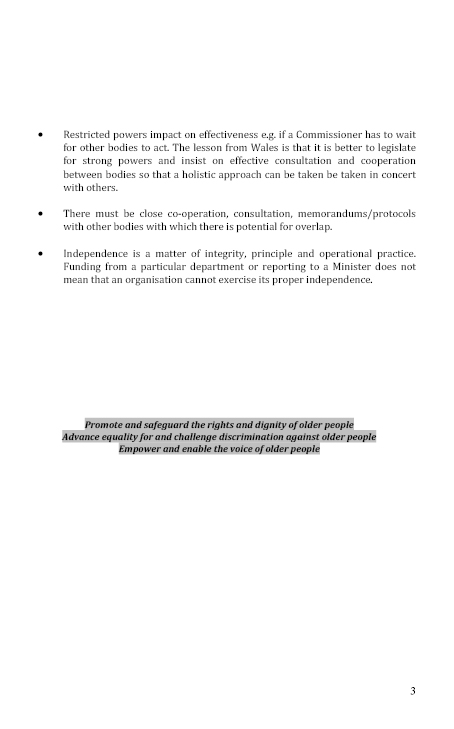
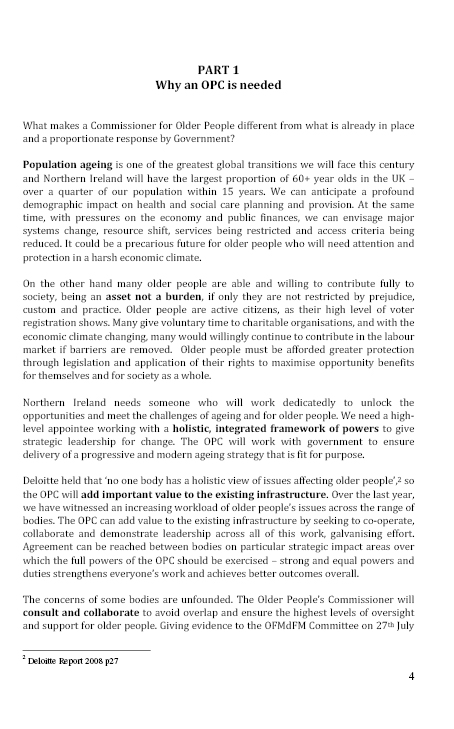
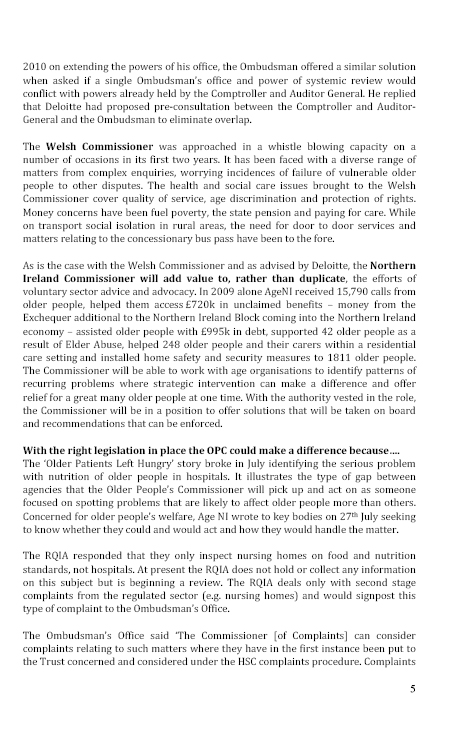
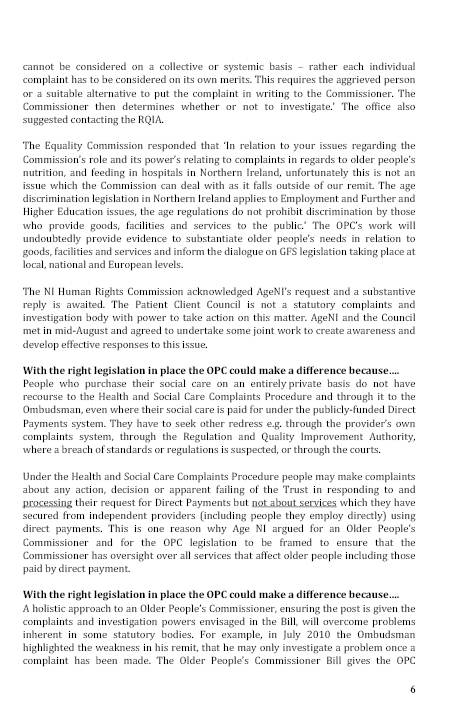

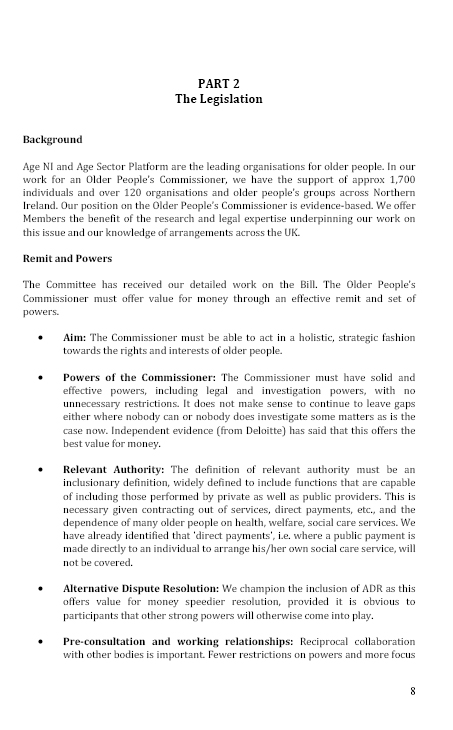

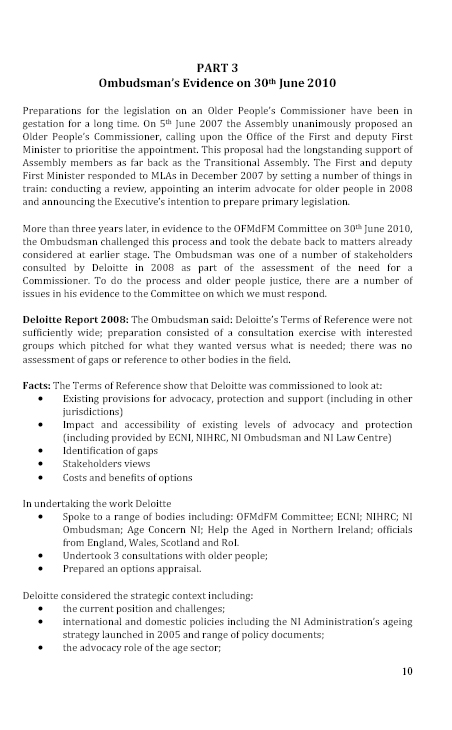
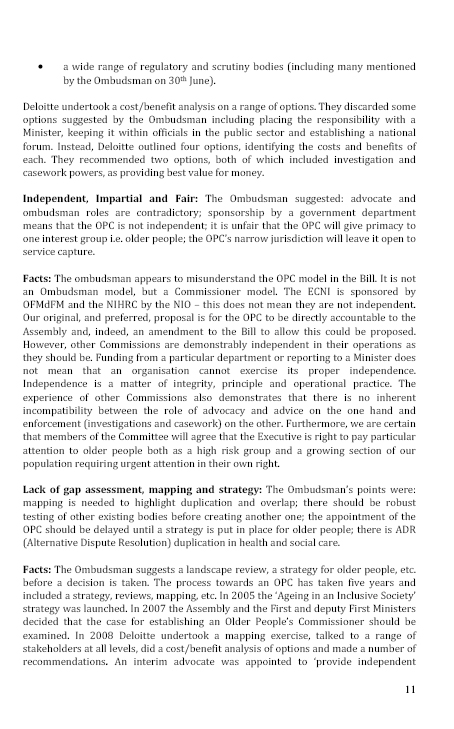
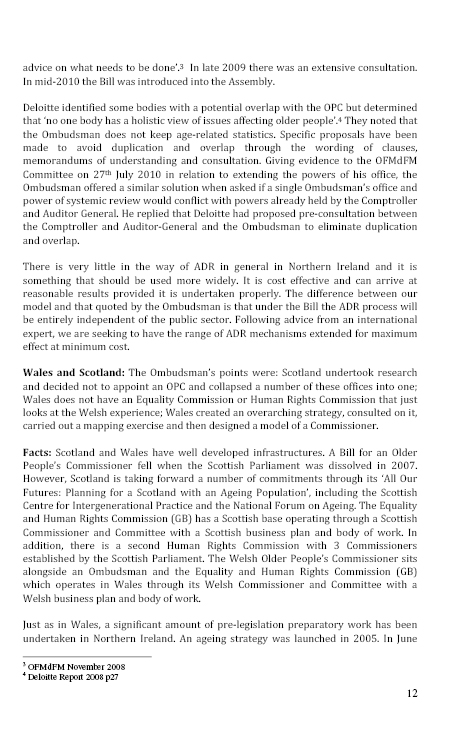
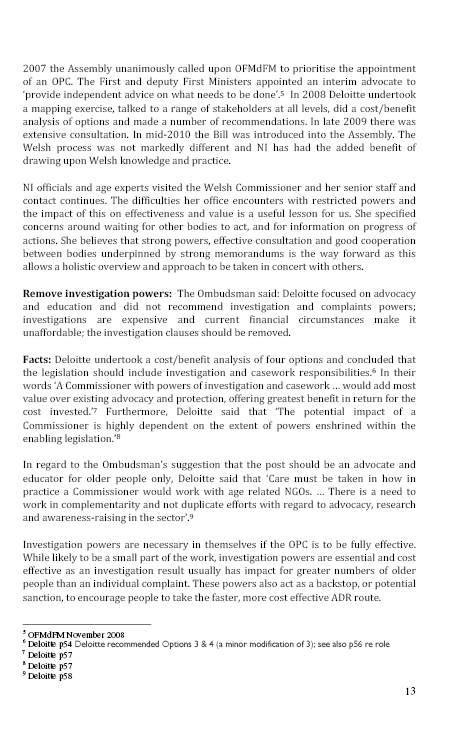

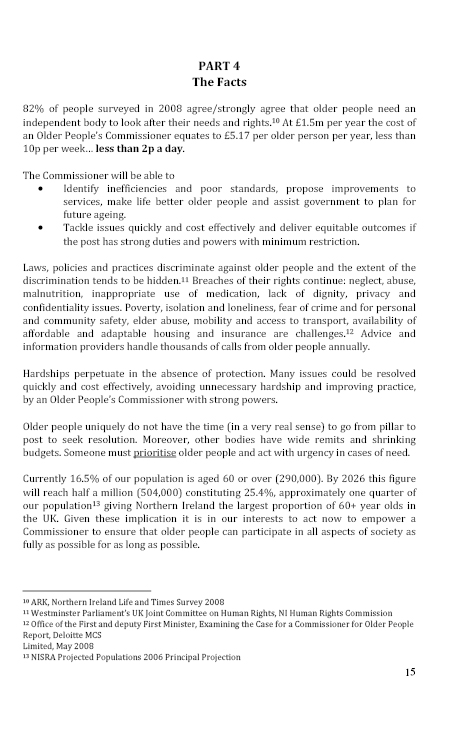

Cathie White
Clerk
Committee for OFMDFM
Room 416
Parliament Buildings
Ballymiscaw
Stormont
BELFAST
BT4 3XX 10 September 2010
Dear Cathie
As requested in your letter of 9 September, I attach the draft amendments to the Commissioner for Older People Bill that Ministers have 'agreed in principle' to take forward, subject to the Committee's views. These are attached at Annex 1 to this note for the Committee's consideration.
Further to this, the Committee requested the Department's view in relation to placing a duty on the Commissioner to report any potential criminal acts.
Department officials have indicated that legal advice has confirmed that such an amendment is unnecessary, and Ministers are of the view that this can and should be dealt with administratively as it is with NICCY and in Wales by the Commissioner for Older People there.
The Committee have also requested further information in relation to gaps in investigative powers identified by the Department and what the Commissioner for Older People could investigate. This information is currently being prepared and will be made available to the Committee as soon as it is available.
Yours sincerely
GAIL MCKIBBIN
Departmental Assembly Liaison Officer
The Commissioner's proposed power to procure conciliation services to resolve disputes involving older people. Following the consultation a new clause was inserted in the Bill which empowers the Commissioner (Clause 12) to make arrangements for the provision of conciliation services in relation to disputes which may lead to legal proceedings involving law or practice concerning the interests of older people.
Alternate wording could be substituted to amend the definition of the term in the Bill [Clause 12 (7)]. This alternate wording provides a broader interpretation that includes both conciliation and mediation.
Currently the Bill specifies that a review of the legislation cannot be carried out more frequently than every three years but no maximum period during which reviews must be carried out is specified.
The Age Sector have suggested an amendment to make it a requirement in the Bill that Reviews of the Act (Clause 21 refers) are carried out at least every five years. If the Committee is content Ministers would be willing to bring forward an amendment to this clause as proposed.
This has been an ongoing lobbying issue and the Department has previously clarified that "interests" is wider than but includes "rights" in the Department's 'Consultation Analysis and Report' (May 2010) and also the Explanatory and Financial Memorandum for the Bill.
In June Junior Minister Kelly made it clear in the Second Stage Debate that "interests" is a broader term covering the wider picture that includes rights.
However as there does appear to be ongoing concern Ministers have agreed that, providing the Committee is content, an amendment can be brought forward to Clause 27 (Interpretation section of the Bill) to clarify that in the legislation wherever the term "interests" appears in the Bill it includes "rights".
The Age Sector and the Advocate proposed that as one of the Commissioner's key roles will be to act as an advocate on behalf of older people, the Bill should explicitly refer to this. Clause 4(6) of the Bill already provides for the 'advocacy' role of the Commissioner. It empowers the Commissioner to make representations or recommendations to any body or person about any matter concerning the interests of older persons. If the Committee agree that this would be useful, Ministers will provide clarification of this as a change in the Explanatory and Financial Memorandum, after the Consideration stage.
Leave out subsection (7) and insert—
'(7) In this section "conciliation services" means a service which is provided?
(a) by a person who is not a party to a dispute,
(b) to the parties to the dispute, and
(c) with the aim of enabling the dispute to be settled by agreement and without proceedings.'.
After 'years' insert ', or later than five years,'.
At end insert—
'"interests" includes rights;'
(Further detail on each of these examples is included in the body of this paper)
1. Financial abuse of older people – the example used is financial abuse by lawful doorstep lenders offering loans to older vulnerable people where this is not illegal
2. Isolation – this is identifying those vulnerable older people who service providers are not reaching or addressing their needs. The people who have 'fallen through the gaps'. The Commissioner will be the only body with a legal duty to have outreach programmes and activities to older people.
3. End of life care (provision of palliative care for older people- where older people are enabled to die in their own home if they wish). The instances that we have discussed in this paper in the Health field are where the issue could not be dealt with by either the RQIA or the ECNI.
4. Inconsistent Provision of Rural/Community Transport –issues raised to us in the consultation of a free bus pass but no buses (postcode lottery and patchy provision)
5. Transport provision for older women [smart passes for women over 60]
6. Benefit uptake: figures indicate that 40% of older people do not apply for the benefits to top-up their pensions.
7. Health services arranged under the Direct Payments scheme are not covered by the remit of existing oversight bodies
8. Top-up Fees – families asked to 'top-up' fees for an older relative in nursing and residential care – the Commissioner could investigate the evidence of inconsistent application of this money and make recommendations
9. Presbyterian Mutual Society – Commissioner could have intervened on this on behalf of older people
10. Employment and Learning- the withdrawal of age based concessionary fees. This is currently being taken forward by the Advocate but if the Commissioner was in place they could bring their powers of investigation to this which Advocate does not have.
11. Holiday insurance premiums, online hotel bookings, car hire
12. The absence of anti-discrimination legislation in Northern Ireland in respect of age in provision of goods, facilities and services
13. Issues of Pensions - there is a significant risk that older people reliant in the future on private sector pensions will face higher levels of poverty.
14. No nutritional standards for Meals-on-Wheels services with variations in the quality of provision.
15. Under funding of dementia research
16. Long term Planning of Housing – the planning of accessible housing provision for Older People so that they can stay in their homes for longer
17. Availability of Legal Guidelines for Older People to reduce fear or concern in respect of legal issues
18. Differentials between home care fees charged and the rate Trusts are willing to pay for care
19. Sign posting the landscape – including statutory/ Voluntary/Advice/Public bodies to stream line and simplify matters for older people
20. Concern about disadvantage of older people in gaining access to training, development and apprenticeship opportunities with an ageing work force
21. Care in the Community (Advice NI) - access to care assessments and access to the care services highlighted within these care packages
22. The malnutrition of older people in hospital – this example provided to the Committee on 8 September. We can confirm that in this case no other statutory body (with investigative powers) has advised that they could take this on or are taking any action on this.
23. Disadvantages and difficulties facing older people when trying to access counseling and psychological services that they might need for a range of reasons, including:
24. Whether a person is receiving the right care/treatment they need or not due to their age Other examples include:
25. Investigate whether there may be a policy of over-medication in nursing homes
26. The dignity that is the 'interests' of older people in receipt of residential/nursing/hospital care (hygiene /instances of bullying/ systemic neglect).
27. Housing- Uptake of Housing Executive schemes to replace unfit housing. Accessing disability grant schemes and issues arising from repairs not carried out by NIHE / private landlords; older people unable to stay warm in their homes.
28. Information Barriers within the Trusts – accessibility of information to older people
29. Access to Care in the Community: discrimination where services deemed necessary are not provided to older people in their own homes
30. Commissioner for Older People in Wales
(1). We can however confirm that they looked at policy of care home closures and the range of approaches and impact on individual older people. This would not have fallen under either maladministration or discrimination.
(2). The Older People's Commissioner for Wales has instigated an investigation on whether older people are treated with dignity and respect whilst in hospital. This will look into Policy of decisions of closures of Nursing/Care homes provision of health care by Trusts for Older People
OFMDFM Committee: 'Request for further information in relation to Gaps in investigative Powers Identified by the Department and what the Commissioner for Older People could investigate'.
1.1 The gaps between existing public bodies and the proposed Older People's Commissioner fall into two main areas:
(i) Where no other public body has the power to act including investigate, and
(ii) Where a public body has the power to act but exercising its discretion it does not act.
The second gap is just as important as the first. It is about an agency's willingness to prioritise older people or its capacity (which may be restricted by resource or strategic focus) to deploy its power. Through the policy development process, both types of gap have been identified as evident in existing public bodies.
1.2 It is important to focus on the gaps that will be experienced by older people in the operation of the legislation.
Simply because other bodies have investigatory powers does not mean there is a need to prevent the Commissioner for Older People from having powers of investigation. It is also not a matter of saying that particular bodies have certain powers – these powers must relate to areas concerning older people's rights and interests. For example, some bodies have formal investigation powers but these are limited to specific areas of operation e.g. the Information Commissioner and the Police Ombudsman.
1.3 Another area, more central to older people's lives, may be covered by a complaints body but not by proactive systemic or 'own initiative' investigation powers. That is, the organisation may have to wait until an older person who has been affected by an issue makes a complaint before they can react. The Commissioner for Older People is proactive and will be empowered to assess, identify and act to resolve a problem before it continues to have an adverse impact on the older person or older people.
1.4 The fundamental reason why a Commissioner is needed is to concentrate in a holistic and strategic manner on the rights and interests of older people. The proposed Commissioner for Older People is unique in that no existing organisation has the remit to address the wider impact on older people to inform systemic improvements and influence the wider social policy agenda.
It is important to reiterate that the Formal Investigation powers of the Commissioner for Older People are reserve powers to be deployed in exceptional circumstances. The Commissioner will have a wide range of powers to be deployed in the interests of older people including advisory, advocacy, research, educational, communication and outreach as well as the investigatory powers.
Formal investigatory powers come quite late in the Bill (Clause 13) after the Commissioner's core functions have been granted and it necessarily requires several clauses to specify the procedures and formal powers associated with them.
However by the very nature of their formality and the potential use of High Court powers these are reserve powers to be used exceptionally for critical strategic matters affecting the lives of older people.
We need to plan on the basis that when a dedicated Commissioner becomes active and they identify issues of strategic importance to older people that they have the powers and authority to challenge, investigate and changes issues.
1.5 On the assertion of duplication the Older People's Commissioner will not replace or duplicate the duties of existing public bodies. The creation of a Commissioner will simplify matters for older people seeking help and feedback from the public consultation supports this.
Covering all gaps while avoiding duplication and overlap can be managed most effectively through the legislation by qualifying clauses, memorandums of understanding and pre-consultation between relevant agencies. The Commissioner will provide a focal point and will complement existing avenues of redress available to older people.
1.6 Any concern about duplication is fully addressed both legislatively in the Bill (through 'Residual' clauses and collaborative provisions) and also by non-statutory policy decisions (memorandum of understanding and working protocols).
1.7 The Welsh Commissioner for Older People works well with the Public Services Ombudsman and alongside the work of the Equality and Human Rights Commission and the Children's Commissioner in Wales.
Likewise the NI Commissioner for Children and Young People (with similar powers to those proposed for the Commissioner for Older People) works well alongside the Equality Commission, the NI Human Rights Commission and the NI Ombudsman.
1.8 As an example of this working in practice would be where the RQIA has the power to co-operate with other public authorities in the United Kingdom enshrined in legislation.
The Commissioner will also consult with relevant bodies as a means of managing any risk of overlap or duplication. This is a similar arrangement to that proposed by the NI Ombudsman in his evidence to the OFMDFM Committee on 27 July 2010 in respect of his role and that of the Comptroller and Auditor General. The Northern Ireland Ombudsman made a bid for increased powers, potentially duplicating those of the Comptroller and Auditor General on systemic review. He proposed pre-consultation between the two bodies as a means of managing the overlap and duplication.
2.1 Various papers have been presented to the Committee listing oversight bodies and powers without distinguishing between different types of bodies and their powers, and there are significant differences.
2.2 Evidence given to the Committee has suggested duplication and overlap with examples of other investigatory and regulatory bodies. In many of these cases those bodies listed as potentially duplicating with the Commissioner's work, we believe, are not directly relevant to or tangential to the Older People's Commissioner, and distract from the core purpose of the legislation. However some of these bodies do provide recourse to some older people (among their provision of service to all other age groups) but there still remains a gap in provision and specific areas that the Commissioner for Older People would be able to and empowered to investigate, some of which are covered below.
Moreover, this is not placed in the context of the propensity and frequency of existing statutory bodies to take up issues on behalf of older people given either their wide-ranging or generalist remit.
Given that a number of bodies which have been listed in evidence to the Committee are not materially relevant to this legislation, and some do not possess the powers proposed in the Commissioner for Older People legislation, these lists serve at best to confuse the issue.
2.3 We note also that at various times it has been suggested to the Committee that the Welsh Commissioner does not have investigation powers. This is not the case, the Welsh legislation has parallel powers of Formal Investigation and the 2007 Regulations provided the Welsh Older Peoples' Commissioner with similar High Court powers to call for evidence as proposed for the Commissioner here.
2.4 The Committee has also been informed that Deloitte did not recommend legal and investigation powers. This is not the case. The Deloitte Report was clear in recommending that the Commissioner should have investigatory and complaint handling powers, like those of the NI Commissioner for Children and Young People. These were therefore included in the Draft Bill and received strong support during both the pre-consultation and public consultation on the proposals.
2.5 In their response to the OFMDFM public consultation the Information Commissioner stated:
'Regulatory bodies by virtue of their statutory remit may look at very specific aspects of a complaint which may not address those issues relevant to an older person and their treatment by that public authority.'
2.6 The issues that older people face are multi-dimensional covering discrimination, breaches of rights, poor practice, lack of attention – in other words, the rights and interests of older people in the widest sense. This is what the Older People's Commissioner uniquely brings to the table and, from this position, adds value to existing bodies and arrangements.
(A). The first category of relevant bodies is that covering equality and rights with reasonably extensive powers in areas where their remit extends. These bodies do have investigation and enforcement powers but only in certain areas.
(i) Equality Commission for Northern Ireland (ECNI): The Equality Commission has a wide-ranging remit that covers a range of equality areas including age in some respects (the legislation widely covers 'age' not just older people). The ECNI remit for age discrimination extends to issues in respect of employment and higher/further education and training only.
OFMDFM are currently actively considering the advancing of anti-discrimination legislation here including the extension of age discrimination to non-employment areas. However legislating as a result of any decision taken for further anti-discrimination legislation that affects older people outside of employment-related areas – such as goods, facilities, and services will take time.
In any event, the rights and interests of older people is a much broader concept than discrimination rights and, while it is important to recognise when there is discrimination, it would be artificial to reconstruct controversies into discrimination disputes when wider issues are involved.
The ECNI is duty bound to prioritise those areas of equality and anti-discrimination for which it holds the primary responsibility for the legislation. The Equality Commission has wide discretion on whether to give legal assistance to a case and deploys this assistance power in pursuit of its view of strategic cases. For example the Age Sector advised us that the Commission exercised its discretion (possible on grounds of resource capacity/ fit with strategic priorities) not to take a case on behalf of women pensioners. It also has responsibility for s75 duty to promote, 'the provision of equality of opportunity for all age groups'.
The ECNI do not have a specific duty as the Commissioner for Older People will specifically have as detailed below;
In their submission to the Committee the ECNI have reiterated the followi;
'The Commission notes the difference between 'promoting the provision of opportunities for older people' envisaged for the Commissioner for Older People and promoting equality of opportunity which is one of the Commission's duties under the Age Regulations and other legislation. We recognise that this difference indicates the absence of potential conflict. We welcome the obligation on the Commissioner to promote the elimination of discrimination, which mirrors that of the Commission, believing that the broader the range of action against discrimination, the better the outcomes will be.'
The Equality Commission does not have jurisdiction to act in relation to goods, facilities and services – including public services such as the failure to provide nutritionally for older people in hospital. With Assembly agreement the Older People's Commissioner will be in place and operational in early 2011 and able to act on this very issue. The intention would be for the Commissioner to work closely with the ECNI on these issues.
(ii) The Northern Ireland Human Rights Commission (NIHRC): To come under the auspices of the NIHRC one has to make a human rights case. Human rights articles[1] of most relevance to older people are likely to be Article 3 on torture and inhuman and degrading treatment (abuse) and Article 8 on family and private life. While it is useful to appreciate the human rights dimension of any controversy it is not helpful to reconstruct all issues into human rights issues. There are a vast range of rights and interests of older people which are not human rights issues within the meaning of the Human Rights Act – the concept of rights and interests of older people is wider than this and it would be artificial to reconstruct controversies into human rights disputes when wider issues are involved. Moreover, the NIHRC has a considerable agenda across the entire field of national, European and international human rights instruments.
Unlike women, children and young people, minority ethnic groups and people with disabilities there are no specific enforceable European or international instruments for older people. Therefore to consider that a Human Rights Commission can give priority to older people in the way that a Commissioner for Older People would is unrealistic.
The NIHRC does not have an advocacy role. If a breach of human right sis found by the Commissioner for Older People they will be able to agree a combined approach with the NIHRC.
The RQIA in their response to the Department's consultation indicated that, 'nine out of ten care homes are within the private or charitable sectors but, as the law stands, the scope of the Human Rights Act does not directly extend to these residents'. The Department now understand that through Article 15 and 36 of Section 145 of the Health and Social Care Act this loophole has in part been closed by the coverage of publicly funded clients. However there is still a gap in respect of self and privately funded clients in care homes. This means that the self funded residents of independently run care homes who experience Human Rights abuses cannot use the HR Act to challenge the care provider. Following the Department's consultation the amendment to the draft Bill to ensure that all nursing and residential care homes are brought within the Commissioner's remit as relevant authorities means that the Commissioner for Older People could address this loophole and investigate these bodies.
(B). The second category is a standards body which is responsible for minimum care standards and quality in health and personal social care.
(i) Regulation and Quality Improvement Authority: The RQIA has no specific remit on the rights and interests of recipients of health and social care services. Its focus is on ensuring that providers meet minimum standards and work towards improvement. Classified as an executive NDPB, the RQIA works to a wider agenda and the DHSSPS may give it directions with respect to the exercise of its functions with which it must comply. Its aims are to keep the DHSSPS informed, encourage improvement of services by conducting reviews against quality standards and thematic and service reviews and investigations as directed by the Department and regulation of independent establishments and agencies. Since 2009, the responsibility for complaint investigation and resolution now rests with the service provider and with the HSC Trust and not with the RQIA. The service provider is expected to agree strategic partnerships with other regulators, public representatives and service users to ensure sensitive, service-user focus but its work is primarily initiated through inspection and reviews against a minimum standard and continuous improvement against that standard. The RQIA covers health and personal social services but within that field it has an extensive range from children's homes and fostering agencies to independent clinics and residential care homes.
From the public consultation it is evident that the RQIA is supportive of an Older People's Commissioner with investigatory powers, most likely understanding how the Commissioner can complement and add value to its own work. As a body focused on implementation of standards and with a legal power to cooperate, the RQIA will be able to work with the Older People's Commissioner; for example, undertake joint reviews with or use evidence gathered through the Commissioner's special expertise on older people to inform its own recommendations on standards. In fact only by taking the RQIA and the Older People's Commissioner together offers the possibility of closing the gap in health and personal social services – the RQIA works from the top-down (via agency focus) while the Commissioner works from the bottom-up (via focus on older people's rights and interests).
(C). The third category comprises complaints handling bodies. The Ombudsman bodies below are limited to acting on individual complaints, usually after the complainant has exhausted all other opportunities.
They generally cover maladministration i.e. issues of process or whether a decision was reasonable or not. These bodies do not seek to apply the realisation of a right nor do they undertake wider systemic reviews and investigations.
The focus of Commissioner for Older People's investigations is on 'interests' of older people and driven by the UN Principles for Older Persons so has a wider breadth and would be able to focus on the 'merit' of the decision and 'the 'quality' of provision. The specific focus of an investigation that is based on 'injustice resulting from maladministration' will likely focus on procedural aspects of a decision and process rather than the merits and how an older person is treated.
(i) NI Ombudsman (NI Commissioner for Complaints and Assembly Ombudsman): The office of the Assembly Ombudsman brings together the Assembly Ombudsman for NI and the NI Commissioner for Complaints. The NI Ombudsman has wide discretion to investigate individual complaints of 'injustice as a result of maladministration'. Maladministration is process drive and although it is not defined in legislation it is promoted on the NI Ombudsman website as including; 'Avoidable delay; Faulty procedures or failing to follow correct procedures; Not telling you about any rights of appeal you have; Unfairness, bias or prejudice; Giving advice which is misleading or inadequate; Refusing to answer reasonable questions; Discourtesy and failure to apologise properly for errors and Mistakes in handling your claims'. The NI Commissioner for Complaints receives complaints directly from individuals about local councils, education and library boards, health and social services boards and trusts. Individuals do not have a right of access to the Assembly Ombudsman; a complaint against government organisations (government departments, agencies and other public bodies) must be referred by an MLA. The NI Ombudsman himself does not have power of enforcement, but an individual must look to the courts for enforcement where his recommendation is not implemented.
The NI Ombudsman investigations focus on the manner in which decisions and actions have been taken. Only if maladministration has been found may the actual substance of a decision be questioned by the Ombudsm.
The content of policy or the merits of a decision taken without 'maladministration' is not within the jurisdiction of the NI Ombudsman. These would be within the remit of the Commissioner for Older Peop.
The NI Ombudsman investigation must be on 'injustice resulting from maladministration' and the complainant is expected to pursue their complaint with the body that has caused the problem, and secondly with any other alternative avenue of redress before approaching the NI Ombudsman as the body of last reso.
Although the concept of maladministration may be wide, investigations by the NI Ombudsman are more likely to focus on the procedural aspects of decisions rather then the merits. Article 7(9) of the Commissioner for Complaints (Northern Ireland) Order 1996 stat:
Nothing in this Order authorises or requires the Commissioner to question the merits of a decision taken without maladministration by a body to which this Order applies in the exercise of a discretion vested in that body.
This does not mean that the Ombudsman cannot consider at all the merits of the case but there must be maladministrati.
The NI Ombudsman can not instigate a case.
There are gaps for older people in the services provided by the Ombudsman. For example, the Ombudsman has no powers of strategic investigation or legal casework, nor does the office cover aspects such as promotion, advice, outreach and advocacy. The sole area of potential overlap is extremely narrow as the Ombudsman's role is confined to the grounds of 'injustice as a result of maladministration' that is poor administration or the wrong application of rules. On cases of 'maladministration' the NI Ombudsman would have precedence in investigations.
Any potential for overlap is fully addressed by the legislative provisions in the Commissioner for Older People Bill including that at Clause 8(2) of the Bill which sets out a clear statutory restriction on the Commissioner's powers that will protect both the remit of investigatory powers of the NI Ombudsman and of the Commissioner for Older People. Clause 8(2)(b)-
"the Commissioner may not exercise the Commissioner's powers under subsection (1) in relation to a complaint unless the Commissioner is satisfied that – (b) the complaint does not fall within an existing statutory complaints system".
(ii) The Parliamentary and Health Service Ombudsman: Information provided to the Committee by the Research and Library Services is incorrect. The Health Service Ombudsman receives individual complaints directly about the NHS in England (not via an MP). However, individuals do not have a right of access to the Parliamentary Ombudsman; a complaint against government organisations (government Departments, agencies and other public bodies) must be referred by an MP.
(ii) The Financial Ombudsman Service: The Ombudsman operates on an individual basis in a very specialised area. It is highly unlikely that there would be any duplication or overlap with the Older People's Commissioner. If and when age discrimination legislation on goods, facilities and services is introduced, the Commissioner may prove to be a uniquely valuable resource to the Financial Services Ombudsman. The Financial Services Ombudsman co-operates with the range of official bodies and ombudsmen in the financial field through Memorandums of Understanding e.g. with the Financial Services Authority, Office of Fair Trading and Pensions Ombudsman.
(iii) The Pensions Ombudsman: The Ombudsman investigates and decides upon pension complaints, usually after they have been through the complaints process of the pension scheme. Again this is a fairly specialised area where duplication or overlap is highly unlikely. Determinations are enforceable.
(D) Other bodies with powers will be less central to the main thrust of the Older People's Commissioner. It would be incorrect to suggest that these bodies duplicate or overlap significantly with the Commissioner:
(i) Information Commissioner
The Information Commissioner is the UK's Independent Regulator with a statutory remit under the Freedom of Information Act (2000) which includes promoting public access to official information. Under the Data Protection Act 1998, the Commissioner is responsible for promoting the protection of personal information.
In their response to the OFMDFM public consultation the Information Commissioner stated: 'The [Information] Commissioner for example, can look at the aspects of information handling by a public authority or data controller but this may be only one aspect of what the individual wishes or needs investigated. The issue of what truly concerns the individual may be in relation to particular treatment or access to a service which the [Information] Commissioner would not have the statutory remit to look at. It should be realised that a complaint that an individual may have with a relevant authority may be multifaceted and one regulator or complaints body may not have the statutory powers to deal with the entirety of the complaint.'
(iii) Police Ombudsman
Examples of what the Police Ombudsman has investigated include: firearms reports, the use of cs spray, use of baton guns and tasers, deaths in custody/following police contact and fatal traffic collisions involving police.
It is more likely that the Older People's Commissioner's relationship will be with the PSNI and the NI Policing Board; for example, raising policy matters with both and immediately turning an investigation over to the police where it becomes apparent that a crime has been committed.
E) Several bodies listed are not materially relevant to the Commissioner for Older People legislation as they do not have the range and level of powers envisaged for the Older People's Commissioner.
(iii) NI Consumer Council
The Consumer Council's role is to give all consumers a voice and make it count. In their response to the public consultation on the proposed Commissioner they indicated support for the establishment of a Commissioner and that they would work collaboratively with the Commissioner to raise levels of consumer proficiency among older people and also to address financial capability and financial inclusion issues for older people.
(iv) NI Patient and Client Council
The PCC provides an independent, confidential and free complaints support service. The PCC does not investigate complaints.
(v) Local Government Staff Commission
In general, the terms of reference for the Commission are to exercise:' general oversight of matters connected with the recruitment, training and terms and conditions of employment of officers of councils and the Northern Ireland Housing Executive and of making recommendations to councils and the Northern Ireland Housing Executive on such matters.' The LGSC has no powers of investigation.
3.1 In addition to the examples from our own policy development we are grateful to the following organisations who supplied examples of cases that the Commissioner for Older People might wish to investigate. These include; Age NI, The Advocate for Older People, CARDI, Citizen's Advice Bureau, Advice NI, the British Association for Counselling and Psychotherapy and the Law Centre
3.2 These examples below illustrate the type of gaps between agencies that the Older People's Commissioner will identify/recognise and act on as someone focused specifically on identifying problems that are likely to affect older people more than others.
(i) Malnutrition of older people in hospital[2]
As the RQIA regulates the independent health and personal social services sector it has focused on food and nutrition standards in nursing homes, not hospitals for which it does not hold or collect any information – HSS Boards and Trusts (which cover hospitals) come under an RQIA-monitored duty of quality. The RQIA is driven by standards inspection and review and likely to get involved in a complaint only where it is notified of a breach of regulation or associated standards. Individual complaints are referred to the NI Ombudsman who can only respond to and deal with maladministration and who cannot proactively carry out an investigation without an individual complainant.
The real life case of the recent nutrition controversy is a good example of where collaboration between the Older People's Commissioner and the RQIA could have identified a problem at an earlier stage and worked together with complementary powers – one top-down (agency improvement body) and the other bottom-up (older people's rights and interests) underpinned by compliance mechanisms. The NI Ombudsman deals only with complaints of maladministration that have already completed an internal complaints process. Complaints cannot be considered on a collective or systemic basis – each individual complaint has to be considered on its own merits if the Commissioner for Complaints determines to investigate and his decision is unenforceable. The Equality Commission has no remit to deal with older people's nutrition and feeding in hospitals as current age regulations do not prohibit discrimination by those who provide goods, facilities and services to the public. The NI Human Rights Commission has not yet responded fully to the request from the age sector on how it could/would act. The Patient and Client Council does not have any statutory complaints and investigation powers.
In this 'gap' the Commissioner for Older People could have intervened and acted. The Commissioner for older people could have addressed this issue including through use of their formal Investigatory powers.
(ii) Transport and older women
In 2001 senior citizens in North Belfast had several meetings with the Equality Commission to pursue the case for free transport for women at age 60. At that time women retired and got their pension at age 60 but were not entitled to the Smart Pass until 65; while men got their pension and Smart Pass on retirement at age 65. ECNI believe there solid strong legal grounds for the case but we understand did not take this case forward due to either resource or strategic plan restrictions. While this is a sex discrimination case, it indicates how older women did not fit within the strategic priorities of the Commission. Had this inequality been addressed free travel for the over 60s may have been introduced much earlier than 20.
An Older People's Commissioner is more likely to have seen this as a priority given the number of people impacted and to have backed the case. A quicker win would have been of benefit to many people who might not have been able to avail of it by the time it eventually came in seven years later. No other body would have had the power to act on this.
(iii) Isolation
On 7 April 2009 at the first official event of the newly formed charity, Age Concern Help the Aged NI, 200 older people took the opportunity to tell the organisation that rural isolation is their biggest concern.
Delegates were clear that rural isolation is the biggest issue facing our ageing population. Particular anxiety was expressed for those who are housebound and unable to participate socially within their local communities.
No public body exists to address the issue of pro-actively identifying the issues affecting isolated members of our older population in both rural and urban areas and feeding this information and findings into helping to shape government policy and the provision of services. This has resulted in the growth of befriending organisations such as Good Morning Belfast – a voluntary group who phone isolated older people on a daily basis to check on their well being. Their Anecdotal evidence indicates that there are many vulnerable older people living in isolation who live outside the influence of our public bodies. This can happen for example as a result of bereavement, growing fragmentation of families or a decline in support services. Isolation can frequently result in depression and malnutrition.
Whilst many public organisations do good work when they encounter vulnerable older people in their daily work such as Social Services teams there is no public organisation tasked with the duty that they must seek the views of older people and be accessible to and accountable to older people including especially isolated vulnerable older people (Clause 3 (8) specifically).
Through the Commissioner's outreach and community networks the Commissioner for Older People would be well placed to measure the extent of the problem and take this issue to the heart of government helping both to hold Government to account and to shape policy and services for older people.
(iv) Arbitrary age based barriers
Around 18 months ago a 69-year old man was allegedly refused treatment in Musgrave Hospital's brain injury unit due to the hospital's policy not to treat anyone over the age of 60 years. None of the existing bodies intervened. While it looks like age discrimination, the Equality Commission's remit does not extend to services. The Older People's Commissioner could have stepped in to protect this older man's rights and interests. In the end it was the public airing in the media that unlocked the situation, but not before a delay in treatment and considerable distress to the family acting on behalf of the injured man. The Older People's Commissioner has a duty to review the adequacy and effectiveness of services provided to older people [Clause 3(3)] and would certainly have been able to speak out about this, draw attention to it, advocate on behalf of the older man and would if they wished have been able to undertake a systemic review around arbitrary age-based barriers which no other body can currently do in this instance.
(v) End of life care
Studies show that the majority of older people prefer to die at home, but in 2008 over 50% of all deaths occurred in hospital. While the DHSSPS has developed a strategy, this period in life can oscillate between private and public care with the patient not being the primary determiner of where s/he will be placed.
The Older People's Commissioner whose legislation and investigatory powers are grounded in the United Nation's Principles for older Persons [that include independence, participation, care self-fulfilment and importantly dignity] is able to take up issues concerned with older people's dignity and respect in relation to palliative care at the end of life and could have undertaken an investigation across the different types of providing bodies where others bodies do not have powers to act.
Alternatively, a combination of the Older People's Commissioner working from the standpoint of older people's rights and interests alongside the RQIA from the standpoint of standards in the health and personal social services could have jointly looked at this leading to a better result for the older person and for health and social care provision in Northern Ireland.
(vi) Medication in nursing homes
An example given to the Committee on 20th January 2010 by Dr Mulligan of OFMDFM was some recently published research 'that suggested that there were instances of overmedication of older people in residential care. That is potentially an area that the commissioner for older people might wish to investigate. It is not necessarily the case that human rights issues are at stake, or that degrading or inhuman treatment is involved but it certainly falls within the 'interests and rights' of older people. These sorts of issues might well prompt the Commissioner to hold an investigation. However, if there were some suggestion of illegality, the commissioner would refer the matter to the PSNI, as the appropriate body to follow up on a criminal investigation.' The RQIA may have a role in addressing this issue and the Commissioner would be able to add weight to this and to work with the findings from their inspections to help to identify if there is a systemic issue and to bring greater focus and publicity to it.
(vii) Dignity of older people in residential/nursing/hospital care
Similarly to the example detailed above, if there was emerging evidence to suggest that there was a systemic problem in respect of care provision by a hospital or in domiciliary care agency of a deliberate unofficial policy of neglect for instance with regards older people's hygiene or evening hydration of their treatment e.g. several instances to suggest endemic bullying these would fall within 'dignity' and 'interests and rights' of older people and could be investigated by the Commissioner for Older people. This is something the Commissioner would likely want to work closely with the RQIA inspection staff on.
(viii) Direct Payments for privately organised care
There is a gap in the protection of older people who have private social care paid for by publicly-funded Direct Payments. The RQIA's remit covers breach of standards or regulations. Complaints about processing Direct Payments fall within the Health and Social Care Complaints Procedure, and then onto the NI Ombudsman for maladministration issues. However, delivery of social care services by independent providers, including people directly employed who may in any event not fall under the regulated establishment as defined in the RQIA legislation, are not covered. The Commissioner for Older People could examine this issue and take forward a case for an older person or older people.
(ix) Top-up Fees
The RQIA's particular responsibilities in public sector health and personal social services concern quality and standards while the NI Ombudsman can investigate complaints of maladministration. A matter that falls outside both of these is the breach of guidance in relation to third-party contributions to residential and nursing care, otherwise known as top-up fees (the difference between a Trust's payment and the home's fee). There is evidence of inconsistent application of existing legislation and guidance. This is likely to be a matter of interest to the Older People's Commissioner that he/she could, if they felt it was appropriate, conduct an Investigation in
(x) Financial activity/abe
Recently the Citizens Advice Bureau advised that there has been a 108% increase in the number of legal Doorstep Lender loans. These products are typically targeted at vulnerable older people who will be at home during the day. 'Doorstep lenders', offer small value, short-term unsecured loans e.g. £300. APR would normally be 400%, without any consideration of ability to repay debts. These are generally repaid on a weekly basis from a customer's home to a representative or agent of the company. The agent's weekly home visit is central to the process as are frequent top-up loans. These are major features of Doorstep loans and help manage the lenders risk. Many vulnerable older people are on small incomes and manage very tight margins. The attraction of these immediate cash loans can result in long term dept.
The FSA has a role in this however there is no statutory public body actively addressing this type of legal financial activity on behalf of the interests of older people. The Commissioner for Older People might investigate these financial institutions to determine if the interests of older people are a consideration in their business with a view to changing their practices. The Commissioner might also use the results of an investigation to expose the damaging effects on the interests of older people of this type of financial abuse.
(xi) Presbyterian Mutual
As we confirmed last week, the Commissioner could have intervened on behalf of older people in the Presbyterian Mutual Society case to ensure that the interests of older people affected were fully represented and protected as far as possible in the resolution of the case.
(xii) Employment and Learning
The age regulations led to unintended consequences for older people; the impact has been fewer older people registering for Further and Higher education courses – a 37% decrease. Although the ECNI enforces the age regulations, the Older People's Advocate was asked by the Junior Ministers in the last year to examine the impact that the withdrawal of age based concessionary fees had had on older people's participation in education. The Older People's Advocate examination of the impact that the withdrawal of age based concessionary fees was supported by the Minister with responsibility for Employment and Learning. The process of this examination uncovered the fact that the situation was not uni-dimensional but rather a complex interaction between policies and practices at many different levels. The ECNI have not pursued this to date. This could well have been the subject of an investigation by a Commissioner for Older People working single or jointly with the ECNI.
(xiii) Housing
Several older people have experienced considerable difficulty in accessing the Housing Executive's disability grant scheme as the process is complicated and difficult. Several older people have given up despite needing adjustments to their home e.g. downstairs toilet e. When the matter was raised with him, Nigel Dodds MP MLA stated that he felt an Older People's Commissioner could tackle a lot of the problems in the system by investigating how current processes are not user-friendly for older peop.
The Welsh Commissioner has also identified this as an area of activity. Issues that arise include adaptations that allow people to remain in their homes are taking a very long time to install. Another housing issue is the cost of maintaining properties. The Commissioner for Older People could undertake research into this, use his/her powers of review, investigate to gather further information and if he or she thought it necessary undertake a Formal Investigation.
(xiv) Housing, Planning and Older People
Below are concerns raised with the Advocate by a number of older people living in a proposed regeneration area and who had been lobbying and raising concerns over a period of time with regards to their housing nee.
Powers of Investigation would assist the Commissioner to:
(xv) Health and Social Care Complaint Handling Procedures
The experience of the Older People's Advocate also called into question the effectiveness of arrangements in the area of health and social care to resolve disputes through mediation. The OPA considered that the Commissioner might have an important role in ensuring they operate effectively for older people. Her experience has raised the awareness of the Advocate of the difficulties older people face when things go wrong within health and social care provision and the length of time it takes to have issues addressed. Time is something which many older people may not have.
Some of these issues may well be able to be addressed informally through taking a pragmatic and common sense approach but it would be necessary for an Older People's Commissioner to have the powers to formally investigate the effectiveness of such procedures if they are consistently found wanting in respect of older people.
(xvi) Provision of Rural Transport
The Commissioner could research, advise, advocate and if needed investigate issues around provision of rural transport in rural areas including examining community transport systems that generally assist people to travel to local towns but not local hospitals or clinics.
(xvii) Holiday insurance, travel insurance, online hotel bookings, car hire
These are all consumer services on which older people are unable to get satisfaction. The purpose of powers of investigation is to explore issues which may often be quite hidden. It is also impossible to anticipate issues that may come to light in the future that will require investigation and recommended actions to resolve in a manner that prevents them occurring again and again for one older person after anothr.
The Commissioner for Older People could work with the Consumer Council on this issue, advise the Financial Ombudsman and independently produce research, undertake an information gathering investigation and bring the report to the attention of the Secretary of State.
(xviii) The absence of anti-discrimination legislation in Northern Ireland in respect of age
With the sole exception of employment older people need more protection in monitoring and raising awareness of issues arising from the provision of goods, facilities and services. A Commissioner could be an important watchdog in this regard and raise the profile of issues in respect of discrimination in such provision and promote the importance of further legislation here to fully protect older people from discrimination in the delivery of goods, facilities and services. The Commissioner has a duty to review the adequacy and effectiveness of law relating to the interests of older people [Clause 3(2)] and could work with ECNI and OFMDFM for legislative change.
(xix) Examples supplied by CARDI
Older workers: as people are going to be working for longer and longer and in an ever-changing workplace, a key issue for older people is obtaining equal access to training, development and apprenticeship opportunities to ensure that they are able to keep their skills up to date and remain in work whilst they are ineligible for their pension.
Poverty: there is a significant risk that older people reliant in the future on private sector pensions will face higher levels of poverty.
Malnutrition: a real issue for older people. However in comparison to the issue of obesity, it receives limited public attention. For example there are no nutritional standards for Meals-on-Wheels services with variations in the quality of provision.
Dementia: one of the most significant issues in terms of the cost of long-term care for older people yet it receives relatively small amounts of research funding.
Benefit uptake: figures indicate that only 60% of older people apply for the benefits to top-up their pensions. This issue applies to Housing Executive schemes to replace unfit housing. It has proven very difficult to enable older people to access these schemes.
Therefore a key issue for government: ensuring that those organisations responsible fulfil their duties to older people by making sure that older people actually get the services to which they are entitled.
(xx) Available Legal Guidelines for Older People
Guidelines for older people in relation to legal problems are available through voluntary organisations such as Age Concern (although these relate specifically to England and Wales law). In Northern Ireland one solicitors? firm, has advice that is available both in paper form (on request) and online that explains in plain language various aspects of law relevant to older people. It should be noted that this information is intended for use prior to attending a face to face appointment with a solicitor. However, there is no publication through the government or indeed the legal profession that is widely available or has been drafted with the specific purpose of reducing fear or concern in respect of legal issues.
(xxi) Mental Health And Wellbeing Of Older People –Supplied By British Association for Counseling and Psychotherapy (BACP)
The Commissioner with its focus on older people's 'rights and interests' would be the only body that would have a strong strategic focus on the mental health and wellbeing of older people and discrimination faced by older people in accessing psychological therapy services. The British Association for Counseling and Psychotherapy has identified the following issues that the Commissioner would be able to investigate:
1. risk of suice
2. depression and strs
3. feeling isolated
4. having no family/ carers to act as advocates
5. not being aware of services
6. not fully understanding their psychological symptoms and the treatments available to tm
7. being house bod
8. emotional and psychological support for older people with dementia and their cares (who are often older carers)
It is important that outreach services are available for older people, and that health professionals pro-actively go in and assess patiens. Once an assessment has been made, Interventions, such as telephone counseling can be effective for the house-bound older person.
Telephone counseling and psychotherapy can offer many benefits to older people who live in rural areas. Specifically, telephone counselling can improve people's quality of life and help to manage the psychological effects of their conditin. Enabling the provision of telephone counselling in rural areas could allow people with dementia to maintain their independence in the home of their choice for as long as it is possibe. BACP has published guidelines on both on-line and telephone counselling and would be pleased to share thee. It is also important to note that it's not just in their own homes that older people face problems; there is evidence of high levels of depression in residential care homes.
The Commissioner could investigate the difficulties in access to services and identify appropriate outreach services to put in place for older peope.
Some though not all of the examples provided above could fall into cases of discrimination but many could only be taken forward by a body with the specific and unique focus on the 'interests and rights' of older people.
(xxii) Differentials between home care fees charged and the rate Trusts are willing to pay for care (Law Centre)
Law Centre case studies indicate that older people are being left to handle the consequences of an ongoing difficulty between the public/independent sectors as to appropriate funding for long term care. Trusts have asked the families of older relatives to pay a "top up" fee to ensure a care home replacement even though the Trust had initially placed the client in a home which met all theirs. No other home was identified by the trust prior to placement. This is a breach of departmental guidance in relation to third party top up charges for nursing home fees.
(xxiii) Information Barriers within the Trusts
The Law Centre NI advised that barriers face older people, and their families, seeking to voice their concerns about possible abuse, neglect or discrimination in healthcare. Despite the considerable work of the NIHRC and the Equality Commission for Northern Ireland on Section 75, there remains a lack of public information regarding human rights and their application to healthcare in Northern Ireland. This lack of information is a considerable barrier both to the realisation of human rights for older people in healthcare and to the ability of older people to voice concerns about possible breaches of human rights.
The LAW Centre advise that the NIHRC has found that there appears to be a lack of consistency in the recording of unmet needs in the provision of healthcare services to older people and therefore a lack of knowledge on the part of the Government as to the real level of need. This issue needs to be addressed by Trusts.
The Commissioner for Older People could conduct a formal investigation into the lack of provision of information across the Trusts and seek compliance that barriers about possible abuse, neglect or discrimination in healthcare are removed.
(xxiv) Health Trust Issues (Law Centre)
Law Centre case studies show that older people who raise complaints against the Trusts and feel they have not had a satisfactory outcome have no recourse to any other public body to seek resolution. They can of course approach the NI Ombudsman but only if there has been maladministration - but for everything else there is a clear gap in provision. The Commissioner for Older People would be able to carry out investigations on behalf of older people in;
(xxv) Sign-posting the landscape – Voluntary/Advice/Public bodies
The Consumer Council have advised that there is considerable confusion among older people as to which advice/public/voluntary body they should approach for assistance. The Commissioner will not only be able to act on behalf of older people but would actually streamline and simplify the process for older people brining clarity to where they can access help and redress. The evidence of the experience of the Advocate would support this and that the public can easily identify the remit of the Advocate.
(xxvi) Health Trust Issues (Advice NI)
Advice NI advised that the Commissioner might investigate:
(xxvii) Care in the Community (Advice NI)
Advice NI advised that the Commissioner should investigate those occasions where older people are being discriminated against
(xxviii) Older People and Housing (Advice NI)
Advice NI advised that the Commissioner should consider getting involved on occasions where repairs are not carried out by NIHE / private landlords.
(xxix) Commissioner for Older People in Wales
(1). The Older People's Commissioner for Wales has undertaken two Formal Investigations resulting from indicial complaints where an older person's interests have been affected. These are confidential and so we can not provide exact detail of these. We can however confirm that they looked at policy of care home closures and the range of approaches and impact on individual older people. This would not have fallen under either maladministration or discrimination.
(2). The Older People's Commissioner for Wales has instigated an investigation on whether older people are treated with dignity and respect whilst in hospital. This will look into Policy of decisions of closures of Nursing/Care homes provision of health care by Trusts for Older People
The aims of the Review are:
This report will include:
3.3. This Section demonstrates that there are several gaps in current provision and protection where a Commissioner for Older People is uniquely placed to address.
In many of the case outlined above the Commissioner for older People could act in conjunction with another existing body including RQIA or the ECNI if their remit allowed.
However in many of the 'worked cases' above the Commissioner for Older People would be the only body who could and would act including using (if appropriate) their powers of investigation. Many of these cases would not come under maladministration and neither are they an issue of discrimination or a breach of Human Rights.
When issues such as the real life example of the malnutrition issue come to light, it is important to be able to act and to investigate quickly.
3.4 An Older People's Commissioner is uniquely placed with a range and breadth of powers available and specific focus on older people to be able and willing to act. The Commissioner for Older People will be able to:
The Older People's Commissioner Duties that they must undertake include:-
4.1 Wales is a comparable jurisdiction and in the rationale for establishing a Commissioner for Older People in Wales similar issues pertinent to and affecting older people here were identified including; Poor housing, poverty, poor nutrition, lack of opportunity for employment and inadequate transport services.
4.2 The evidence also suggested that there was a wider perception of an imbalance of power and influence, and a lack of respect for older people. Age is seen as stigmatising and it is felt that older people are discriminated against. The need to confront ageism and other discrimination against older people, tackle stereotypes of old age and improve the engagement with, and participation of, older people in our communities.
4.3 The highest proportions of older people in Wales living in rural local authorities raises particular difficulties for significant numbers of older people living in physical isolation – with less access to transport, for instance, than the majority of the population, despite their greater need to be able to access services or simply to be able to live a socially healthy life. In addition there are issues of substantial financial hardship, the challenge of living on a fixed income and many older people faced with a choice between eating and heating their homes as well as real concerns about the basic pension and benefit entitlement.
4.4 In Wales the Equality and Human Rights Commissioner, the Public Services Ombudsman (PSO), [with many of the powers/legislative amendments proposed for the NI Ombudsman as per the Deloitte 'Review of the Offices of the Assembly Ombudsman for NI and the NI Commissioner for Complaints', 2004], the Children's Commissioner and the Commissioner for Older People work well together.
4.5 The Advisory Group establishing the Welsh Commissioner concluded that there was a need for an Older People's Commissioner for Wales – in addition to the Equality and Human Rights Commission [EHRC, formerly CEHR]. The main reasons we:
A similarly strong case can be made in Northern Ireland and continues to be evidenced in this paper.
4.6 The UN Expert Group Report on the "Rights of Older Persons", was presented to the UN General Assembly at its 64th Session (September 2009), and addresses the issue of the protection of human rights as they relate to older persons.
The report made a number of recommendations. Included amongst them were:
In terms of the Legislation on the establishment of a Commissioner for Older People here, the UN Report is to be welcomed and shows that we are leading the way internationally when it comes to addressing the rights of older persons.
5.1 The Older People's Commissioner was invited to represent Wales on the UK Government's Single Equality Bill stakeholder group and liaised closely with the Equality and Human Rights Commission in Wales.
5.2 The Welsh Commissioner refers to the fairly tight-knit public sector community where people tend to know (at least, those who wish to) which body fulfils which role. Where there has been any confusion over the Commissioner's role, the Welsh Commissioner explains that she is like the Children's Commissioner and people then identify that niche. She explains that the Commission's role is unique and different to that of other bodies, such as the Public Services Ombudsman for Wales, because older people are the focus of what they do.
Last month a Memorandum of Understanding was signed by the Older People's Commissioner, the Children's Commissioner and the Public Services Ombudsman to demonstrate commitment to joint working and avoidance of duplication of roles. The bodies already refer cases to one another where appropriate.
Officials from the Office of the Welsh Commissioner for Older People have assured OFMDFM that they have an excellent working relationship with the PSO (whose legislation it is proposed to look to for amendment to the NI Ombudsman legislation). The Welsh Commissioner for Older People has come across cases that have a mix of both 'maladministration' and 'policy concerns affecting the interests of older people' and are exploring taking a joint working approach to these with the Public Services Ombudsman.
5.3 In considering the question of overlap the Northern Ireland the Advocate suggested that;
"Another safeguard against potential duplication or replication is the provision in the Bill for Memoranda of Understanding between the bodies with which this might be most likely. It is also cautionary to consider if some overlap may ensure greater vigilance in decision making affecting older people and provide more accessible pathways into the relevant systems if problems occur."
5.4 It is well recognised that some issues may be addressed informally through taking a pragmatic and common sense approach but it would be necessary for an Older People's Commissioner to have the powers to investigate the effectiveness of such procedures if they are consistently found wanting in respect of older people. As the Advocate says, "The powers that are given to the Commissioner in the Bill are not just 'wants' but rather are 'needs' to ensure the protection of the interests of older people and to ensure any issues or difficulties which arise are dealt with in a timely and open manner."
5.5 The Welsh Commissioner has a unique role to look at the direct lived experiences of older people and has a focus on the following:
6.1 The Welsh position demonstrates the importance of synergy between promotion and enforcement. On the one hand, scrutiny through investigation can feed into advocacy. On the other, investigation and enforcement powers will encourage action without constant recourse to their use – their mere existence is enough and that the Commissioner can call upon his/her Formal Investigatory powers when a strategic issue affecting an older persons rights and interests is so serious as to warrant them. Evidence from the experience of NICCY here supports this.
6.2 The overwhelming case for the Older People's Commissioner is this fact along with demonstrable need for a strategic holistic role securing, promoting and safeguarding the rights and interests of all older people.
6.3 This paper clarifies both that while there are several oversight and investigatory organisations in existence there are still gaps in the existing provision for redress for older people and in many cases only the Commissioner for Older People with the focus on the 'interests' and the 'rights' of older people could act.
6.4 By the very nature of their formality and the potential use of High Court powers these are reserve powers to be used exceptionally for critical strategic matters affecting the lives of older people. However we need to plan on the basis that when a dedicated Commissioner becomes active and they identify issues of strategic importance to older people that they have the powers and authority to challenge, investigate and change issues.
6.5 The holistic view of the rights and interests of older people underpinned by effective powers enables the Older People's Commissioner to pursue a range of issues on behalf of older people which may include breaches of rights and interests of older people, breaches of regulatory standards and also work with other bodies on discrimination and human rights issues as well as ensuring 'good practice' in terms of 'interests' of older people.
1. BACP indicated that;
Areas where Commissioner might usefully exercise powers:
Commissioner to consider getting involved on occasions where older people being discriminated against in the health service. For example malnutrition of older people in hospitals; improper arrangements for older people either in terms of having to wait too long for treatment, remain too long in hospital, inappropriate care packages on discharge;
Commissioner to consider getting involved on occasions where older people being discriminated against where services deemed necessary not provided to older people in their own homes; access to care assessments and access to the care services highlighted within these care packages
Commissioner to consider offering a generic Freephone information / advice service for older people
Commissioner to consider getting involved on occasions for example where repairs not carried out by NIHE / private landlords; older people unable to stay warm in their homes;
Other areas for consideration include:
The Commissioner will also consult with relevant bodies as a means of managing any risk of overlap or duplication:
[1] The European Convention on Human Rights and UK Human Rights Act 1998 Schedule 1
[2]RQIA: Responded to Age NI that it deals only with second stage complaints from the regulated sector (e.g. nursing homes) and would signpost this type of complaint to the Ombudsman's Office. The RQIA has only inspected nursing homes on food and nutrition standards not hospitals and does not hold or collect any information but is beginning a review.
Ombudsman's Office: Responded to Age NI: 'The Commissioner [of Complaints] can consider complaints relating to such matters where they have in the first instance been put to the Trust concerned and considered under the HSC complaints procedure. Complaints cannot be considered on a collective or systemic basis – rather each individual complaint has to be considered on its own merits. This requires the aggrieved person or a suitable alternative to put the complaint in writing to the Commissioner. The Commissioner then determines whether or not to investigate.'
Equality Commission: Responded to Age NI: 'In relation to your issues regarding the commission's role and its power's relating to complaints in regards to older people's nutrition, and feeding in hospitals in Northern Ireland, unfortunately this is not an issue which the Commission can deal with as it falls outside of our remit. The age discrimination legislation in Northern Ireland applies to Employment and Further and Higher Education issues, the age regulations do not prohibit discrimination by those who provide goods, facilities and services to the public.'
NI Human Rights Commission: to date an acknowledgement only.
Patient Client Council: Not a body with statutory complaints and investigation body on this matter.